
His Divine Grace
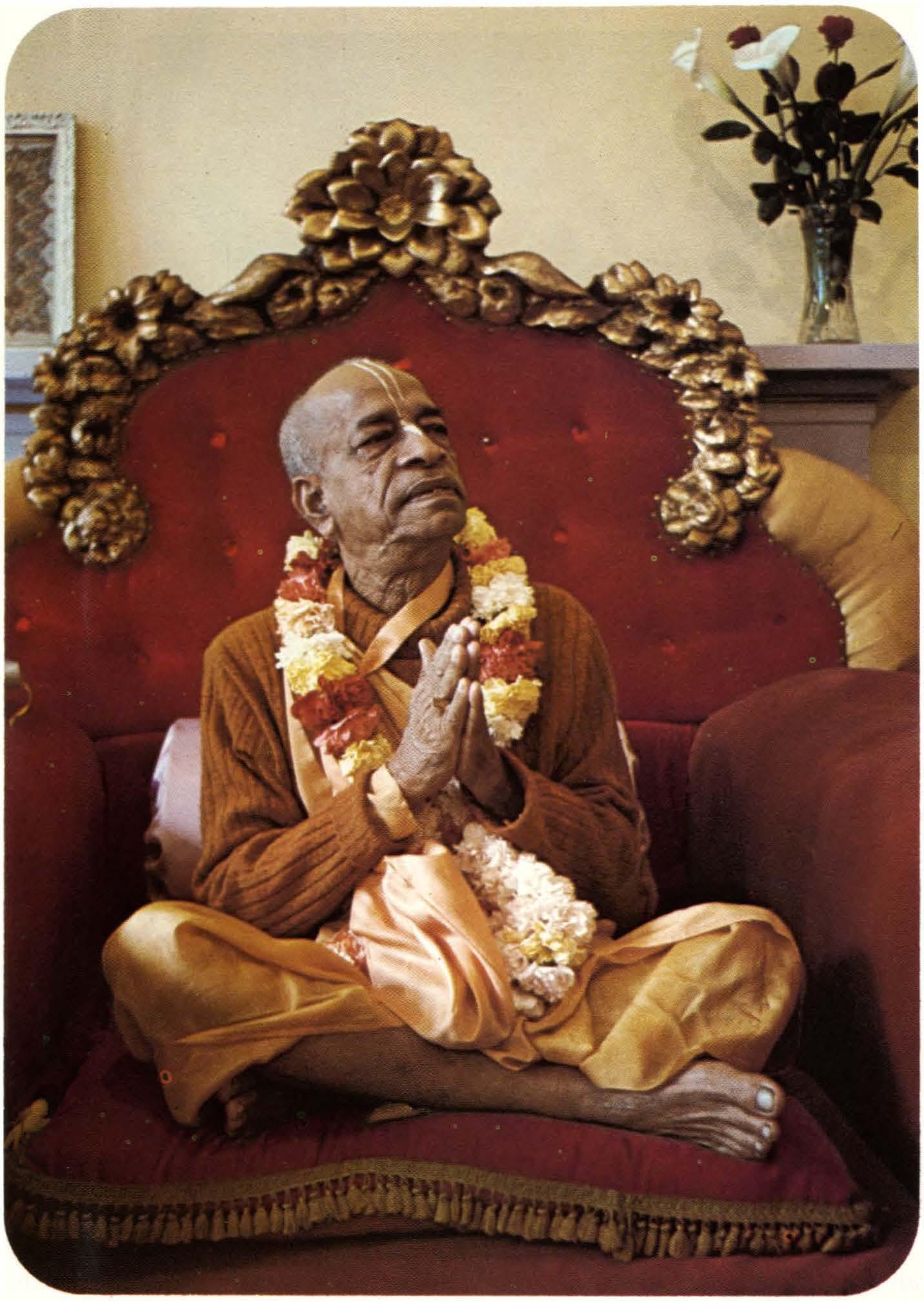

A.C. Bhaktivedanta
Swami Prabhupada

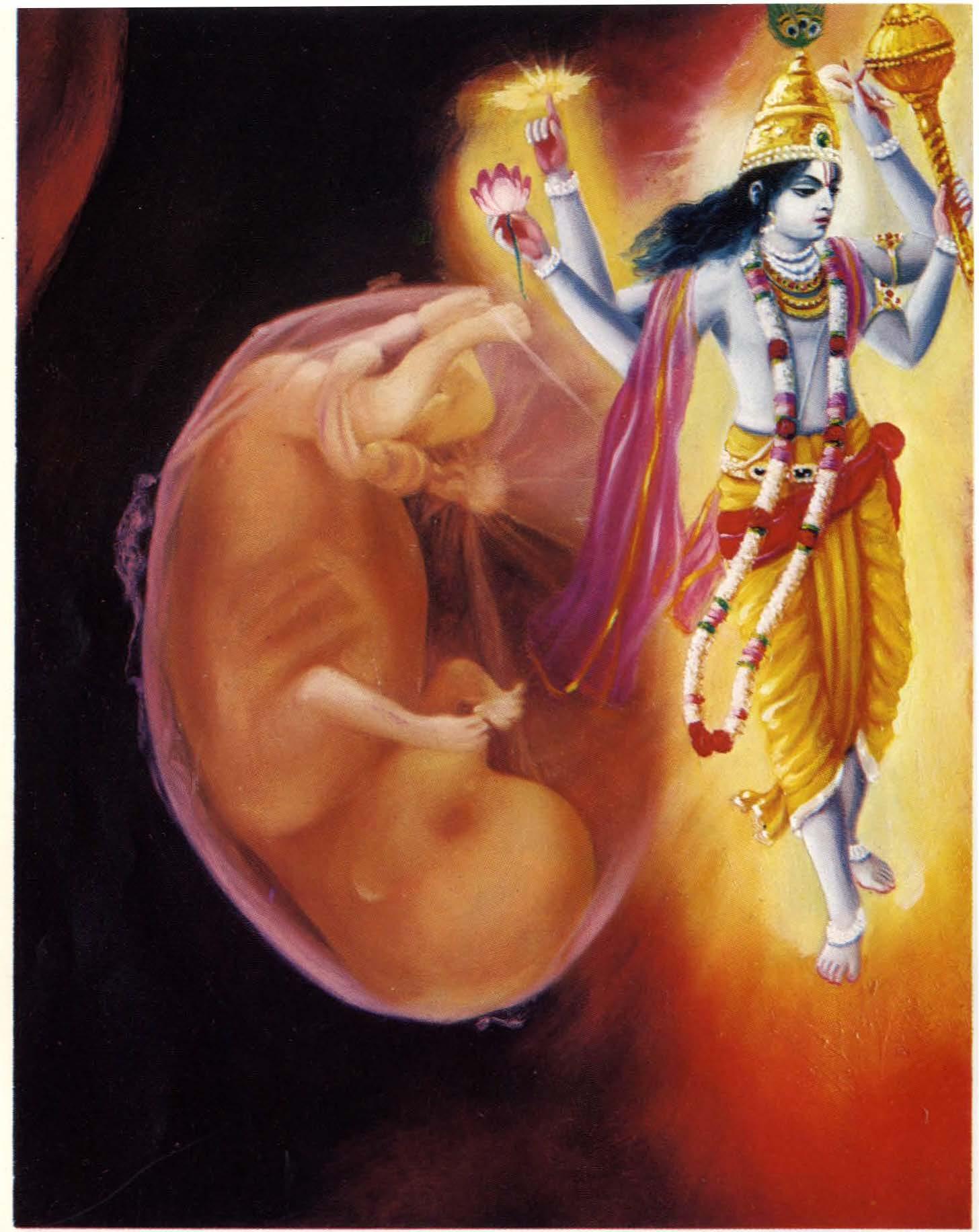 Plate 1 Just to protect the progeny of the Kuru dynasty, Srf Kw.ta covered the embryo of Uttara by His personal energy. (p. 388)
Plate 1 Just to protect the progeny of the Kuru dynasty, Srf Kw.ta covered the embryo of Uttara by His personal energy. (p. 388)
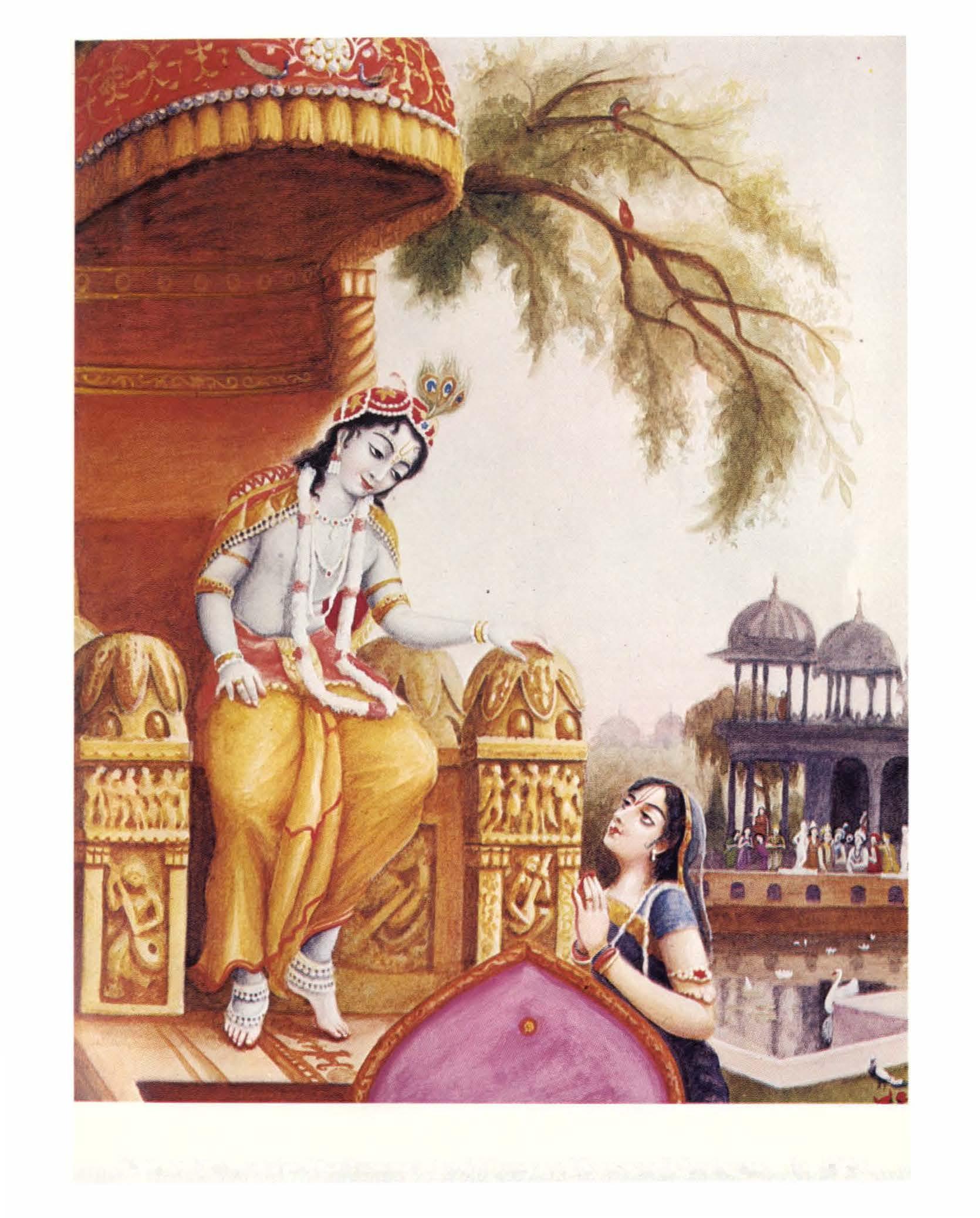
Plate 2 Queen KuntfaddressedLord K.J:�Qaas Hestarted for home. (p. 390)
Plate 3 Mother Yasoda wanted to make a show of punishment for her transcendental child. (p. 411)
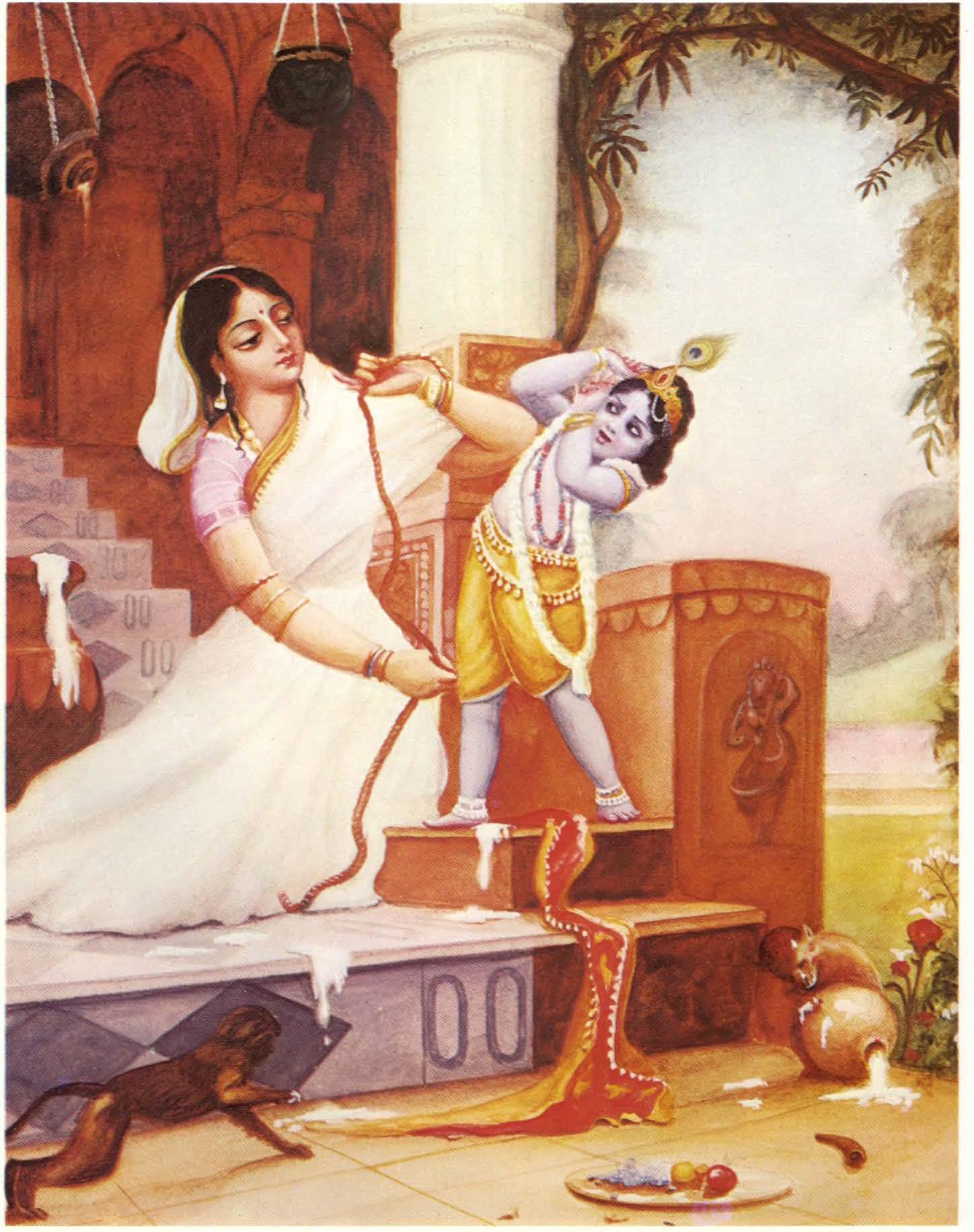

Plate 4 Kmta has very kindly come before Bhl�madeva while his life is ending. (p. 464)
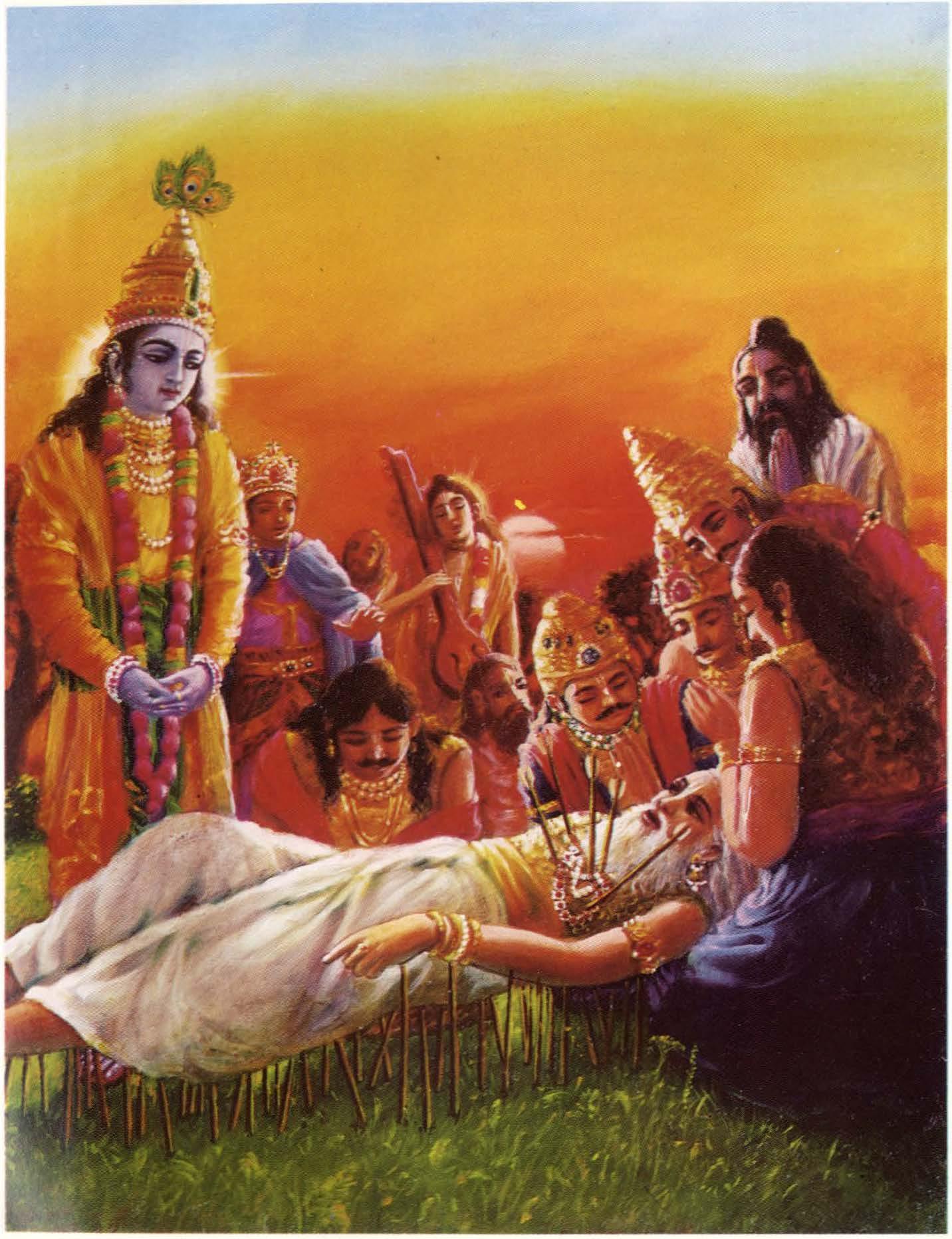

Plate 5 Although Bhi�madeva lay on the bed of arrows for three days, he did not accept water when it was offered. But then Arjuna, understanding his mind, shot an arrow in the ground, causing mother Ganges River to come up and enter the mouth of Bhl�madeva.


Plate 6
In obedience to the command of His friend, Lord Sri K{�I}a pointed out the enemies. (p. 487)
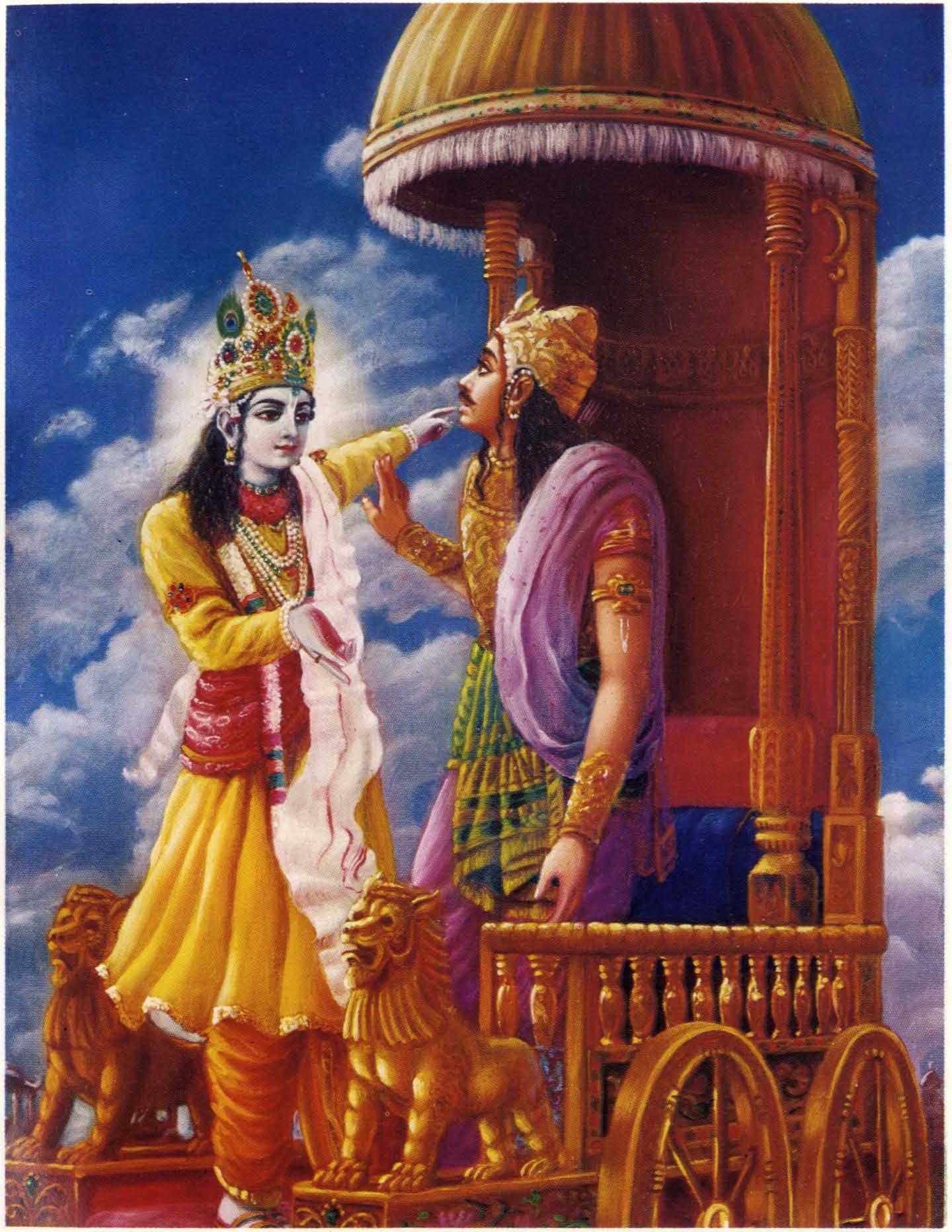

Plate 7 "He got down from the chariot, took up its wheel, and ran towards me hurriedly,just like a lion goes to kill an elephant." (p. 490)
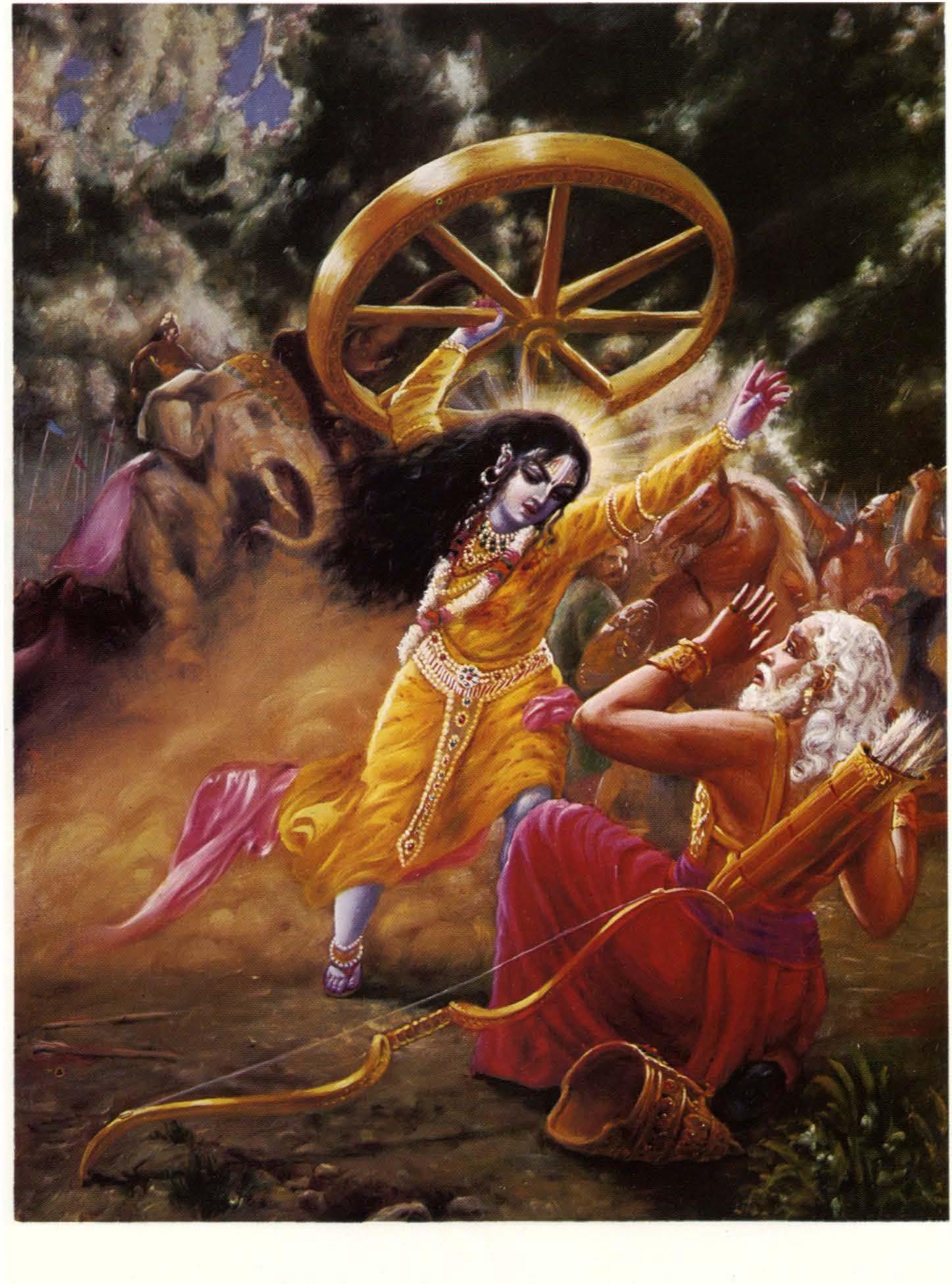

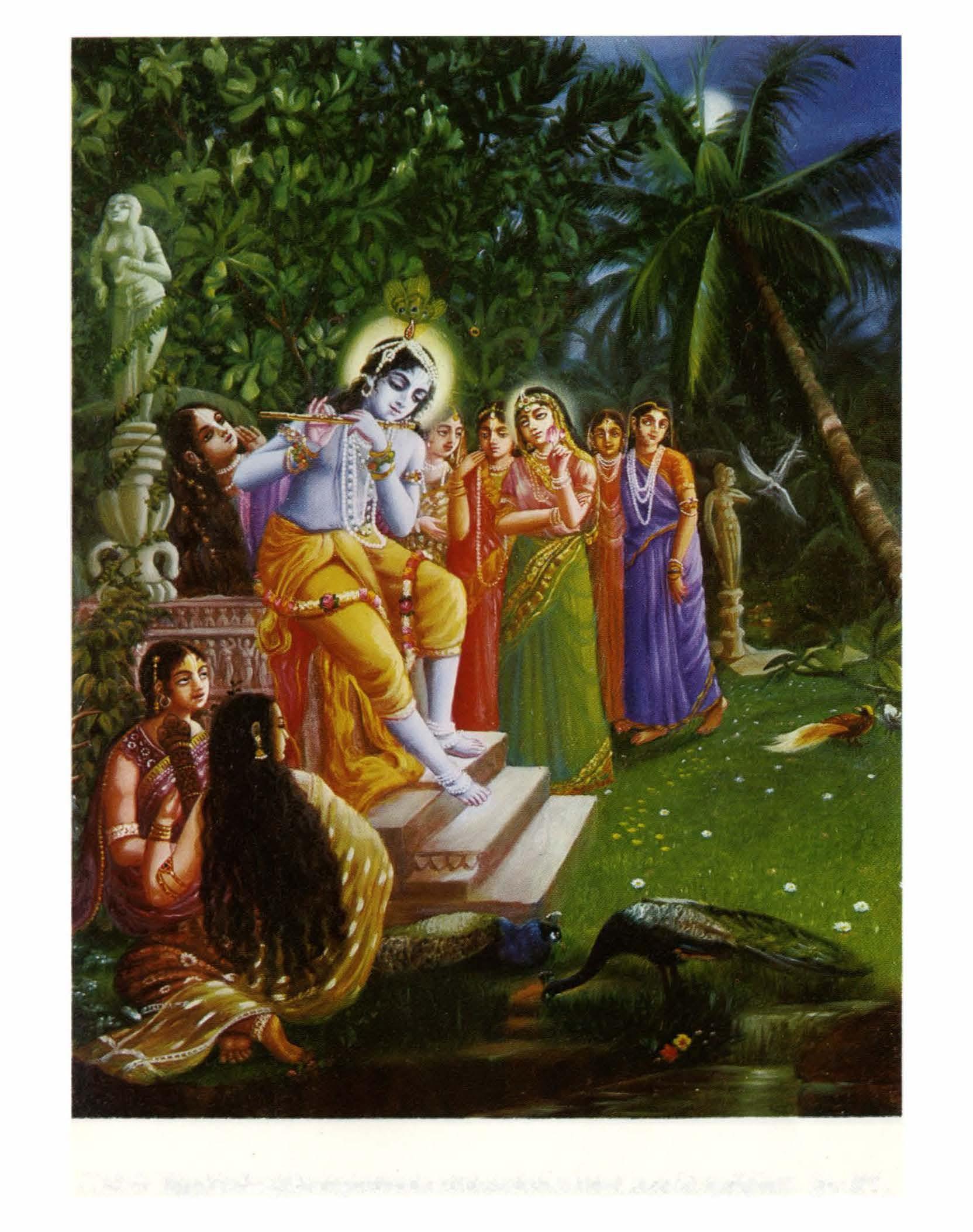 Plate 8 K��l).a's deep loving attitude attracted the damsels of Vrajadhama. (p. 495)
Plate 8 K��l).a's deep loving attitude attracted the damsels of Vrajadhama. (p. 495)
Plate 9 The gopiS imitated the characteristic movements of the Lord. (p. 495)
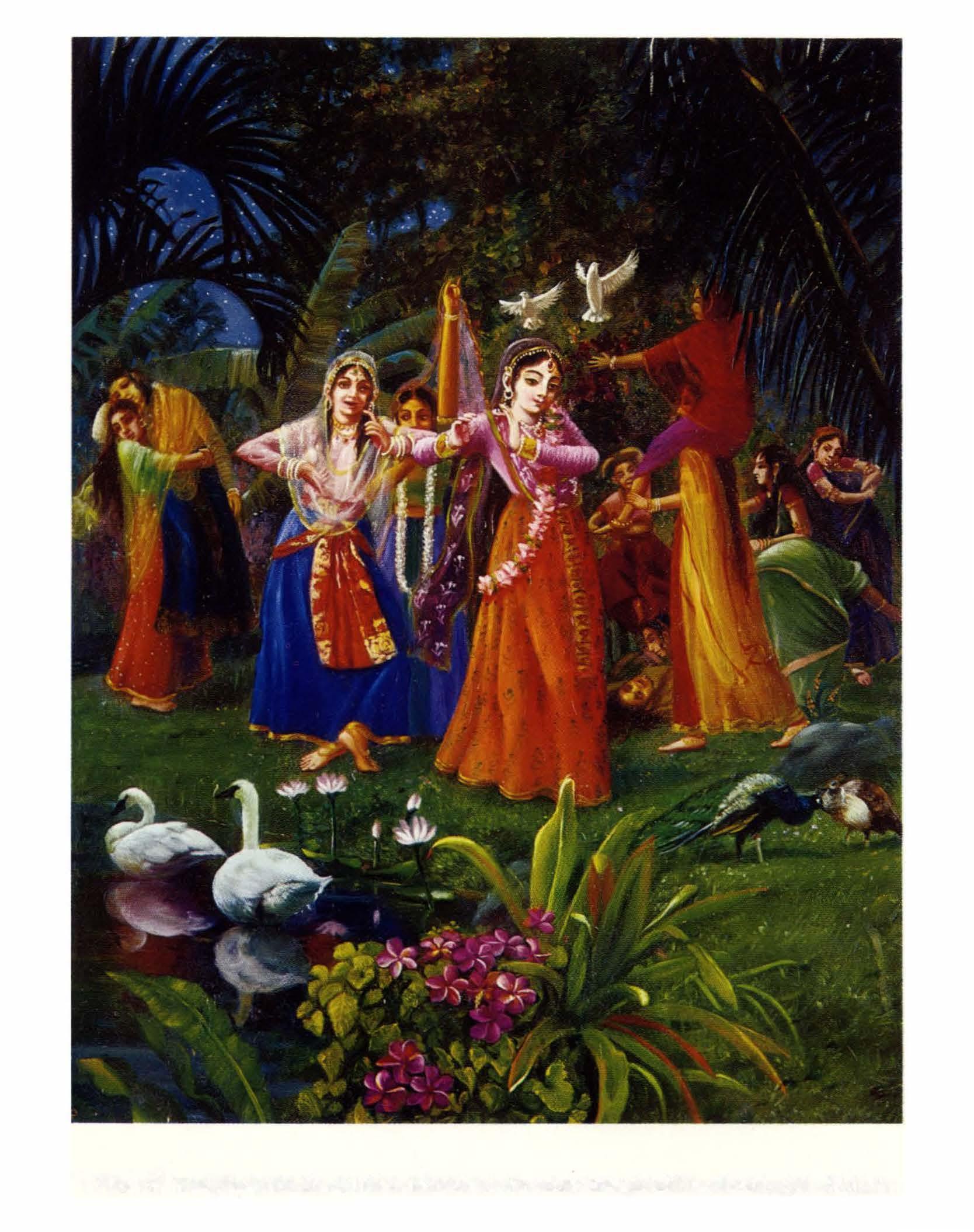
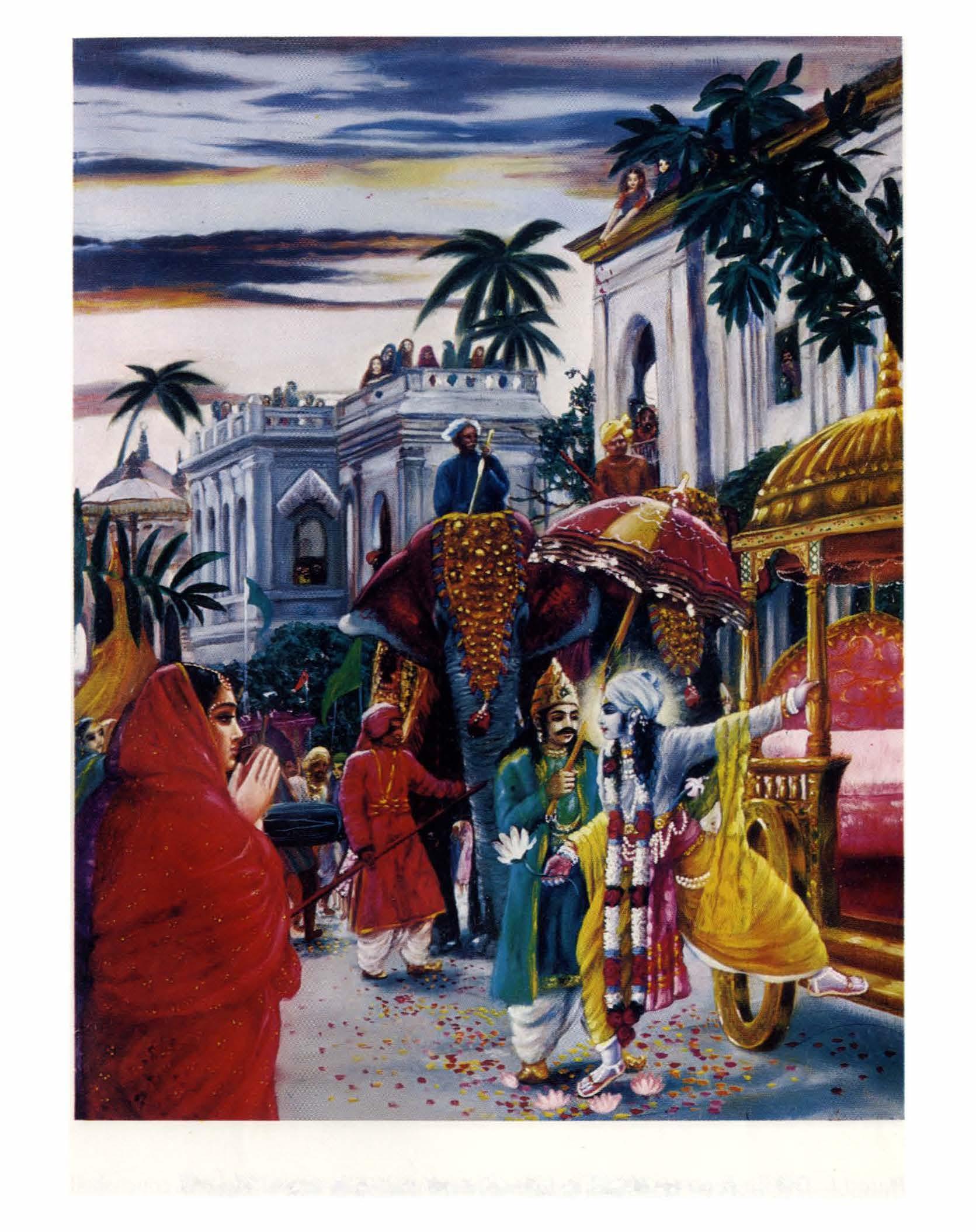 Plate 10 K{�I).a departed from the city of Hastinapura. (p. 549)
Plate 10 K{�I).a departed from the city of Hastinapura. (p. 549)

 Plate II The citizens of Dvaraka, having heard the vibration of K��Qa's conchshell, ran towards Him fast. (p. 557)
Plate II The citizens of Dvaraka, having heard the vibration of K��Qa's conchshell, ran towards Him fast. (p. 557)
Plate 12 The queens first embraced the Lord in the innermost recesses of their hearts. Then they embraced Him visually, and then they sent their sons to embrace Him.
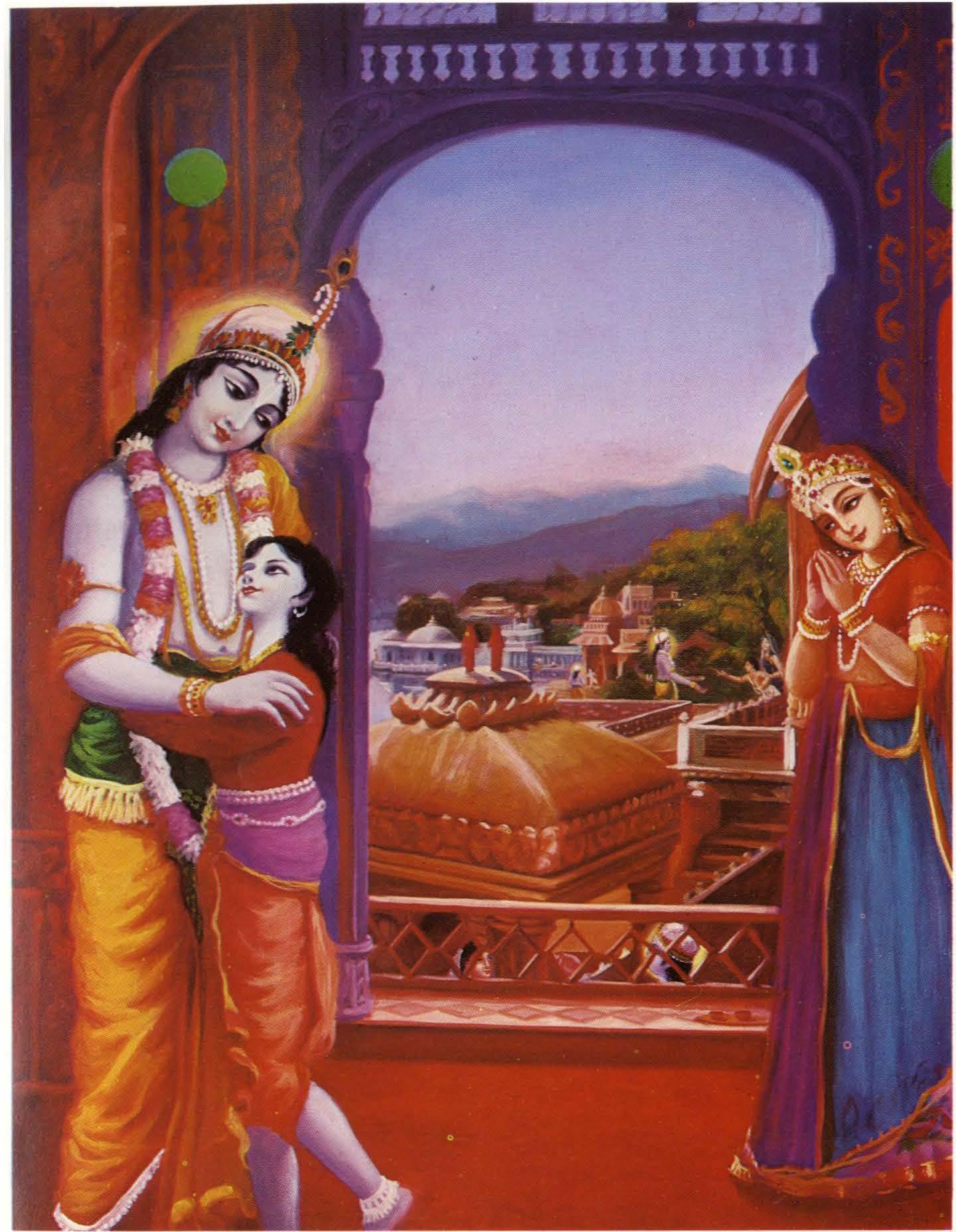
(p. 592)

Plate 13 King Yudhi�t.hira, very much satisfied by the birth of Maharaja Parik�it, had the purificatory birth ceremony performed. (p. 622)


Srlmad-Bhagavatam


Srlmad-Bhagavatam of K�SNA-DVAIPAYANA VYASA
kunty uviica namasye puru�am tviidyam
isvaram prakrteft param alak�yam sarva-bhutiiniim antar bahir avasthitam (p. 391)
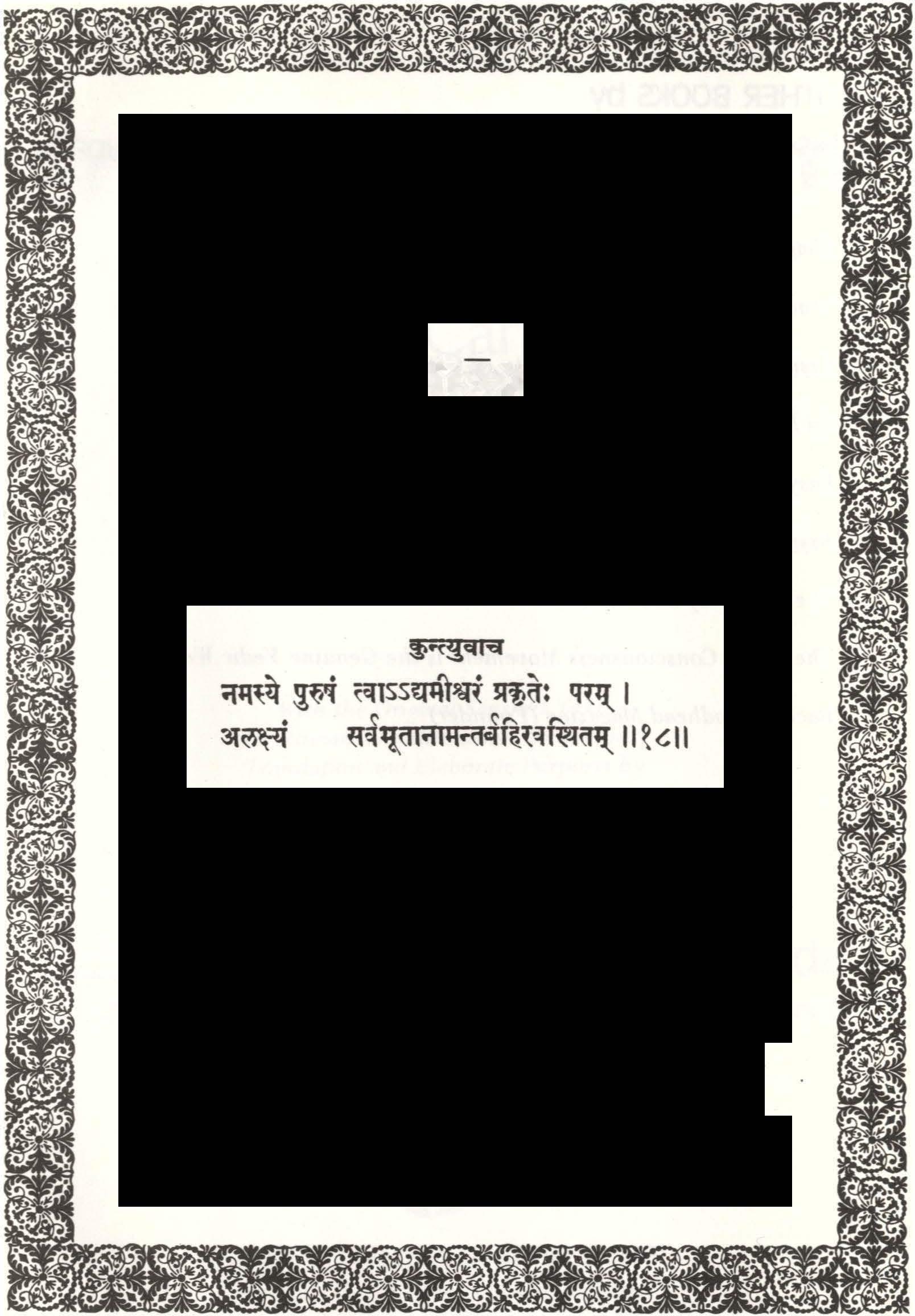

ALL GLORY TO SRT GURU AND GAURANGA
OTHER BOOKS by His Divine Grace A.C. Bhaktivedanta swami Prabhupada
Bhagavad-gitii As It Is
Teachings of Lord Caitanya
Kr§!la, the Supreme Personality of Godhead (2 volumes)


Easy Journey to Other Planets
Kr§!lU Consciousness: The Topmost Yoga System
The Nectar ofDevotion
The Krfi!la Consciousness Movement is the Genuine Vedic Way
Back to Godhead Magazine (Founder)
Srimad-Bhagavatam

First Canto
"Creation"
<Part Two-Chapters 8-12>
With the Original Sanskrit Text, Its Roman Transliteration, Synonyms, Translation and Elaborate Purports by His Divine Grace
A.C.
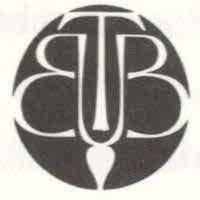
Bhaktivedanta swami Prabhupada
Founder-Acarya of the International Society for Krishna Consciousness
THE BHAKTIVEDANTA BOOK TRUST New York · Los Angeles
London
Bombay
·
·
Readers interested in the subject matter of this book are invited by the International Society for Krishna Consciousness to correspond with its Secretary.
International Society for Krishna Consciousness
3959 Landmark Street
Culver City, California 90230
© 1972 the Bhaktivedanta Book Trust
ALL RIGHTS RESERVED
Library of Congress Catalogue Card Number: 70-127183
International Standard Book Number: 0-912776-29-3
by
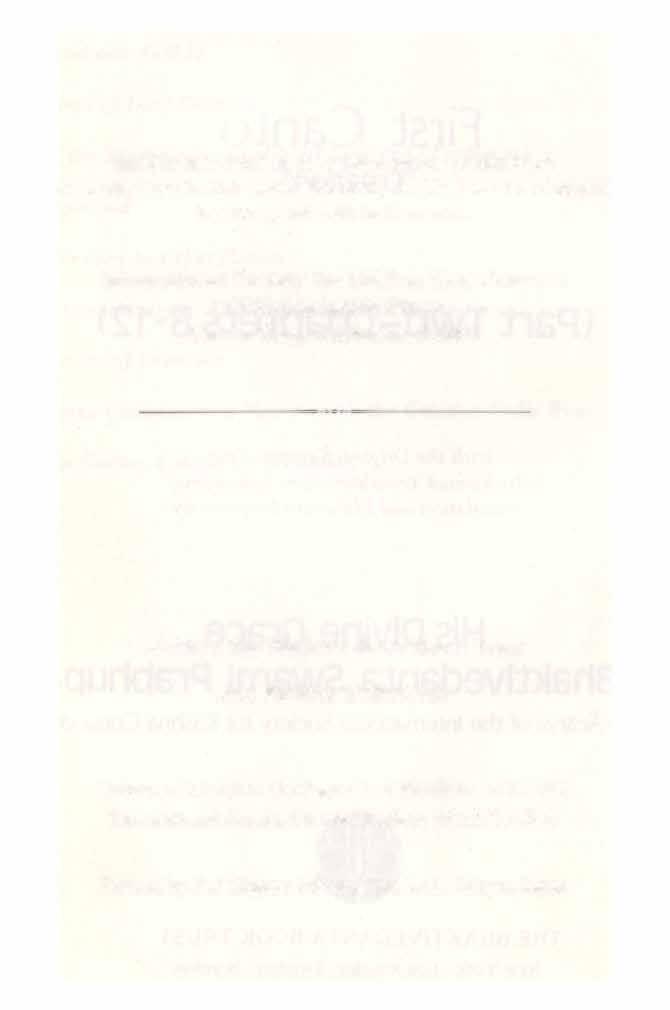
Printed
Dai Nippon Printing Co., Ltd., Tokyo, Japan
The Passing Away of BhT�madeva in

TABLE
CONTENTS CHAPTER EIGHT Prayers by Queen KuntT and ParTk�it saved 375 Mourning of the Kuru Family 376 Maharaja Yudhi�thira Begins to Reign 379 Parik�it Saved by Lord Kr�t:Ja 382 The All-Powerful Lord 388 Prayers by Kunti 390 The Lord Is Beyond the Range of the Senses 392 Kr�t:Ja, the Son of Vasudeva and Nanda 395 His Transcendental Position 397 Aristocracy Is a Disqualification for a Devotee 402 Lord Kr�t:Ja, a Mystery for Nondevotees 408 Kunti and Yasoda 411 Kunti's Feelings of Separation 420 Maharaja Yudhi�thira's Feelings of Sorrow 432
OF
CHAPTER NINE
the
Preparation for Bhi�madeva's Passing Away Assembly of All Learned Scholars His Sympathy for the Pal)�avas His Astonishment at the Pal)�avas' Plight Supernatural Power Recognized Estimation of Kr�t:Ja by Bhi�madeva v 439 439 443 452 456 457 459
Presence of Lord Kf$Oa

Vl Maharaja Yudhi��hira Instructed by Blu�ma 468 Bhi�ma's Prayer for Kr�l)a 479 Lord Kr�l)a's Beauty on the Battlefield 482 Fighting in Devotional Service 487 Kr�l)a Served by Martial Spirit 489 The Fighters' Salvation in the Presence of the Lord 492 Bhi�madeva Breathes His Last 502 CHAPTER TEN Departure of Lord Kr�oa for ovaraka sn The Government of Maharaja Yudhi��hira 511 The Lord Satisfied 512 The World State Under One Ruler 513 Prosperity of the World 514 Nature's Gifts 516 People Free from All Anxieties 519 The Lord's Returning Home 521 Separation Keenly Felt 522 Farewell to the Lord 524 A Scene of Spiritual Atmosphere 526 Ladies Talk Philosophy 531 The Estimation of Lord Kr�l)a 533 The Object of Vedic Knowledge 538 The Lord's Specific Appearance 539 Glorified Families 541 Dvaraka More Than Heaven S42 Glory to the Women Whose Husband Is the Lord 545 Affection of the King for Kr�l)a 550 Provinces the Lord Passed Through 551
VLl
Lord Kr�r:ta's Entrance into ovaraka 555 The Lord's Arrival Heralded 555 Description of Dviirakii 565 �M�G� �7 Festive Mood 568 Cleansed Roads Sprinkled with Scented Water 569 Houses Decorated 570 Devotee Prostitutes 575 The Lord's Blessings for All 579 Festival of Seeing the Lord 586 The Lord Meets His Mothers 588 Feelings Expressed 590 Mission Fulfilled 595 The Lord's Family Life Explained 597 His Transcendence 599 His Potency Inconceivable 602 Womanly Estimate of the Lord 604 CHAPTER TWELVE Birth of Emperor ParJk�it 607 Maharaj a Yudhi�thira, the Welfare King 611 His Widespread Fame 613 His Nonattachment to Material Happiness 614 Parik�it Observes the Lord in the Womb 615 His Thumb-like Shape 616 Four-handed Lord, Revolving His Club 617 Parik�it Takes Birth at an Auspicious Moment 621 Birth Ceremony of Parik�it 622 The King's Charity 624
CHAPTER ELEVEN
vnt The Briih martas' Foretelling The King's Inquiry on Parik�it's Future Parik�it's Future Foretold Comparison to Great Souls His Sad Death Foretold Why He Was Known as Parik�it The Kiug Performs Yajiias The Lord Goes Back With Arjuna 628 629 631 632 647 651 656 660
CHAPTER EIGHT
Prayers by aueen KuntT and ParTk$it saved
siita uviica atha te samparetiiniim sviiniim udakam icchatiim datum sa k!§IJii gangiiyiirh puraskrtya yayu/;1. striya/;1.
suta/;1. uvaca-Suta said; atha-thus; te-the Paryl)avas; samparetanamof the dead; sviiniim-of the relatives; udakam-water; icchatiim-willing to have; diitum-to deliver; sa lzr�rtiift-along with Lord Kr�rya; gangiiyiim-on the Ganges; puraslqtya-putting in the front; yayuft-went; striyaft- the women.


TRANSLATION
Siita Gosvami said: Thereafter the Pa��avas, desiring to deliver water to the dead relatives who had desired it, went to the Ganges with Lord Kr��a. The ladies walked in front.
PURPORT
To date it is the custom in the Hindu society to go to the Ganges or to any other sacred river to take bath when death occurs in the family. Each of the family members pours out a potful of the Ganges water for the departed soul and walks in a procession, with the ladies in the front. The
TEXT 1 �� 3l?t � �r;rt ���IUt::�i¥1..:.0!311{_ I � �un rrwr:rf�Ht����:�: II � II
375
Par;J.slavas also followed the rules more than five thousand years ago. Lord K[�r;J.a, being a cousin of the Par;J.slavas, is also amongst the family members.

TEXT 2
te niniyodakarh saroe vilapya ca bhrsarh punaft iiplutii hari-piidiibjarajafl, puta sarij jale
te-a!l of them;niniya-havingoffered;u.dakam-water;sarve-every one of them;vilapya-having lamented;ca-and;bl
TRANSLATION
Having lamented over them and sufficiently offered Ganges water, they bathed in the Ganges, whose water is sanctified due to being mixed with the dust of the lotus feet of the Lord.
TEXT 3
�f;j W!Rf mR� �1{_I
���'l�t;tiJff����:
tatriisinarh kuru-patirh dhrtarii�trarh sahiinujam
giindhiirirh putra-sokiirtiirh prthiirh knTJ.iirh ca miidl.m1afl,
II� II
tatra-there; iisinam-sitting; kuru-patim-thc King of the Kurus; dh_rtarii§tram-Dhrtara�tra; saha anujam-with his younger brother; giindhiinm-Gandhari; putra-son;soka-artam-overtaken by bereavement; p.rthiim-Kunti; knrziim-Draupadi; ca-also; miidhavaft-Lord Sri Kr�T)a.
376 Srimad-Bhiigavatam [Canto 1, Ch. 8
There the King of the Kurus, Maharaja Yudhi�thira, along with his younger brothers, Dhrtalii�tra, Gandhari, Kunti, Draupadi and also Lord Krsna all sat, overwhelmed with grief.
PURPORT
TheBattle of Kuruk�etra was fought between family members, and thus all affected persons were also family members like 1aharaja Yudhi�tfrira and brothers, Kunti, Draupadi, Subhadra, Dhrtara�tra, Gandhari and her daughters-in-law, etc. All the principal dead bodies were in some way or other related with each other, and therefore the family grief was combined. Lord Kr�!la was also one of them as a cousin of the Pa!l�avas and nephew of Kunti, as well as brother of Subhadra, etc. The Lord was, therefore, equally sympathetic toward all of them, and therefore He began to pacify them befittingly.

siintvayiimiisa munibhir
hata-bandhiiii suciirpitiin bhiite§U kiilasya gatirh
darsayan napratikriyiim
siintvayiimasa-pacified ; munibhift-along with the munis present there; hata-bandhun-those who lost their friends and relatives; sncarpitan-all shocked and affected; bhute§n - unto the living beings; kalasya-of the supreme law of the Almighty; gatim-reactions ; dars ay an-demonstrated; na-no; pratik riyiim-remedial measures.

TRANSLATION
Lord Sri Kr�!la and the munis began to pacify those who were shocked and affected, citing the stringent laws of the Almighty and their reactions upon living beings.
Text 4) Prayers by Queen Kunti 377
TRANSLATION
. . . '
PURPORT
The stringent laws of nature under the order of the Supreme Personality of Godhead cannot be altered by any living entity. The living entities are eternally under the subjugation of the Almighty Lord. The Lord makes all the laws and orders, and these laws and orders are generally called dharma or religion. No one can create any religious formula. Bona fide religion is to abide by the orders of the Lord. The Lord's orders are clearly declared in the Bhagavad-gitii. Everyone should follow Him only or His orders, and that will make all happy, both materially and spiritually. As long as we are in the material world, it is our duty to follow the orders of the Lord, and if by the grace of the Lord we are liberated from the clutches of the material world, then in our liberated stage also we can render transcendental loving service unto the Lord. In our material stage we can neither see ourselves nor the Lord for want of spiritual vision. But when we are liberated from the material affection and are situated in our original spiritual form we can see both ourselves as well as the Lord face to face. Mukti means to be reinstated in one's original spiritual status after giving up the material conception of life. Therefore, human life is specifically meant for qualifying ourselves for this spiritual liberty. Unfortunately, under the influence of illusory material energy, we accept this spot-life for a few years only as our permanent existence and thus become illusioned by possessing so-called country, home, land, children, wife, community, wealth, etc., which are false representations created by miiyii (illusion). And under the dictation of miiyii, we fight \vith one another to protect these false possessions. By cultivating spiritual knowledge, we can realize that we have nothing to do with all this material paraphernalia. Then at once we become free from material attachment. And this clearance of the misgivings of material existence at once takes place by association of the Lord's devotees who are able to inject the transcendental sound into the depth of the bewildered heart and thus make him practically liberated from all lamentation and illusion. That is a summary of the pacifying measures for those affected by the reaction of stringent material laws, exhibited in the forms of birth, death, old age and disease,.insoluble factors of material existence. The victims of war, namely, the family members of the Kurus, were lamenting the problems of death, and the Lord pacified them on the basis of knowledge.

378 Srimad - Bhagavatam [Canto l, Ch. 8
TEXT 5 �m�: ����-- 1 t�RtM�T� �: �q�: II� II
svam riijyarh kitavair hrtam
ghiitayitviisato riijiia�
kaca-sparsak§atiiyu§a�
sadhayitvii-having executed; ajata-satro� - of one who has no enemy; svam rajyam -own kingdom; kitava0 - by the clever (Duryodhana and party); hrtam-usurped; ghiitayitvii- having killed; asata[l-the unscrupulous; riijrwlJ-of the queen's; kaca-bunch of hair; spars'a-roughiy handled; T.:§ata- decreased ; iiyu§a/:1--by the duration of life.
TRANSLATION
The clever Duryodhana and his party cunningly usurped the kingdom of Yudhi�thira, who had no enemy. By the grace of the Lord, the recovery was executed, and the unscrupulous kings who joined with Duryodhana were killed by Him. Others also died, their duration of life being decreased for their having roughly handled the hair of Queen Draupadi.
PURPORT
In the glorious days, or before the advent of the age of Kali, the briihma[tas, the cows, the women, the children and the old men were properly given protection.
L The protection of the briihmartas maintains the institution of varrta and iiSrama, the most scientific culture for attainment of spiritual life.
2. The protection of cows maintains the most miraculous form of food, i.e., milk for maintaining the finer tissues of the brain for understanding higher aims of life.
3. The protection of women maintains the chastity of society by which we can get a good generation for peace, tranquility and progress of life.
4. The protection of children gives the human form of life its best chance to prepare the way of liberty from material bondage. Such protection of children begins from the very day of begetting a child by the purificatory process of Garbhiidhiina-sarhskiira, the beginning of pure life.

5. . The protection of the old men gives them a chance to prepare themselves for better life after death. This complete outlook is based on factors leading to successful humanity as against the civilization of polished cats and dogs.
The killing of these innocent creatures is totally forbidden because even by insulting them orre loses one's duration of life. In the age of Kali they
Text 5) Prayers by
Queen Kunti siidhayitviijiita-satro�
379
are not properly protected, and therefore the duration of life of the present generation has shortened considerably. In the Bhagavad-gitii it is stated that when the women become unchaste for want of proper protection, there are unwanted children called varr-a-smikaras. To insult a chaste woman means to bring about disaster in the duration of life. Dutt5asana, a brother of Duryodhana, insulted Draupadi, an ideal chaste lady, and therefore the miscreants died untimely. These are some of the stringent laws of the Lord, mentioned above.
TEXT 6 ���� f����t I

��: tftq;( W� ��ffi� II� II
yiijayitvasvamedhais tam tribhir uttamakalpaka* tad-yasa� piivanarh dik§u sata-manyor iviitanot
yiijayitvii-by performing; asvamedhaif!-yajiia in which a horse is sacrificed; tam-him (King Yudhi�thira); tribhif!- three; u ttama-best ; kalpakaif! - supplied with proper ingredients and performed byable priests; tat-that; yasa[t-fame; piivanam-virtuous ; dik§ u -all directions; satanwnyo[t-Iike the one who performed one hundred such sacrifices; ivalike; atanot-performed.
TRANSLATION
Lord Sri Kr�!la caused three well-performed ASvamedha-yajiias [horse sacrifices] to be conducted by Maharaja Y udhi�thira and thus caused his virtuous fame to be glorified in all directions, like that of Indra, who had performed one hundred such sacrifices.
PURPORT
This is something like the preface of the performances of Asvamedhayajiia by Maharaja Yudhi�thira. The comparison of 1aharaja Yudhi�thira to the King of heaven is significant. The King of heaven is thousands and thousands of times greater than Maharaja Yudhi�thira in opulence, yet the fame of Maharaja Yudhi�thira was not less. The reason is that Maharaja

380 Srimad-Bhagavatam [Canto 1, Ch. 8
Yudhi�thira was a pure devotee of the Lord, and by His grace only he was on the level of the King of heaven, even though King Yudhi�thira performed only three yajiias, whereas the King of heaven performed hundreds. That is the prerogative of the devotee of the Lord. The Lord is equal to everyone, but a devotee of the Lord is more glorified because he is always in touch with the all-great. The sun rays are equally distributed, but still there are some places which are dark always.This is not due to the sun but to the receptive power. Similarly, those who are cent percent devotees of the Lord get the full-fledged mercy of the Lord, which is always equally distributed everywhere.
TEXT 7

iimantrya piir-!lu-putriirhs ca saineyoddhava-sarhyuta� dvaipiiyaniidibhir vipraifl. piijitaifl. pratipiijita�
iimantrya-inviting; piir-flu-putriin-all the sons of Pal).Q.u; ca-also; saineya-Satyaki;uddhava-Uddhava;sarhyuta�-accompanied;dvaipiiyanaiidibhi�-by the r�is like Vedavyasa, etc.; viprai[t-by the briihmar-as; piijitaifl.- being worshiped; pratipujita�-also the Lord reciprocated equally.
TRANSLATION
Lord Sri Kr�!la then prepared for His departure. He invited the sons of Pa!J.�U, after having been worshiped by the brahma!J.aS, headed by Srila Vyasadeva. The Lord also reciprocated greetings.

PURPORT
Apparently Lord Sri Kr�!la was a k§atriya and was not worshipable by the briihmar-as. But the briihmar-as present there, headed by Srila Vyasadeva, all knew Him to be the Personality of Godhead, andtherefore they worshiped Him, but the Lord reciprocated the greetings just to honor the social order that a k§atriya is obedient to the orders of the briihmar-as.
Text 7] Prayers by Queen Kunti 381
Although Lord Sri Kf�pa was always offered the respects of the Supreme Lord from all responsible quarters, the Lord never deviated from the customary usages between the four orders of society. The Lord purposely observed all these social customs so that others would follow Him in the future.
TEXT 8
ganturh krtamatir brahman dviirakiirh ratham iisthita� upalebhe 'bhidhiivantim uttariirh bhaya-vihvaliim

gantum-just desiring to start; krtamati�-having decided; brahman-0 briihmarza; dviirakiim- towards Dvaraka; ratham-on the chariot; iisthita�seated; upalebhe -saw; abhidhiivantim-coming hurriedly; uttariim-Uttara; bhaya-vihvaliim- being afraid.
TRANSLATION
As soon as He seated Himself on the chariot to start for Dvaraka, He saw Uttara hurrying toward Him in fear.
PURPORT
All members of the family of the Pap9avas were completely dependent on the protection of the Lord, and therefore the Lord also protected all of them in all circumstances. The Lord protects everyone, but one who depends completely upon Him is especially looked after by the Lord. The father is more attentive to the little son who is exclusively dependent on the father. TEXT
382 Srimad-Bh agavatam [Canto l, Ch. 8
� �f�� m� mTfm: 1 ��sflNT�� ��'J:_II � II
:a-a<t<:u"iif � tnft �P�tft1..-a.'4a.IE4 iit� I � �� � ��: mtR'J:_II Q,II
9
Prayers by Queen Kunti
piihi piihi mahii--yogin deva-devajagat-pate
niinyam tvad abhayam pasye
yatra mrtyu[l parasparam
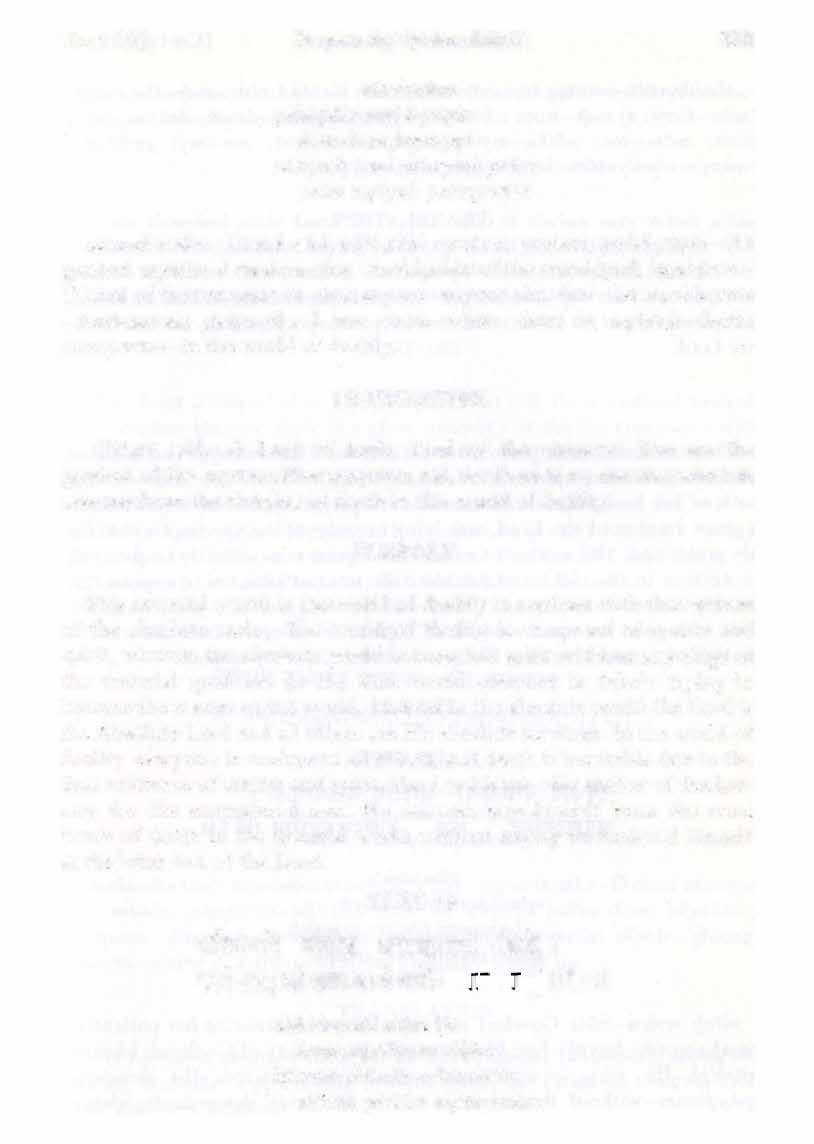
uttaraft uviica-Uttar a said;piihi piihi-protect, protect; mahii-y ogin-the greatest mystic; deva-deva-the worshipable of the worshiped;jagat-pate0 Lord of the universe; na-not; anyam-anyone else; tvat-Your; abhayam -fearlessness; pasye-do I see; yatra-where there is; m.rtyuft-death ; paras param -in the world of duality.



TRANSLATION
Uttara said: 0 Lord of lords, Lord of the universe! You are the greatest of the mystics. Please protect me, for there is no one else who can save me from the clutches of death in this world of duality.
PURPORT
This material world is the world of duality in contrast with the oneness of the absolute realm. The world of duality is composed of matter and spirit, whereas the absolute world is complete spirit without any tinge of the material qualities. In the dual world everyone is falsely trying to become the master of the world, whereas in the absolute world the Lord is the Absolute Lord and all others are His absolute servitors. In the world of duality everyone is envious of all others, and death is inevitable due to the dual existence of matter and spirit. The Lord is the only shelter of fearlessness for the surrendered soul. No one can save himself from the cruel hands of death in the material world without having surrendered himself at the i:llus feet of the Lord.
abhidravati miim isa
saras taptiiyaso vibho
kiimam dahatu miim niitha
mii me garbho nipiityatiim
Text 10)
uttaroviica
383
TEXT 10 3lfiwnij �TP.ro 4H�HPH1l �m I ��11f ;w.r liT itrr+it II� o II
abhidravati-coming towards; miim-me; "iSa-0 Lord; sara[l- the arrow; tapta-fiery; ayasa[l-iron; vibho-the great; kiimam-desire ; dahatu-let it burn; miim-me; niitha-my protector; mii-not; me-my; garbha[lembryo; nipiityatiin1-be aborted.
TRANSLATION
0 my Lord, You are all-powerful. A fiery iron arrow is coming towards me fast. My Lord, let it burn me personally, if You so desire, hut pleasedo not let itburn and abort my embryo.Please do me thisfavor, my Lord.
PURPORT
This incidence took place after the death of Abhimanyu, the husband of Uttara. As the widow of Abhimanyu, she should have followed the path of her husband, but because she was pregnant and Maharaja Parik�it, a great devotee of the Lord, was lying in embryo, she was responsible for his protection. The mother of a child has a great responsibilityin giving all protection to the child, and therefore she was not ashamed to express this frankly before Lord Kr�tla. Uttara was the daughter of a great king, the wife of a great hero and student of a great devotee, and later she was the mother of a good king also. She was fortunate in every respect.

TEXT ll �('(�
i31NN
�::fFl�'ffii!4«1�:
siita uviica
upadhiirya vacas tasyii

bhagaviiri bhakta-vatsala[l
apiirz!lavam idarh karturh
draurzer astram abudhyata
siitab uvac a-Siita Gosvami said; upadharya-by hearing her patiently; vaca[l-words; tasyii[l-her; bhagaviin-the Personality of Godhead; bhaktavatsala[l-He who is very much affectionate towards His devotees; apiirz!lavam-without the existence of the Piil)t;lavas' descendants; idam-
384 Srimad-Bhagavatam [Canto l, Ch. 8
!!4"i'.f��ttl
I q ���««r II� �II
this; kartum-in order to do it; draur-efl.-of the son of Drop.acarya; astram -weapon; abudhyata-understood it.
TRANSLATION
Suta Gosvami said: Lord Sri Kr�f.la, who is always very much affectionate to His devotees, having patiently heard her words, could at once understand that ASvatthama, the son of Dro!lacarya, had thrown the brahmastra to finish the last life in the Pa!lc;lava family.
PURPORT
The Lord is impartial in every respect, but still He is inclined towards His devotees because there is a great necessity of this for everyone's wellbeing. The Pap.c;lava family is a family of devotees, and therefore the Lord wanted them to rule the world. That was the reason that He vanquished the rule of the company of Duryodhana and established the rule of Maharaja Yudhi�thira. Therefore, He wanted to protect 1aharaja Parik�it also, who was lying in embryo. He did not like the idea that the world should be without the Pap.�avas, the ideal family of devotees.
TEXT 12

�CJNw;r�g �t: q� m� I
3T1�'4o:tlsflU!��'fm;rr��"1:1l(i4J�q1a:§.:IIZ�II
tarhyeviithamuni-sre§fha piir-{laviifl.paiica siiyakiin iitmano'bhimukhiindiptiin iilak§yiistriir-yupiidadufl.
tarhi.,...for that; eva-also;atka-therefore;muni-sre�fha-0 chief amongst the munis; piir-{laviifl.-all the sons of Pap.9u; paiica-five ; siiyakiinweapons; iitmanafl.-own selves; abhimukhiin-towards; diptiin-glaring; iilak§ya-seeing it; astriir-i-weapon; upiidadufl.-took up.
TRANSLATION
0 foremost amongst the great thinkers [munis] [Saunaka), seeing the glaring brahmastra proceeding towards them, the Pa!lc;lavas took up their five respective weapons.
Text 12) Prayers by Queen Kunti 385
PURPORT
The brahmiistras are finer than the nuclear weapons. Asvatthama discharged the brahmiistras simply to kill the Pa!l-9-avas, namely the five brothers headed by Maharaja Yudhi�thira and their only grandson lying within the womb of Uttara. Therefore the brahmiistra, more effective and finer than the atomic weapons, was not as blind as the atomic bombs. When the atomic bombs are discharged they do not disci-iminate between the target and others. iainly the atomic bombs do harm to the innocent because there is no control. The brahmiistra is not like that. It marks out the target and proceeds accordingly without harming the innocent.
TEXT 13


vyasanarh vik§ya tat te�iim ananya-vi§ayiitmaniim sudarsanena sviistrerza sviiniirh rak§iirh vyadhiid vibhu[l

vyasanam-great danger; vik§ya-having observed it; tat-that; te§iimtheir; ananya-any other; vi§aya-means ; iitmaniim-thus inclined; sudarsanena-by the wheel of Sri Kr�f}a; sva astrerza-by the weapon; sviiniim-of His own devotees; rak{iim-protection; vyadhiit-did it; vibhu{l -the Almighty.
TRANSLATION
The Almighty Personality of Godhead Sri Kf�l).a, having observed that a great danger was befalling His unalloyed devotees who were fully surrendered souls, at once took up His Sudarsana disc in order to protect them.
PURPORT
The brahmiistra or the supreme weapon released by Asvatthama was something similar to the nuclear weapon but with more radiation and
386 Srimad-Bhagavatam [Canto l, Ch_ 8
heat. This brahmiistra is the product of a more subtle scien e, being the product of a finer sound or mantra recorded in the Vedas. Another advantage of this weapon is that it is not blind like the nuclear weapon because it can be directed only to the target andnothing else. svatthama relea ed the weapon just to finish all the male member of Pa!19u's family; therefore in one sense it was more dangerous than the atomic bombs because it could penetrate even the most protected place and would never miss the target. Knowing all this, Lord Sri Kr�!la took up at once His personal weapon to protect His devotees, who did not know anyone other than Kr�!la. In the Bhagavad-gitii the Lord has clearly promised that His devotees are never to be vanquished. And He behaves according to the quality or degree of the devotional service by the devotees. Here the word ananya-vi§ayiitmaniim is significant. The Par)t;lavas were cent percent dependent on the protection of the Lord, although they were all great warriors themselves. But the Lord neglects even the greatest warrior and also vanquishes them in no time. When the Lord saw that there was no time for the Pa!19.avas to counteract the brahmiistra of ASvatthama, He took up the weapon even at the risk of breaking His own vow. Although the Battle of Kuruk�etra was almost finished, still, according to His vow, He should not have taken up His own weapon. But the emergency was more important than the vow. He is better known as the bhakta-vatsala, or the lover of His devotee, and thus He preferred to continue as bhakta-vatsala than to be a worldly moralist who never breaks his solemn vow.
TEXT 14


�:�: ���aRI'IRiiT tiTlt�l m: 1
�qp:r:nsst� �m: �� 11��11
anta�stha� sarva-bhutiiniim iitmii yogesvaro hari�
svamiiyayii "vr!lod garbham
vairiityii� kuru-tantave
antaflSthafr.-being within; sarva-all; bhutiiniim-of the living beings; iitm!I-soul; yoga-isvara�-the Lord of all mysticism; harifr.-the Supreme Lord; svamiiyayii-by the personal energy; iivr!lot-covered; garbhamembryo; vairiityiifr.-of Uttara; kurn-tantave-for the progeny of Maharaja Kuru.
Text 14] Prayers by Queen Kunti 387
TRANSLATION
The Lord of supreme mysticism Sri Kr�!la resides within everyone's heart as the Paramatma. As such, just to protect the progeny of the Kuru dynasty, He covered the embryo of Uttara by His personal energy.
PURPORT
The Lord of supreme mysticism can simultaneously reside within everyone's heart, or even within the atoms, by His Paramatma feature, His plenary portion. Therefore, from within the body of Uttara He covered the embryo to save Maharaja Parik�it and protect the progeny of Maharaja Kuru in which King Pa!l�U was also a descendant. Both the sons of Dhftarii�!ra and those of Pa!l�u all belonged to the same dynasty of 1aharaja Kuru; therefore both of them were generally known as Kurus. But particularly, when there were differences between the two brothers' families, the sons of Dhftarii�!ra were known as Kurus while the sons of Par:H;lu were known as Pii!l�avas. Since the sons andgrandsons of Dhftarii�!ra were all killed in the Battle of Kuruk�etra, the last son of the dynasty is thus designated as the son of the Kurus.

TEXT
��300m����11�'-\11
yadyapy astram brahma-siras
tv amogham ciipratikriyam
vai§r-avam teja iisadya
samasiimyad bhrgiidvaha
yadyapi-although; astram-weapons; brahma-Brahma; sira{t-supreme; tu-but; amogham-without check; ca-and; apratikriyam-not to be counteracted; vai_srwvam-in relation with Vi�!lu; teja{t-strength; iisiidyabeing confronted with; samasamyat-was neutralized; bhrgiidvaha-0 glory of the family of Bhfgu.

TRANSLATION
0 Saunaka, although the supreme brahmastra weapon released by ASvatthama was irresistible and without check or counteraction, when confronted by the strength of Vi�!lU [Lord Kf�!la], it was neutralized and foiled.
388 Srimad-Bhagavatam [Canto l, Ch. 8
if��H€:�+tlq ���I
15 ��
PURPORT
In the Bhagavad-gitii it is said that the brahmajyoti or the glowing effulgence transcendental is resting on Lord Sri Kr�J).a. In other words, the glowingeffulgence kriownas brahmatejas is nothing but the rays of the Lord, just as the sun rays are rays of the sun disc. So this Brahma weapon also, although materially irresistible, could not surpassthe supreme strength of the Lord. The weapon called brahmasiras, released by Asvatthama, was neutralized and foiled by Lord Sri Kr�l).a by His own energy; that is to say, He did not wait for any other's help because He is absolute.
TEXT 16

mii marhsthii hy etad iiscaryarh sarviiscaryamaye 'cyute ya idarh miiyayii devyii srjaty avati hanty aja[z
mii-do not; marhsthii[z-think it; hi-certainly; etat-all these; iiscaryam -wonderful; sarva-all; ascaryamaye-in the all-mysterious; acyute-the infallible; ya[z-one who; idam-this (creation); miiyaya-by His energy; devyii-transcendental; s .rjati-creates; avati-maintains; hanti-annihilates; aja[z-unborn.
TRANSLATION
0 brahmaJ).aS, do not think this to be especially wonderful in the activities of the mysterious and infallible Personality of Godhead. It is so because He, by His own transcendental energy, maintains and annihilates all material things, although He Himself is unborn.
PURPORT
The activities of the Lord are always inconceivable to the tiny brain of the living entities. Nothing is impossible for the Supreme Lord, but all His actions are wonderful for us, and thus He is always beyond the range of our conceivable limits. The Lord is the all-powerful, all-perfect Personality of Godhead. The Lord is cent percent perfect, whereas others, namely
Text 16] Prayers by Queen Kunti 389
'tl �� ��� ��JtitST;�� I • "' r-. � �� �Olfl���ij ���: 11��11
Brahma, 1iiraya�1a, Siva, the demigods and all other living beings, possess only different percentages of such perfection. No one is equal to or greater than Him. He is unrivalled.
TEXT 17 � � =lj'>IJllll I w:rrllflfq{({ '!i"OJiif��l� �T mtr II �\911


brahma-tejo vinirmuktair
iitmajaift saha kn1Jayii

prayiiriibhimukhmh kn1Jam
idam iihaprthii sati
brahma-teja[l,-radiation of the brahmiistra; vinirmuktai[l,-being saved from; iitmajai[l,-along with her sons; saha-with; k_r§TJayii-Draupadi; prayiira-outgoing; abhimukham-towards; kn1Jam-unto Lord Kr�IJ.a; idam-this; iiha-said;prthii-Kunti; sati-chas�e, devoted to the Lord.
TRANSLATION
Thus saved from the radiation of the brahmastra, Kunti, the chaste devotee of the Lord, and her five sons and Draupadi, addressed Lord Kr��a as He started for home.
PURPORT
Kunti is described herein as sati, or chaste, due to her unalloyed devotion to Lord Sri Kr��a. Her mind will just now be expressed in the following prayers for Lord Kr��a. A chaste devotee of the Lord does not look to others, namely any other living being or demigod, even for deliverance from danger. That was all along the characteristic of the whole family of the Pat;u;lavas. They knew nothing except Kr�qa, and therefore the Lord was also always ready to help them in all respects and in all circumstances. That is the transcendental nature of the Lord. He reciprocates the dependence of the devotee. One should not, therefore, look for help from imperfect living beings or demigods, but one should look for all help from Lord Kr�!la, who is competent to save His devotees. Such a chaste devotee also never asks the Lord for help, hut the Lord, out of His own accord, is always anxious to render it.
390 Srimad-Bhagavatam [Canto l, Ch. 8
Prayers by Queen Kunti
TEXT 18

'!§'l'($41"a
kunty uviica
namasye puru�am tviidyam
iSvaram prakrte� param alak�yarh saroa-bhutiiniim antar bahir avasthitam
kunti nviica-Srimati Kunti said; namasye-let me how down; pnru�am-the Supreme Person; tvii-You; iidyam-the original; iSvaram -the controller; prakrte[l-of the material cosmos; param-beyond; alak§yam-the invisible; saroa-all; bhutiiniim-of living beings; anta�within; bahi[l-without; avasthitam-existing.



TRANSLATION
Srimati Kunti said: 0 Kr�I_la, I offer my obeisances unto You because You are the original personality and are unaffected by the qualities of the material world. You are existing both within and without everything, yet You are invisible to all.
PURPORT
Srimati Kuntidevi was quite aware that Kr�l)a was the original PersonaJity of Godhead, although He was playing the part of her nephew. Such an enlightened lady could not commit a mistake by offering obeisances unto her nephew. Therefore, she addressed Him as the original pum§a beyond the material cosmos. Although all living entities are also transcendental, they are neither original nor infallible. The living entities are apt to fall down under the clutchesof material nature,but the Lord is never like that. In the Vedas, therefore, He is described as the chief amongst all living entities. Then again He is addressed as iSvara, or the controller. The living entities or the demigods like Indra, Candra, Surya, etc., are also to some extent isvara, but none of them is the supreme iSvara or the ultimate controller. Heis the paramesvara, orthe Supersoul. He is both withinand with-
Text 18)
�'� � ��nss�rm ��:
. � �'"' '"'
� 1
3l� W-4 n���M� II��II
391
out. Although He was present before Srimati Kunti as her nephew, He was also within her and everyone else. In the Bhagavad-gita the Lord says (Bg. 15.15), "I am situated in everyone's heart, and due to Me only one remembers, forgets and is cognizant, etc. Through all the Vedas I am to be known because I am the compiler of the Vedas, and I am the teacher of the Vedanta." Queen Kunt1 affirms that the Lord, although both within and without all living beings, is still invisible. The Lord is, so to speak, a puzzle for the common man. Queen Kunti experienced personally that Lord Kr�':la was present before her, yet He entered within the womb of Uttara to save her embryo from the attack of Asvatthama's brahmastra. Kunt1 herself was puzzled whether Sri KH':la is all-pervasive or localized. In fact, He is both, but He reserves the right of not being exposed to persons who are not surrendered souls. This checking curtain is called the maya energy of the Supreme Lord,and it controls the limited vision of the rebelled soul. It is explained as follows.

TEXT 19

t{ml1 wro ;n� ;:r?.�T ����II
maya-javanikiicchannam ajiiiidhok§ajam avyayam na lak�yase mi:u)ha-drfa na[o nii[yadharo yatha
maya-deluding ; javanik a-curtain; acchannam-covered by; ajiiaignorant; adhok�ajam-beyond the range of material conception (transcendental); avyayam-irreproachable; na-not; lakuase-observed; miit;lhad.riii-by the foolish observer; na[afl-artist ; nii[ya-dharafl-dressed as a player; yatha-as.
TRANSLATION
Being beyond the range of limited sense perception, the eternally irreproachable factor covered by the curtain of deluding energy, You are invisible to the foolish observer, exactly as an actor dressed as a player is not recognized.
392 Srimad-Bhagavatam [Canto l, Ch. 8
I
WI�
In the Bhagavad-gitii the Lord affirms that less intelligent personv mistake Lord Sri Kr�':la to be an ordinary man like us, and thus they deride Him. The same is confirmed herein by Queen Kunti. The less intelligent persons are those who rebel against the authority of the Lord. Such per· ons areknown as asuras. The asuras cannot recognizethe Lord'sauthority. When the Lord appears Himself amongst us, as Rama, Nrsimha, Varaha or in His original form a Kr�l)a, He performs many wonderful acts which are humanly impossible. As we shall find in the Tenth Canto of this great literature, Lord Sri Kr�':la exhibited His humanly impossible activities even from the days of His lying in the lap of His mother. He killed the Ptttana witch, although she smeared her breast ·with poison just to kill the Lord. The Lord sucked her breast like a natural baby, and He sucked out her very life also. Similarly, He lifted the Govardhana Hill, just as a boy picks up a frog's umbrella, and stood several days continually just to give protection to the residents of Vrndavana. These are some of the superhuman activitiesof the Lord described in the authoritative Vedicliteratures like the Puriirws, Itihiisas (histories), Upani§ads, etc. He has delivered wonderful instructions in the shape of the Bhagavad-gitii. He has shown marvelous capacities as a hero, as a householder, as a teacher and as a renouncer. He is accepted as the Supreme Personality of Godhead by such authoritative personalities as Vyasa, Devala, Asita, Narada, Madhva, Sankara, Ramanuja, Sri Caitanya Mahaprabhu, ]Iva Gosvami, Visvanatha Cakravarti, Bhaktisiddhanta Sarasvati and all other authorities of the line. He has Himself declared as much in many places of the authentic literatures. And yet there is a class of men with demoniac mentality who are always reluctant to accept the Lord as the Supreme Absolute Truth. This is partially due to their poor fund of knowledge and partially due to their stubborn obstinacy which results from various misdeeds in the past and present. Such persons could not recognize Lord Sri Krwa even when He was present before them. Another difficulty is that those who depend more on their imperfect senses cannot realize Him as the Supreme Lord. Such persons are like the modern scientist. They want to know everything by their experimental knowledge. But it is not possible to know the Supreme Person by imperfect experimental knowledge. He is described herein as adhok§aja, or beyond the range of experimental knowledge. All our senses are imperfect. We claim to observe everything and anything, but we must admit that we can observe things under certain material condi-



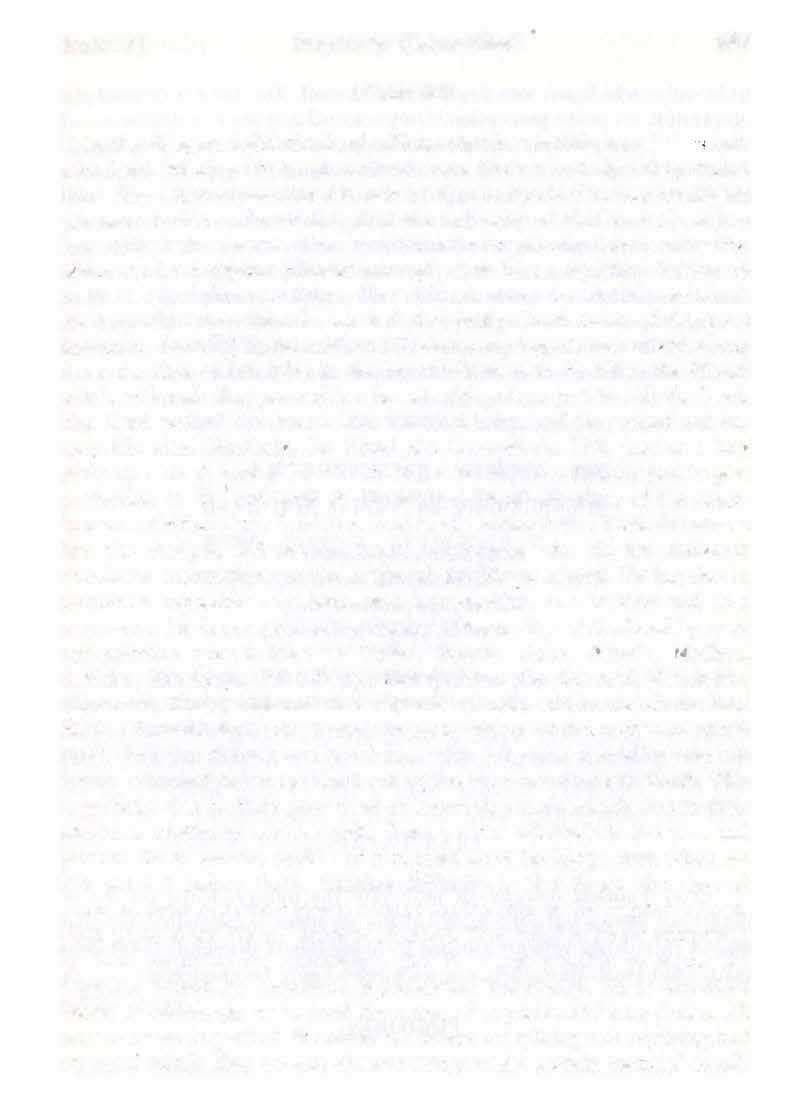
Te�'i 19) Prayers by Queen Kunti 393
PURPORT
tions only , which are also beyond our controL The Lord is beyond the ob ervation of sense perception . Queen Kunti accepts thi deficiency of the conditioned soul , especially of the woman class who are less intelligent. For less intelligent men there must be such things as temples, mosques or chun:hes so Lhat they may begin to recognize the authority of the Lord and hear about Him from authorities in such holy place". For less intelligent men, such beginning of spiritual life is essential, and only foolish men decry the establishment of such places of worship, which are required to raise the standard of spiritual attributes for the mass of people. For less intelligent person , bow ing down before the authority of the Lord, as is generally done in the temples, mosques or churches, is as beneficial as it is for the advanced devotees to meditate upon Him by active service.
TEXT 20




tathii parama-hamsiiniirh muniniim amaliitmaniim bhakti-yoga-vidhiin-iirtham katham pasyema hi striya�
tathii-besides that;parama-hamsiiniim-of the advanced transcendentalists· muniniim-of the great philosophers or mental speculators; amalaiitmaniim-those whose minds are competent to discern between spirit and matter; bhakti-yoga-the science of devotional service; vidhiina-artham -for executing; katham-how; pasyema- can observe; hi-certainly; striyaft -women.
TRANSLATION
You Yourself descend to propagate the transcendental science of devotional service unto the hearts of the advanced transcendentalists and mental speculators who are purified by being able to discriminate between matter and spirit. How, then, can we women know You perfectly?
PURPORT
Even the greatest philosophical speculators cannot have acce to the region of the Lord. It is said in the Upani§ads that the Supreme Truth
394 Srimad-Bhagavatam [Canto I, Ch. 8
���;mr_ 1
� TR+n{etwrl
���ftf�: ll�oll
Absolute Personality of Godhead is beyond the range of the thinking power of the greatest philosopher. He is unknowable by great learning or by the greate�t brain. He is only knowable b one ' ho has llis mercy. Oth rs may go on thinking about Him for years together , yel lie is tillknow able. This very fact is corroborated by the Queen, and .lw i pla. ing the part of an innocent woman. Women in general are unable to speculate like philosophers, but they are blessed by the Lord Lecause they believe at once in the uperiority and almightines of the Lord, and Uu1 Ihey offer obei ance without reservation. The Lord is so kind that lie does not only o:ho\ special fa or to one who is a great philosopher . ffc know:' the sincerity of purpo e. For this reason onl , women generally asscmLI · in great number in any sort of religious function. In every country and in e cry sect of religion it appears that the women are more interc ted than the men. This simplicity of acceptance of the authority of the Lord IS more effective than showy insincere religious fervor.
TEXT 21
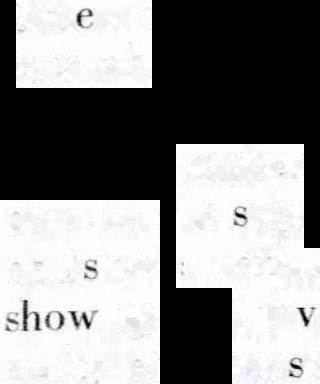
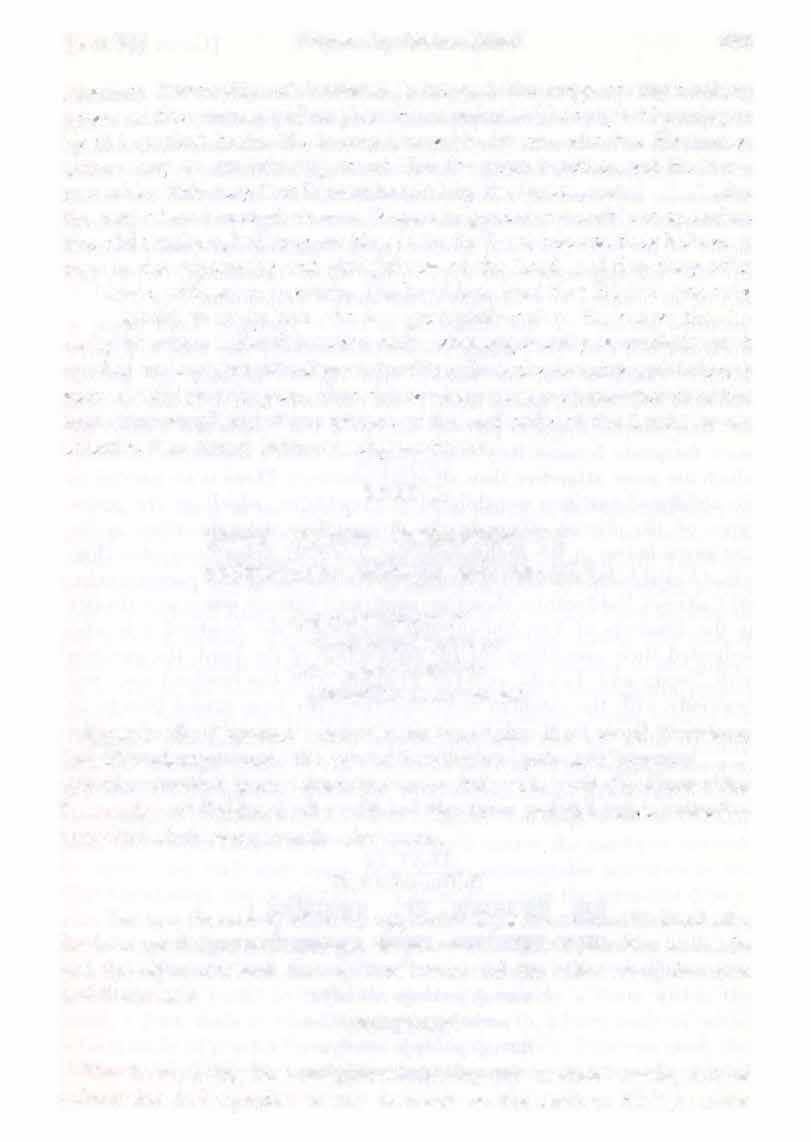
� tf�A �'l;{��ltt :q I
�;;.::•rN�'iRA •i'IP-4;;.::1� wt'IT ;{If: II��II


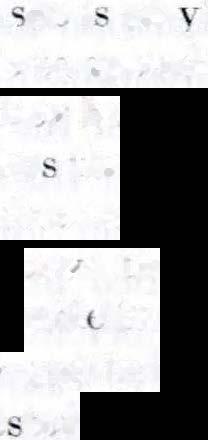
k!§IJiiya viisudeviiya devaki-nandaniiya ca nanda-gopa-kumiiriiya govindiiya namo namafl
krguiya-the Supreme Lord; viisudeviiya- unto the son of Vasudeva; devaki-nandaniiya-unto the son of Devaki; ca-and; nanda-gopa- 1anda and the cowherd men ; kumiiriiya-unto their son; govindiiya- unto the Personality of Godhead who enlivens the cows and the sen es; nama[trespectful obeisances; namafl.-obeisances.
TRANSLATION
Let me, therefore, offer my respectful obeisances unto the Lord who has become the son of Vasudeva, the pleasure of Devaki, the boy of Nanda and the other cowherd men of Vrndavana, and the enlivener of the cows and the senses.
PURPORT
The Lord, being thus unapproachable by any material assets, out of unbounded and causeless mercy descends on the earth as He is in order
Text 21) Prayers by Queen Kunti 395
to show His special mercy upon His unalloyed devotees and to diminish the upsurges of the demoniac persons. Queen Kunti specifically adores the incarnation or descent of Lord Kp}�a above all other incarnations because in this particular incarnation He is more approachable. In the Rama incarnation He remained a king's son from His very childhood, but in the incarnation of Kr��a, although He was son of a king, He at once left the shelter of His real father and mother (King Vasudeva and Queen Devaki) just after His appearance and went to the lap of Yasodamayl to play the part of an ordinary cowherd boy in the blessed Vrajabhiimi, which is very sanctified because of His childhood pastimes. Therefore Lord Kr��a is more merciful than Lord Rama. He was undoubtedly very kind to Kunti's brother Vasudeva and the family. Had He not become the son of Vasudeva and Devakl, Queen Kunti could not claim Him to be her nephew and thus address Kr��a in parental affection. But anda and Yasoda are more fortunate because they could relish the Lord's childhood pastimes, which are rriore attractive than all other pastimes. There is no parallel to His childhood pastimes as exhibited at Vrajabhiimi, which are the prototypes of His eternal affairs in the original Kr��aloka described as the cintiimarti-dhiima in the Brahma-sarhhitii. Lord Sri Kr��a descended Himself at Vrajabhumi with all His transcendental entourage and paraphernalia. Sri Caitanya Mahaprabhu therefore confirmed that no one is as fo�tunate as the residents of Vrajabhiimi, and specifically the cowherd girls who dedicated their everything for the satisfaction of the Lord. His pastimes with Nanda and Yasoda and His pastimes with the cowherd men and especially with the cowherd boys and the cows have caused Him to be known as Govinda. Lord Kr��a as Govinda is more inclined to the briihmartas and the cows, indicating thereby that human prosperity depends more on these two items, namely brahminical culture and cow protection. Lord Kr��a is never satisfied where these are lacking.

TEXT 22


396 Srimad-Bhagavatam [Canto I, Ch. 8
nama{l pankaja-niibhaya nama{l pankaja-maline nama{l pankaja-netriiya namaste pankajiihghraye
nama�-all respectful obeisances; pankaja-niibhiiya-unto the Lord who ha a specific depression resembling a lotus flower in the center of His abdomen; pankaja-miiline-one who is always decorated with a garland of lotus flowers; pankaja-netriiya-one whose glance is as cooling as a lotus flower; namaste-respectful obeisances unto You; pmikaja-anghraye-unto You, the soles of whose feet are engraved with lotus flowers (and who are therefore said to possess lotus feet).
TRANSLATION


My respectful obeisances are unto You, 0 Lord, whose abdomen is marked with a depression like a lotus flower, who is always decorated with garlands of lotus flowers, whose glance is as cool as the lotus and whose feet are engraved with lotuses.
PURPORT
Here are some of the specific symbolical marks on the spiritual body of thePersonality ofGodhead which distinguish Hisbodyfromthebodiesof all others. They are all special features of the body of the Lord. The Lord may appear as one of us, but He is always distinct by His specific bodily features. Srimati Kunti claims herself as unfit to see the Lord because of her being a woman. This is claimed because women, siidras (the laborer class) and the dvija-bandhus, or the wretched descendants of the higher three classe , are unfit by intelligence to understand transcendental subject matter concerning the piritual name, fame, attributes, forms, etc., of the Supreme Absolute Truth. Such persons, although they are unfit to enter into the spiritual affairs of the Lord, can see Him as the arca-vigraha who descends on the material world just to distribute favors to the fallen souls, including the above-mentioned women, siidras and dvija-bandhus. Because such fallen souls cannotsee anythingbeyondmatter,the Lord condescends to enter into each and every one of the innumerable universes as the Garbhodakasayi Vi�!J.U, who grows a lotus stem from the lotus-like depression in the center of His transcendental abdomen, and thus Brahma, the first living being in the universe,is born. Therefore, the Lord is known as the Pankajanabhi. The Pankajanabha Lord accepts the arca-vigraha (His transcendental form) in different elements, namely a form within the mind, a form made of wood, a form made of earth, a form made of metal, a form made of jewel,a form made of painting, a form drawn on sand, etc. All such forms of the Lord are always decorated with garlands of lotus·
Text 22) Prayers by Queen Kunti 397
flower, and there should be a soothing atmosphere in the temple of worship to attract the burning attention of the nondevotees always engaged in material wranglings. The meditators worship a form within the mind. Therefore, the Lord is merciful even to the women, sudras and dvijabandhus, provided they agree to visit the temple of worship in different forms made for them. Such temple visitors are not idolators, as alleged by some men with a poor fund of knowledge. All the great iiciiryas established such temples of worship in all places just to favor the less intelligent, and one should not pose himself as transcending the stage of temple worship while one is actually in the category of the sudras and the women or less. One should begin to see the Lord from His lotus feet, gradually rising to the thighs, waist, chest and face. One should not try to look at the face of the Lord without being accustomed to seeing the lotus feet of the Lord.
Srimati Kunti, because of her being the aunt of the Lord, did not begin to see the Lord from the lotus feet because the Lord might feel ashamed, and thus Kuntidevi, just to save a painful situation for the Lord, began to see the Lord just above His lotus feet, i.e., from the waist of the Lord, gradually rising to the face, and then down to the lotus feet. In the round, everything there is in order.
TEXT 23 �'��� m �����

11��11
yathii hnikesa khalena devaki kamsena rnddhiiticiram suciirpitii
yathii-as it were; hnikesa-the master of the senses; khalena-by the ·envious; devaki-Devaki (the mother of Sri Kr�r:ta); kamsena-by King Kamsa; ruddhii-imprisoned; aticiram-for a long time; suciirpitii-distressed;vimocitii-released; aham ca-alsomyself;sahiitmajii-alongwith my children; vibho-0 great one; tvayii eva- by Your Lordship; niithena-as the protector; muhufl-constantly; vipadga11iit-series of dangers.
398 Srimad-Bhagavatam [Canto 1, Ch . 8
�� �
vimocitiiham ca sah iitmajii vibho tvayaiva niithena muhu r vipadgapiit
Pfl{tM�ti( � ('1&1�¥Ntl Fnlf
'!inf4l\GT1'
0 Hr�ikesa, master of the senses and Lord of lords, You have released Your mother Devaki, who was long imprisoned and distressed by the envious King Kamsa, and myself and my children from a series of constant dangers.
PURPORT
Devaki, the mother of Kr.0a and sister of King Kamsa, was put into prison along with her husband Vasudeva because the envious King was afraid of being killed by the eighth son (Kr.1.1a) of Devaki. He therefore killed all the sons of Devaki who were born before Kr�1.1a, but Kr�pa escaped the danger of child-slaughter because He was transferred to the house of Nanda i\laharaja, Lord Kr��1a's foster father. Kuntidevi was also saved from a series of dangers along with her children. But Kuntidevi was shown more favor because Lord Kr�pa did not save the other children of Devaki,whereas He saved the children of Kuntidevi. This was done because Devaki's husband, Vasudeva,' as living, but Kunlidevi wa a widow, and there was none to help her except KHpa. The conclusion is that Kr�pa endows more favor to a devotee who is in greater dangers. Sometimes He puts His pure devotees in such dangers because in that condition of helplessnessthe devotee becomes more attached to the Lord. The more the attachmentis there for the Lord, the more success is there for the devotee.


TEXT 24

vi§iin mahiigne� punt§iida-darsaniid asat sabhiiyii vanaviisa-krcchrata�
mrdhe mrdhe'neka-mahii-rathiistrato drauftyastratas ciismahare'bhirak§itii[t
vi§iit-from poison; mahii-agne�-from the great fire; pum�iida-the man-eaters; darsaniit-by combating; asat-vicious; sabhiiya� - assembly;
Text 24) Prayers by Queen Kunti 399 TRANSLATION
'"'
11��11
� �����911� il����:l � �Si'fti+ilil�lijffl ifo�� i(sf��:
vanavasa-exiled to the forest; krcchrata!t-sufferings;mrdhe m:dhe-again and again in battle; aneka-many; maha-ratha-great generals; astratab-weapons; drau(li-the son of Drol).iicarya; astrata[1-from the weapons of; ca-and; asmab--inclicatingpast tense; hare-bythe Personality of Godhead; abhirak�ita[1-protected completely.
TRANSLATION
My dear Kr�J.la, Your Lordship has protected us from a poisoned cake, from a great fire, from cannibals, from the vicious assembly, from sufferings during our exile in the forest and from the battle where great gener?Js fought. And now You have saved us from the weapon of Asvatthama.
PURPORT
The list of dangerous encounters is submitted herein. Devaki was once put into difficulty by her envious brother, otherwise she was well. But Kuntidev1 and her sons were put into one difficulty after another for years and years together. They were put into trouble by Duryodhana and party due to the kingdom, and each and every time the sons of Kunti were saved by the Lord. Once Bhima was administered poison in a cake form, once they were put into the house made of shellac and set afire, and once Draupadi was dragged out, and attempts were made to insult her by stripping her naked in the vicious assembly of the Kurus. The Lord saved Draupadi by supplying an immeasurable length of cloth, and Duryodhana's party failed to see her naked. Similarly, when they were exiled in the forest, Bhima had to fight with the man-eater demon Hi�imba rak�asa, but the Lord saved him. So it was not finished there. After all these tribulations, there was the great Battle of Kuruk�etra, and Arjuna had to meet such great generals as Dro!la, Bhi�ma, Kar!la, etc., all powerful fighters. And at last, even when everything was done away with, there was the brahmiistra released by the son of Dro!lacarya withinthe womb of Uttara, and so the Lord saved the only surviving descendant of the Kurus, Maharaja Parik�it.

400 Srimad-Bhagavatam [Canto I, Ch. 8
TEXT 25 �: � (JJ: �� ij;r :j��gU I � � �� 11�'-\11
vipada[l. santu tiif:z. sasvat

tatra tatra jagad-guro
bhavato darsanarit yat syiid
apunar bhava-darsanam
vipada[l.-calamities ; santu-let there be; tii[l-all; sasvat-again and again; tatra-there; tatra-and there; jagat-guro-0 Lord of the universe; bhavataft- Your; darsanam-meeting ; yat-that which; syiit-is; apunaftnot again; bhava-darsana m-seeing repetition of birth and death.
TRANSLATION
I wish that all those calamities would happen again and again so that we can see You again and again, for seeing You means that we will no longer see repeated births and deaths.
PURPORT
Generally the distressed, the needy, the intelligent and the inquisitive, who haveperformedsome pious activities, worship or begin to worship the Lord. Others, who are thriving on misdeeds only, regardless of status, cannot approach the Supreme due to being misled by the illusory energy. Therefore, for a pious person if there is some calamity there is no other alternative than to take shelter of the lotus feet of the Lord. Constantly remembering the lotus feet of the Lord means preparing for liberation frombirth anddeath. Therefore,eventhough there are so-called calamities, theyare welcome because they give us opportunity to remember the Lord, which means liberation.
One who has taken shelter of the lotus feet of the Lord, which are accepted as the most suitable boat for crossing the ocean of nescience, can be liberated as easily as one leaps over the holes made by the hoofs of a calf. Such person� are meant to reside in the abode of the Lord, and they have nothing to do with a place where there is danger in every step.
This material world is certified by the Lord in the Bhagavad-gitii as a dangerous place full of calamities. Less intelligent persons prepare plans to adjust to those calamities without knowing that the nature of this place is itself full of calamities. They have no information of the abode of the Lord, which is full of bliss and without trace of calamity. The duty of the sane person is, therefore, not to be disturbed by the worldly calamities, which are sure to happen in all circumstances, but suffering all sorts of
Text 25]
Prayers by Queen Kunti
401
unavoidable misfortunes, one hould make progress in spiritual realization, because that is the mission of human life. The spirit soul is transcendental to all material calamities; therefore, the so-called calamities are called false. man may '"ee a tigerS\ allowing him in a dream, and he may cry for this calamity . ctually there i� 110 tiger and there is no suffering, but it is simply a case of dream . ln the arne ' ay, all calamities of life are aid to be dreams. If someo ne is lucky enough to get in contact with the Lord by devotional service, it is all gain. Contact with the Lord by atw one of the ni11e devotional senices is alway a forward step on the path of going back to Godhead.
TEXT 26




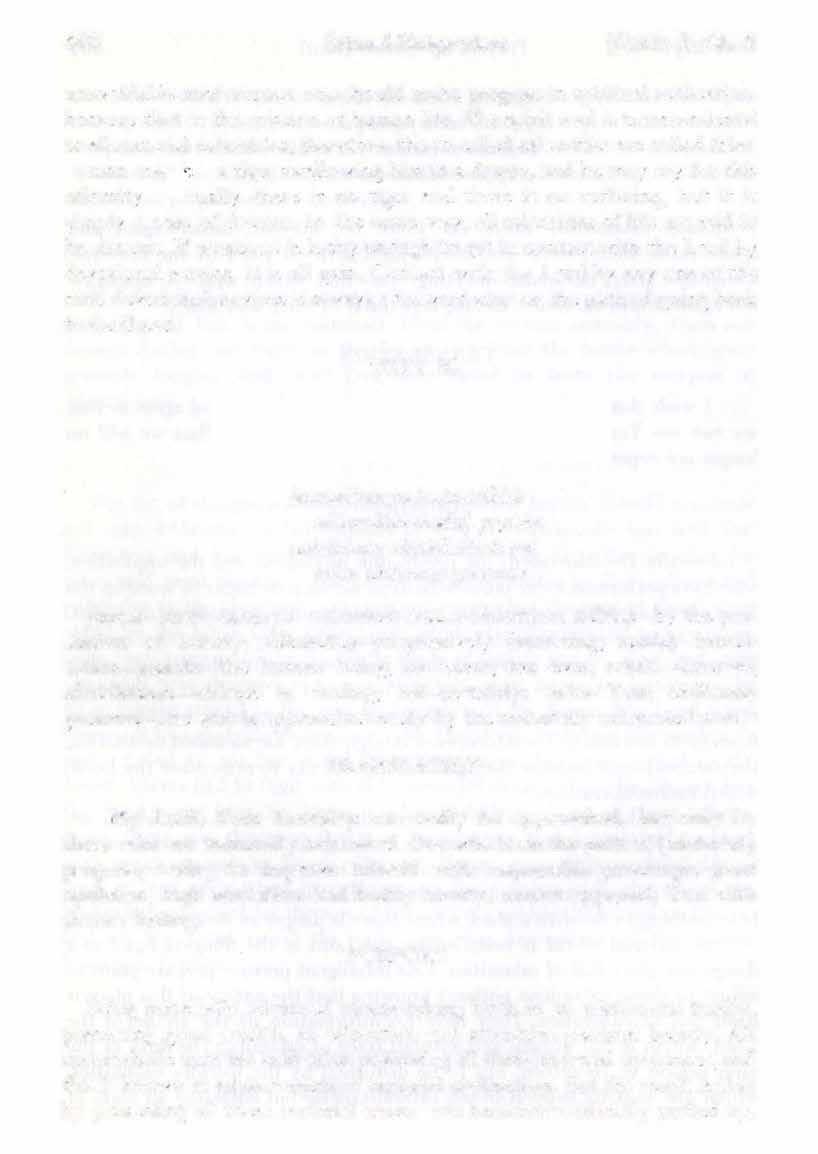
janmaiSvarya-srnta-snvhir edhamiina-mada� pumiin naiviirhaty abhidhiiturh vai tviim akincana-gocaram
janma-birth; aiSvarya-opulence; srnta-education; sribh*-by the possession of beauty; edhamiina- progressively increasing; mada�-intoxication; pumiin-the human being; na-never; eta-ever; arhati- deserves; abhidhiitum-address in feeling; vai-certainly ; tviim- You; akincanagocaram-one who is approached easily by the materially exhau ted man.

TRANSLATION
My Lord, Your Lordship can easily be approached, but only by those who are materiallyexhausted. Onewho isonthepathof [material] progress, trying to improve himself with respe_ctable parentage, great opulence, high education and bodily beauty, cannot approach You with sincere feeling.
PURPORT
Being materially advanced means taking birth in an aristocratic family, possessing great wealth, an education and attractive personal beauty. All materialistic men are mad after possessing all these material opulence , and this i known as advancement of material civilization. But the result is that by possessing all these material assets one becomes artificially puffed up,
402 Srimad-Bhagavatam [Canto 1, Ch. 8
intoxicated by such temporary possessions. Con equently, such materially puffed up persons are incapable ofuttering the holy name of the Lord by addressing Him feelingly as "0 Govinda, 0 Kr.!1a." It is said in the sastras that by onceuttering the holy name of lhe Lord, the sinner getsrid or a quantity of sins that he is unable to commit. Such is the power of uttering the holy name of the Lord. Thereisnotthe leastexaggeration in this statement. Actuallythe Lord's holy name has suchpowerful potency. But there is a qualit to suchutterances also. It depends on the quality of feeling. helpless man can feelingly utter Lhe holy name of the Lord, whereas aman who uttersthe same holy nameingreat materialsatisfaction cannot be so sincere. Therefore, a materially puffed up person may utter the holy name of the Lord occasionally, but he is incapable of uttering the nameinquality:Therefore,thefourprinciplesofmaterialadvancement, namely l) high parentage, 2) good wealth, 3) high education, and 4) attractive beauty, etc. are, so to speak, disqualificalions for progress on the path of spiritual advancement. J\Jaterial covering of Lhe pure piritsoul i· an externalfeature,as much asfeverisanexternalfeature ofthe unhealthy body. The general processis to decrease the degree of thefeverand not to aggravate itby maltreatment.Sometimes it isseen that spirituallyadvanced persons become materially impoverished. This is no discouragement. On the other hand, such impoverishment is a good sign as much as the falling of temperature is a good sign. The principle of life should be to decrease the degree of material intoxication which leads one to be more and more illusioned about the aim of life. Gros·ly iUusioned persons are quite unfit for entrance into the kingdom of God.
TEXT 27




W{��mw.t Mf(lgOit�� I
31i�+tl(l+tl4 �I.-ttl� ��q� Wf't: ������
namo 'kincana-vittiiya
nivrtta-gurw-vrttaye iitmii-riimiiya siintiiya
kaivalya-pataye nama�
nama�- al1 obeisances unto You; akincana-vittiiya-unto the property of the materially impoverished; nivrtta-completely transcendental to the actions of the material modes; gu(la- m aterial modes; vrttaye- affection; atmii-riimiiya-one who is self-satisfied; siintaya- the most gentle; kaivalyapataye- unto the master of the monists; nama�- bowing down.
PrayersbyQueenKunti 403
TRANSLATION

My obeisances are unto You, who are the property of the materially impoverished. You have nothing to do with the actions and reactions of the material modes of nature. You are self-satisfied, and therefore You are the most gentle and are master of the monists.
PURPORT
A living being is finished assoon as there is nothing to possess. Therefore a living being cannot be, in the real sense of the term, a renouncer. A li ing being renounces something for gaining something more valuable. A student sacrifices his childish proclivities to gain better education. A servant gives up his job for a better job. Similarly, a devotee renounces the material world not for nothing but for something tangible in spiritual value. Srila Rupa Gosvami and Sanatana Gosvami and Srila Raghunatha Gosvami and others gave up their worldly pomp and prosperity for the sake ofthe service of the Lord. Theywere big men in theworldlysense. The Gosvamis were ministers in the government service of Bengal, and Srila Dasa Gosvami was the son of a big zamindar of his time. But they left everything to gain something superior to what they previously possessed. The devotees are generally without material prosperity, but they have a very secret treasure house in the lotus feet of the Lord. There is a nice story about Srila Sanatana Gosvami He had a touchstonewith him, andthis stone was left in a pile of refuse. A needy man took it, but later on wondered why the valuable stonewas kept in such a neglected place. He therefore asked for the most valuable thing from him, and then he was given the holy name of the Lord. AkUicana means one who has nothing to give materially. A factual devotee or the mahiitmii does not give anything material to anyone because he has already left all material assets. He can, however, deliver the supreme asset, namely the Personality of Godhead, because He is the only property of a factual devotee. The touchstone of Sanatana Gosvami which was thrown in the rubbish was notthe property of the Gosvami, otherwise it would not have been kept in such a place. This specific example is given for the neophyte devotees just to convince them that material hankerings and spiritual advancement go ill together. Unless one is able to see everythmg as spiritual in relation with the Supreme Lord, one must always distinguish between spirit and matter. A spiritual master like Srila Sanatana Gosvami, although personally able to see everything as spiritual, set this example for us only because we have no such spiritual vision.
404 Srimad-Bhagavatam [Canto l, Ch. 8
Advancement of material vision or material civilization is a great stumbling block . for spiritual advancement. Such material advancement entangles the living being in the bondage of a material body followed by all sorts of material miseries. Such material advancement is called anartha or things not wanted. Actually this is so. In the present context of malerial advancement oneuses lipstickat a cost of fifty cents and thereare so many unwanted things which are all products of the material conception of life. By diverting attention to so many unwanted things, human energy is spoiled without achievement of spiritual realization, the prime necessity of human life. The attempt to reach the moon is another example of spoiling energy because even if the moon is reached, the problem of life will not be solved. The devotees of the Lord are called akincanas because they have practically no material assets. Such material assets are all products of the three modes of material nature. They foil spiritual energy, and thus the less we possess such products of material nature, the more we have a good chance for spiritual progress.
The Supreme Personality of Godhead has no direct connection with material activities. All His acts and deeds, which are exhibited even in this material world, are spiritual and without affection of the modes of material nature. In the Bhagavad-gi'tii the Lord says that all His acts, even His appearence and disappearence in and out of the material world, are all transcendental, and one who knows tlus perfectly shall not take his birth again in this material world, but he will go back to Godhead.

The material disease is due to hankering after lording it over material nature. This hankering is due to an interaction of the three modes of nature, and both the Lord and the devotees have no attachment for such false enjoyment. Therefore, the Lord as well as the devotees are called nivrtta-gu[La-vrtti. The perfect nivrtta-gu[La-vrtti is the Supreme Lord because He neverbecomes attractedby themodes ofmateria] nature,whereas the living beings have such a tendency. Some of them are entrapped by the illusory attraction of material nature.
Because the Lord is the property of the devotees and the devotees are the property of the Lord, reciprocally the devotees are certainly transcendental to the modes of material nature. That i:s a natural conclusion. Such unalloyed devotees are distinct from the mixed devotees who approach the Lord for mitigation of miseries and poverty, inquisitiveness and speculation. The unalloyed devotees and the Lord are transcendentally attached to one another. For others, the Lord has nothing to reciprocate, and therefore He is called iitmiiriima, self-satisfied. Self-satisfied a He is, He is the master of all monists who seek to merge into the existence of the
Text 27) Prayers by Queen Kunti 405
Lord. uch moni ts rn rg within the personal effulgen of th Lord called the brahmajyoti, but the dt>votees enter into the tran cendental pa time of th Lord,which are never to be misunder tood as material.
TEXT 28







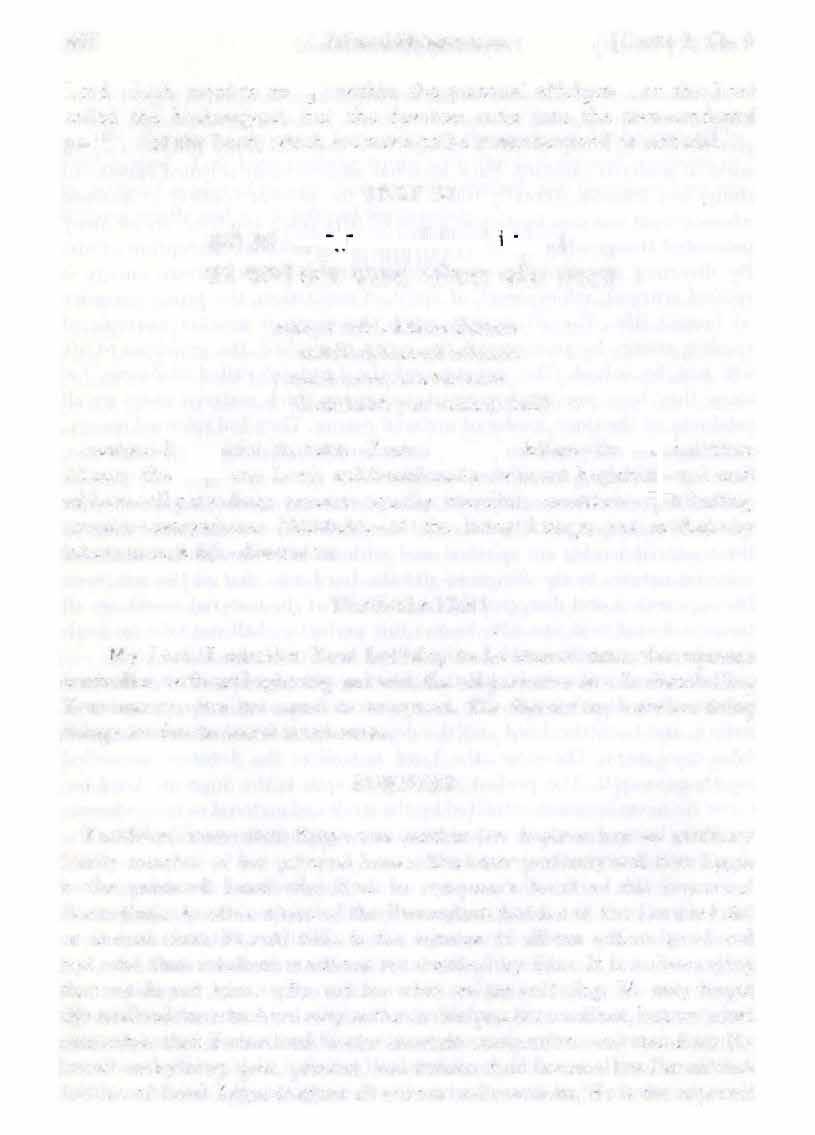
m: ������
manye tviim kiilam isiin.am an.iidi-nidhanarh vibhum samam carantam sarvatra
bhutiiniim yan mitha{l kali{l
manye-1 on ider it; tviim-Your Lord�hip; k alam-th el rnal time; isanam-lhe upreme Lord; aniidi-nidhanam-without heginninu and end· vibhum-all-pervading; samam. -equally merciful; carantam-di trihuting; sarvatra-everywhere· bhutiiniim-of the living being ; yat mitha{l-by inter ourse; kalift-di sen ion.



TRANSLATION
My Lord, I consider Your Lordship to be eternal time, the supreme controller, withoutbeginning and end, the all-pervasive one.ln distributing Your mercy, you are equal to everyone. The dissensions between living beings are due to social intercourse.
PURPORT
Kuntldevi knew that l<f�l)a was neither her nephew nor an ordinary family member of her paternal house. She knew perfectly well that Kf�l)a is the primeval Lord who lives in everyone's heart as the Supersoul Paramatma. nother name of the Paramatma feature of the Lord is kala, or eternal time. Eternal time i the witness of all our actions good and bad, and thus resultant reactions are destined by Him. lt i no use saying that we do not know why and for what we are suffering. We may forget the misdeed for which we may suffer at this present moment, but we must remember that Paramatma is our constant companion, and therefore He knows everything, past, present, and future. And because the Paramatma feature of Lord KHI)a destines all actions and reactions, He is the supreme
406 Srimad-Bhagavatam [Canto I, Ch. 8
' • ,....,....
• ��T �l�+i�lli!J� I wt ��ht�=:if � �"�:
controller also. Without His sanction not a blade of grass can move. The living beings are given as much freedom as they deserve, and misuse ofthat freedom is the cause of suffering. The devotees of the Lord do not misuse their freedom, and therefore they are the good sons of the Lord. Others, who misuse freedom, are put into miseries destined by the eternal kala. The kala offers the conditioned souls both happiness and miseries. lt is all predestined by eternal time. As we have miseries uncalled-for, so we may have happiness also without being asked, for they are all predestined by kala. No one is therefore either an enemy or friend of the Lord. Everyone is suffering and enjoying the result of his own destiny. This destiny is made by theliving beings in course of social intercourse. Everyone wants here to lord it over the material nature, and thus everyone creates his own destiny under the supervision of the Supreme Lord. He is all-pervading, and therefore He can see everyone's activities. And because the Lord has no beginning or end, He is known also as the eternal time, kiila.
TEXT 29

na veda kascid bhagavarhs cikir§itarh
taveha-manasya n[[liirh vitjambanam
na yasya kascid dayito'sti karhicid
dve§yas ca yasmin vi§ama matir n.r[tam
na-doesnot; veda-know; kascit-anyone ; bhagavan-0 Lord; cikir§itam -pastimes; tava- Your; iha-manasya-like the worldly men; nr!lam-of the people in general; vitjambanam- m isleading ; na-never; yasya-His ; kascitanyone; dayita� -objectof specificfavor; asti-thereis; karhicit- anywhere; dve§ya� -object of envy; ca-and; yasmin-unto Him; vi§ama- partiality ; mati[t -conception; n[[liim- of the people.
TRANSLATION
0 Lord, no one can understand Your transcendental pastimes, which appear to be human and so are misleading. You have no specific object of favor, nor do You have any object of envy. People only imagine that You are partial.
Text 29} Prayers by Queen Kunti 407
� � efif��tlfitd ({����� "!1J1f �IS��( I � ���sftij�� ����fm1m�IJfll(ll��ll
PURPORT

The Lord's mercy upon the fallen souls is equally distributed. He has no one as the specific object of hostility. The very conception of the Personality of Godhead as a human being is misleading. His pastimes appear to be exactly like a human being's, but actually they are transcendental and without any tinge of material contamination. He is undoubtedly known as partial to His pure devotees, but in fact He is never partial, as much as the sun is never partial to anyone. By utilizing the sun rays, sometimes even the stones become valuable, whereas a blind man cannot see the sun, although there are enough sun rays before him. Darkness and light are two opposite conceptions, but this does not mean that the sun is partialindistributing its rays. The sun rays are open to everyone, but the capacities of the receptacles differ. Foolish people think that devotional service is flattering the Lord to get special mercy. Factually the pure devotees who are engaged in the transcendental loving service of the Lord are not a mercantile community. A mercantile house renders service to someone in exchange of values. The pure devotee does not render service unto the Lord for such exchange, and therefore the full mercy of the Lord is open for him. Suffering and needy men, inquisitive persons or the philosophers make temporary connections with the Lord to serve a particular purpose. When the purpose is served, there is no more relation with the Lord. A suffering man, if he is pious at all, prays to the Lord for his recovery. But as soon as the recovery is over, in most cases the suffering man no longer cares to keep any connection with the Lord. The mercy of the Lord is open for him, but he is reluctant to receive it. That is the difference between a pure devotee and a mixed devotee. Those who are completely against the service of the Lord are considered to be in abject darkness, those who ask for the Lord's favor only at the time of necessity are partial recipients of the mercy of the Lord, and those who are cent percent engaged in the service of the Lord are full recipients of the mercy of the Lord. Such partiality of receiving the Lord's mercy is relative to the recipient, and it is not due to the partiality of the allmerciful Lord.
When the Lord descends on this material world by His all-merciful energy, He plays like a human being, and therefore it appears that the Lord is partial to His devotees only, but that is not a fact. Despite such apparent manifestation of partiality, His mercy is equally distributed. In the Battlefield of Kuruk�etra all persons who died in the fight before the presence of the Lord got salvation without the necessary qualifications
408 Srimad-Bhagavatam (Canto l, Ch. 8
because death before the presence of the Lord purifies the passing soul from the effects of all sins, and therefore the dying man gets a place somewhere in the transcendental abode. Somehow or other if someone puts himself open in the sun rays, he is sure to get the requisite benefit both by heat and ultraviolet rays. Therefore, the conclusion is that the Lord is never partial. It is wrong for the people in general to think of Him as partial.
TEXT 30


ijf�
janma karma ca viSvatmann ajasyakartur atmana�
tiryan nf�i§u yada�su tad atyanta-viljambanam
janma-birth; karma-activity; ca-and; viSva-iitman-0 soul of the universe; ajasya-of the unborn; akartu[l-of the inactive· iitmana{l.-of the vital energy; tiryak-animal; nr-human being; f§�u-in the sages; yiidafl.su -in the water; tat-that; atyanta-veritable; viljambanam-bewildering.

TRANSLATION
Of course it is bewildering, 0 soul of the universe, that You work, though You are inactive, and that You take birth, though You are the vital force and the unborn. You Yourself descend amongst animals, men, sages and aquatics. Verily, this is bewildering.
PURPORT
The transcendental pastimes of the Lord are not only bewildering but also apparently contradictory. In other words, they are all inconceivable to the limited thinking power of the human being. The Lord i the allprevailing Supersoul of all ·existence, and yet He appears in the form of boar amongst the animals, in the form of a human being as Rama, Kr��a, etc., in the form of a !§i like Niiraya�a, and in the form of an aquatic like a fish. Yet it is said that He is unborn, and He has nothing to do. In the Sruti mantra it is said that the Supreme Brahman has nothing to do. o one is equal to or greater than Him. He has manifold energies, and everything is
Text 30] Prayers by Queen Kunti 409
�
N
��I{W{! I R14'e4Tim�:�ija:�4���
:q
�1�1t�
ll�c.ll
performed by Him perfectly by automatic knowledge, strength and activity. AU these prove without any question that the Lord's activities, forms and deeds are all inconceivable to our limited thinking power, but because He is inconceivably powerful, everything is possible in Him. Therefore no one can calculate Him exactly; every action of the Lord is bewildering to the common man. He cannot be understood by the Vedic knowledge, but He can be easily understood by the pure devotees because they are intimately related with Him. The devotees therefore know that although He appears amongst the animals, He is not an animal, nor a man, nor a !$i, nor a fish. He is eternally the Supreme Lord in all circumstances.
TEXT 31
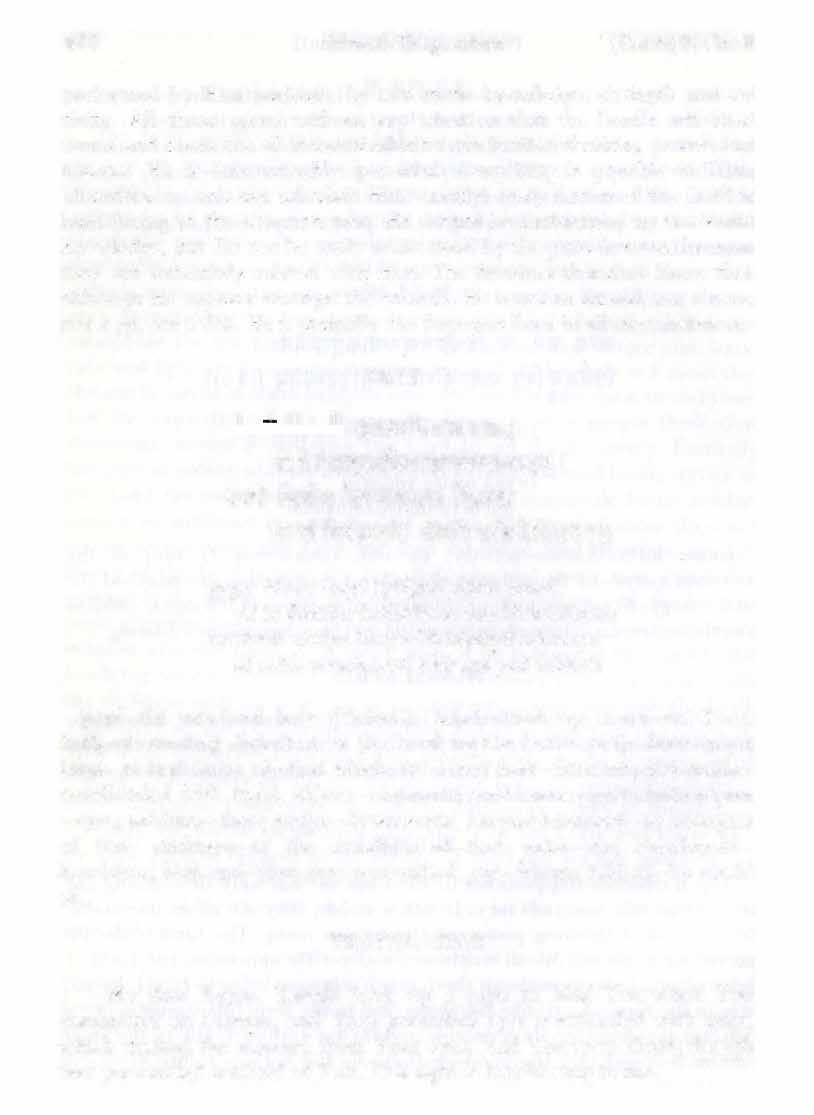
ID �t�� +iRftp:r��Rfll��II
go py iidade tvayi krtiigasi diima tiivad yii te dasiiSru-kaliliiii.jana-sambhramiik�am vaktrarh niniya bhaya-bhiivanayii sthitasya sii miirh vimohayati bhir api yad bibheti
gopi-the cowherd lady (Yasoda); iidade-took up; tvayi-on Your; krtiigasi-creating disturbances (by breaking the butter pot); diima- rope; tiivat-at that time; yii-that which; te-Your; dasii-situation; asru-kalilaoverflooded with tears; aii.jana-ointment; sambhrama-perturbed; ak�am -eyes; vaktram-face; niniya-downwards; bhaya-bhiivanayii-by thoughts of fear· sthitasya-of the situation; sii-that; miim-me; vimohayatibewilders; bhlJ:t api- even fear personified; yat-whom; bibheti-be afraid of.

TRANSLATION
My dear Kf�!la, Yasoda took up a rope to bind You when You committed an offense, and Your perturbed eyes overflooded with tears, which washed the mascara from Your eyes. AndYou were afraid, though fear personifiedis afraid of You. Thissightis bewildering to me.
410 Srimad-Bhagavatam [Canto 1, Ch. 8
.... ..... ,.... ,.... <t;allTRt�ijf.f! �ij��m�I�"'I«H{q�I m���m�
Here is another explanation ofthebewilderment createJ bythepastimes of the Supreme Lord. The Supreme Lord is the Supreme in all circumstances,as already explained. Here is a specificexample of the Lord's being the Supreme and at the same time a plaything in the presence of His pure devotee. The Lord's pure devotee renders senrice unto the Lord out of unalloyed love only, and while discharging such devotional service the pure devotee forgets the position of the Supreme Lord. The Supreme Lord also accepts the loving service of His devotees more relishably when the service is rendered spontaneously out of pure affection without anything of reverential admiration. Generally the Lord is worshiped by the devotees in reverential attitude, but the Lord is meticulously pleased when the devotee, out of pure affection and love, considers the Lord to be less important than himself. The Lord:s pastimes in the original abode of Goloka Vrndavana are exchanged in that spirit. The friends of Kr�!1a consider Him one of them. They do not consider Him to be of reverential importance. The parents of the Lord (who are ali pure devotees) consider Him a child only. The Lord accepts chastisements of the parents more cheerfully than the prayers of the Vedic hymns. Similarly, He accepts the reproaches of His fiancees more palatably than the Vedic hymns. Lord Kr�!1a, when He was present in this material world to manifest His eternal pastimes in the transcendental realm of Goloka Vrndavana for an attraction of the people in general, displayed a unique picture of subordination before His foster mother Y asoda. The Lord, in His natural childish playful activities, used to spoil the stocked butter of mother Y asoda by breaking the pots and distributing the contents to His friends and playmates, including the celebrated monkeys of Vrndavana who took advantage of the Lord's munificence. Mother Yasoda saw this, and out of her pure love she wanted to make a show of punishment for her transcendental child. She took a rope and threatened the Lord that she would tie Him up, as is generally done in the ordinary household. Seeingtherope in thehands of mother Yasoda, the Lord bowed down His head and began to weep just like a child, and tears rolled down His cheeks, washing off the black ointment smeared about His beautiful eyes. This picture of the Lord is adored by Kuntidevi because she is conscious of the Lord's supreme position. He is feared often by fear personified, yet He is afraid of His mother, who wanted to punish Him just in an ordinary manner. Kuntl was conscious of the exalted position of KrllQa, whereas Y asoda wasnot.

Text 31) Prayers by Queen Kunti 411
PURPORT
Therefore Yasoda's position was more exalted than Kunti's. Mother Yasoda got the Lord as her child, and the Lord made her forget altogether that her child was the Lord Himself. If mother Yasoda would have been conscious of the exalted position of the Lord, she would certainly have hesitated to punish the Lord. But she was made to forget this situation because the Lord wanted to make a complete gesture of childishness before the affectionate Yasoda. This exchange of love between the mother and the son was performed in· a natural way, and Kunti, remembering the scene, was bewildered, and she could do nothing but praise the transcendental filial love. Indirectly Mother Yasoda is praised for her unique position of love, for she could control even the all-powerful Lord as her beloved child.
TEXT 32

kecid iihur ajarh jatarh purtya-slokasya kirtaye yadoft priyasyiinvaviiye malayasyeva candanam
kecit-someone; iihu[l. -says ; ajam-the unborn; jatam-being born; pur-ya-slokasya-of the great pious king; kirtaye-for glorifying; yado[l.of King Yadu; priyasya-of the dear; anvaviiye-in the family of; malayasya -Malaya hills; iva-as; candanam-sandalwood.
TRANSLATION
Some say that the Unborn is horn for the glorification of pious kings, and others say that He is horn to please King Yadu, one of Your dearest devotees. You appear in his family as sandalwood appears in the Malaya hills.
PURPORT
Because the Lord's appearance in this material world is bewildering, there are different opinions about the birth of the Unborn. In the Bhagavad-gitii the Lord says that He takes His birth in the material world,
412 Srimad-Bhagavatam [Canto 1, Ch. 8
���r¢\�'(
�f�l� \l.Rf ��1� � I �:fSt��-"11'1�1�
����II
although He is the Lord of all creations and He is unborn. So there cannot be any denial of the birth of the Unborn because He Himself establishes the truth. Rut still there are different opinions as to why He takes His birth. That is also declared in the Bhagavad-gitii. He appears by His own internal potency to reestablish the principles of religion and to protect the pious and to annihilate the impious. That is the mission of the appearance of the Unborn. Still, it is said that the Lord is there to glorify the pious King Yudhi�thira. Lord Sri Kp)l)a certainly wanted to establish the kingdom of the Pa!!�avas for the good of all in the world. When there is a pious king ruling over the world, the people are happy. When the ruler is impious, the people are unhappy. In the age of Kali in most cases the rulers are impious, and therefore the citizens are also continuously unhappy. But in the case of democracy, the impious citizens themselves send their representative to rule over them, and therefore they cannot blame anyone for their unhappiness. Maharaja N ala was also celebrated as a great pious king, but he had no connection with Lord Kr�!!a. Therefore Maharaja Yudhi�thira is meant here to be glorified by Lord Kr��1a. He had also glorified King Yadu, having taken His birth in the family. He is known as Yadava, Yaduvira, Yadunandana, etc., although the Lord is always independent of such obligation. It is just like the sandalwood that grows in the Malaya hills. Trees can grow anywhere and everywhere, yet because the sandalwood trees grow mostly in the area of the Malaya hills, the name sandalwood and the Malaya hills are interrelated. Therefore, the conclusion is that the Lord is ever unborn like the sun, and yet He appears as the sun rises on the eastern horizon. As the sun is never the sun of the eastern horizon, so the Lord is no one's son, but He is the father of everything that be. TEXT33
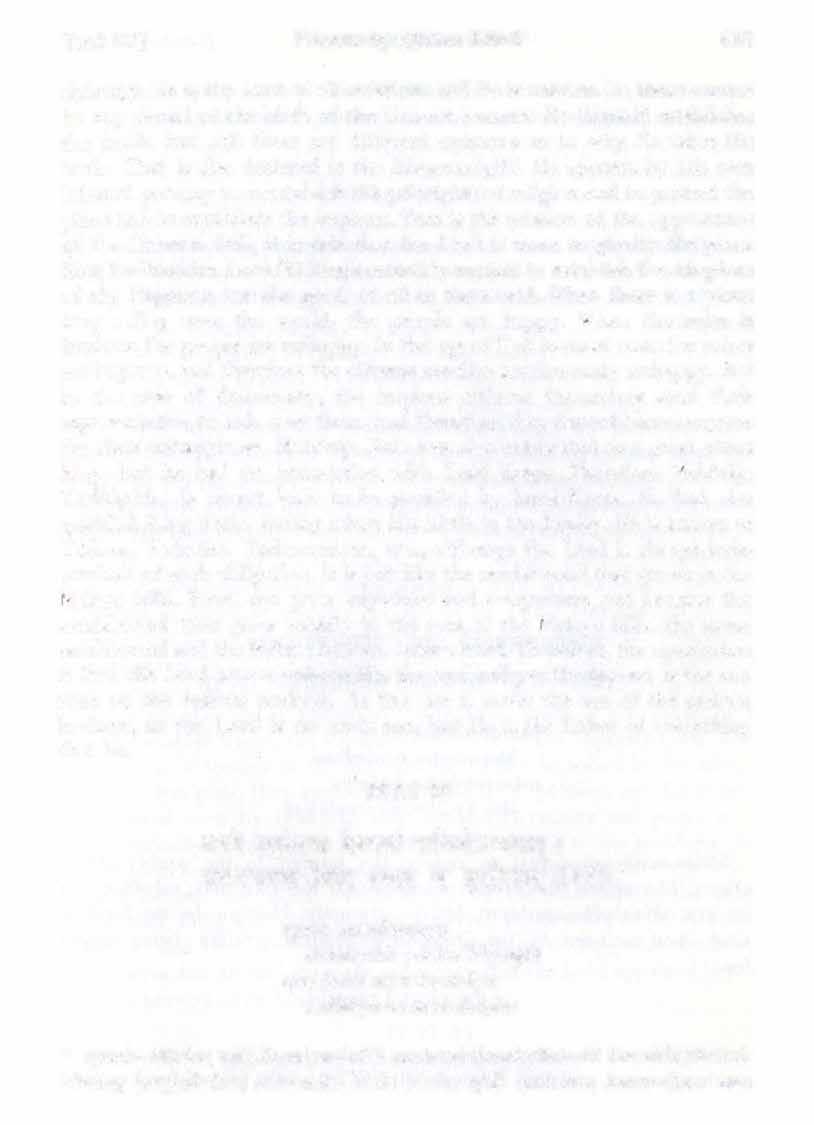
Text33] Prayersby QueenKunti 413
� �� �fltlt ���ffl_ I 31\:il�'l��Pl CNPl � wfu� ����II apare vasudevasya devakyiim yiicito'bhyagiit ajas tvam asya k�emiiya vadhiiya ca sura-dv�iim apare-others; vasudevasya-of Vasudeva; devakyiim-of Devaki; yiicita� -being prayed for; abhyagiit-took birth; aja�-unborn; tvam- You are;
asya-of him; k�emiiya-for the good; vadhiiya-for the purpose of killing; ca-and; sura-dvi§iim-of those who are envious of the demigods.
TRANSLATION
Others say that since both Vasudeva and Devaki prayed for You, You have taken Your birth as their son. Undoubtedly You are unborn, yet You take Your birth for their welfare and to kill those who are envious of the demigods.
PURPORT
It is also said that Vasudeva and Devaki, in their previous birth as Sutapa and Ppsni, underwent a severe type of penance to get the Lord as their son, and as a result of such austerities the Lord appeared as their son. It is already declared in the Bhagavad-gitii that the Lord appears for the welfare of all people of the world and to vanquish the asuras or the materialistic atheists.
TEXT 34

�1{(!!4iji(UII�I� � ';{Ff �� I
�·��roffiurijiR{t��: 11��11
bhiiriivatiirariiyiinye
bhuvo niiva ivodadhau sidantyii bhuri-bhiirer-a jiito hy iitmabhuviirthita�
bhiira -avatiirartiiya-just to reduce the burden to the world; anyeothers; bhuva� -of the world; niiva�-boat; iva-like that; udadhau-on the sea; sidantyii� - aggrieved; bhuri-extremely; bhiirert a-by the burden; jiita�- You are born; hi-for; iitmabh uvii- Brahm a; arthita�- being prayed for.
TRANSLATION
Others say that the world, being overburdened like a boat at sea, is much aggrieved, and that Brahma, who is Your son, prayed for You, and so You have appeared to diminish the trouble.
414 Srimad-Bhagavatam [Canto I, Ch. 8
Brahma,or the first living being born just after the creation,is the direct son of NarayaJ!a. NarayaJ!a, as Garbhodakasayi Vi�J!u, first of all entered the material universe.Without spiritual contact, matter cannot create. This principle was followed from the very beginning of the creation. The Supreme Spirit entered the universe, and the first living being, Brahma, was born on a lotus flower grown out of the transcendental abdomen of Vi�J!U. Vi�J!U is therefore known as Padmanabha. Brahma is known as atma-bhu because he was begotten directly from the father without any contact of mother Lak�mfji. Lak�mfji was present just before NarayaJ!a, engaged inthe service oftheLord,and still,without contact with Lak�mfji, araya'!a begot Brahma. That is the omnipotency of the Lord. One who foolishly considers Naraya'!a like other living beings should take a lesson from this. Naraya'!a is not an ordinary living being. He is the Personality of Godhead Himself, and He has all the potencies of all the senses in all parts of His transcendental body. An ordinary living being begets a child by the intercourse of sex, and he has no other means to begeta child other than the one designed for him. But NarayaJ!a, being omnipotent, is not bound to any condition of energy. He is completeandindependent to do anythingandeverythingby His various potencies, very easily and perfectly. Brahma is therefore directly the son of the father and was not put into the womb of a mother. Therefore he is knownas iitma-bhu. This Brahma i in charge of further creations in the universe, secondarily reflected by the potency of the Omnipotent. Within the halo of the universe there is a transcendental planet known as Svetadvipa, which is the abode of the K�irodakasayi Vi�J!U, the Paramatma feature of the Supreme Lord. Whenever there is trouble in the universe that cannot be solved by the administrative demigods, they approach Brahmaji for a solution, and if it is not to be solved even by Brahmaji then Brahmaji consults and prays to the K�irodakasayiVi�J!U for an incarnation and solution to the problems. Such a problem arose whenKamsa and others were ruling over the earth and the earth became too much overburdened by the misdeeds of the asuras. Brahmaji,along with other demigods, prayed at the shore of the K�irodaka Ocean, and they were advised of the descent of Kr�'!a as the son of Vasudeva and Devaki. So some people say that the Lord appeared because of the prayers of Brahmaji.



Text 35] Prayers by Queen Kunti 415
PURPORT
1 �UI�(UIIlilfiJf qi�� ifi� ������
TEXT 35 �sW-{tmw�l;fl;flqf?ttwfilq�alfll:
Srimad-Bhagavatam
bhave'smin kliSya-miiniiniim avidyii-kiima-karmabhilt sravarw-smarartiirhiirti kari§yann iti kecana

bhave-in the material creation; asmin-this; klisya-miiniiniim-of those who are suffering from; avidyii-nescience; kama-desire; karmab hift - by execution of fruitive work; sravap.a-hearing; smarap.a-remembering; arhap.i-worshiping; kari§yan- may perform; iti-thus; kecana-others.
TRANSLATION
And yet others say that You appeared to rejuvenate the devotional service of hearing, remembering, worshiping and so on in order that the conditioned souls suffering from material pangs might take advantage and gain liberation.
PURPORT
In the Srimad-Bhagavad-gitii the Lord asserts that He appears in every millennium just to reestablish the way of religion. The way of religion is made by the Supreme Lord. No one can manufacture a new path of religion, as is the fashion for certain ambitious persons. The factual way of religion is to accept the Lord as the supreme authority and thus render service unto Him in spontaneous love. A living being cannot help but render service because he is constitutionally made for that purpose. The only function of the living being is to render service to the Lord. The Lord is great, and living beings are subordinate to Him. Therefore, the duty of the living being is just to serve Him only. Unfortunately the illusioned living beings, out of misunderstanding only, become servants of the senses by material desire. This desire is called avidyii, or nescience. And out of such desire the living being makes different plans for material enjoyment centered about a perverted sex life. He therefore becomes entangled in the chain of birth and death by transmigrating into different bodies on different planets under the direction of the Supreme Lord. Unless, therefore, one is beyond the boundary of this nescience, one cannot get free from the threefold miseries of material life. That is the law of nature.
The Lord, however, out of His causeless mercy, because He is more merciful to the suffering living beings than they can expect, appears before them and renovates the principles of devotional service comprised of
416
[Canto 1, Ch. 8
hearing, chanting, remembering, serving, worshiping, praying, cooperating and surrendering unto Him. Adoption of all the above-mentioned items, or any one of them, can help a conditioned soul get out of the tangle of nescience and thus become liberated from all material sufferings created by the living being illusioned by the external energy. This particular type of mercy is bestowed upon the living being by the Lord in the form of Lord Sri Caitanya !VIahaprabhu.
TEXT 36
snwanti giiyanti g.rrtanty abhik�vasaft smaranti nandanti tavehitaritjaniift ta eva pasyanty acireva tiivakarit bhava-praviihoparamarit padambujam
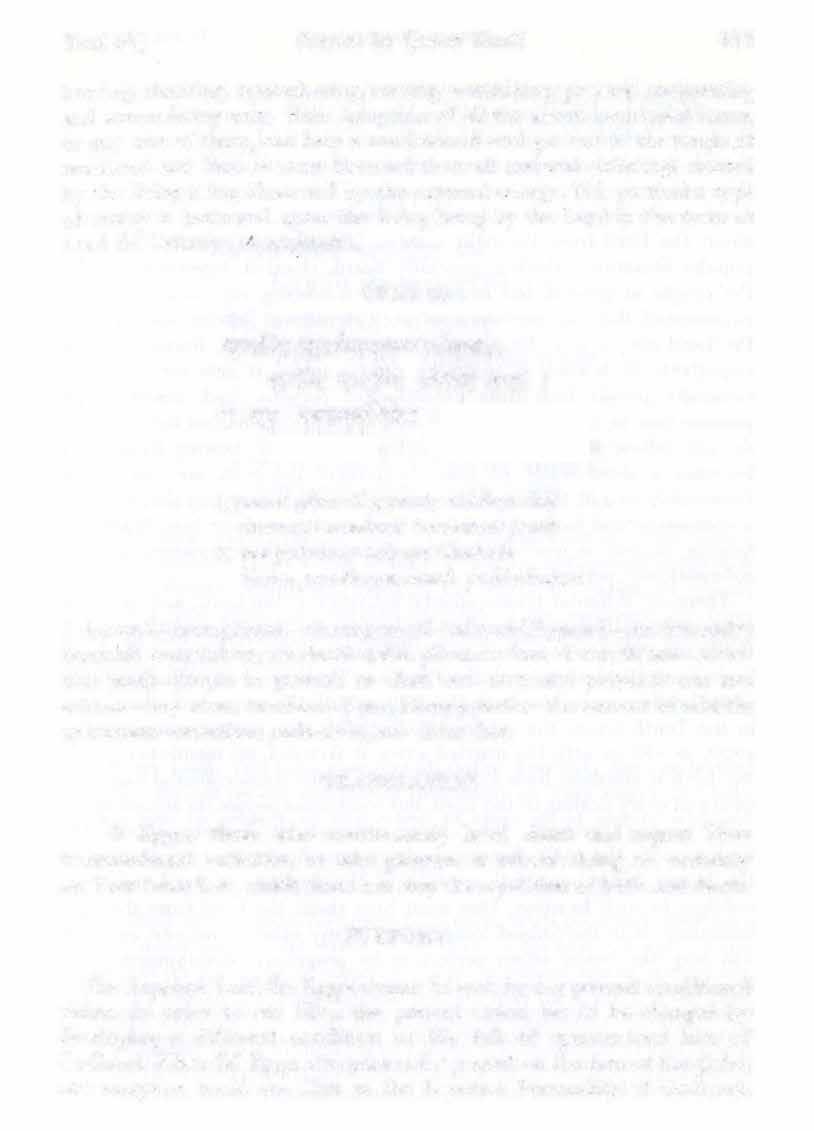
srf1-vanti-hear ;giiyanti-chant;grf1-anti-take; abhik�[�-asa�-continuously; smaranti-remembers; nandanti-takes pleasure; tava- Your; ihitam-activities; jana[l.-people in general; ta-that; eva-certainly; paiyanti-can see; acire[�-a-very soon; tavakam- Your; bhava-pravaha-the current of rebirth; uparamam-cessation; pada-ambujam -lotus feet.

TRANSLATION
0 Kr��a, those who continuously hear, chant and repeat Your transcendental activities, or take pleasure in others' doing so, certainly see Your lotus feet, which alone can stop the repetition of birth and death.
PURPORT
The Supreme Lord Sri Kr�!la cannot be seen by our present conditional vision. In order to see Him, the present vision has to be changed by developing a different condition of life full of spontaneous love of Godhead. When Sri Kr�!la was personally present on the face of the globe, not everyone could see Him as the Supreme Personality of Godhead.
Text 36] Prayers by Queen Kunti 417
ij' � q��f+.c"(ul "' .
PI�•IIttHt�oro: �����fud iilwn: I
iaterialists like Rava�a, Hira1_1yakasipu, Kamsa, Jarasandha, Sisupala, etc., were highly qualified personalities by acquisition of material assets, but they were unable to appreciate the presence of the Lord. Therefore, even though the Lord may be present before our eyes, it is not possible to see Him unless we have the necessary vision. This necessary qualification is developed by the process of devotional service only, beginning with hearing about the Lord from the right sources. The Bhagavad-gitii is one of the popular literatures which is generally heard, chanted, repeated, etc., by the people in general, but in spite of such hearing, etc., sometimes it is experienced that the performer of such devotional service does not see the Lord eye to eye. The reason is that the first item, sravar-a, is very important. If hearing is from the right sources, it acts very quickly. Generally people hear from unauthorized persons. Such unauthorized persons may be very learned by academic qualifications, but because they do not follow the principles of devotional service, hearing from them becomes a sheer waste of time. Sometimes the texts are interpreted fashionably to suit their own purposes. Therefore, first one should select a competent and bona fide speaker and then hear from him. When the hearing process i perfect and complete, the other processes become automatically perfect in their own way.

There are different transcendental activities of the Lord, and each and every one of them is competent to bestow the desired result, provided the hearing process is perfect. In the Bhiigavatam the activities of the Lord begin from His dealings with the Pary9avas. There are many other pastimes of the Lord in connectionwith His dealingswith the asuras and others. And in the Tenth Canto the sublime dealing with His conjugal associates the gopis, as well as with His married wives at Dvaraka, are mentioned. Since the Lord is absolute, there is no difference in the transcendental nature of each and every dealing of the Lord. But sometimes people, in an unauthorized hearing process, take more interest in hearing about His dealings with the gopis. Such an inclination indicates the lusty feelings of the hearer, so a bona fide speaker of the dealings of the Lord never indulges in such hearings. One must hear about the Lord from the very beginning, as in the Snmad-Bhiigavatam or any other scriptures, and that will help the hearer attain perfection by progressive development. One should not, therefore, consider that His dealings with the Pa1.1�avas are less important than His dealings with the gopis. We must always remember that the Lord is always transcendental to all mundane attachment. In all the above-mentioned dealings of the Lord, He is the hero in all circumstances, and hearing about Him or about His devotees or combatants is

418 Srimad-Bhagavatam [Canto 1, Ch. 8
conducive to spiritual life. lt is said that the Vedas and Puriirws, etc., are all made to revive our lost relation with Him. Hearing of all these scriptures is essential.
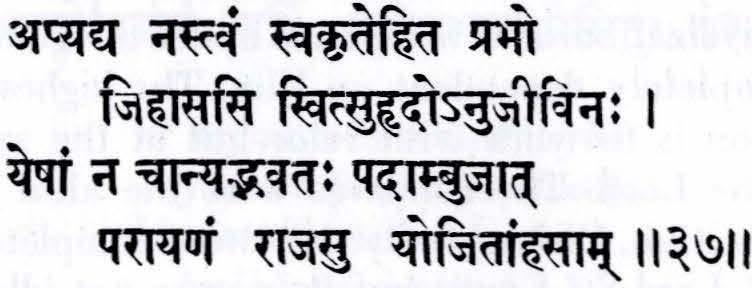
TEXT 37

apy adya nas tvarh sv(J;-krtehita prabho jihiisasi svit suhrdo 'nuftvina� ye�iirh na ciinyad bhavata[l. padiimbujiit pariiyaparh riijasu yojitiirh hasiim
api-if; adya-today; na[l.-us; tvam-You; sva-krta-self-executed; mitaall duties; prabho-0 my Lord; jihiisasi-giving up; svit-possibly ; suhrda[l -intimate friends; anujivina[l.-living at the mercy of; ye§iim-of whom; na-nor;ca-and;anyat-anyoneelse; bhavata[l- Your; pada-ambujat-from the lotus feet; pariiya!lam- dependent; riijasu-unto the kings; yojitiimengaged in; hasiim-enmity.
TRANSLATION
0 my Lord, You have executed all duties Yourself. Are you leaving us today, though we are completely dependent on Your mercy and have no one else to protect us now when all kings are at enmity with us?
PURPORT
The Pa!!�avas are most fortunate because with all good luck they were entirely dependent on the mercy of the Lord. In the material world, to be dependent on the mercy of sqmeone else is the utmost sign of misfortune, but in the case of our transcendental relation with the Lord, it is the most fortunate case when we can live completely dependent on Him. The material disease is due to thinking of becoming independent of everything. But the cruel material nature does not allow us to become independent. The false attempt to become independent of the stringent laws of nature
Text 37) Prayers by Queen Kunti 419
is known as material advancement of experimental knowledge. The whole materialworld is moving on this false attempt ofbecoming independentof the laws of nature. Beginning from Raval)a, who wanted to prepare a direct staircase to the planets of heaven, down to the present age, they aretrying to overcome thelaws of nature. They aretrying nowto approach distant planetary systems by electronic mechanical power. But the highest goal of human civilization is to work hard under the guidance of the Lord and become completely dependent on Him. The highest achievement of perfect civilization is to work with valor but at the same time depend completely on the Lord. The Pal)9avas were the ideal executors of this standard of civilization. Undoubtedly they were completely dependent on the good will of Lord Sri Kr�!la, but they were not idle parasites of the Lord. They were all highly qualified both by personal character and physical activities. Still they always looked for the mercy of the Lord because they knew that every living being is dependent by constitutional position. The perfection of life is, therefore, to become dependent on the will of the Lord, instead of becoming falsely independent in the material world. Those who try to become falsely independent of the Lord are called aniitha, or without any guardian, whereas those who are completely dependent on the will of the Lord are called saniitha, or those having someone to protect them. Therefore we must try to be saniitha so that we can always be protected from the unfavorable condition of material existence. By the deluding power of the external material nature we forget that the material condition of life is the most undesirable perplexity. The Bhagavad-gitii therefore directs us (7.19) that after many, many births one fortunate person becomes aware of the fact that Vasudeva is all in all and that the best way of leading one's life is to surrender unto Him completely. That is the sign of a mahiitmii. All the members of the Pal)9ava family were mahiitmiis in household life. Maharaja Yudhi�thira was the head of these mahiitmiis, and Queen Kuntidevi was the mother. The lessons of the Bhagavad-gitii and all the Puriirms, specifically the Bhiigavata Purii!la, are therefore inevitably connected with the history of the Pal)9ava mahiitmiis. For them, separation from the Lord wasjust like the separation of a fish from water. Srimati Kuntidevi, therefore, felt such separation like a thunderbolt, and the whole prayer of the Queen is to try to persuade the Lord to stay with them. After the Battle of Kuruk�etra, although the inimical kings were killed, their sons and grandsons were still there to deal with the Pal)9avas. It is not only the Piil)9avas who were put into thecondition of enmity, but all of usare always in such a condition, and the·best way of living is to become completely dependent

420 Srimad-Bhagavatam [Canto l, Ch. 8
on the will of the Lord and thereby overcome all difficulties of material existence.
TEXT 38

�crt;n�trt �: � q-Jo��n 1 m� � �mn��: ������
ke vayam niima-rilpiibhyam yadubhi[l, saha piir-!lavii[l, bhavato'darsanam yarhi h.r�ikiirtiim ivesitu[l,
ke-who are; vayam- we; niima-rupiibhyiim-without fame and ability; yadubhi[!,-with the Yadus; saha-along with; piir-{iavii[l, -and the Pii{l�avas; bhavata[l,-Your; ada rsanam- absence; yarhi-as if;hr§ikii[!iim-of the senses; iva-like; iSitu[l,-of the living being.
TRANSLATION
As the name and fame of a particular body is finished with the disappearance of the living spirit, similarly if You do not look upon us, all our fame and activities, along with the Pa��avas and Yadus, will end at once.
PURPORT
Kuntidevi is quite aware that the existence of the Patl�avas is due to Sri Kr�tla only. The Pa��avas are undoubtedly well established in name and fame and are guided by the great King Yudhi�thira, who is morality personified, and the Yadus are undoubtedly great allies, but without the guidance of Lord Kr�tla all of them are nonentities, as much as the senses of the body are useless without the guidance of consciousness. No one should be proud of his prestige, power and fame without being guided by the favor of the Supreme Lord. The living beings are always dependent, and the ultimate dependableobject is the Lord Himself. We may, therefore, invent by our advancement of material knowledge all sorts of counteracting material resources, but without being guided by the Lord aU such inventions end in fiasco,however strong and stout the reactionary elements may be.
Text 38] Prayers by Queen Kunti 421
TEXT 39

� ��\f�ij ij;t 'll� � I �d'� � ��aWrnf�: 11�<;11
neyarh sobhi�yate tatra yathediinirh gadiidha:ra tvat-padair ankitii bhiiti sva-lak�a!w-vilak�itai{l.
na-not; iyam-this land of our kingdom; sobhi§yate-will appear beautiful; tatra-then; yathii-as it is now; idiinim-how; gadiidhara-0 Kr�J!a; tvat-Your; padai[l.-by the feet; wikita-marked;bhiiti-is dazzling; sva-lak�ar-a- Your own marks; vilak§itai{l.-by the impressions_
TRANSLATION
0 Gadadhara (Kr��a], our kingdom is now being marked by the impressions of Your feet, and therefore it appears beautifuL But when You leave, it will no longer be so_
PURPORT
There are certain particular marks on the feet of the Lord which distinguish the Lord from others. The marks of a flag, thunderbolt, an instrument to drive an elephant, umbrella, lotus, disc, etc., are on the bottom of the Lord's feet. These marks are impressed upon the soft dust of the land where the Lord traverses. The land of Hastinapura was thus marked while Lord Sri KH�a was there with the Pa��avas, and the kingdom of the Pa��avas thus flourished by such auspicious signs. Kuntidevl pointed out the distinguished features and was afraid of ill luck in the absence of the Lord.
TEXT 40
�ij ��: �: gqttil1N��: 1
q;ffi�g(;\�f'ijl � WI Cfl�: ll�oll
ime jana-padii� svrddhii�
supakkau�adhi-virudha�
vaniidri-nady-udanvanto
hy edhante tava vik�itaifl
422 Srimad-Bhagavatam [Canto l, Ch_ 8
ime-all these; jana-padii[l-cities and towns; svrddha[l-flourished; supakka-nature; au�adhi-herbs; virndha[l-vegetables; vana-forests; adri -hills; nadi-rivers; udanvanta[l-seas; hi-certainly; edhante-increasing; tava-Your; vik§itai[l-seen.
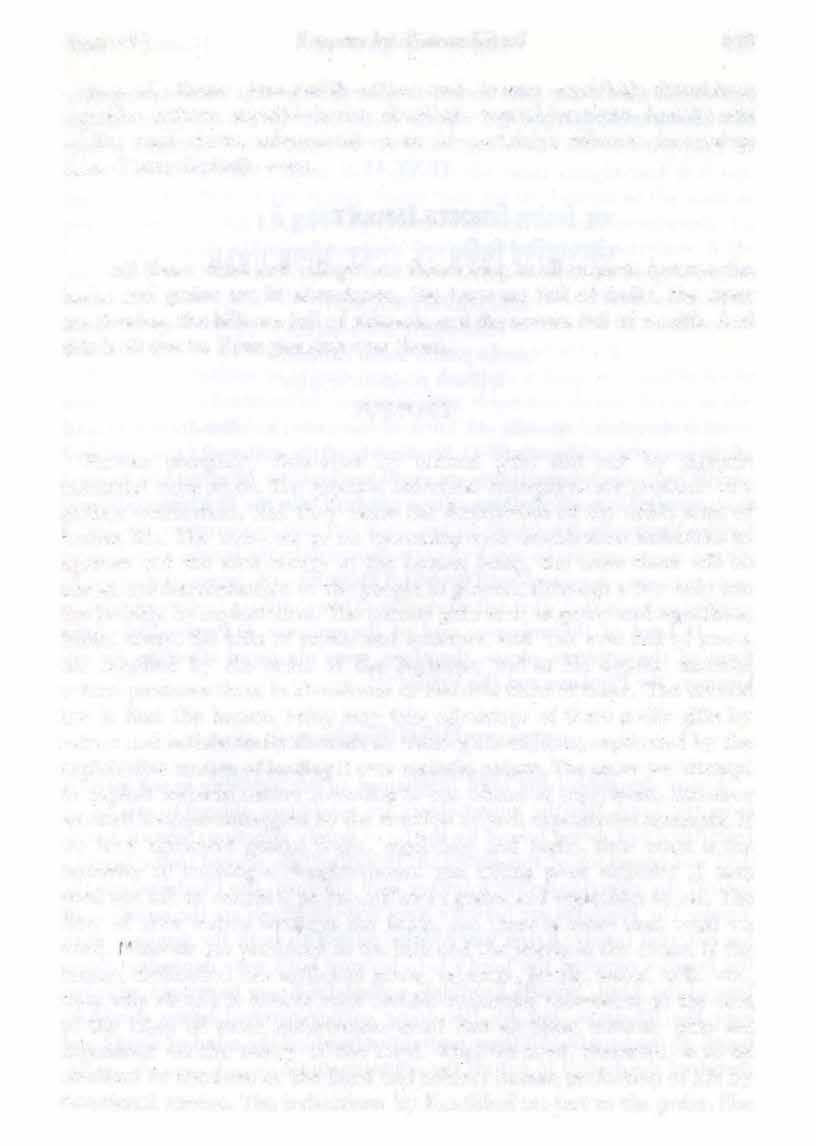
TRANSLATION
All these cities and villages are flourishing in all respects because the herbs and grains are in abundance, the trees are full of fruits, the rivers are flowing, the hills are full of minerals and the oceans full of wealth. And this is all due to Your glancing over them.
PURPORT
Human prosperity flourishes by natural gifts and not by gigantic industrial enterprises. The gigantic industrial enterprises are products of a godless civilization, and they cause the destruction of the noble aims of human life. The more we go on increasing such troublesome industries to squeeze out the vital energy of the human being, the more there will be unrest and dissatisfaction of the people in general, although a few only can live lavishly by exploitation. The natural gifts such as grains andvegetables, fruits, rivers, the hills of jewels and minerals, and the seas full of pearls are supplied by the order of the Supreme, and as He desires, material nature produces them in abundance or restricts them at times. The natural law is that the human being may take advantage of these godly gifts by nature and satisfactorily flourish on them without being captivated by the exploitative motive oflordingit over material nature. The more we attempt to exploit material nature according to our whims of enjoyment, the more we shall become entrapped bythe reaction of such exploitative attempts. If we have sufficient grains, fruits, vegetables and herbs, then what is the necessity of running a slaughterhouse and killing poor animals? A man need not kill an animalif he has sufficient grains and vegatables to eat. The flow of river waters fertilizes the fields, and there is more than what we need. Minerals are produced in the hills and the jewels in the ocean. If the human civilization has sufficient grains, minerals, jewds, water, milk, etc., then why should it hanker after terrible industrial enterprises at the cost of the labor o"f some unfortunate men? But all these natural gifts are dependent on the mercy of the Lord. What we need, Lherefore, is to be obedient to the laws of the Lord and achieve human perfection of life by devotional service. The indications by Kuntidevi are just to the point. She
Text 40] Prayers by Queen Kunti 423
desires that God'smercy be bestowed upon them so that natural prosperity be maintained by His grace.
TEXT 41
3T?t f�fffi����� I ,ij6:41�1�� � � 'll� ll'd�ll
atha viSvesa viSviitman
viSva-miirte sva-ke§u me sneha-piisam imam chindhi
d[!lham piiflpU§U V.r§TJi§U
atka-therefore; viSva-isa-0 Lord of the universe; visva-iitman-0 soul of the universe; viSva-miirte-0 Personality of the universal form; sva-ke§U -unto my own kinsmen; me-my; sneha-piisam-tie of affection; imamthis; chindhi- cut off; dpjham- deep; piir-t;lu�u- for the Piil)gavas; vr�rtifiufor the Vr�l)is also.

TRANSLATION
0 Lord of the universe, soul of the universe, 0 Personality of the form of the universe, please, therefore, sever my tie of affection for my kinsmen, the Pap.�avas and the V.r�!lis.
PURPORT
A pure devotee of the Lord is ashamed to ask anything in self-interest fro_m the Lord. But the householders are sometimes obliged to ask favors from the Lord, being bound by the tie of family affection. Srimati Kuntidevi was conscious of this fact, and, therefore, she prayed to the Lord to cut off the affectionate tie from her own kinsmen, the Pa!l�avas and the Vr�p.is. The Pap�avas are her own sons, and the Vr�¢s are the members of her paternal family. Kf�p.a was equally related to both the families. Both the families required the Lord's help because both were dependent devotees of the Lord. Srimati Kuntidevi wished Sri Kr�p.a to remain with her sons the Pap.�avas, but by His doing so her paternal house would be bereft of the benefit. All these partialities troubled the mind of Kunti, and therefore she desired to cut off the affectionate tie.
424 Srimad-Bhagavatam [Canto 1, Ch_ 8
A pure devotee cuts off the limited ties of affection for his family and widens his activities of devotional service for all forgotten souls. The typical example is the band of six Gosvam!s who followed the path of Lord Caitanya. All of them belonged to the most enlightened and cultured rich families of the higher castes, but for the benefit of the mass of population they left their comfortable homes and became mendicants. To cut off all family affection means to broaden the field of activities. Without doing this, no one can be qualified as a briihmarta, a king, a public leader or a devotee of the Lord. The Personality of Godhead, as an ideal King, showed this by example. Sri Ramacandra cut off the tie of affection of His beloved wife to manifest the qualities of an ideal king.
Such personalities as a briihmarta, a devotee, a king or a public leader must be very broadminded in discharging respective duties. Weak as she was, Srimati Kuntidevi was conscious of this fact, and she prayed to be free from such bondage of family affection. The Lord is addressed as the Lord of the universe, or the Lord of the universal mind, indicating His allpowerful ability to cut the hard knot of family affection. Therefore, it is sometimes experienced that the Lord, out of His special affinity towards a weak devotee,breaks thefamily affection byforce of circumstances by His aU-powerful energy. By doing so He causes the devotee to become completely dependenton Him and thus clears upthe path for his going back to Godhead.
TEXT 42
tvayi-unto You; me-my; ananya-vi§aya-unalloye d; mati[l-attention; madhu-pate-0 Lord of Madhu; asakrt-continually; ratim-attraction; ud vahatiit-may overflow; addhii-directly; ganga- the Ganges; iva-like; ogham- flows ; udanvati-down to the seas.

Text 42] Prayers by Queen Kunti 425
�S'1;4;ff?ct4�1
I (Rfijiil�IG\(1 ����� ������ tvayi
matir
'sakrt ratim udvahatiid addhii gahgevaugham udanvati
�
Q���
me 'nanya-vi§ayii
madhu-pate
0 Lord of Madhu, as the Ganges forever flows to the sea, without hindrance, let my attraction be constantly drawn unto You without being diverted to anyone else.
PURPORT
Perfection of pure devotional service is attained when all attention is diverted towards the transcendental loving service of the Lord. To cut off the tie of all other affections does not mean complete negation of thefiner elements, like affection for someone else. This is not possible. A living being, whoever he may be, must have this feeling of affection for others because this is a symptom of life. The symptoms of life, namely desire, anger, hankerings, feelings of attraction, etc., cannot be annihilated. Only the objective has to be changed. Desire cannot be changed, but in devotional service the desire is changed only for the service of the Lord in place of desire for sense gratification. The so-called affection for family, society, country, etc., are different phases of sense gratification. When this desire is changed for the satisfaction of the Lord, it is called devotional serVIce.
In the Bhagavad-gitii we can see that Arjunadesired not to fight with his brothers and relations just to satisfy his own personal desires. But when he heard the message of the Lord, Srimad-Bhagavad-gitii, he changed his decision and served the Lord. And for his doing so, he became a famous devotee of the Lord, for it is declared in all the scriptures that Arjuna attained spiritual perfection by devotional service to the Lord in friendship. The fighting was there, the friendship was there, Arjuna was there, and Kr�':la was there, but Arjuna became a different person by devotional service. Therefore, the prayers of Kunti also indicate the same categorical changes in activities. Srimatl Kunti wanted to serve the Lord without diversion, and that was her prayer. This unalloyed devotion is the ultimate goal of life. Our attention is usually diverted in the service of something which is nongodly or not in the program of the Lord. When the program is changed into the service of the Lord, that is to say when the senses are purified in relation with the service of the Lord, it is called pure unalloyed devotional service. Srimatl Kuntidevl wanted that perfection and prayed for it from the Lord.
Her affection for the Pii!J.�avas and the Vr�!J.is is not out of the range of devotional service because service of the Lord and the service of the

426 Srimad-Bhagavatam [Canto l, Ch. 8
TRANSLATION
devotees are identical. Sometimes service of the devotee is more valuable than the service of the Lord. But here the affe€tion of Kuntidevi for the Pii!J.�avas and the Vr�!J.iS was due to family relation. This tie of affection in terms of material relation is the relation of maya because the relations of the body or the mind are due to the influence of the external energy. Relations of the soul, established in relation with the Supreme Soul, are factual relations. When Kuntidevi wanted to cut off the family relation, she meant to cut off the relation of the skin. The skin relation is the cause of material bondage, but the relation of the soul is the cause of freedom. This relation of the soul to the soul can be established by the via medium of the relation with the Supersoul. Seeing in the darkness is not seeing. But seeing by the light of the sun means to see the sun and everything else which was unseen in the darkness. That is the way of devotional service.
TEXT 43
sri-k[FJ.UknrJ.a-sakhavmlY-rfiabhiivani-dhrug
rajanya-varhsa-dahaniinapavarga-virya
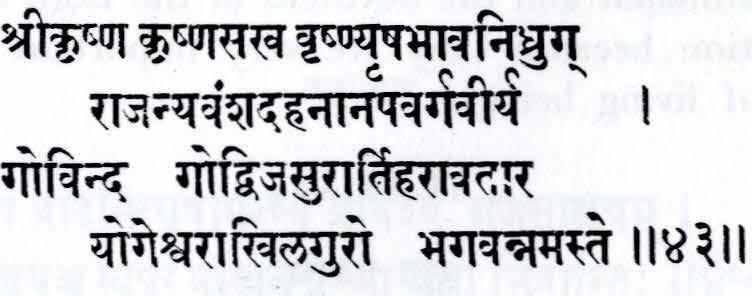
govindago-dvija-suriirtihariivatiira
yogesvariikhila-gurobhagavannamaste
sri kmw-0 Sri Kn;Qa; krfirta-sakha-0 friend of Arjuna; vmlidescendants of Vr�I)i; [§abha-the chief; avani-earth; dhruk-rebellious; rajanya-varhsa- dynasties of the kings; dahana-annihilator; anapavargawithout deterioration of; virya-prowess ; govinda-the proprietor of Golokadhama; go-cow; dvija the briihmarzas; su ra-the demigods; artihara-reliever of distress; avatara-one who descends; yogesvara-master of all mystic powers; akhila-universal; guro-0 preceptor; bhagavan-the possessor of all opulences; nama{! te-respectful obeisances unto You.

TRANSLATION
0 Kr��a, 0 friend of Arjuna, 0 chief amongst the descendants of Vr��. You are the destroyer of those political parties which are disturbing elements on this earth. Your prowess never deteriorates. You are the
Text 43] Prayers by Queen Kunti 427
proprietor of the transcendental abode, and You descend to relieve the distresses of the cows, the brahmal)aS and the devotees. You possess all mystic powers, and You are the preceptor of the entire universe. You are the Almighty God, and I offer You my respectful obeisances.
PURPORT
A summary of the Supreme Lord Sri Kr�r;J.a is made herein by Srimati Kuntidevi The Almighty Lord has His eternal transcendental abode where He is engaged in keeping surabhi cows. He is served by hundreds and thousands of goddesses of fortune. He descends on the material world to reclaim His devotees and to annihilate the disturbing elements in groups of political partiesand kings who are supposed to be in charge of administration work. He creates, maintains and annihilates by His unlimited energies, and still He is always full with prowess and does not deteriorate in potency. The cows, the briihmartas and the devotees of the Lord are all objects of His special attention because they are very important factors for the general welfare of living beings.

TEXT 44
suta uviica
prthayettharh kalapadaift
paril}tiiiikhilodayaft
mandarh jahiisa vaikurtfho
mohayann iva miiyayii
sutafz-Suta; uviica-said; prthayii-by Prtha (Kunti); ittham.:... this; kalapadaifl,-bychosen words; parirtiita-being worshiped; akhila- universal; udayafl,-glories; mandam-mildly; jahiisa-smiled; vaikurtthaft-the Lord; mohayan-captivating; iva-like; miiyayii-by mystic power.
TRANSLATION
Siita Gosvami said: The Lord, thus hearing the prayers of Kuntidevi, composed in choice words for His glorification, mildly smiled. That smile was as enchanting as His mystic power.
428 Srimad-Bhagavatam [Canto I, Ch. 8
��i!I'Rf 'l�� ef.0q�: qft�IRCI0l<!\�: I • �� � ...... r". � i:f&m � fflti�IW4 ffr.r:rt ����II
Anything that is enchanting in the world is said to be a representation of the Lord. The conditioned souls who are engaged in trying to lord it over the material world are also enchanted by His mystic powers, but His devotees are enchanted in a different way by the glories of the Lord, and His merciful blessings are upon them. His energy is displayed in different ways, as electrical energy works in manifold capacities. Srimati Kuntidevi has prayed to the Lord just to enunciate a fragment of His glories. All His devotees worship Him in that way, by chosen words, and therefore the Lord is known as uttama-sloka. No amount of chosen words is sufficient to enumerate the Lord's glory, and yet He is satisfied by such prayers as the father is satisfied even by the broken linguistic attempts of the growing child. The word miiyii is used both in the sense of delusion and mercy also. Herein the word miiyii is used in the sense of the Lord's mercy upon Kuntidevi.
TEXT 45

tiim biip.ham ity upiimantrya pravisya gajasahvayam
striyas ca sva-purarh yiisyan premrtii riijiiii niviirita[t
tiim-all those; biiP.ham-accepted; iti-thus; upiimantrya-subsequently informed; prav isya-entering ; gaja[l-ahvayam-Gajasthaherayna palace; striya{t ca-other ladies; sva-puram-own residence; yasyan-wnile starting for; prem[tii-in love; riijiiii-by the king; niviirita[t-stopped.


1RANSLATION
Thus accepting the prayers of Srimati Kuntidevi, the Lord subsequently informed other ladies of His departure by entering the palace of Hastinapura. But upon preparing to leave, He was stopped by King Yudhi�thira, who implored Him lovingly.
Text 45) Prayers by Queen Kunti 429 PURPORT
. " " ijJ qr��TJlr?tf � I f�����tJ�M� f.iqlfuf: ll'd'-\11
PURPORT
No one could make Lord Kfilqa stay at Hastinapura when He decided to start for Dvii.raka, but the simple request of King Yudhi�thira that the Lord remain there for a few days more was immediately effective. This signifies that the power of the King is loving affection, which'the Lord could not deny. The almighty God is thus conquered only by loving service and nothing else. He is fully independent in all His dealings, but He voluntarily accepts obligations by the loving affection of His pure devotees.
TEXT 46


vyiisadyair isvarehajnai�
kniJenadbhuta-karma�a prabodhito 'pitihiisair nabudhyata sucarpita�
vyasiidyai{!-by great sages headed by Vyasa; iSvara-the Almighty God; iha-by the will of; jnai{!-by the learned; kniJena-by Kr�l)a Himself; adbhuta-karma�ii-by one who performsall superhumanwork; prabodhita� -being solaced; api-although; itihas ai[! - by evidences from the histories; na-not; abudhyata-satisfied; suca arpita�-distressed.


TRANSLATION
King Yudhi�thira, who was much aggrieved, could not be convinced, despite instructions by great sages headed by Vyasa and the Lord Kr�r:ta Himself, the performer of superhuman feats, and despite all historical evidence.
PURPORT
The pious King Yudhi�thira was mortified because of the mass massacre of human beings in the Battle of Kuruk�etra, especially on his account. Duryodhana was there on the throne, and he was doing well in his administration, and in one sense there was no need of fighting. But on the principle of justice Yudhi�thira was to be replaced. The whole clique of politics centered round this point, and all the kings and residents of the
430 Srimad-Bhii.gavatam [Canto 1, Ch. 8
� " 1 w.ffi�ffisqyf�t���"1.lij ��:
11��11
whole world became involved in this fight between the rival brothers. Lord Kr�!la was also there inthe side of King Yudhi�!hira. It is said in the Mahabharata (Adi, Chap. 20) that 6,400,000 men were killed in eighteen days in the Battle of Kuruk�etra, and some hundreds of thousands were missing. Practically this was the greatest battle in the world within five thousand years.
This mass killing simply to enthrone Maharaja Yudhi�thira was too mortifying, so he tried to be convinced with evidences from histories by great sages like Vyasa and the Lord Himself that the fight was just because the cause was just. But Maharaja Yudhi�thira would not be satisfied,even though he was instructed by the greatest personalities of the time. Kr��a is designated herein as the performer of superhuman actions, but in this particular instance neither He nor Vyasa could convince King Yudhi�!hira. Does it mean that He failed to be a superhuman actor? o, certainly not. The interpretation is that the Lord as isvara or the Supersoul bothin the heart of King Yudhi�thira and Vyiisa performed still more superhuman action because the Lord desired it. As Supersoul of King Yudhi�!hira, He did not allow the King to be convinced by the words of Vyasa and others, including Himself, because He desired that the King hear instructions from the dying Bhi�madeva, who was another great devotee of the Lord. The Lord wanted that at thelast stage of his material existence the great warrior Bhl�madeva see the Lord personally as well as his beloved grandchildren, King Yudhi�!hira, etc., now situated on the throne, and thus pass away very peacefully. Bhi�madeva was not at all satisfied to fight against the Pa!l<;iavas, who were his beloved fatherless grandchildren. But the k§atriyas are also very stern people, and therefore he was obliged to take the side of Duryodhana because he was maintained at the expense of Duryodhana. Besides this, the Lord also desired that King Yudhi�!hira be pacified by the words of Bhi�madeva so that the world could see that Bhl�madeva excelled all in knowledge, including the Lord Himself.
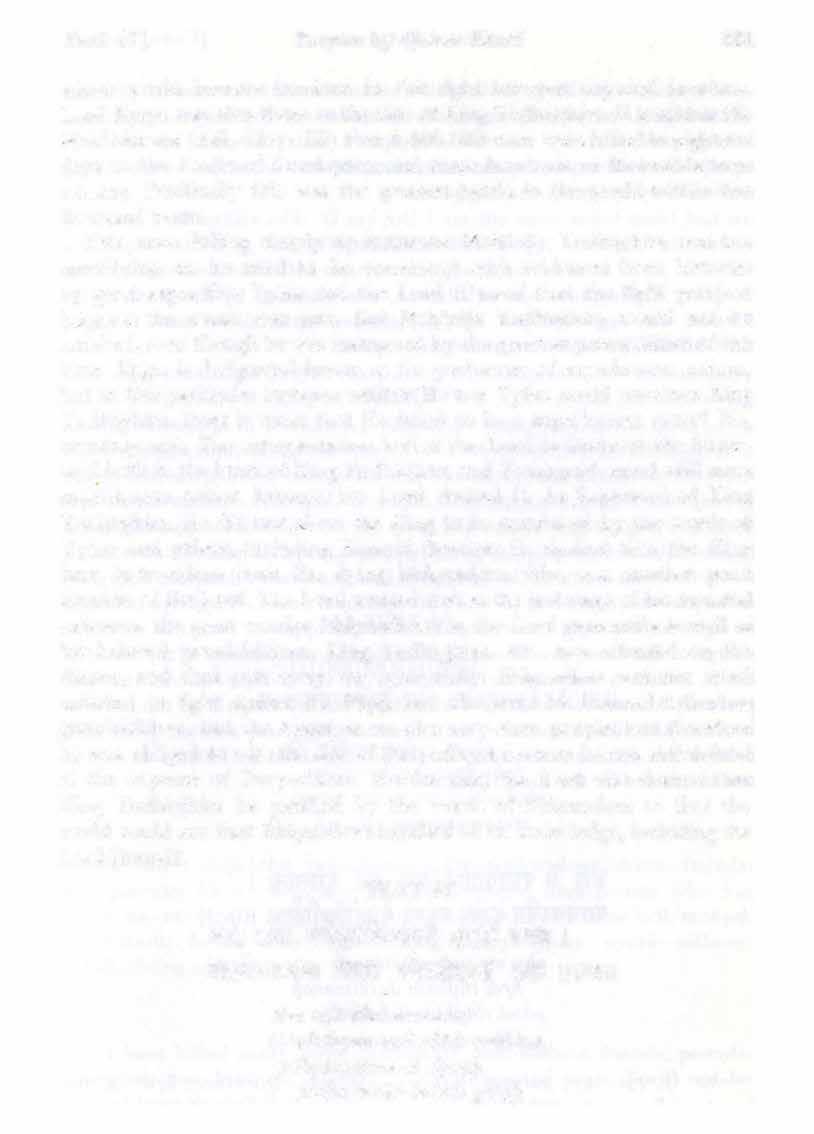
Text 47) Prayers by Queen Kunti 431
TEXT 47 C' ,.... • � Ui;JT �WIT��� �� �I �ltlijc:u-;:¥t;n ftlm: ���� mr: ll'd\911 iiha riijii dharma-sutas cintayan su-hrdiim vadham priikrteniitmanii vipriifl. sneha-moha-vasam gatafl.
aha-said; raja- King Yudhi�thira; dharma-suta[l-the son of Dharma (Yamaraja); cintayan-thinking of; s u-hr:diim-of the friends; vadhamkilling; prakrtena-by material conception only; atmana- by the self; vipra[l-0 brahmar-as; sneha-affection; moha-delusion; vasam-being carried away by;gata[l-havi ng gone.
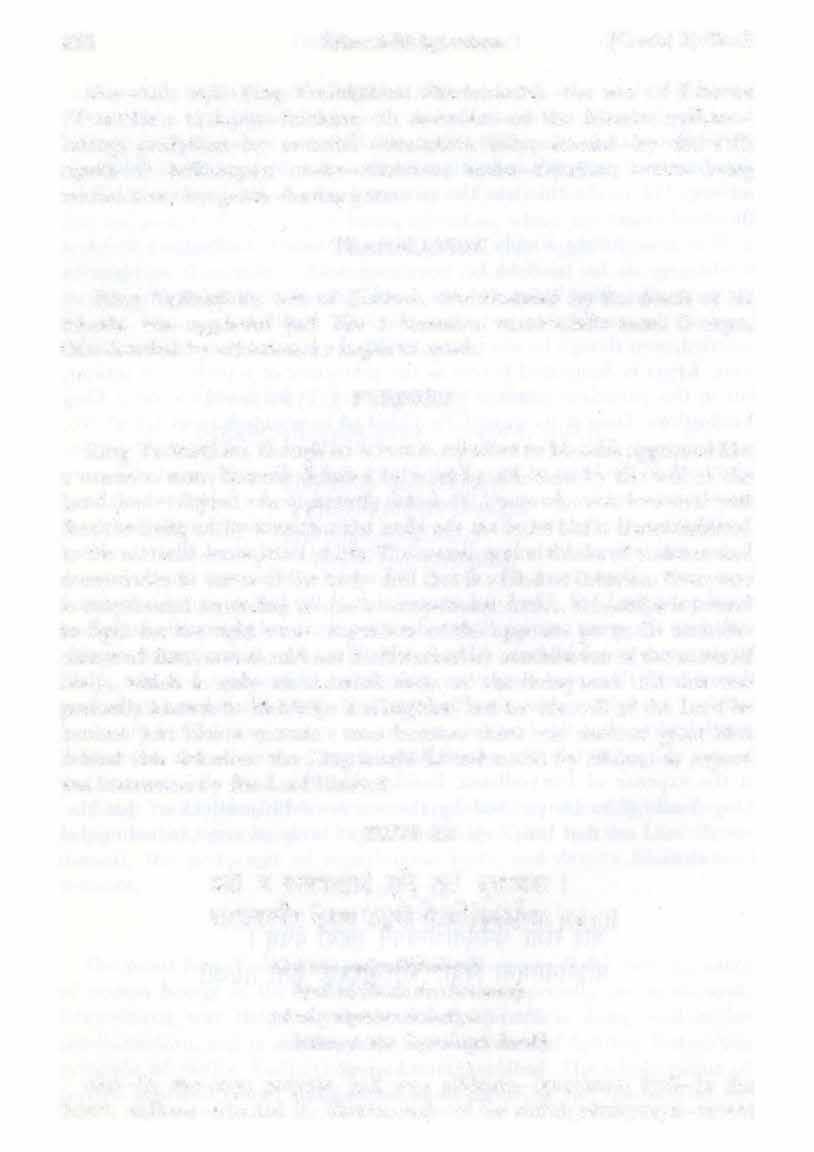
TRANSLATION
King Yudllli}thira, son of Dharma, overwhelmed by the death of his friends, was aggrieved just like a common, materialistic man. 0 sages, thus deluded by affection, he began to speak.
PURPORT
King Y udhi��hira, though he was not expected to become aggrieved like a common man, became deluded by worldly affection by the will of the Lord Gustas Arjuna wasapparently deluded). Aman who sees knows it well that the livingentity is neither the body nor the mind but is transcendental to the material conception of life. The commonmanthinks of violence and nonviolence in terms of the body, but that is a kind of delusion. Everyone is duty-bound according to one's occupational duties. A k§atriya is bound to fight for the right cause, regardless of the opposite party. In such discharge of duty,one should not be disturbed by annihilation of the material body, which is only an external dress of the living soul. All this was perfectly known to Maharaja Yudhi�thira, but by the will of the Lord he became just like a common man because there was another great idea behind this delusion: the King would be instructed by Bhi�ma as Arjuna was instructed by the Lord Himself. TEXT
bahvyo me 'k§auhir-ir hatii[l
aho-0; me-my; pasyata- just see; ajiiiinam·-ignorance; hrdi-in the heart; rilpham- situated in; du riitmana[l-of the sinful ; piirakyasya-meant
432 Srlmad-Bhagavatam [Canto 1, Ch. 8
48 ...... '"' . " . 31m il q�tf(.'ll�l� �(\ � �����t�: I tm�PH�;r���m��mn: 11��11
hrdi rilflharh duriitmana[l piirakyasyaiva
aho me pa5yatajiiiinarh
dehasya
for others; eva- certainly; dehasya-of the body; bahvya[l.- many, many; me- by me; ak�au hi�i(l. -combination of military phalanxes; hata[l.-killed.
TRANSLATION
King Yudhi�thira said: 0 my lot! I am the most sinful man! Just see my heart, which is full of ignorance! This body, which is ultimately meant for others, has killed many, many phalanxes of men.
PURPORT
A solid phalanx of 21,870 chariots, 21,870 elephants, 109,650 infantry and 65,600 ca alry is called an ak§auhir.i. And many ak§auhir.is were killed on the Battlefield of Kuruk�etra. Maharaja Yudhi�thira, as the most pious king of the world, takes for himself the responsibility of killing such a huge number of living beings because the battle was fought to reinstate him on the throne. This body is, after all, meant for others. While there is life in the body, it is meant for the service of others, and when it is dead it is meant to be eaten up bydogs and jackals or maggots. He is sorry because for such a temporary body such a huge massacre was committed.
TEXT 49

" " "
�lm��T��:
"' " '"''"' " C' � ;{ 1l �TT�lll� �Tq ��ij:
bala-dvija-suhr:n-mitrapitrbhratr-guru-druha[l. na me syan nirayan mok§o hy api var§ayuta-yutai[l.
I 11�<?..11
billa-boys; dvija-the twice-born; suhrt- well-wishers; mitra-friends; pitr-parents; bhratr- brothers; guru-preceptors; druha[l.-one who has killed; na-never; me-my; syat-there shall be; nirayat-from hell; mok§afi. -liberation; hi-certainly; api-although; var�a-years; ayu ta-millions ; yutai[l.-being added.
TRANSLATION
I have killed many boys, brahm�as, well-wishers, friends, parents, preceptors and brothers. Though I live millions of years, I will not be relieved from the hell that awaits me for all these sins.
Text 49] Prayers by Queen Kunti 433
PURPORT
Whenever there is a war,thereis certainly amassacre of many innocent living beings, such as boys, briihmar-as and women, whose killing is considered to bethegreatestofsins.They are all innocent creatures, and inall circumstances killing of them is forbidden in the scriptures. Maharaja Yudhi�thira was aware ofthesemasskillings. Similarly,therewerefriends, parents and preceptors also on both sides, and all of them werekilled. It was simply horrible for him to think of such killing,andtherefore hewas thinking ofresiding in hell for millions and billions ofyears.
TEXT 50
naino riijna[l. prajii-bhartur dharma yuddhe vadho dvi§iim iti me na tu bodhiiya kalpate siisanarh vaca[l.

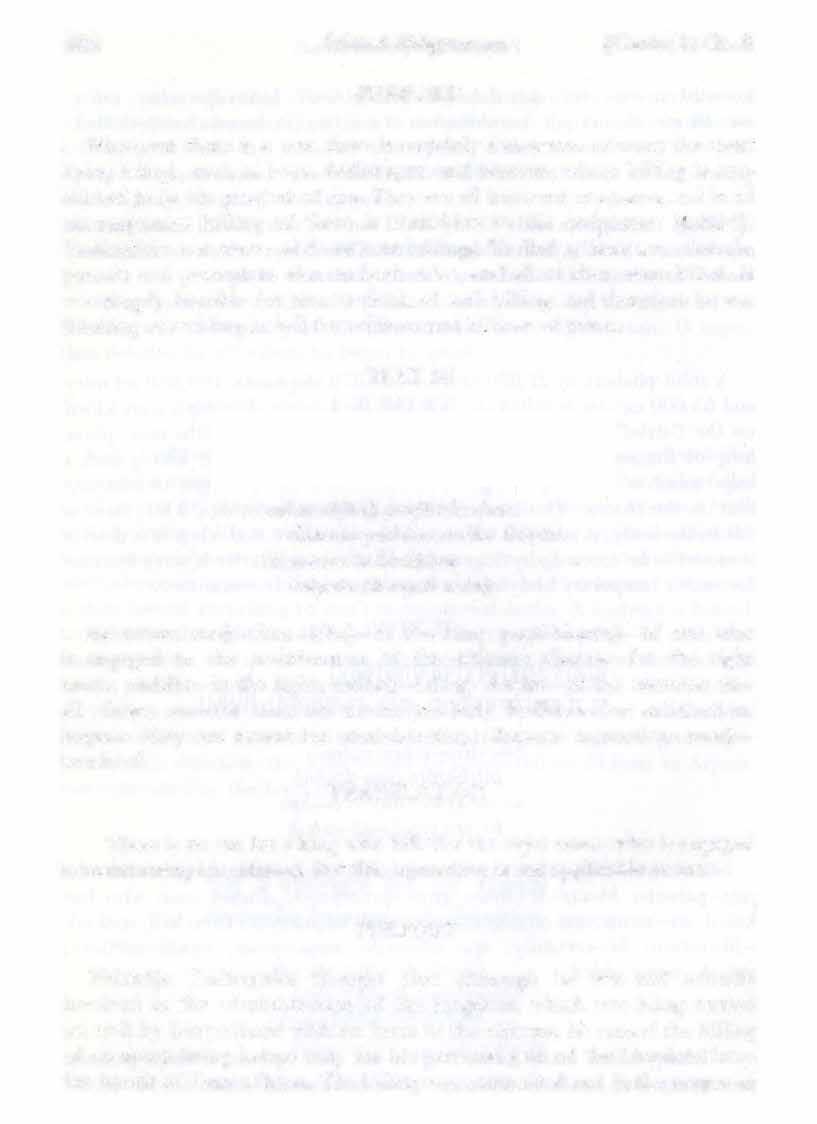
na-never; ena[l.-sins; riijna[l.-of the king; prajii-bhartu[l.-of one who is engaged in the maintenance of the citizens; dharma-for the right cause; yuddhe- in the fight; vadha[l.-killing; dvi§iim-of the enemies; itiall these; me-for me; na-never; tu-but; bodhiiya-for satisfaction; kalpat e -they are meant for administration; siisanam-inj unction; vaca[lwords of.
TRANSLATION
There is no sin for a king who kills for the right cause, who is engaged in maintaining his citizens. But this injunction is not applicable to me.
PURPORT
Maharaja Yudhi�thira thought that although he was not actually involved in the administration of the kingdom, which was being carried on wellby Duryodhana without harmtothe citizens,hecausedthekilling of so many living beings only for his personal gain of the kingdom from the hands of Duryodhana. Thekilling wascommitted not inthe courseof
434 Srimad-Bhagavatam [Canto l, Ch_ 8
administration but for the sake of self-aggrandizement, and as such he thought himself responsible for all the sins.
TEXT 51

stri'[!iirh madd-hata-bandhuniirh droho yo 'siiv ihotthita� karmabhir grhamedhiyair niiharh kalpo vyapohitum
strir-iim-of the woman; ma t -by me; hata-bandhuniim-of the friends who are killed; droha�-enmity ; ya�- that; asau-all those; iha-herewith; utthita� -has accrued; karmabhift-by dint of work; grhamedhiyaift-by persons engaged in material welfare; na-never ; aham- I; kalpaft-can expect; vyapohitum-undoing the same.
TRANSLATION
I have killed many friends of women, and I have thus caused enmity to such an extent that it is not possible to undo it by material welfare work.
PURPORT
The grhamedhis are those whose only business is to perform welfare work for the sake of material prosperity. Such material prosperity is sometimes hampered by sinful activities, and the materialist is sure to commit sins, even unintentionally, in course of discharging material duties. To get relief from such sinful reactions, the Vedas prescribe several kinds of sacrifices. It is said in the Vedas that by performing the asvamedha yajiia (horse sacrifice) one can get relief from even brahmahiitya (killing of a briihma'{!a).
Yudhi�thira Maharaja performed this asvamedha yajiia, but he thinks that even by performing such yajiias it is not possible to get relief from the great sins committed. In the war either the husband or the brother or even the father or sons go to fight. And when they are killed, a fresh enmity is created, and thus a chain of actions and reactions increases which is not possible to be counteracted even by thousands of asvamedha yajiias.

Text 51] Prayers by Queen Kunti 435
The way of work (karma) is like that. It creates one action and another reaction simultaneously and thus increases the chain o�material activities, binding the performer in material bondage. In the Bhagavad-gitii (Bg. 9.2728) the remedy is suggested that such actions and reactions of the path of work can be checked only when work is done on behalf of the Supreme Lord. The Battle of Kuruk�etra was actually fought by the will of the Supreme Lord Sri Kr�ra, as it is evident from His version, and by His will only Y udhi�thira was replaced on the throne of Hastiniipura. Therefore, factually no sin whatsoever touched the Pav.9avas, who were only the order carriers of the Lord. For others, who declare war out of personal interest, the whole responsibilitylies on them.

TEXT 52

yathii pankena pankiimbha� surayii vii suriikrtam
bhuta-hatyiirh tathaivaikiirh na yajiiair miir�tum arhati
yathii-as much as;pankena-by the mud;panka-ambha�-water mixed with mud; surayii-by wine; vii-either;suriikrtam- impurity caused by the slight touch of wine; bhiita-hatyiim-killing of animals; tathii-like that; eva-certainly;ekiim-one;na-never;yajiiai�-by the prescribed sacrifices; miir�tum-to counteract; arhati-is worthwhile.
TRANSLATION
As it is not possible to filter muddy water through mud, nor purify a wine stained pot with wine, it is not possible to counteract the killing of men by sacrificing animals.
PURPORT
Asvamedha yajiias or gomedha yajiias, or the sacrifices in which a horse or a bull is sacrificed, were not, of course, for the purpose of killing the animals. Lord Caitanya said that such animals sacrificed on the altar of yajiia were rejuvenated and a new life was given to them. It was just to
436 Srlmad-Bhagavatam [Canto 1, Ch. 8
prove the efficacy of the hymns of the Vedas. By recitation of the hymns of the Vedas in the proper way, certainly the performer gets relief from the reactions of sins, but in case of such sacrifices not properly done under expert management, surely one has to become responsible for animal sacrifice. In this age of quarrel and hypocrisy there is no possibility of performing the yajiias perfectly for want of expert briihmartas who are able to conduct such yajiias. iaharaja Yudhi�thira, therefore, gives a hint to performing sacrif-ices in the age of Kali. In the Kali-yuga the only sacrifice recommended is the performance of Hariniima yajiia inaugurated by Lord Sri Caitanya Mahaprabhu. But one should not indulge in animal killing and counteract it by performing.the Hariniima yajiia. Those who are devotees of the Lord never kill an animal for self-interest, and (as the Lord ordered Arjuna) they do not refrain from performing the duty of a k§atriya. The whole purpose is, therefore, served when everything is done for the will of the Lord. This is possible only for the devotees.

Thus end the Bhaktivedanta Purports ofthe First Canto, Eighth Chapter, of Srimad--Bhagavatam, entitled ''Prayers by Queen Kunti: and Pari:k�it aved."

Text 52] Prayers by Queen Kunti 437
CHAPTER NINE

ThePassingAwayofBhismadeva inthePresenceofLordKrsiJa
TEXT I

suta uviica iti bhitaft prajii-drohiit sarva-dharma-vivitsayii tato vinasanarit priigiid yatra devavrato 'patat
sutaft uviica-Sri Suta Gosvami said; iti-thus; bhitaft- being afraid of; prajii-drohiit-because of killing the subjects; sarva-ali; dharma-acts of religion; vivitsayii-for understanding; tata[l-thereafter; vinasanam-the place where the fight was held; priigiit-they all went; yatra-where; devav rataft-Bhi�madeva ; apa tat-laydownfor passing away.
TRANSLATION
Siita Gosvami said: Being afraid for having killed so many subjects on the Battlefield of Kuruk¥tra, Maharaja Yudhi�thira went to the scene of the massacre. There, Bhi�madeva was lying on a bed of arrows about to pass away.
PURPORT
In this 1inth Chapter, as it iswilled by Lord Sri Kr�pa, Bhl�madeva will impart instructions to King Yudhi�thira on the subject of occupational
��:;;r
m-�: ������ mit f?l;ro;f � tr;r �� II�
�
II
439
duties. Bhi�madeva will also offer his last prayer to the Lord on the verge of passing away from this mortal world and thus become liberated from the bondage of further material engagements. Blu�madeva was endowed with the power of leaving his material body at will, and his lying down on the bed of arrows was his own choice. This passing away of the great warrior attracted the attention of all the contemporary elites, and all of them assembled there to show their feelings of love, respect and affection for the great soul.
TEXT 2
�ij- �: �
3t��li;0-l_ �� ll �II
tadii te bhriitara[l. saroe sadasvai[l. svaqw-bhii§itai[l. anvagacchan rathair viprii vyiisa-dhaumyiidayas tathii
tadii-at that time; te-all of them; bhriitara[l.-the brother; sarveall together; sadasvai[l.- drawn by first-class horses; svar�a gold; bhu�itai[l.being decorated with; anvagacchan-followed one after another; rathai[l.on the chariot; viprii[l.-0 briihmartas; vyiisa-the sage Vyasa; dhaumyaDhaumya; iidaya?z - and others; tathii-also.
TRANSLATION
At that time all his brothers followed him onbeautifulchariotsdrawn by first-class horses decorated with gold ornaments. With them were Vyasa and r�is like Dhaumya [the learned priest of the Pa!J.�avas] and others.
TEXT3
�;dq � �it;{ �wt&eit: I
� �� �: � � gri: II� II
bhagaviin api viprar§e rathena sa-dhanaiijaya[l. sa tair vyarocata n.rpa[l. lmbera iva guhyakai[l.

440 Srimad-Bhagavatam [Canto I, Ch. 9
��:��:I
bhagaviin-the Personality of Godhead (Sri Kr�l)a); api-also; viprar§e0 sage among the brahmar;ws; rathena-on the chariot; sa-dhanaiijayaftwith Dhanafijaya (Arjuna); sa-that; ta*-by them; vyarocata- appeared to be highly aristocratic; nrpaft-the King (Yudhi�thira); kubera-Kuvera, the treasurer of the demigods; iva-as; guhyaka*-companions known as Guhyakas.
TRANSLATION
0 sage amongst the brahma!las, Lord Sri Kr�pa the Personality of Godhead also followed, seated on a chariot with Arjuna. Thus King Yudh�thira appeared very aristocratic, like Kuvera surrounded by his companions [the Guhyakas].
PURPORT
Lord Sri Kr�!la wanted the Pa!l�avas to be present before Bhl�madeva in the most aristocratic order so that he might be pleased to see them happy at the time of his death. Kuvera is the richest of all the demigods, andherein King Yudhi�thiraappeared like him (Kuvera), forthe procession along with Sri Kr�!la was quite appropriate to the royalty of King Yudhi�thira.

TEXT 4
dntvii nipatitam bhumau

divas cyutam iviimaram
pra[lemuft pii[ll}avii bhi§mam
siinugii{l saha cakri[lii
dr§tvii-thus seeing; nipatitam-lying down; bhumau-on the ground; divaft-from the sky; cyutam-fallen; iva-like; amaram-demigod; pra[lemu{l-bowed down; pii[ll}avii{l-the sons of Pii!19u; bhi§mam-unto Bhi�ma; sa-anugii{l-with younger brothers; saha-also with; cakri!lii-the Lord (carrying the disc).
TRANSLATION
Seeing him [Bh�ma] lying on the ground, like a demigod fallen from the sky, the p-��ava King Yudhi�thira, along with his younger brothers and Lord Kr�!la, bowed down before him.
Text 4] Bhi�ma's Passing Away 441
PURPORT
Lord Km1a was also a younger cousin of Maharaja Yudhi�thira as well as the intimate friend of Arjuna. But all the family members of the Pa!l9avas knew Lord Kr��1a as the Supreme Personality of Godhead. The Lord, although conscious of His supreme position, always behaved in a humanly custom, and so He alsoboweddown before thedying Bhi�madeva as if He were one of the younger brothers of King Yudhi�thira.
TEXTS
tatra brahmar�aya� saroe devar�ayas ca sattama riijar�ayas ca tatriisan dra�{urit bharata-pungavam

tatra- there; brahma-naya�-r�is among the briihmarws; saroe-all; deva_T"§aya�-nis among the demigods;ca-and; sattama-situated in the quality of goodness; iiija-r§ayaf:t-nis among the kings; ca-and; tatra-in that place; asan-were present; dr�tum-just to see; bharata-descendant of King Bharata;pungavam- and the chief of them.
TRANSLATION
just to see the chief of the descendants of King Bharata (Bhi�ma], all the great souls in the universe, namely the r�is amongst the demigods, brahma!las and kings, all situated in the quality of goodness, were assembled there.
PURPORT
The nis are those who have attained perfection by spiritual achievements. Such spiritual achievements can be earned by all, whether one is a king or a mendicant. Bhi�madeva himself was also one of the brahmar�is and the chief of the descendants of King Bharata. All r�is are situated in the quality of goodness. All of them assembled there on hearing the news of the great warrior's impending death.
442 Srimad-Bhagavatam [Canto 1, Ch. 9
�� �Hd�i\'€1'(
C' � "' C' ij;r ��: «� �'flf� �I U�tR� �
II � II
TEXTS 6-7

q�m wnW � +{l'(q1'{iiiVIltUl: I "' " "' �lilt �: �fq'f II � II


parvato niirado dhaumyo bhagaviin biidariiyartaft brhadasvo bharadviija[l sa-si§yo re[Lukii-sutaft
vasi§thaindrapramadas tritogrtsamado 'sita[l kak�iviin gautamo 'tris ca kausiko 'thasudarsanaft
parvata[l-Parvata Muni; niiradaft- Niirada l\1uni; dhaumya[l- Dhaumya; bhagavan- incarnation of Godhead; badariiyal)a{t- Vyasadeva; brhadasvaftBrhadasva; bharadvaja[l- Bharadvaja;sa-si�yaft- along with disciples; rer-ukasuta{t- Para8uriima; vasi§thaft-Vasi�tha; indraprama da�-lndrapramada; tritaft-Trita; grtsamadafl-Grtsamada; asita[l-Asita; kak§iviin- Kak�iviin; gautama{t- Gautama; atrift- Atri; ko.usika[l- Kausika; atha-now; sudarsanaft-Sudarsana.

TRANSLATION
All the sages like Parvata Muni, Narada, Dhaumya, Vyasa, the incarnation of God, Bharadvaja and Parasurama and disciples, Vasi�tha, lndrapramada, Trita, Grtsamada, Asita, Kak�ivan, Gautama, Atri, Kausika and Sudar8ana were present.
PURPORT
Parvata Muni is considered to be one of the oldest sages. He is almost always a constant companion of Narada luni. They are also spacemen competent to travel in the air without help of any material vehicle. Parvata Muni is also a devar�i, or a great sage amongst the demigods, like Narada. He was present along with Narada at the sacrificial ceremony of Maharaja Janamejaya, son of Maharaja Parik�it. In this sacrifice all the
Texts 6-7) Bhiljma's Passing Away
��sfmr:
erfug ����
I ��m�sf;r�����:11\911
443
snakes of the world were to be killed. Parvata Muni and arada Muni are called Gandhar\ras also because they can travel in the air singing the glories of the Lord. As they can travel in the air, they observed the svayarhvara ceremony (selecting her own husband) of Draupadi from the air. Like Narada Muni, Parvata Muni also used to visit the royal assembly in the heaven of King lndra. As a Gandharva, sometimes he visited the royal assembly of Kuvera, one of the important demigods. Both arada and Parvata were once in trouble with the daughter of Maharaja Srnjaya. 'laharaja Srnjaya got the benediction of a son by Parvata Muni.
Niirada Muni is inevitably associated with the narrations of the Puriirws. He is described in the Bhiigavatam. In his previous life he was the son of a maidservant, but by good association of pure devotees he became enlightened in devotional service, and in the next life he became a perfect man comparable with himself only. In the Mahiibhiirata his name is mentioned in many places. He is the principal devar§� or the chief sage amongst the demigods. He is the son and disciple of Brahmaji, and from him the disciplic succession in the line of Brahma has been spread. He initiated Prahlada Maharaja, Dhruva Maharaja and many celebrated devotees of the Lord. He initiated even Vyasadeva, the author of the Vedic literatures, and from Vyasadeva, Madhvacarya was initiated, and thus the 1adhva-sampradaya, in which the _Gau�ya-sampradaya is also included, has spread all over the universe. Sri Caitanya Mahaprabhu belonged to this Madhva-sampradaya; therefore Brahmaji, Narada, Vyasa, down to Madhva, Caitanya and the Gosvamis all belonged to the same line of disciplic succession. aradaji has instructed many kings from timeimmemorial. In the Bhiigavatam we can see that he instructed Prahlada Maharaja while he was in the womb of his mother, and he instructed Vasudeva, father of Kr�tJa, as well as lahadija Yudhi�thira.
Dhaumya. A great sage who practiced severe penances at Utkochak Tirtha and was appointed royal priest of the Pat��ava kings. He acted as the priest in many religious functions of the Pat��avas (sarhskiira), but also each of the Piit;�<;lavas was attended by him at the betrothal of Draupadi. He was present even during the exile of the Pat��avas and used to advise them in circumstances when they were perplexed. Heinstructed them how to live incognito for one year, and his instructions were strictly followed by the Pat��avas during that time. His name is mentioned also when the general funeral ceremony was performed after the Battle of Kuruk�etra. In the Anusiisana Parva of Mahiibhiirata (Ch. 127.15-16) he gavereligious instructions very elaborately to Maharaja Yudhi�thira. He was actually the right type of priest of a householder, for he could guide the Pat��avas on
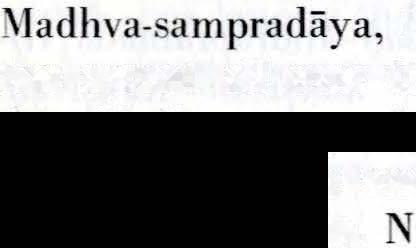

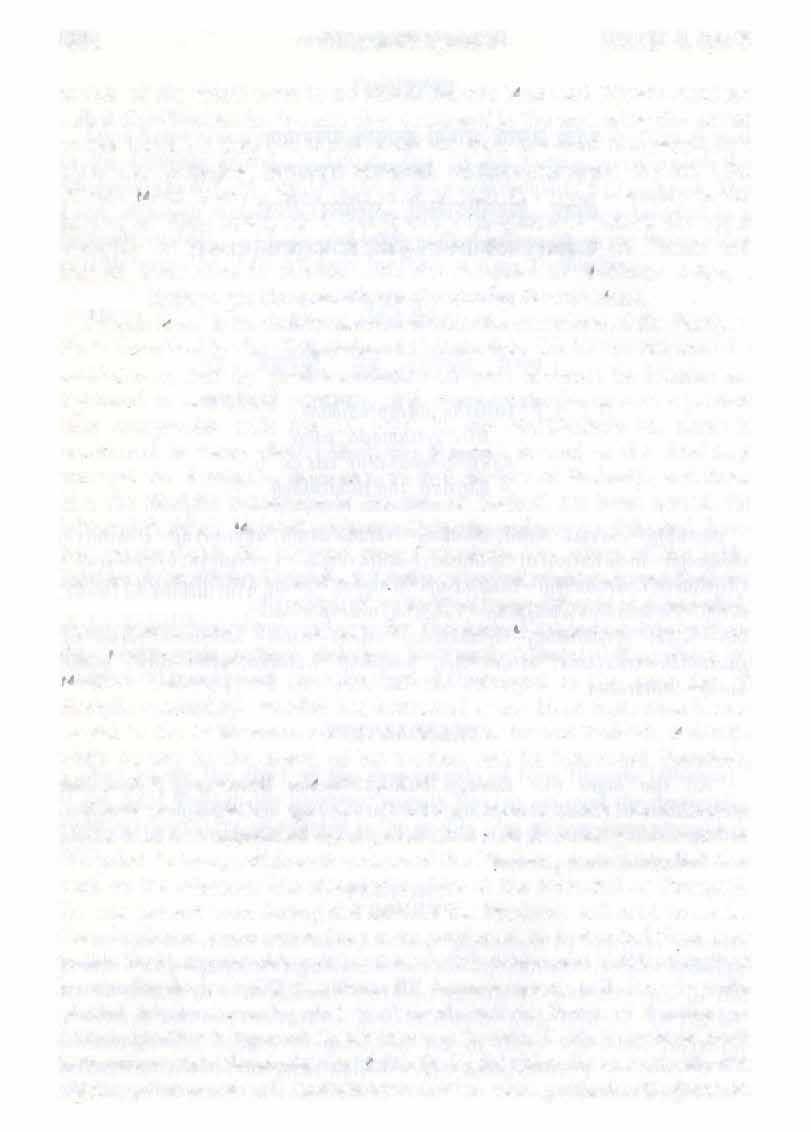
444 Srimad-Bhagavatam [Canto 1, Ch. 9
the right path of religion_ A priest is meant for guiding the householder progressively in the right path of ii.srama-dharma, or the occupational duty of a particular caste. There is practically no difference between the family priest and the spiritual master. The sages, saints and briihmartas were especially meant for such functions.
Biidariiyarta (Vyiisadeva). He is known as Kr�!la, Kr�!la-dvaipayana, Dvaipayana, Satyavatisuta, Parasarya, Parasaratmaja, Badaraya!la, Vedavyasa, etc. He was the son of Mahamuni Parasara in the womb of Satyavafi prior to her betrothal with Maharaja Santanu, the father of the great generalGrandfather Bhi�madeva. He is a powerful incarnation of araya!la, and he broadcasts the Vedic wisdom to the world. As such, Vyasadeva is offered respects before chanting the Vedic literature, especially the Puriirtas. Sukadeva Gosvami was his son, and [§is like Vaisampayana, etc., were his disciples for different branches of the Vedas. He is the author of the great epic Mahiibhiirata and the great transcendental literature Bhiigavatam. The Brahma-sutras or the Vediinta-sutras or Biidariiyartasutras are compiled by him. Amongst sages he is the most respected author by dint of severe penances. When he wanted to record the great epic Mahiibhiirata for the welfare of all people in the age of Kali, he was feeling the necessity of a powerful writer who could take up his dictation. By the order of Brahmaji, Sri Ga!lesaji took up the charge of noting down the dictation on the condition that Vyasadeva wouldnotstopdictation for a moment. The Mahiibhiirata was thus compiled by the joint endeavor of Vyasa and Gattesa.
By the order of his mother Satyavafi, who was later married to lVIaharaja �antanu, and by the request of Bhi�madeva, the eldest son of Maharaja Santanu by his first wife, the Ganges, he begot three brilliant sons whose names are Dhftara�tra, Pa!l9u and Vidura. The Mahiibhiirata was compiled by Vyasadeva after the Battle of Kuruk�etra and after the death of all the heroes of Mahiibhiirata. It was first spoken in the royal assembly of aharaja J anamejaya, the son of laharaja Panlc�it.
Brhadasva. An ancient sage who used to meet Maharaja Yudhi�!hira now and then. First of all he met Maharaja Yudhi�!hira at Kamyavana. This sage narratedthehistory of Maharaja Nala. There is another Brhadasva· who is the son of the Ik�vaku dynasty (Mahii. Van. 209.4-5).


Bharadviija. He is one of the seven great [§is and was present at the time of the birth ceremony of Arjuna. The powerful [§i sometimes undertook severe penances on the shore of the Ganges, and his iisrama is still celebrated at Prayagadhama. It is learned that this [§i, while taking bath in the Ganges, happened to meet Ghftaci, one of the beautiful society girls
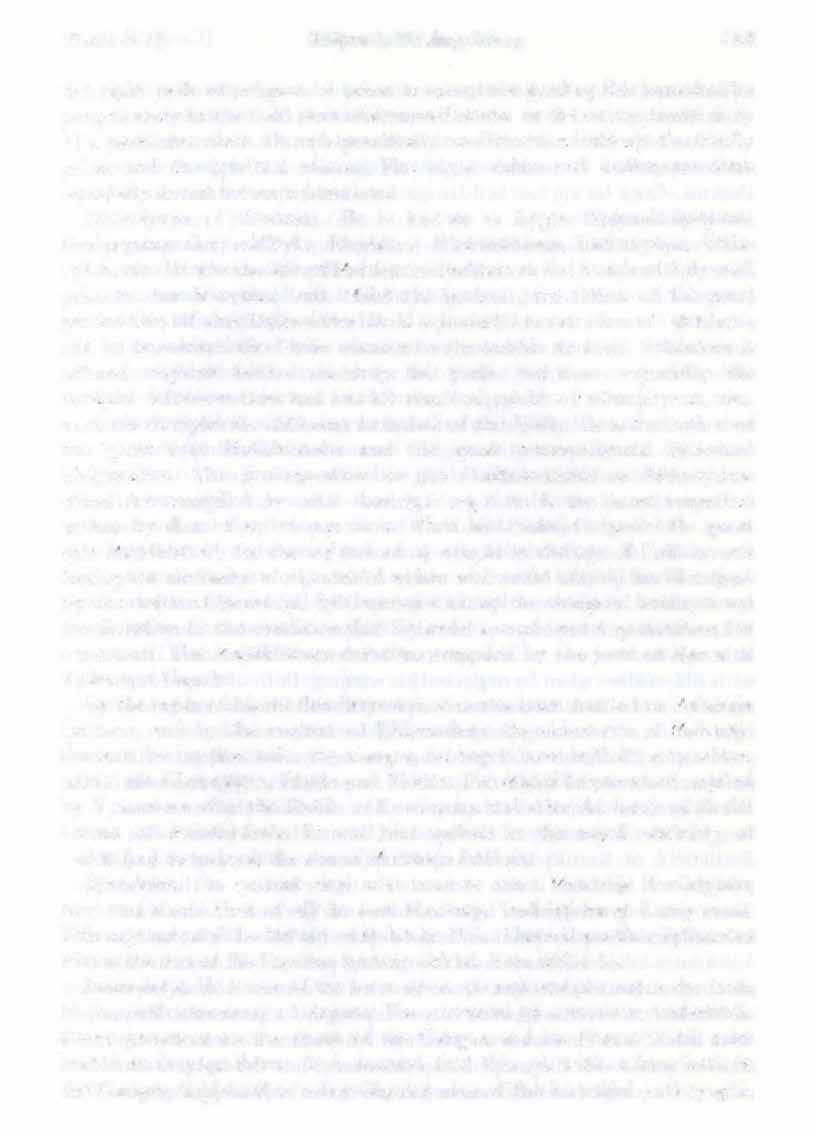
Texts 6-7] Bhi�ma's Passing Away 445
of heaven, and thus he discharged semina, which was kept and preserved in an earthen pot and from which Dropa was born. So Dropacarya is the son of Bharadvaja Muni. Others say that Bharadvaja, the father of Dropa, is a different person from l\'Iahar�i Bharadvaja. He was a great devotee of Brahma. Once he approached Dropacarya and requested him to stop the Battle of Kuruk�etra.
Parasuriima or Rer-ukiisuta. He is the son of Mahar�i Jamadagni and Srimati Repuka. Thus he is also known as Repukasuta. He is one of the powerful incarnations of God, and he killed the k§atriya community as a whole twenty-one times. With the blood of the k§atriyas he pleased the souls of his forefathers. Later on he underwent severe penances at the Mahendra Parvata. After taking the whole earth from the k§atriyas, he gave it in charity to Kasyapa Muni. Parasurama instructed the Dhanurveda or the science of fighting to Dropadirya because he happened to be a briihmar-a. He was present during the coronation of Maharaja Yudhi�thira, and he celebrated the function along with other great [§is.
Parasurama is so old that he met both Rama and Kr�pa at different times. He fought with Rama, but he accepted Kr�pa as the Supreme Personality of Godhead. He also praised Arjuna when he saw him with Kr�pa. When Bhi�ma refused to marry Amba, who wanted him to become her husband, Amba met Parasurama, and by her request only he asked Bhi�madeva to accept her as his wife. Bhi�ma refused to obey his order, although he was one of the spiritual masters of Bhi�madeva. He fought with Bhi�madeva when he neglected his warning. Both of them fought very severely, and at last Parasurama was pleased with Bhi�ma and gave him the benediction of becoming the greatest fighter in the world.
Vasi§tha. The great celebrated sage among the briihmar-as, well known as the Brahmar�i Vasi�thadeva. He is a prominent figure both in the Riimiiyar-a and Mahiibhiirata periods. He celebrated the coronation ceremony of the Personality of Godhead Sri Rama. He was present also on the Battlefield of Kuruk�etra. He could approach all the higher and lower planets, and his name is also connected with the history of Hirapyakasipu. There was a great tension between him and Visvamitra, who wanted his kiimadhenu. Vasi��ha Muni refused to spare his kiimadhenu, and for this Visvamitra killed his one hundred sons. As a perfect briihmar-a he tolerated all the taunts of Visvamitra. Once he tried to commit suicide on account of Visvamitra's torture, but all his attempts were unsuccessful. He jumped from a hill, but the stones on which he fell became a stack of cotton, and thus he was saved. He jumped into the ocean, but the waves washed him ashore. He jumped in the river, but the river also washed him ashore. Thus

446 Srimad-Bhagavatam rcanto l, Ch. 9
all his suicide attempts were unsuccessfuL He is also one of the seven nis and husband of Arundhati, the famous star.
Indrapramada. Another celebrated [§i.
Trita. One of the three sons of Prajapati Gautama. He was the third son, and his other two brothers were known as Ekat and Dvita. All the brothers were great sages and strict followers of the principles of religion. By dint of severe penances they were promoted to Brahmaloka (the planet where Brahmaji lives). OnceTrita Muni fell in a well. He was an organizing worker of many sacrifices, and as one of the great sages he also came to show respect to Bhi�maJi at his deathbed. He was one of the seven sages in the Varu!J.aloka. He hailed from the Western countries of the world. As such, most probably he belonged to the European countries. At that time the whole world was under one Vedic culture.
Grtsamada. One of the sages of the heavenly kingdom. He was a close friend of lndra the King of heaven and was as great as Brhaspati. He used to visit the royal assembly of Maharaja Yudhi�thira, and he also visited the place where Blu�madeva breathed his last. Sometimes he explained the glories of Lord Siva before Maharaja Yudhi��hira. He was the son of Vitahavya, and he resembled in features the body of lndra. Sometimes the enemies of lndramistook him to be lndra and arrested him. He was a great scholar of the .[?.g-veda, and thus he was highly respected by the briihmarta community. He lived a life of celibacy and was powerful in every respect.
Asita. There was a king of the same name, but herein the Asita mentioned is the Asita Devala ��i, a great powerful sage of the time. He explained tohis father l ,500,000 verses fromthe Mahiibhiirata. He was one of the members in the snake sacrifice of 1aharaja Janamcjaya. He was also present during the coronation ceremony of Maharaja Yudhi�thira along with other great [§is. He also gave Maharaja Yudhi�thira instructions while he was on the Anjana Hill. He was also one of the devotees of Lord Siva.
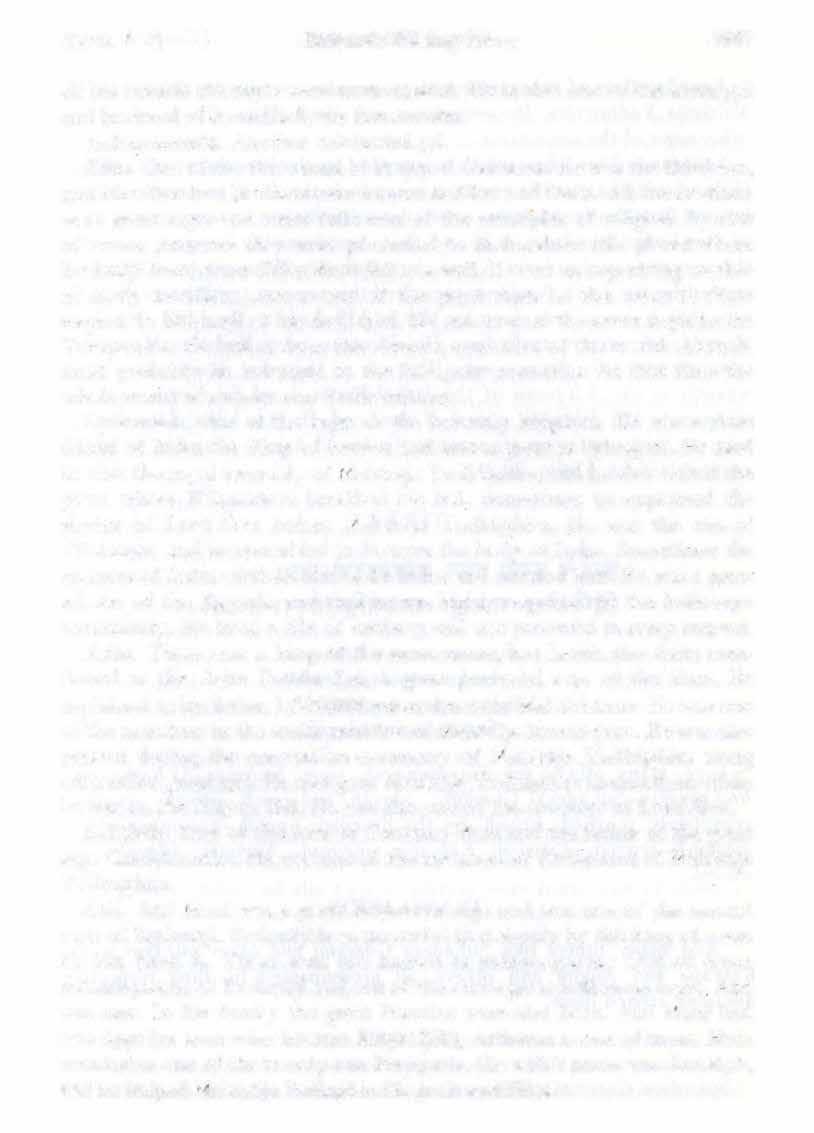
Kak§iviin. One of the sons of Gautama Muni and the father of the great sage Candakausika. He was one of the members of Parliament of Maharaja Yudhi�thira.
Atri. Atri Muni was a great briihmarta sage and was one of the mental sons of BrahmaJi. BrahmaJi is so powerful that simply by thinking of a son he can have it. These sons are known as miinasa-putras. Out of seven miinasa-putras of BrahmaJi and out of the seven great briihmarta sages, Atri was one. In his family the great Pracetas were also born. Atri Muni had two k§atriya sons who became kings. King Arthama is one of them. He is countedas one of thetwenty-one Prajapatis. His wife's name was Anasuya, and he helped Maharaja Parik�it in his great sacrifices.
Texts 6-7) Bhi�ma's Passing Away 447
Kausika. One of the permanent !§i members in the royal assembly of Maharaja Yudhi�thira. He sometimes met Lord Kr�!la. There are several other sages of the same name.
Sudarsana. This wheel which is accepted by the Personality of Godhead (Vi�!lU or Kr�!la) as His personal weapon is the most powerful weapon, greater than the brahmiistras or similar other disastrous weapons. In some of the Vedic literatures it is said that Agnideva, the fire-god, presented this weapon to Lord Sri Kr�!la, but factually this weapon is eternally carried by the Lord. Agnideva presented this weapon to Krwa in the same way that Rukmi!l"i was given by Maharaja Rukma to the Lord. The Lord accepts such presentations from His devotees, even though suchpresentations are eternally His property. There is an elaborate description of this weapon in the Adi-parva of the Mahiibhiirata. Lord Sri Kr�!la used this weapon to kill Sisupala, a rival of the Lord. He also killed Salva by this weapon, and sometimes He wanted His friend Arjuna to use it to kill his enemies. (Mahii. Viriita. 56.3)
anye ca munayo brahman brahmariitiidayo 'mala� si§yair upetii iijagmu� kasyapiingirasiidaya�
anye-many others; ca-also; munaya�-sages; brahman-0 briihmapas; brahma-riita-Sukadeva Gosvami; iidaya�-and such others; amalii{tcompletely purified; si§yai�-by the disciples; upetii�-accompanied by; iijagmu�- arrived; kasyapa- Kasyapa; angirasa- Angirasa; iidaya�- and others.
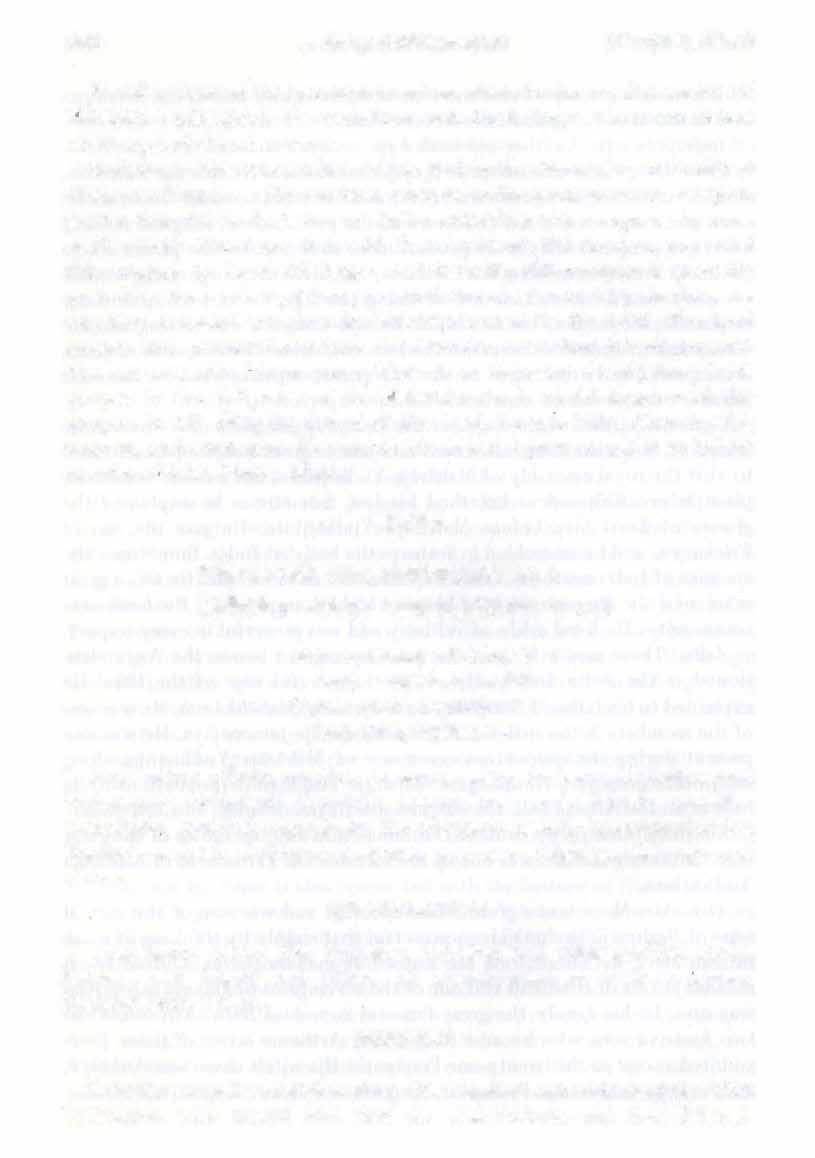
TRANSLATION
And many others like Sukadeva Gosvami and other purified souls, Kasyapa and Ait.gira and others, all accompanied by their respective disciples, arrived there.
PURPORT
Sukadeva Gosviimi (Brahmariita). The famous son and disciplt; of Sri Vyasadeva, who taught him first the Mahiibhiirata and then Srimad-
448 Srimad-Bhagavatam .[Canto l, Ch. 9
:;:r �QO{iiiii�Rti��S'I�:
TEXTS �
I ftM�tn amllli: '-fi�4qlfi\·((111_tH II � II
Bhiigavatam. Sukadeva Gosvami recited 1,400,000 verses of the Mahiibhiirata in the councils of the Gandharvas, Yaksas and Raksasas, and he recited Sr'imad-Bhiigavatam for the first time in the presence. of Maharaja Parik9it. He thoroughly studied all the Vedic literatures from his great father. Thus he was a completely purified soul by dint of his extensive knowledge in the principles of religion. From Mahiibhiirata (Sabhii Parva 4.11) it is understood that he was also present in the royal assembly of Maharaja Yudhi9thira and at the fasting of Maharaja Parik9it. As a bona fide disciple of SriVyasadeva, he inquired from his father very extensively about religious principles and spiritual values, and his great father also satisfied him by teaching him the yoga system by which one can attain the spiritual kingdom, the difference between fruitive work and empiric knowledge,the ways and means of attaining spiritual realization, the four iisramas, namely the student life, the householder's life, the retired life and the renounced life, the sublime position of the Supreme Personality of Godhead, the process of seeing Him eye to eye, the bona fide candidate for receiving knowledge, the consideration of the five elements, the unique position of intelligence, the consciousness of the material nature and the living entity, the symptoms of the self-realized soul, the working principles of the material body, the symptoms of the influential modes of nature, the tree of perpetual desire, and psychic activities. Sometimes he went to the sun planet with the permission of his father and Naradaji. Descriptions of his travel in space are given in the Santi Parva of theMahiibhiirata (332). At last he attained the transcendental realm. He is known by different names like Ara�eya, Aru�isuta, Vaiyasaki, Vyasamataja, etc.

Kasyapa. One of the Prajapatis, the son of Marici and one of the sons· in-law of Prajapati Dak�a. He is the father of the gigantic bird GaruQ.a, who was given elephants and tortoises as eatables. He married thirteen daughters of Prajapati Dak9a, and their names are Aditi, Diti, Denu, Kela, Danayu, Singhika, Krodha, Pradha, Visva, Vinata, Kapila, Muni and Kadru. He begot many children, both demigods and demons, by those wives. From his first wife, Aditi, all the twelve Adityas were born; one of them is Vamana, the incarnation of Godhead. This great sage was also present at the time of Arjuna's birth. He received a presentation of the whole world from Parasurama, and later on he asked Parasurama to go out of the world. His other name is Aristanemi. He lives on the northern side of the umverse.
Angirii. He is the son of Mahar9i Angirii and is known as Brhaspati, the priest of the demigods. It is said that Dro�acarya washis partial incarnation. Sukracarya wasthe spiritualmaster of the demons, and Brhaspati challenged him. His son is Kacha, and he delivered the fire weapon first to Bharadvaja
Text 8) Bhi�ma's Passing Away 449
Muni. He begot six sons (like the fire-god) by his wife Candramasi, one of the reputed stars. He could travel in space, and therefore he could present himself even in the planets of Brahmaloka and lndraloka. He advised the King of heaven, lndra, about conquering the demons. Once he cursed Indra, who thus had to become a hog on the earth and was unwilling to return to heaven. Such is the power of the attraction of the illusory energy. Even a hog does not wish to part with its earthly possessions in exchange of a heavenly kingdom. He was the religious preceptor of the natives of different planets.
TEXT9

ffl01. �11. �mmtlT�l-� �: I
��llffif �#f �m�mttftq II� II
tiin sametiin mahii-bhiigiin upalabhya vasuttama[l. pujayiimiisa dharma-j'no desa-kiila-vibhiiga-vit
tiin-all of them; sametiin-assembled together; mahii- bhiigiin-all greatly powerful; upalabhya-having received; vasuttama[l.-the best among the Vasus (Bhi�madeva); pujayiimiisa-welcomed; dharma-jiia[1-one who knows religious principles; desa-place; kala-time; vibhiiga-vit-one who knows the adjustment of place and time.
TRANSLATION
Bhi�madeva, who was the best amongst the eight Vasiis, received and welcomed all the great and powerful r�is who were assembled there, for he knew perfectly all the religiousprinciples according to time and place.
PURPORT
Expert religionistsknow perfectly well how to adjust religious principles in terms of time and place. AU the great iiciiryas or religious preachers or reformers of the world executed their mission by adjustment of religious principles in terms of time and place. There are different climates and situations in different parts of the world, and if one has to discharge his duties to preach the message of the Lord, he must be expert in adjusting
450 Srlmad-Bhagavatam [Canto l, Ch. 9
things in terms of the time and place. Bhi�madeva was one of the twelve great authorities of preaching this cult of devotional service, and therefore he could receive and welcome all the powerful sages from all parts of the universe assembled there at his deathbed. He was certainly unable at that time to welcome and receive them physically because he was neither at his home nor in a normal healthy condition. But he was quite fit by the activities of hi�; sound mind, and therefore he could utter sweet words with hearty expressions, and all of them were well received. One can perform one's duty by physical work, by mind and by words. And he knew well how to utilize them in the proper place, and therefore there was no difficulty for him to receive them, although physically unfit.
TEXT 10
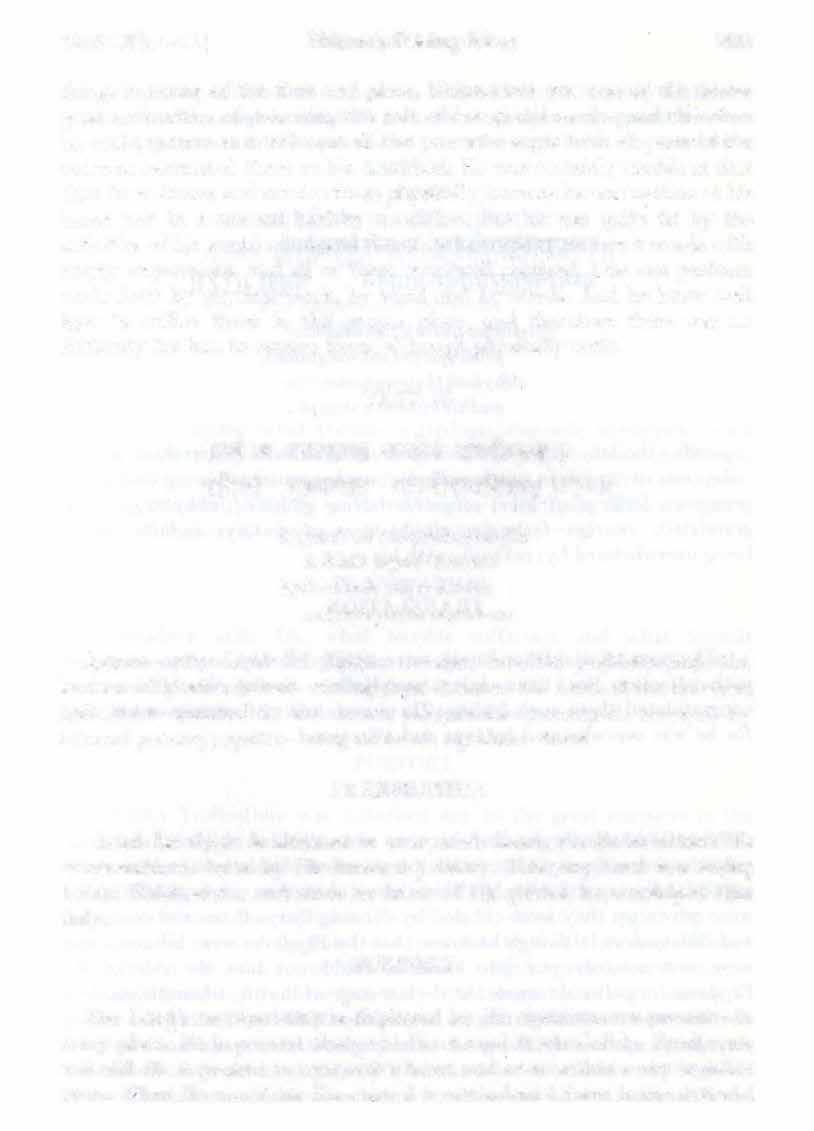
k!"§r-arh ca tat-prabhiiva-jna iisinarh jagad-iSvaram
hrdi-stharh pujayiimiisa mayayopiitta-vigraham
krgwm-unto Lord Sri Kr�rya; ca-also; tat--His; prabhiiva-jiia[l-the knower of glories; iisinam- sitting; jagat-isvaram- the Lord of the universe; hrdi-stham-situated in the heart; pujayiimiisa-worshiped; miiyayii-by internal potency; upiitta- being made of; vigraham-form.
TRANSLATION
Lord Sti. Kr��a is situated in everyone's heart, yet He manifests His transcendental form by His internal potency. This very Lord was sitting before Blti�madeva, and since he knew of His glories, he worshiped Him duly.
PURPORT
The Lord's omnipotency is displayed by His simultaneous presence in every place. He is present always in His eternal abode Goloka Vrndavana, and still He is present in everyone's heart and even within every invisible atom. ·when He manifests His eternal transcendental form in the material
Text 10] Bhi�ma's Passing Away 451
��
� � �� arnftri iji�� I
��l1ffit l{llritq�� II� oJI
world, He does so by His internal potency. The external potency or the material energy has nothing to do with His eternal form. All these truths were known to Sri Blu�madeva, and he worshiped Him accordingly.

TEXT 11

q���·�q
ap:tti4:1\!I�Ul11�� :q�l II��II
piiruJu-putriinupiisiniin
prasraya-prema-sangatiin abhyiica�fiinuriigiisrair andhibhutenacak�u�ii
piirz(lu-the late father of Maharaja Yudhi�thira and his brothers;putriin -the sons of; upiisiniin-sitting silently nearby;prasraya-being overtaken; prema-in feelings of love; sangatiin-having gathered; abhyiic�ta-congratulated; anuriiga-feelingly; asraifl-tears of ecstasy; andhibhutenabeing overwhelmed by;cak�u�ii-with his eyes.
TRANSLATION
The sons of Maharaja p-��u were sitting silently nearby, overtaken with affection for their dying grandfather. Seeing this, Bhi�madeva congratulated them with feeling. There were tears of ecstasy in his eyes, for he was overwhelmed by love and affection.
PURPORT
When Maharaja Pap�u died, his sons were all small children, and naturally they were brought up under the affection of elderly members of the royal family, specifically by Bhi�madeva. Later on when the Pap�avas were grown up they were cheated by cunning Duryodhana and company, and Bhi�madeva, although he knew that the Pap�avas were innocent and were unnecessarily put into trouble, could not take the side of the Pap�avas for political reasons. At the last stage of his life, when Bhi�madeva saw his most exalted grandsons headed by Maharaja Yudhi�thira sitting very gently at his side, the great warrior grandfather could not check his loving tears, which were automatically -flowing from his eyes. He remembered the great tribulations suffered by his most pious grandsons. Certainly
452 Srimad-Bhagavatam [Canto 1, Ch. 9
S{�I{Q(flW{_
he was the most satisfied man because of Yudhi�thira's being enthroned in place of Duryodhana, and thus he began to congratulate them.
TEXT 12

aho ka�tam aho 'nyayyam yad yuyam dharma-nandanaft jivitum niirhatha kli§tam
vipra-dharmacyutasrayaft
aho-oh; ka�tam-what terrible sufferings; aho-oh; anyayyam-what terrible injustice; yat-because; yuyam-all of you good souls; dharmanandanaft-sons of religion personified;jivitum-to remain alive;na-never; arhatha-deserved; kli§tam-sufferer; vipra-brahmar-as; dharma-piety; acyuta-God;asrayiift-being protected by.
TRANSLATION
Bhi�madeva said: Oh, what terrible sufferings and what terrible injustices you good souls suffer for being the sons of religion personified. You did not deserve to remain alive under those tribulations, yet you were protected by the brahma!las, God and religion.
PURPORT
Maharaja Yudhi�thira was disturbed due to the great massacre in the Battle of Kuruk�etra. Bhi�madeva could understand this, and therefore he spoke first of the terrible sufferings of Maharaja Yudh�thira. He was put into difficulty by injustice only, and the Battle of Kuruk�etra was fought just to counteract this injustice. Therefore, he should not regret the great massacre. He wanted to point out particularly that they were always protected by the brahmar-as, the Lord and religiousprinciples. As long as they wereprotected by these threeimportant items, there was no cause of disappointment. Thus Bhi�madeva encouraged Maharaja Yudhi�thira to dissipate his despondency. As long as a person is fully in cooperation with the wishes of the Lord, guided by the bona fide briihmar-as and V ai�p.avas andstrictly following religiousprinciples, onehasnocausefordespondency,
Text 12] Bhi�ma's Passing Away 453
...... .... • • C' � �"�s;:tf17.� ��tr �"'l\�;n:
�'Tf.r� � f� f.t�q���T!
I
11��11
however trying the circumstances of life. Bh'i9madeva, as one of the authorities in the line, wanted to impress this point upon the Par�avas.
TEXT 13

�sfffi:� q�T 'lV-lT �ll��H �: I
sar:hsthite 'tirathe piifLflau prthii biila-prajii vadhu[L yu§mat-krte bahun klesiin priiptii tokavati muhu[L
samsthite-after the demise of; atirathe-of the great general; piirflauPar�u; prthii-Kunti; biila-prajii-having young children; vadhu[l,-daughterin-law; yu§mat-krte-on your account; bahiin-multifarious; klesiin-afflictions; priiptii-underwent; tokavati-in spite of having grown-up boys; muhu[l,-constantly.
TRANSLATION
A!! far as my daughter-in-law Kunti is concerned, upon the great General Par�u's death, she became a widow with many children, and therefore she suffered greatly. And when you were grown up she sufferedagreatdealalso because of youractions.
PURPORT
The sufferings of Kuntidevi are doubly lamented. She suffered greatly because of early widowhood and to get her minor r.hildren brought up in the royal family. And when her children were grown up, she continued to suffer because of her sons' actions. So her sufferings continued. This means that she was destined to suffer by providence, and this one has to tolerate without being disturbed.
454 Sr'imad-Bhagavatam [Canto 1, Ch. 9
�����mm�'T�i:
11����
� Cfil�td �;it � � ��&�I(' � m � iitPftr« �;mf�: ���\ill
TEXT 14
Bhi�ma's Passing Away
sarvarh kiila-krtam manye bhavatiirh ca yad-apriyam
sapiilo yad-vase loko viiyor iva ghaniivalifi.
sarvam-all these; kiila-krtam-done by the inevitable time; manye-1 think; bhavatiim ca-for you also; )'at-whatever; apriyam- detestable ; sapiila�- ,.vith the rulers; yat-vasc- under the control of that time; loka�everyone in every planet; vayo�-like air carrying; iva-as ; ghana-avalifi.the bunches of clouds.
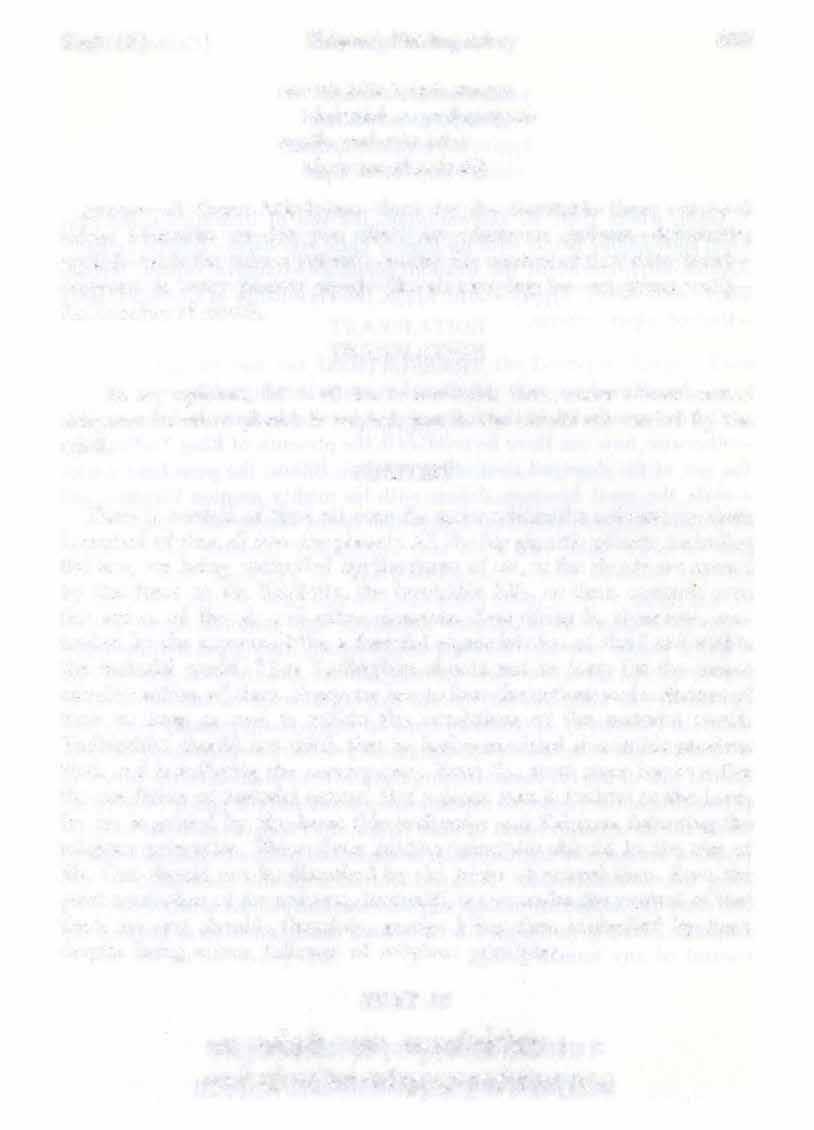
TRANSLATION
In my opinion, this is all due to inevitable time, under whose control everyone m every planet is carried, just as the clouds are carried by the wind.
PURPORT
There is control of time all over the space within the universe, as there is control of time all over the planets. All the big gigantic planets, including the sun, are being controlled by the force of air, as the clouds are carried by the force of air. Similarly, the inevitable kiila, or time, controfs even the action of the air and other elements. Everything is, therefore, controlled by the supreme kiila, a forceful representative of the Lord within the material world. Thus Yudhi�thira should not be sorry for the inconceivable action of time. Everyone has to bear the actions and reactions of time as long as one is within the conditions of the material world. Yudhi�thira should not think that he had committed sins in his previous birth and is suffering the consequence. Even the most pious has to suffer the condition of material nature. But a pious man is faithful to the Lord, for he is guided by the bona fide briihma[La and Vai�!lava following the religious principles. These three guiding principles should be the aim of life. One should not be disturbed by the tricks of eternal time. Even the great controller of the universe, Brahmaji, is also under the control of that time; no one should, therefore, grudge being thus controlled by time, despite being a true follower of religious principles.
Text 15)
455
TEXT 15 � - �T •t�NtfVtti't�: I pnsitIll�:;ffl$�'tiWI�flf�,I� '"'I
Srimad-Bhagavatam
yatra dharma-suto raja
gadii-piir-ir vrkodara[l knr-o 'strigiir-pivarh caparh suhrt knr-as tato vipat
yatra-where there is; dharma-suta[l-the son of Dharmaraja; riijii-the king; gada-piir-i[l-hands with his mighty club; vrkodara[l-Bhima; kr§TJa/1Arjuna; astri-carrier of the weapon; giir-pivam-GaJ;u;liva; ciipam-arrows; suhrt-well-wisher; kr§TJaft-Lord Kr�I}a, the Personality of Godhead; tata[l -thereof; vipat- reverse.
TRANSLATION
0 how wonderful is the influence of inevitable time. It is irreversible -otherwise, how can there be reverses in the presence of King Yudhi�thira, the son of the demigod controlling religion, Bhima, the great fighter with a club, the great bowman Arjuna with his mighty weapon Gii!J.�Va, and above all; the Lord, the direct well-wisher of the p3!l�avas?
PURPORT
As far as material or spiritual resources were required, there was no scarcity in the case of the Pii!J.�avas. Materially they were well equipped because two great warriors, namely Bhima and Arjuna, were there. Spiritually the King himself was the symbol of religion, and above all of them the Personality of Godhead Lord Sri Kr�!la was personally concerned with their affairs as the well-wisher. And yet there were so many reverses on the side of the Pii!J.�avas. Despite the power of pious acts, the power of personalities, the power of expert management and the power of weapons under the direct supervision of Lord Kr�!J.a, the Pii!J.�avas suffered so many practical reverses, which can only be explained as due to the influence of kiila, the inevitable time. Kala is identical with the Lord Himself, and therefore the influence of kala indicates the inexplicable wish of the Lord Himself. There is nothing to be lamented when a matter is beyond the control of any human being.

456
[Canto l, Ch. 9
;{����F{�fifN"f�l ����a�sfq-ft 11��11
TEXT 16
Bhi�ma's Passing Away
na hy asya karhicid riijan pumiin veda vidhitsitam yad vijijiiiisayii yuktii
muhyanti kavayo 'pi hi
na-never; hi-certainly; asya- His ; karhicit-whatsoever; rajan-0 King; pumiin-anyone; veda-knows; vidhitsitam-plan; yat -which; vijijiiiisayiieven after exhaustive inquiries; yuktii�-being engaged in; muhyantibewildered; kavaya�-great philosophers; api-even; h�-certainly.



TRANSLATION
0 King, no one can know the plan of the Lord [Sri Kr�l)a). Even though great philosophers inquire exhaustively, they are bewildered.
PURPORT
The bewilderment of Maharaja Yudhi�thira over his past sinful acts and the resultant sufferings, etc., is completely negated by a great authority like Bhi�ma (one of the twelve authorized persons). Bhi�ma wanted to impress upon Maharaja Yudhi�thira that since time immemorial no one, including such demigods as Siva and Brahma, could ascertain the real plan of the Lord. So what can we understandabout it? It is useless also to inquire about it. Even the exhaustive philosophical inquiries of sages cannot ascertain the plan of the Lord. The best policy is simply to abide by the orders of the Lord without argument. The sufferings of the Pa!J.9avas are never due to their past deeds. The Lord had to execute the plan of establishing the kingdom of virtue, and therefore His own devotees suffered temporarily in order to establish the conquest of virtue. Bhi�madeva was certainly satisfied by seeing the triumph of virtue, and he was glad to see King Yudhi�thira on the throne, although he himself fought against him. Even a great fighter like Bhi�ma could not win the Battle of Kuruk�etra because the Lord wanted to show that vice cannot conquer virtue, regardless of who tries to execute it. Bhi�madeva was a great devotee of the Lord, but he chose to fight against the Pa!J.9avas by the will of the Lord because the Lord wanted to show that a fighter like Bhi�ma cannot win on the wrong side.
Text
17)
457
TEXT 17 � • C' i"AA7 � � � I t��l!lf?t�I�WfP.Itnft�n � 11�\911
tasmiid idam daiva-tantrarit vyavasya bharatar§abha
tasyiinuvihito 'nathii
niitha piihi prajii[t prabho
tasmiit-therefore; idam-all these; daiva-tantram-enchantment of providence only; vyavasya-ascertaining; bharata-r�abha-the best among the descendants of Bharata; tasya-His; anuvihita[t-as desired by Him; aniithii[t-helpless; niitha-0 master; piihi-just take care of;prajii[t -of the subjects; prabho-0 lord.

TRANSLATION
0 best amongst the descendants of Bharata [ Yudhi�!hira], I maintain, therefore, that all this is within the plan of the Lord. Accepting the inconceivable plan of the Lord, you must follow it. You are now the appointed administrative head, and my lord, you should now take care of those subjects who are now rendered helpless.

PURPORT
The popular aying is that a housewife teaches the daughter-in-law by teaching the daughter. imilarly, the Lord teaches the world by teaching the devotee. The devotee does not have to learn anything new from the Lord because the Lord teaches the sincere devotee always from within. Whenever, therefore, a show is made to teach the devotee, as it was in the case of teaching the Bhagavad-gitii, it is for teaching the less intelligent men. devotee's duty is, therefore, to ungrudgingly accept tribulations from the Lord as a benediction. The Pap�avas are advised by Btu�madeva to accept the re ponsibility of administration without he itation. The poor subjects were without protection due to the Battle of Kuruk�etra, and they were awaiting the assumption of power by laharii.ja Yudhi�thira. A pure devotee of the Lord accepts tribulations as favors from the Lord. Since the Lord is absolute, there is no mundane difference between the two.
TEXT 18


458 S rlmad-Bhagavatam
[Canto 1, Ch. 9
Bhl�ma's Passing Away
e§a vai bhagaviin siik§iid iidyo niiriiyarw {t pumiin mohayan miiyayii loham gu�has carati Vf§rti§u
e§a{l-this; vai-positively; bhagaviin-the Personality of Godhead; siik§iil -original; iidya[l-the first· niiriiyartaft-the Supreme Lord (who lies down on the water); pumiin-the supreme enjoyer; mohayan-bewildering; miiyayii-hy His self-created energy; lolwm-the planets; gz.£�hafi-inconceivable; carati-moves; V!§[li§u-among the Vr�l).i family.
TRANSLATION
This Sri Kr�!'a is no other than the original Personality of Godhead. He is the first Naraya!'a, the supreme enjoyer. But He is moving amongst the descendants of King Vr�!'i, just like one of us, and He is bewildering us with His Self-created energy.
PURPORT
The Vedic system of acquiring knowledge is the deductive process. The Vedic knowledge is received perfectly by disciplic succession from authorities. Such knowledge is never dogmatic, as is ill-conceived by less intelligent persons. The mother is the authority to verify the identity of the father. Sheistheauthority for such confidential knowledge. Therefore, authority is not dogmatic. In the Bhagavad-gitii this truth is confirmed in the Fourth Chapter (Bg. 4.2), and the perfect system of Learning i to receive it from authority. The very same system is accepted universaLLy as truth, but only the false arguer speaks against this system. For example, modernspacecraft fly in the sky, and they say that they travel to the other side of the moon, and men believe these stories blindly because they have accepted the modern scientists as authorities. The authorities speak, and the people in general believe them. But in the case of Vedic truth , they have been taught not to believe. Even if they accept them they give a different interpretation. Each and every man wants a direct perception of Vedic knowledge, but foolishly they deny it. This means that the misguided man can believe one authority, the scientist, but will reject the authority of the Vedas. The result is that people have degenerated.
Here is an authority speaking about Sri Kr§!'a as the original Personality of Godhead and the first Naraya!'a. Even an impersonalist like Acarya Sankara has said in the beginning of his commentation on the Bhagavad-
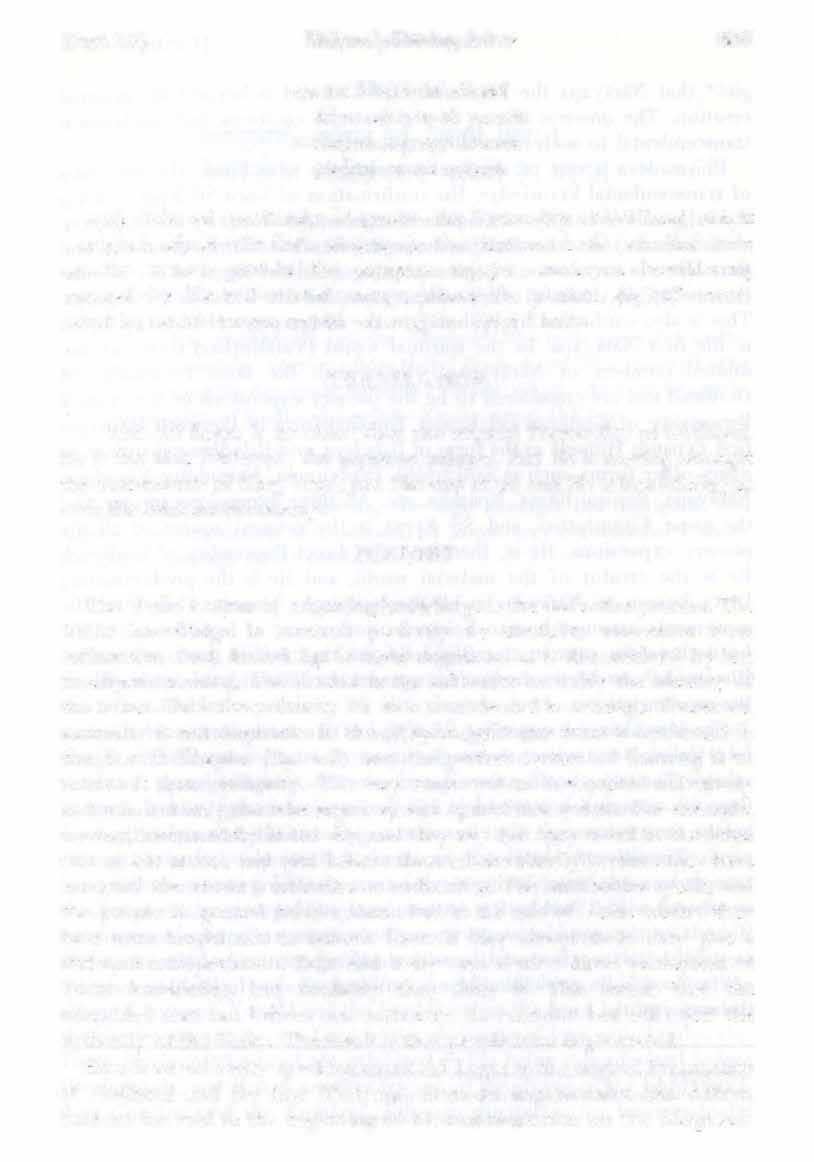
Text 18]
459
gitii* that araya!la the Personality of Godhead is beyond the material creation. The universe is one of the material creations, but Naraya!la is transcendental to such material paraphernalia.
Blu�madeva is one of the twelve mahiijanas who know the principles of transcendental knowledge. His confirmation of Lord Sri Kr�t�a's being the original Personality of Godhead is also corroborated by the impersonalist Saitkara. All other iiciiryas have also confirmed this statement, and thus there is no chance of not accepting Lord Sri Kr�!la as the original Personality of Godhead. Bhi�madeva says that He is the first Naraya!J.a. This is also confirmed by Brahmaji in the Bhiigavatam (10.14.14). Kr�!la is the first Naraya!J.a. In the spiritual world (Vaiku!J.thas) there are unlimited numbers of Naraya!las, who are all the same Personality of Godhead and are considered to be the plenary expansions of the original Personality of Godhead Sri Kr�t�a. The first form of the Lord Sri Kr�!la first expands Himself as the form of Baladeva, and Baladeva expands in so many other forms, such as Saitkar�a!J.a, Pradyumna, Aniruddha, Vasudeva, Naraya!J.a, Puru�a, Rama, Nrsimha, etc. All these expansions are one and the same Vi§[lU-tattva, and Sri Kr�!la is the original source of all the plenary expansions. He is, therefore, the direct Personality of Godhead. He is the creator of the material world, and He is the predominating Deity known as NarayaQa in all the VaikuQ�ha planets. Therefore, His movements amongst human beings is another sort of bewilderment. The Lord therefore says in the Bhagavad-gitii that foolish persons consider Him to be one of the human beings without knowing the intricacies of His movements.

The bewilderment regarding Sri Kr�!la is due to the action of His twofold internal and external energies upon the third one, called marginal energy. The living entities are expansions of His marginal energy, and thus they are sometimes bewildered by the internal energy and sometimes by the external energy. By internal energetic bewilderment, Sri Kr�l)a expands Himself into unlimited numbers of Naraya!J.aS and exchanges or accepts transcendental loving service from the living entities in the transcendental world. And by His external energetic expansions, He incarnates Himself in the material world amongst the men, animals or demigods to reestablish His forgottenrelation with the living entities in different species oflife. Great authorities like Bhi�ma, however, escape His bewilderment by the mercy of the Lord.
*niiriiya{la{l pam 'vyaktiit a!t!fa-avyakta samblravam av_yalottw.ta� tu imt• loka .�afJLu dv!pa co mcdini (llg. Hlrii:�ya of Sar,1kara)

460 Srimad-Bhagavatam [Canto l, Ch. 9
TEXT 19

� �� �ijl{ f�: I ��: �� �fqit � 11��11
asyanubhiivarh bhagaviin
veda guhyatamarh siva� devar§ir niirada� siik§iid
bhagaviin kapilo nrpa
asya-of Him; anubhiivam-glories;bhagavan-the most powerful; vedaknows; guhyatamam-very confidentially; siva�-Lord Siva; devar§*-the great sage among the demigods;niirada�-Narada;siik§iit-directly;bhagaviin -the Personality of Godhead;kapila�-Kapila; n.rpa-0 King.
TRANSLATION
0 King, Lord Siva, Narada, the sage amongst the demigods, and Kapila, the incarnation of Godhead, all know very confidentially about His glories through direct contact.
PURPORT
Pure devotees of the Lord are all bhiivas, or persons who know the glories of the Lord in different transcendental loving services. As the Lord has innumerable expansions of His plenary form, similarly there :ue innumerable pure devotees of the Lord who are engaged in the exchange of service of different humors. Ordinarily there are twelve great devotees of the Lord, namely Brahma, Narada, Siva, Kumara, Kapila, Manu, Prahlada, Bln�ma, Janaka, Sukadeva Gosvami, Bali Maharaja and Yamaraja. B�madeva, although one of them, has mentioned only three important names of the twelve who know the glories of the Lord. According to Srila Visvanatha Cakravarti Thakur, one of the great iiciiryas in the modern age, anubhiiva, or the glory of the Lord, is first appreciated by the devotee in ecstasymanifesting the symptoms of perspiring, trembling, weeping, bodily eruptions, etc., which are further enhanced by steady understanding of the glories of the Lord. Such different understandings of bhiivas are exchanged between Yasoda and the Lord (binding the Lord by ropes) and in the chariot driving by the Lord in the exchange of love with Arjuna, etc. These glories of the Lord are exhibited in His being subordinated before His devotees, and that is another feature of the glories of the Lord. Sukadeva Gosvami and the Kumaras, although situated in the transcendental
Text 19] Bhi�ma's
Passing Away
461
position, became converted by another feature of bhiiva and turned into pure devotees of the Lord. Tribulations of the devotees by the Lord constituteanother exchangeoftranscendental bhiiva between the Lord and the devotees. The Lord says (Bhiig. 10), "I put My devotee into difficulty, and thus the devotee becomes more purified in exchanging transcendental bhiiva with !VIe." Placing the devotee into material troubles necessitates delivering him from the illusory material relations. The material relations are based on reciprocation of material enjoyment, which depends mainly on material resources. Therefore, when material resources are withdrawn by the Lord, the devotee is cent percent attracted towards transcendental loving service of the Lord. Thus the Lord snatches the fallen soul from the mireof material existence. Tribulations offered by the Lord to His devotee are different from the tribulations resulting from vicious action. All these glories of the Lord are especially known to the great mahiijanas like Brahma, Siva, arada, Kapila, Kumara and Bhi�ma, as mentioned above, and one is able to grasp it by their grace.
TEXT 20

yam manyase miituleyarh priyam mitram suhrttamam akaro{l sacivam diitam sauhrdiid atha siirathim
yam-the person; manyase-you think; miituleyam-maternal cousm; priyam-very dear; mitram-friend; suhrttamam-ardent well-wisher; akaro[t-executed; sacivam-counsel;diitam-messenger; sauhrdiit-bygood will; atka-thereupon; siirathim- chara
TRANSLATION
0 King, that personality whom, out of ignorance only, you thought to be your maternal cousin, your very dear friend, well-wisher, counsellor, messenger, benefactor, etc., is that very Personality of Godhead Sri Kr�!ia.
PURPORT
Lord Sri Kr�!Ja, althoughacting asthecousin,brother,friend,well-wisher, counsellor, messenger, benefactor, etc., of the Pa�u;lavas, was still the S
of Godhead. Out of His causeless mercy and favor
462 S rimad-Bhagavatam [Canto I, Ch. 9
����&����' �: m:q;i �ij m��� mn� "� o u
te
.
c
r
upreme Personality
upon Hi unalloyed devotees, He accepts all kinds of service, but that does not mean that He has changed His position as the Absolute Person. To think of Him as an ordinary man is the grossest type of ignorance.
TEXT 21

w.r�;n
� fllijq1f� lwt{Cfq� tt

��II�� II
sarviitmana[lsamadrso hyadvayasyiinahankrte[l tat-krtarhmativai§amyarh niravadyasyanakvacit
sarva-iitmana[l-of one whois present in everyone's heart; samad_rsa[l-of one who is equally kind to one and all; hi-certainly; advayasya-of the Absolute; anahankrte[l-free from all material identity of false ego; tat-krtam-everything done by Him; mali-consciousness; vai�amyamdifferentiation; niravadyasya-freed from all attachment; na-never; kvacit-at any stage.

TRANSLATION
Being the Absolute Personality of Godhead, He is present in everyone's heart. He is equally kind to everyone, and He is free from the false ego of differentiation. Therefore whatever He does is free from material inebriety. He is equibalanced.
PURPORT
Being absolute, there is nothing different from Him. He is kaivalya; there is nothing except Himself. Everything and everyone is the manifestation of His energy, and thus He is present everywhere by His energy, beingnondifferent from it. The sun is identified with every inch of the sun rays and every molecular particle of the rays. Similarly, the Lord is distributed by His different energies. He is Paramatma or the Supersoul, present in everyone as the supreme guidance, and therefore He is already the chariot driver and counsel of all living beings. When He, therefore, exhibits Himself as chariot driver of Arjuna, there is no change in His exalted position. It is the power of devotional service only that demonstrates Him as the chariot driver or the messenger. Since He has nothing to
Text 21) Bhi�ma's Passing Away 463
�� 1 • ,...... � • "
do with the material conception of life because He is absolute spiritual identity, there is for Him no superior or inferior action. Being the Absolute Personality of Godhead, He has no false ego, and so He does not identify Himself with anything different from Him. The material conception of ego is equibalanced in Him. He does not feel, therefore, inferior by becoming the chariot driver of His pure devotee. It is the glory of the pure devotee only that he can bring about service from the affectionate Lord.
TEXT 22

tathiipy ekiinta-bhakte�u pasya bhupiinukampitam yan me'surhs tyajata{l. siik�iit k!§TJO darsanam iigata{l.
tathiipi-still; ekiinta-unflinching; bhakte�u-unto the devotees; pasyasee here; bhiipa-0 King; anukampitam-how sympathetic; yat-for which; me-my; asun-life ; tyajata{l.-ending; siik�iit-directly; k!§TJafl.-the Personality of Godhead; darsanam-in my view; iigata{l.-has kindly come.

TRANSLATION
Yet, despite His being equally kind to everyone, He has graciously come before me while I am ending my life, for I am His unflinching servitor.
PURPORT
The Supreme Lord Absolute Personality of Godhead Sri Kr�!J.a, although equal to everyone, is still more inclined to His unflinching devotee who is completely surrenderedand knows no one else as his protector and master. Having unflinching faith in the Supreme Lord as one's protector, friend and master is the natural condition of eternal life. A living entity is so made by the will of the Almighty that he is most happy when placing himself in a condition of absolute dependence.
The opposite tendency is the cause of falldown. The living entity has this tendency of falling down by dint of misidentifying himself as fully
464 Srimad-Bhagavatam [Canto I, Ch. 9
independent to lord it over the material world. The root cause of all troubles is there in false egoism. One must draw towards the Lord in all circumstances.
The appearance of Lord Kr�!la at the deathbed of Blu�majl is due to his being an unflinching devotee of the Lord. Arjuna had some bodily relation with Kr�!la because the Lord happened to be his maternal cousin. But Bhi�ma had no such bodily relation. Therefore the cause of attraction was due to the intimate relation of the soul. Yet because the relation of the body is very pleasing and natural, the Lord is more pleased when He is addressed as the son of Maharaja Nanda, the son of Yasoda, the lover of Radhara!J.i. This affinity by bodily relation with the Lord is another feature of reciprocating loving service to the Lord. Bhi�madeva is conscious of this sweetness of transcendental humor, and therefore he likes to address the Lord as Vijaya Sakhe, Piirtha Sakhe, etc., exactly like Nanda-Nandana or Yasodii-Nandana. The best way to establish our relation intranscendental sweetnessisto approach Him through His recognized devotees. One should not try to establish the relation directly; there must be a via medium which is transparent and competent to lead us to the right path.
TEXT 23

�s��;{l��qRltf?IT'I� I
�"{ �i ;itil'T �-qij ��: ����II
bhaktyii "vesya mano yasmin
viicii yan-niima kirtayan
tyajan kalevararh yogi
mucyate kiima-karmabhi[l
bhaktyii-with devout attention; iivesya-meditating; mana{l-mind; yasmin-in whose; viicii-by words; yat-whose; niima-holy name;kirtayan -by chanting; tyajan- quitting; kalevaram-this material body;yogi-the devotee; mucyate-gets release; kama-karmabhib--from fruitive activities.
TRANSLATION
The Personality of Godhead, who appears in the mind of the devotee by attentive devotion and meditation and by chanting of the holy name, releases the devotee from the bondage of fruitive activities at the time of his quitting the material body.
Text 23] Bhi�ma's Passing Away 465
PURPORT


Yoga means concentration of the mind detached from all other subject matter. And actually such concentration is samiidhi, or cent percent engagement in the ervice of the Lord. And one who concentrates his attention in that manner is called a yogi. Such a yogi devotee of the Lord engages himself,twenty-four hours daily in the service of the Lord so that !Lis wnole attention is engrossed with the thoughts of the Lord in ninefold devotional service, namely hearing, t.:hanting, remembering, worshiping, praying, becoming a voluntary servant, carrying out orders, establishing friendly relation hip, or offering all that one may possess, in the service of the Lord. By such practice of yoga or linking up in the service of the Lord, one is recognized by the Lord Himself, as it is explained in the Bhagavadgitii concerning the highest perfectional stage of samiidhi. The Lord calls such a rare devotee the best amongst all the yogis. Such a perfect yogi is enabled by the divine grace of the Lord to concentrate his mind upon the Lord with a perfect sense of consciousness, and thus by chanting His holy name before quitting the body the yogi is at once transferred by the internal energy of the Lord Lo one of the eternal planet where there is no question of material life and its concomitant factors. In material existence a living being has to endure the material conditions of threefold miseries, life after life, according to his fruitive work. Such material life is produced by material desires only. Devotional service of the Lord does not kill the natural desires of the living being, but they are applied in the right cause of devotional service. This qualifies the desire to be transferred in the spiritual sky. General Bhi�madeva is referring to a particular type of yoga called bhakti-yoga, and he was fortunate enough to have the Lord directly in his presence before he quitted his material body. He therefore desired that the Lord stay before his view in the following verses.


466 Srimad-Bhagavatam [Canto I, Ch. 9
TEXT 24 « � lllf.IT'l_ �ij� ,......_. ,...., .... �:n=tt�� T�;n� I ..... ..... sa deva-devo bhagaviin pratik§atiim kalevaram yiivad idam hinomy aham prasanna-hiisiiru[la-locanollasan mukhiimbujo dhyiina-pathaS catur-bhuja[l
sa�-He; deva-deva�-the Supreme Lord of the lords; bhagaviin-the Personality of Godhead; pratik§atiim-may kindly wait; kalevaram-body; yiivat-as long as; idam-this material body; hinomi-may quit; aham-1; prasanna--cheerful; h.iisa-smiling; a.rurw-locana-eyes red like the morning sun; ullasat-beautifully decorated; mukha-ambuja�-the lotus flower of His face; dhyiina-patha�-in the path of my meditation; catur-bhuja[lthefour-handed form of Niiraya!la (the worshipable Deity of Bhl�madeva).
TRANSLATION

May my Lord , who i.s four-handed and whose beautifully decorated lotus face, with eyes as red as the rising sun, is smiling, kindly await me at that moment when I quit this material body.
PURPORT
Bhi�madeva knew well that Lord K[�pa is the original Narayalla. His worshipable Deity was four-handed Narayar_1a, but he knew that fourhanded Narayalla is a plenary expansion of Lord Kr�lla. Indirectly he desired Lord Sri Kr�lla to manifest Himself in His four-handed feature of Narayalla. A Vai�pava is always humble in his behavior. Although it was cent pe;·cent certain that Bhi?madeva was approaching Vaikurttha-dhiima just after leaving his material body, still as a humble Vai�!lava he desired to see the beautiful face of the Lord, for after quitting the present body he might not be i.n a position to see the Lord any more. A Vai�!lava is not puffed up, although the Lord guarantees His pure devotee entrance into His abode. Here l3hi�madeva says, "as long as I do not quit this body." This means that the great General would quit the body by his own will; he was not being forced by the laws of nature. He was so powerful that he could stay in his body as long as he desired. He got this benediction from his father. He desired that the Lord stay before him in His four-handed arayapa feature so that he might concentrate upon Him and thus be in trance in that meditation. Then his mind might be sanctified "\vith thinking of the Lord. Thus he did not mind wherever he mightgo. A pure devotee is never very anxious to go back to the kingdom of God. He entirely depends on the good will of the Lord. He is equally satisfied even if the Lord desires him to go to hell. The only desire that a pure devotee entertains is that he may always be in rapt attention 'vith thinking of the lotus feet of the Lord, regardless. Bhi�madeva wanted this much only: that his mind be absorbed in thinking of the Lord and that he pass away thus.That is the highest ambition of a pure devotee.

Text 24) Bhl�ma's Passing Away 467
TEXT 25
�a-�
�®GJ�O� � �{q�� I
���f �S<IO�ijlfi_ ������
suta uviica
yudh�thiras tad iikarr-ya sayiinam sara-panjare aprcchad vividhiin dharmiin [§irtiirh ciinusnwatiim

suta{!, uviica-SriSuta Gosvami said;yudhi§thira[l.-KingYudhi§thira; tat-that;iikarr-ya-hearing;sayiinam-lying down on;sara-panjare-on the bed of arrows; aprcchat-asked;vividhiin-multifarious;dharman-duties; r�irtiim-of the [§is;ca-and;anusnwatiim-hearing after them.
TRANSLATION
Suta Gosvami said: Maharaja Yudhi&thira, after hearing B�madeva speak in that appealing tone, asked him, in the presence of all the great r�is, about the essential principles of various religious duties.
PURPORT
Bhi�madeva, speaking in that appealing tone, convinced Maharaja Yudhi�thira that he was very soonpassing away. And Maharaja Yudhi�thira was inspired by Lord Sri Kr��a to ask him of the principles of religion. Lord Sri Kr��a inspired Maharaja Yudhi�thira to ask Bln�madeva in the presence of many great sages, indicating thereby that the Lord's devotee like Bhi�madeva, although apparently living as a worldly man, is far superior to many great sages, even Vyasadeva. Another point is that Bln�madeva at that time was not only lying on a deathbed of arrows, hut he was greatly aggrieved because of that state. One should not have asked him any question at that time, hut LordSri Kr��a wanted to prove that His pure devotees are always sound in body and mind by dint of spiritual enlightenment, and thus in any circumstances a devotee of the Lord is in perfect order to speak of the right way of life. Yudhi�thira also preferred to solve his problematic questions from Bhi�madeva rather than ask anyone else present there who was seemingly more learned than
468 Srimad-Bhagavatam [Canto l, Ch. 9
Bhi�madeva. This is all due to the arrangement of the great wheel-carrier Lord Sri Kr��a, who establi�hes the glories of His devotee. The father likes to see the son become more famous than himself. The Lord declares very emphatically that worship of His devotee is more valuable than the worship of the Lord Himself.
TEXT 26

puru�a-svabhtiva-vihitiin. yathii-varr-am yathiiSramam vairiigya-riigoptidhibhyam timniitobhaya-lak�ar.iin
puru�a-the human being; svabhiiva-by his own acquired qualities; vihitiin- prescribed; yathii-as it is; varr-am-classification of castes; yathiias it is; iisramam-orders of life; vairiigya- detachment; raga-attachment; upiidhibhyiim-out of such designations; iimniita-systematicaily; ubhayaboth; lak�ar.iin-symptoms.
TRANSLATION
At Maharaja Yudhi�1hira's inquiry, Bhi�madeva first of all defined all the classifications of castes and orders of life in terms of the individual's qualifications. Then he systematically, in twofold divisions, described counteraction by detachment and interaction by attachment.

PURPORT
The conception of four castes and four orders of life, as planned by the Lord Himself (Bg. 4.13) is to accelerate transcendental qualities of the individual person sothat hemay gradually realize hisspiritualidentification and thus act accordingly to get free from material bondageor conditional life. In almost all the Puriir.as the subject matter is described in the same spirit, and so also in the Mahiibhiirat�e elaborately described by Bhi�madeva in the Siinti-parva beginning from t� Sixtieth Chapter. The varr.iisrama-dharma is prescribed for the civilized human beingjust to train him to successfully terminate human life. Self-realization is
Text 26] Bhi�ma'sPassing Away 469
distinguished from the life of the lower animals engaged in eating, sleeping, fearing and mating. Blu�madeva advised for all human beings nine qualifications: l) not to become angry, 2) not to lie, 3) to equally distribute wealth, 4) to forgive, 5) to beget children only by one's legitimate wife, 6) to be pure in mind and hygenic in body. 7) not to be inimical toward anyone, 8) to be simple, and 9) to support servants or subordinates. One cannot be called a civiJized person \vithout acquiring the above-mentioned preliminary qualities. Besides these, the briihmarzas or the intelligent men, the administrative men, the mercantile community and the laborer class must acq11ire special qualities in terms of occupational duties mentioned in all the Vedic scriptures. For the intelligent men, controlling the senses is the most essential qualification, which is the basis of morality. Sex indulgence even with a legitimate wife must also be controlled, and thereby family control will automatically follow. An intelligent man abuses his great qualifications if he does not follow the Vedic way of life. This means he must seriously make a study of the Vedic literatures, especially of the Srimad-Bhiigavatam and the Bhagavad-gitii. For learning Vedic knowledge, one must approach a person who is cent percent engaged in devotional service. He must not dothings which are forbidden in the siistras. A person cannot be a teacher if he drinks or smokes. In the modern system of education the teacher's academic qualification is taken into consideration without evaluation of hi moral life. Therefore, the result of education is misuse of high intelligence in so many ways.
The k§atriyas or the administrative class is especiaiJy advi ed to give in charity and not toaccept charity in any circumstances. Modern administrators raise subscriptions for some political functions, but never give in charity to the citizens in any slate function. It is just the reverse in the injunctions of the siistras. The administrative class must be well versed in the sustras, but must not take to the profession of teachers. The administrators should never pretend to become nonviolent and thereby go to hell. When Arjuna \Vanted to become a nonviolent coward in the Battlefield of Kuruk�etra, he was severely chastised by Lord Kr��a. The Lord degraded Arjuna at that time to the status of an uncivilized man for his avowed acceptance of the cult of nonviolence. The administrative class must be personally trained in the military education. Cowards should not be elevated to the presidential throne by dint of numerical votes only. The monarchs were all chivalrous personalities, and therefore monarchy should be maintained provided the monarch is regularly trained in the occupational duties of a king. In fighting, the king or the president should never return home 1vithout being hurt by the enemy. The so-called king of

470 Srimad-Bhagavatam [Canto l, Ch. 9
today never VISits the warfield. He is very much expert in artificially encouraging the fighting strength in the hope of false national prestige. As soon as the administrative class is turned into a gang of mercantile and laborer men, the whole machinery ofgovernment becomes polluted.
The vaiSyas or the mercantile communities are especially advised to pro· teet the cows. Cow protection means increasing the milk productions, namely curd and butter. Agriculture and distribution of the foodstuff are the primary duties of the mercantile community backed by education in Vedicknowledgeandtrained togive in charity. Asthe k§atriyas were given charge ofthe protection ofthe citizens, vaisyas weregiven the charge ofthe protection of animals. Animals are never meant to be killed. Killing of animals isa symptom of barbarian society. For a human being, agricultural produce, fruits and milk are sufficient and compatible foodstuffs. The human society should give more attention to animal protection. The pro· ductive energy of the laborer is misused when heis occupied by industrial enterprises. Jndustry of various types cannot produce the essential needs of man, namely rice,.wheat, grains, milk, fruits and vegetables. The production of machines and machine tools increases the artificial living fashion of a class of vested interests and keeps thousands of men in starvation and unrest. This should not be the standard of civilization.
The sudra class is less intelligent, and they have no independence. They are meant for rendering sincere service to the three higher sectionsof the society. The sudra class can attain all comfortsof life simply by rendering service to the higher classes. It is especially enjoined that a sudra should never bank money. As soon as the sudras accumulate wealth, it will be misused for sinful activities in wine, women and gambling. Wine, women and gambling indicate that the population is degraded into less than sudra quality. The higher castes should always look after the maintenance of the sudras, and they should provide them with old and used garments. A sudra should not leave Iris master when the master is old and invalid, and the master should keep the servants satisfied in a!J respects. The sudras must first of all be satisfied by sumptuous food and clothing before any sacrifice is performed. In this age so many functions are held by spending millions, but the poor laborer is not sumptuously fed or given charity, clothing, etc. The laborersare thusdissatisfied, andso they make agitation.
The var!las are, so to speak, classifications of different occupations, and iisrama-dharma is gradual progress on thepath ofself-realization. Both are interrelated, and one is dependent on the other. The main purpose of iisrama-dharma is to awaken knowledge and detachment. The brahmaciiri iisrama is the training ground for the prospective candidates. In this
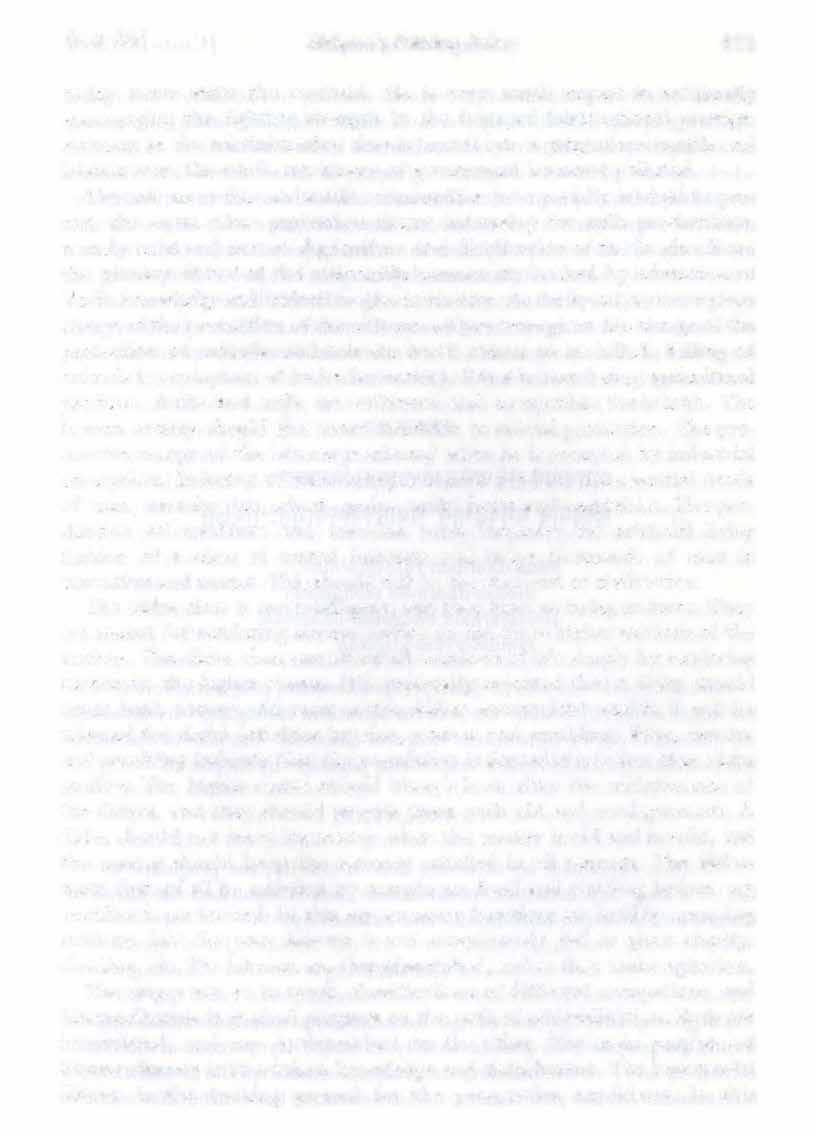
Text 26j Bhi�ma's Passing Away 471
iisrama it is instructed that this material world is not actually the home of the living being. The conditioned souls under material bondage are prisoners of matter, and therefore self-realization is the ultimate aim of life. The whole system of iisrama-dharma is a means to detachment. One who fails to assimilate this spirit of detachment is allowed to enter into family life with the same spirit of detachment. Therefore, one who attains detachment may at once adopt the fourth order, namely, renounced, and thus live on charity only, not to accumulate wealth, but just to keep body and soul together for ultimate realization. Household life is for one who is attached, and the viinaprastha and sannyiisa orders of life are for those who are detached from material life. The brahmaciiri-iisrama is especially meant for training both the attached and detached.
TEXT 27

diina-dharmiin riija-dharmiin mok§a-dharmiin vibhiigasafl, stri-dharmiin bhagavad-dharmiin samiisa-vyiisa-yogatafl,
diina-dharmiin-:.the acts of charity; riija-dharmiin-pragmatic activities of the kings; mok§a-dharmiin-the acts for salvation; vibhiigasafl,-by divisions; stri-dharmiin-duties of women; bhagavat-dharmiin-the acts of the devotees; samiisa- generally; vyiisa-explicitly ; yogata[t-by means of.
TRANSLATION
He then explained, by divisions, acts of charity, the pragmatic activities of a king and activities for salvation. Then he described the duties of women and devotees, both briefly and extensively.
PURPORT
To give charity is one of the householder's main functions, and he should be prepared to give in charity at least fifty percent of his hardearned money. A brahmaciiri, or student, should perform sacrifices, a householder should give charity, and a person in the retired life or in the
472 Srimad-Bhagavatam [Canto I, Ch. 9
, �Nm�lllf.T�� ��1.frntfrfRJ!·II�'911
���·pn�l:ll{hr_N-�:
renounced order should practice penances and austerities. Those are the general functions of all the iisramas or orders of life on the path of selfrealization. In the brahmaciiri life the training is sufficiently imparted to understand that the world as property belongs to the Supreme Lord, the Personality of Godhead. 1 o one, therefore, can claim to be the proprietor of anything in the world. Therefore, in the life of a householder, which is a sort of license for sex enjoyment, one must give in charity for the service of the Lord. Everyone's energy is generated or borrowed from the reser· voir of energy of the Lord; therefore, the resultant actions of such energy must be given to the Lord in the shape oftranscendental loving servicefor Him. As the rivers draw water from the sea through the clouds andagain go down to the sea, similarly our energy is borrowed from the supreme source, the Lord's energy, and it mustreturn to the Lord. That is the per· fection of our energy. The Lord, therefore, in the Bhagavad-gitii (Bg. 9.27) says that whatever we do, whatever we undergo as penance, whatever we sacrifice, whatever we eat or whatever we give in charity must be offered to Him (the Lord). That is the way of utilizingour borrowed energy. When our energy is utilizedin that way, our energy is purified from the contamination of material inebrieties, and thus we become fit for our original natural life of service to the Lord.
Raja-dharma is a great science, unlike modern diplomacy for political supremacy. The kings were trained systematically to become munificent and not merely tax collectors. They were trained to perform different sacrifices only for the prosperity of the subjects. To lead the prajiis to the attainment of salvation was a great duty of the king. The father, the spiritual master and the king are not to become irresponsible in the matter of leading their subjects to the path of ultimate liberation from birth, death, diseases and old age. Whenthese primary duties are properly discharged, there is no need of government of the people, by the people. In modern days the people in general occupy the administration by the strength of manipulated votes, but they are never trained in the primary duties of the king, and that is also not possible for everyone. Under the circumstances the untrained administrators play havoc to make the subjects happy in all respects. On the other hand, these untrained administrators gradually become rogues and thieves and increase the taxation to finance atop-heavyadministrationthatisuselessfor all purposes. Actually the qualified briihmar-as are meant to give directionto the kingsfor proper administration in terms of the scriptures like the Manu-sarhhitii and Dharma-siistras of Parasara. A typical king is the ideal of the people in general, and if the king is pious, religious, chivalrous and munificent, the


Text 27) Bhi�ma's Passing Away 473
citizens generally follow him. Such a king is not a lazy sensuous person living at the cost of the subjects, but alert always to kill thieves and dacoits. The pious kings were not merciful to dacoits and thieves in the name of nonsensical ahirhsa. The thieves and dacoits were purushed in an exemplary way so that in the future no one would dare commit such nuisances in an organized form. Such thieves and dacoits were never meant for administration as they are now.
The taxation law was simple. There was no force, no encroachment. The king had a right to take one fourth of the production made by the subject. The king had a right to claim a fourth of one's allotted wealth. One woukl never grudge to part with it because due to the pious king and religious harmony there was enough natural wealth, namely grains, fruits, flowers, silk, cotton, milk, jewels, minerals, etc., and therefore, no one was materially unhappy. The citizens were rich in agriculture and animal husbandry, and therefore they had enough grains, fruits and milk without any artificial needs of soaps and toilets, cinemas and bars.

The king had to see that the reserved energy of humanity was properly utilized. Human energy is not exactly meant for fulfilling animal propensities, but for self-realization. The whole government was specifically designed to fulfill this particular purpose. As such, the king had to select properly the cabinet ministers, but not on the strength of voting background. The ministers, the military commanders or even the ordinary soldiers were all selected by personal quaJification, and the king had to supervise them properly before they were appointed to their respective posts. The king was especially vigilant to see that the tapasvis, or persons who sacrificed everythingfor disseminating spiritual knowledge, were never disregarded_ They knew well that the Supreme Lord Personality of Godhead never tolerates any insult to His unalloyed devotees. Such tapasvis were trusted leaders even of the rogues and thieves, who would never disobey the orders of tapasvis. The king would give special protection to illiterates, the helpless and \vidows of the state. Defense measures were arranged previous to any attack by the enemies. The taxing process was easy, and it was not meant for squandering, but was for strengthening the reserve fund. The soldiers were recruited from all parts of the world, and they were trained for special duties.
As far as salvation is concerned, one has to conquer the principles of lust, anger, unlawful desires, avarice and be,vilderment. To get freedom from anger, one should learn how to forgive. One should not make plans in order to be free from unlawful desires. By spiritual culture one is able to conquer sleep. By tolerance only can one conquer desires and avarice.
474 Srimad - Bh agavatam [Canto l, Ch_ 9
Disturbances from various diseases can be avoided by regulated diets. By self-control one can be free from false hopes, and money can be saved by avoiding undesirable association. By practice of yoga one can control hunger, and worldliness can be avoided by culturing the knowledge of impermanence. Dizziness can be conquered by rising up, and false arguments can be conquered by factual ascertainment. Talkativeness can be avoided by gravity and silence, and by prowess one can avoid fearfulness. Perfect knowledge can be obtained by self-cultivation. One must be freed from lust, avarice, anger, dreaming, etc., to attain actually lhe path of salvation.
As far as the women class arc concerned, they are accepted as a power of inspiration for man. As such, women are more powerful than men. Mighty Julius Caesar was controlled by a Cleopatra. Such powerfulwornen are controlled by shyness. Therefore, hyness is important for women. Once this control valve is loosened, women can create havoc in society by adultery. Adultery means production of unwanted children known as varr-a-saiikara, who disturb the world.
The last item was taught by BJ-u�madeva. This is the process of pleasing the Lord. We are all eternal servants of the Lord, and when we forget this essential part of our nature we are put into material conditions of life. The simple process of pleasing the Lord (for the householders especially) is to install the Deity of the Lord at home. By concentrating on the Deity, one may progressively go on with the daily routine work. Worshiping the Deity at home, serving the devotee, hearing the Srimad-Bhiigavatam, residing in a holy place and chanting the holy name of the Lord are all inexpensive items by which one can please the Lord. Thus the subject matter was explained by the grandfather to his grandchildren.
TEXT 28

dharmiirtha-kiima-mok�iirhs ca sahopiiyiin yathii mune naniikhyiinetihiise�u varrayiimiisa tattvavit
dharma-occupational duties; artha-economic development; kamafulfillment ofdesires; mok§iin-ultimatesalvation; ca-and; saha-a!ong with;

Text 28] Bhi�ma's Passing Away 475
upiiyiin-means;yathii-as it is;mune-0 sages;niinii-various;iikhyiina-by recitation of historical narrations;itihiise§u-in the histories;varpayiimiisa -described;tattvavit-one who knows the truth.
TRANSLATION
Then he described the occupational duties of different orders and statuses of life, citing instances from history, for he was himself weU acquainted with the truth.
PURPORT
Incidences mentioned in the Vedic literatures, such as the Puriipas, Mahiibhiirata and Riimiiyapa, etc., are factual historical narrations which took place sometime in the past, although not in any chronological order. Such historical facts, being instructive for ordinary men, were assorted without chronological reference. Besides that, they happen on different planets,nay,in differentuniverses,and thus thedescriptionof thenarrations is sometimes measured by three dimensions. We are simply concerned with the instructive lessons of such incidences, even though they are not in order by our limited range of understanding. Bhi�madeva described such narrations before Maharaja Yudhi�thira in reply to his different questions.
TEXT 29

� Si'li<V1a� ij"�: *f«�a: I
7.ft t�Tf��q�ttl'4lf500a�*l(lttot: II��II
dharmam pravadatas tasya
sa kiilaft pratyupasthitaft
yo yoginas chanda-mrtyor
viiiichitas tiittariiyaraft
dharmam-occupational duties; pravadataft-while describing; tasyahis;sa�-that; kala�-time;pratyupasthita�-exactly appeared;ya�-thatis; yogina�-for the mystics; chanda-mrtyo�-of one who dies according to one's own selection of time; viiiichitaft-as desired by; tu-but; uttariiyaraft -period when the sun runs on the northern horizon.
476 Srimad-Bhagavatam [Canto I, Ch. 9
While Bhi�madeva was describing occupational duties, the sun's course ran into the northern hemisphere. This period is desired by mystics who die at their will.

PURPORT
The perfect yogis or mystics can leave the material body at their own sweet will at a suitable time and go to a suitable planet desired by them. In the Bhagavad-gitii (Bg. 8.14) it is said that self-realized souls who have exactly identified themselves with the interest of the Supreme Lord can generally leave the material body during the time of the fire-god's effulgence and when the sun is in the northern horizon, and thus achieve the transcendental sky. In the Vedas these times are considered auspicious for quitting the body, and they are taken advantage of by the expert mystics who have perfected the system. Perfection of yoga means attainment of such supermental states as to be able to leave the material body as desired. They can also reach any planet within no time without a material vehicle. The yogis can reach the highest planetary system within a very short time, and this is impossible for the materialist. Even attempting to reach the highest planet will take millions of years at a speed of millions of miles per hour. This is a different science, and Bhi�madeva knew well hmv to utilize it. He was just waiting for the suitable moment to quit his material body, and the golden opportunity arrived when he was instructing his noble grandsons, the Patl�avas. He thus prepared himself to quit his body before the exalted Lord Sri Kr�tla, the pious Patl�avas and the great sages headed by Bhagavan Vyasa, etc., all great souls. TEXT

Text 30) Bhisma's Passing Away 477 TRANSLATION
30 iji:\lqfitt�tt f.R: (i(�onFti�«i � 3ldG\'l� � �rft� � �:fm51ftf� ll�oll tadopasamhrtya gira!J, sahasraf}tr vimukta-sangarh mana iidi-pii.ru§e knr;te lasat-pita-pate catur-bhuje pura� sthite 'milita drg vyadhiirayat
tadii-at that time; upasarhhrtya-withdrawing; giraft-speeches; sahasrarib.-Bhi�madeva (expert in thousands of sciences and arts); vimukta-sahgam-compieteiy freed from everything else; mana[l,-mind; iidi-piint§e-unto the original Personality of Godhead; k!§l).e-unto Kr�Qa; lasat-pita-pate-decorated with yellow garments; catur-bhuje-unto fourhanded original Narayapa; purafi,-just before; sthite-standing by; amilita -widespread; drk-vision; vyadh iirayat-fixed .

TRANSLATION
Thereupon that man who spoke on different subjects with thousands of meanings and who fought on thousands of battlefields· and protected thousands of men, stopped speaking, and being completely freed from all bondage, withdrew his mind from everything else and fixed his wide-open eyes upon the Personality of Godhead Sri Kr!!f!a who stood before him, four-handed, dressed in yellow garments that glittered and shined.
PURPORT
In the momentous hour of leaving this material body the glorious example set by Bhi�madeva is the important function of the human form of life. The subject matter which attracts the dying man becomes the beginning of his next life. If, therefore, one is absorbed in the thoughts of the Supreme Lord Sri Kr�pa, he is sure to go back to Godhead without any doubt. This is confirmed in the Bhagavad-gitii (Bg. 8.5-15):
5: And whoever, at the time qf death, quits his body, remembering Me alone, at once attains My nature. Of this there is no doubt.
6: Whatever state of being one remembers when he quits his body, that state he will attain without fail.
7: Therefore, Aijuna, you should always think of Me in the form of Kr�TJa and at the same time carry out your prescribed duty of fighting. With your activities dedicated to Me and your mind and intelligence fixed on Me, you will attain l\'le without doubt.
8: He who meditates on the Supreme Personality of Godhead, his mind constantly engaged in remembering Me, undeviated from the path, he, 0 Partha [ Arjuna], is sure to reach Me.
9: One should meditate upon the Supreme Person as the one who knows everything, as He who is the oldest, who is the controller, who is smaller than the smallest, who is the maintainer of everything, who is beyond all material conception, who is inconceivable, and who is always a person. He is luminous like the sun and, being transcendental, is beyond this material nature.
478 Srimad-Bhagavatam [Canto l, Ch. 9
10: One who, at the time of death. fixes his life air between the eyebrows and in full devotion engages himself in remembering the Supreme Lord, will certainly attain to the Supreme Personalityof Godhead.
ll: Persons learned in the Vedas. who utter omkiira and who are great sagesin the renounced order,enterinto Brahman. Desiring such perfection, one practices celibacy. I shall now explain to you this process by which one may attain salvation.
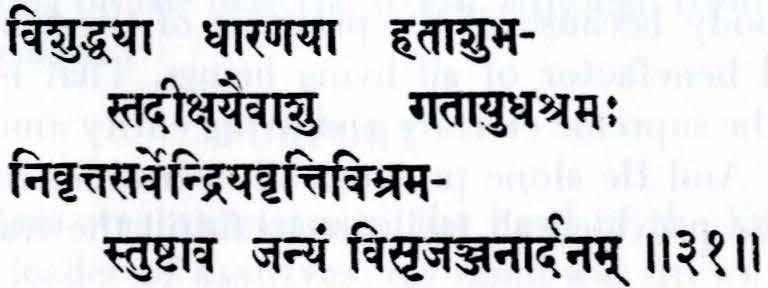
12: The ogic situation is that of detachment from ali sensualengagements. Closing allthe doors ofthe senses and fixing the mindon theheart andthe lifeair atthetop ofthe head, one establisheshimselfin yoga.
13: After being situated in this yoga practice and vibratingthesacred syllable om, the supreme combination of letters, if one thinks of the Supreme Personality of Godhead and quits his body, he will certainly reachthespiritual planets.

14: For one whoremembers Me without deviation, I am easy to obtain, 0 son of Prtha, because of his constant engagementin devotionalservice.
15: After attaining le, the greatsouls,who are yogis indevotion, never return to this temporary world, which is full of miseries, because they have attained thehighestperfection.
Sri Bhi�madeva attained the perfection of quitting his body atwill and was fortunate enough to have Lord Kpma, the object of his attention, personally present at the time ofdeath. He, therefore, fixed his openeyes upon Him. He wanted to see Sri Kr�l)a for a long time out of his spontaneous love for Him. Because he was a pure devotee, he had very littleto do with the detailed performance of yogic principles. Simple bhakti-yoga is enough to bring about perfection. Therefore, the ardent desire of Bhi�madeva was to see the person of Lord Kr�l)a, the mostlovable object, and by the grace of the Lord, Sri Bhi�madeva hadthis opportunity atthe laststage of hisbreathing.
TEXT 31

Text 31] Bhi�ma's Passing Away 479
visuddhayii dhiirar-ayii hatiisubhas tad-ik§ayaiviisu gatii-xudha-.�rama[1 nivrtta-sarvendriya-vrtti-vibhramas tu§fiiva janyam visrjaii janiirdanam
visuddhayii-by the purified; dhiirarzayii-meditation;hata-asubhaft-one who had minimized the inauspicious qualities of material existence;tathis;ik�ayii-by looking on;eva-simply by; tisu-immediately;gatii-having gone away;yudha-arrows; srama[z-fatigue; nivrtta-being stopped; saroaall; indriya- senses; vrtti-activities; vibhramaft-being widely engaged; tu�tiiva-prayed for; janyam--:the material tabernacle; visrjan-while quitting;janiirdanam-the controller of the living beings.
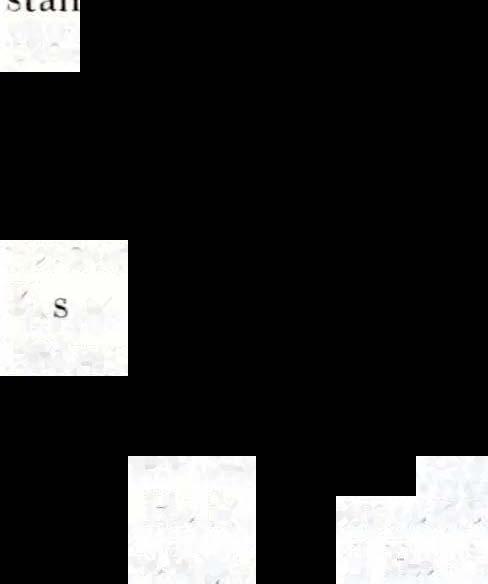
TRANSLATION

By pure meditation, looking at Lord Sri Kr�!la, he at once was freed from all material inauspiciousness and was relieved of all bodily pains caused by the arrow wounds. Thus all the external activities of his senses were at once stopped, and he prayed transcendentally to the controller of all living beings while quitting his material body.

PURPORT
The material body is a gift of the material energy technically called illusion. Identification with the material body is due to forgetfulnes of our eternal relationship with the Lord. For a pure devotee of the Lord like Bhl�madeva, this illusion was at once removed as soon as the Lord arrived. Lord Kr�!la is like the.un, and the illusory external material energy is like darkness. In the presence of the sun there is no possibility of darknes "tanding. Therefore, jL:st on the arrival of Lord Kr�pa, all material conlamination was compiPLt-1) removed, and Bhl�madeva was thus able to be transcendentally situated by stopping the activities of the impure sense in collaboration with matter. The soul is originally pure and so also the senses. By material contamination the senses assume the role of imperfection and impurit . By revival of contact with the Supreme Pure Lord Kr.t1a the senses again become freed from material contamination . Bhl�madeva attained all thesetranscendentalconditions prior to his leaving the material body because of the presence of the Lord. The Lord is the controller and benefactor of all living beings. That is the verdict of all Vedas. H1· is the suprt-"mf' eternity and living entity amongst all the eternal living b1·ings.* And lit" alone provides all necessities for all kinds of li\1ng beings. Thus lie provided all facilities to fulfill the transcendental desires
480 Srlmad-Bhagavatam [Canto l, Ch. 9
*nityo nityiiniim cetanas cetartiiniim eko yo bahuniirh v:dadhiiti kiimiin (Ka{ha Upani§ad)
of His great devotee Sri Blu�madeva, and thus the latter began to pray as follows.
TEXT 32 ��em;{ �Rr��� f�

+m'!ffij ���ijif� fcf�m 1
��qttij �Rf�
�fij�fq- �J:�: ����II
sri bhi§11W UVtlCU iti matir upakulpitii vit[§[lii bhagavati siitvata-pungave vibhumni sva-sukham upagate kvacid viharturh prakrtim upeyu§i yad bhava-praviiha[t
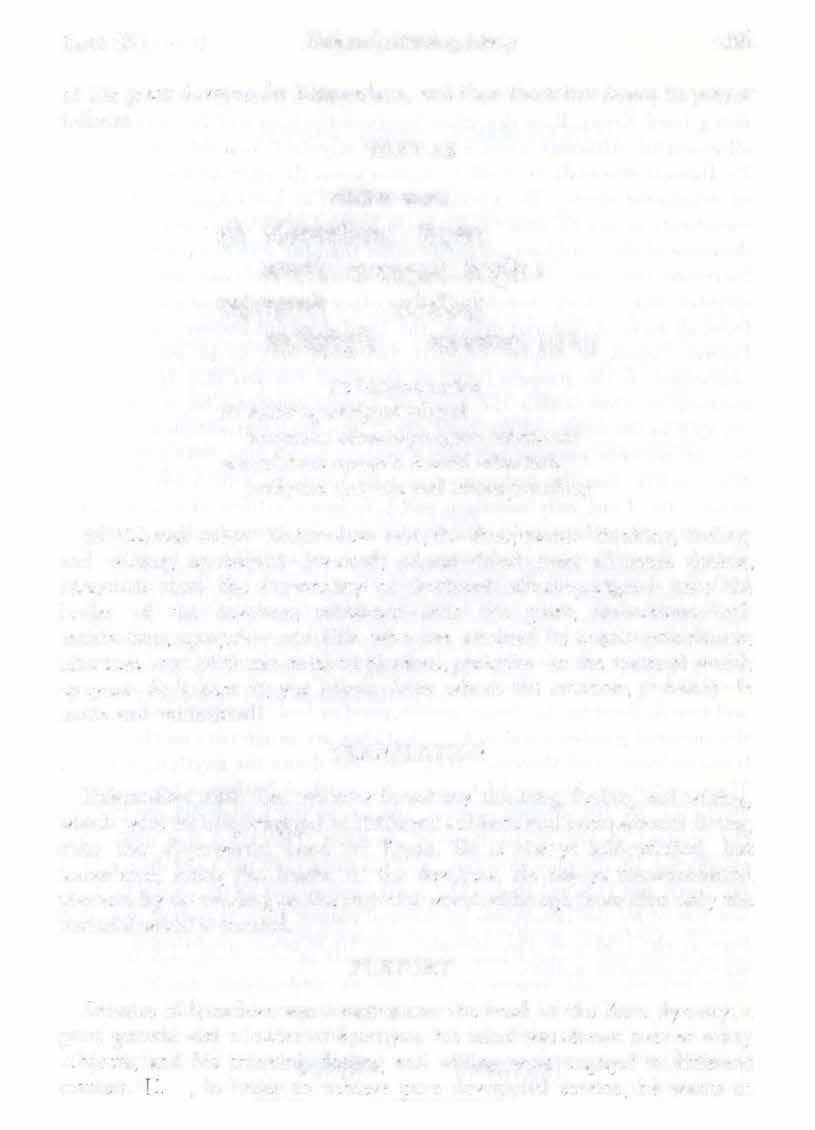
sri bhi§ma� twiica-Bhi�madcva said : iti-thus; mat* -thinking. feeling and willin g ; upakalpitii-invested: vit[§Q-ii-freed from all sense desires; bhagavati-unto t he Personality of Godhead; siitvata-puhgave-unto the leader of the devotees: vibhumni-unto the great; sva-sukham-selfsatisfaction; upagate-unto Him who has attained it: lrvacit-sometimes: vihartum-out oftranscendental pleasure: prakrtim -in the material world : u peyu�i-do accept it: yat bhava-from whom the cre at io n; pra va hab - is made and annihilated.
TRANSLATION
Bhi�madeva said: Let me now invest my thinking, feeling and wiJJing, which were so long engaged in different subjects and occupational duties, unto the all-powerful Lord Sri Kr�•.1a. He is always self-satisfied, but sometimes, being the leader of the devotees, He enjoys transcendental pleasure by descending on the material world, although from Him only the material world is created.
P RPORT
Because Bhi�madeva was a statesman, the head of the Kuru d y nast y, a great general and a leader of k §atriyas, his mind was slrf'\1"11 over so nw11�· ubjects, and his thinking. ft>eling and "illing wt>re engagt>d in diffen·nl matters. _low. in order to achie\ t' pure devotional service. he wa11Ls to

Text 32) Bhi�ma's Passing Away 481
invest all po• ers of thinking, feeling and willing entirely in the Supreme Being Lord Kr�!Ja. He is described herein as the leader of the devotees and all-powerful. Although Lord Kr�!la is the original Personality of Godhead, He Himself descends on earth to bestow upon His pure devotees the boon of devotional service. He descends sometimes as Lord Kr�!la as He is, and sometimes as Lord Caitanya. Both are leaders of the pure devotees. Pure devotees of the Lord have no desire other than the service of the Lord, and therefore they are called siitvata. The Lord is the chief amongst such siitvatas. Bhi�madeva, therefore, has no other desires. Unless one is purified from all sorts of material desires, the Lord does not become one's leaderDesires cannot be wiped out, but they have only to be purified. It is confirmed in the Bhagavad-gitii by the Lord Himself that He gives His instruction from within the heart of a pure de otee who is constantly engaged in the service of the Lord (Bg. 7.28). Such instruction is given not for any m aterial purpose but only for going back home, back to Godhead (Bg. 10.10). For the ordinary man who want.:; to lord it over material nature, the Lord only sanctions and becomes a witness of activities, but He never gives the nondevotee instructions for going back to Godhead. That is th · difference in deaungs by the Lord to different living beings, both the devotee and the nondevotee. He is leader of all the living beings, as the king of the state rules both the pri ·oners and the free citizens. But His dealings are different in terms of devotee and nondevotee. Nondevotees ncw:r care to take any instruction from the Lord, and therefore the Lord i · silent in their case, although He w i tnesses all their acti ities and awards them the necessary results, good or bad. The devotees are above this material goodness and badness, but- they are progressive on the path of transcendence, and therefore they have no desire for anything material. The devotee also k nows Sri Kr�r_1a as the original Naraya!la because Lord Sri Kr�!Ja, by His plenary portion, appears. a the Karanodakasayi Vi�!lU, the original source of all material creation. The Lord also desires the association of His pure devotee,, and for them only the Lord descends on the earth and enlivens them. The Lord appears out of His own will. He is net forced by the conditions of material nature. He is therefore described here as the vibhu, or the� Almighty, for He is mwcr conditioned by the laws of mal erial nature.



482 Srimad-Bhagavatam [Canto l, Ch. 9
TEXT 33 <:1¥41<iS'E4oi �w��U"R <::� I
Passing Away
����tdl'1'11�jf f��� �fm« qs;f� II��II
tri-bhuvana-kamanarh tamiila-varr-am
ravi-kara-gaura-variimbararh dadhiine vapur alaka-kuliiv[tiinaniibjarh
vijaya-sakhe ratir astu me'navadyii
tri-bhuvana-three statuses of planetary systems; k amanam- the most desirable; tamala-var!lam-bl u ish like the tamala tree; ravi-kara-sun rays; gaura-golden color; variimbaram-dress glittering by; dadhiine-one who wears; vapu[l.-body; alak a-kuliivrta-covered with paintings of sandalwood pulp; anan a- abjam-face like a lotus; vijaya-sak he- unto the friend of Arjuna; rat* astu-attraction be reposed upon Him; me-my; anavadyiiwithout desire for fruitive results.
TRANSLATION

Sri Kr��a is the intimate friend of Arjuna. He has appeared on this earth in His transcendental body which resembles the bluish color of the tamiila tree. His body attracts everyone in the three [upper, middle and lower] planetary systems. May His glittering yellow dress and His lotus face, covered with paintings of sandalwood pulp, be the object of my attraction, and may I not desire fruitive results.
PURPORT
When SI:i Kr��a by His own internal pleasure appears on earth, He does so by the agency of His internal potency. The attractive features of His transeendental body are desired in all the three worlds, namely the upper, middle and lower planetary systems. Nowhere in the universe are there uch beautiful bodily features as those of Lord Kr�pa. Therefore His transcendental body has nothing to do with anything materially created. Arjuna is described here as the conquerer, and Kf�pa is described as his intimate friend. Blu�madeva on his bed of arrows after the Battle of Kuruk�etra is remembering the particular dress of Lord Kr�pa which He put on as the driver of Arjuna's chariot. While fighting was going on between Arjuna and Bhi�ma, Blu�ma's attraction was drawn by the glittering dress of Kf�pa, and indirectly he admired his so-called enemy Arjuna for possessing the Lord as his friend. Arjuna was always a conquerer because
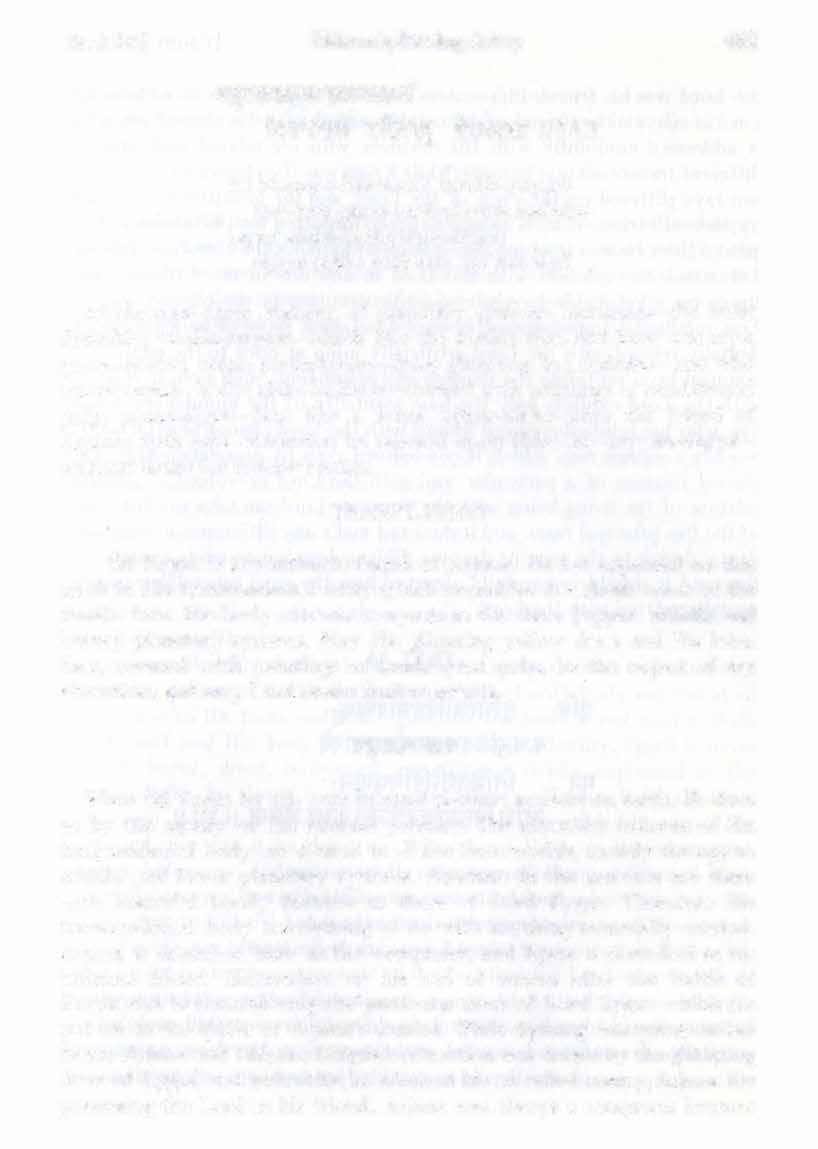
Text 33]
Bhi�ma's
483
the Lord was his friend. Bhi�madeva takes this opportunity to address the Lord as vijayasakhe (friend of Arjuna) because the Lord is pleased when He is addressed conjointly with His devotees who are related with Him in different transcendental humors. While Kr�rta was the charioteer of Arjuna, sun rays glittered on the dress of the Lord, and the beautiful hue created by the reflection of such rays was never forgotten by Bhi�madeva. As a great fighter he was relishing the relation of Kr�rta in the chivalrous humor. Transcendental relation with the Lord in any one of the different rasas (humors) is relishable by the respective devotees in the highest ecstasy. Less intelligent mundaners who want to make a show of being transcendentally related with the Lord artificially jump at once to the relation of conjugal love, imitating the damsels of Vrajadhiima. Such a cheap relation with the Lord exhibits only the base mentality of the mundaner because one who has relished conjugal humor with the Lord cannot be attached to worldly conjugal rasa, which is condemned even by mundane ethics. The eternal relation of a particular soul with the Lord is evolved. A genuine relation of the living being with the Supreme Lord can take any form out of the five principal rasas, and it does not make any difference in transcendental degree to the genuine devotee. Bhi�madeva is a concrete example of this, and it should be car�fully observed how the great general is transcendentally related W'lt"h the Lord.
TEXT 34

yudhi turaga-rajo-vidhumra-vi§vak
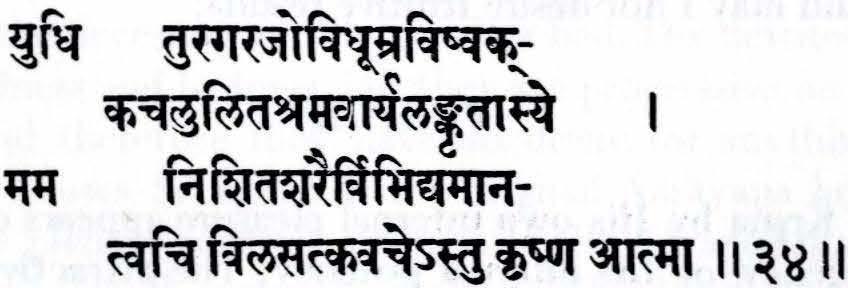
kaca-lulita-sramaviiryalankrtiisye mama ni§ita-sarair vibhidyamiina
tvaci vilasat kavace'stu kr�TJ-a iitmii
yudhi-on the battlefield; tu.raga-horses; raja�-dust; vidhumra-turned an ashen color; vi� vak-waving; kaca-hair; lulita-scattered; sramaviiriperspiration; alahkrta-decorated with; iisye-unto the face; mama-my; nisita-sharp; sami�-by the arrows; vibhidyamiina- pierced by; tvaci-in
484 Srimad-Bhagavatam (Canto I, Ch. 9
the skin; vilasat-enjoying pleasure; kavace-protecting armor; astu-let there be; hr§TJUft-unto Sri Kr�l).a;atma-mind.

TRANSLATION

On the battlefield [where Sri Kr�ra attended Arjuna out of friendship], the flowing hair of Lord Kr�l)a turned ashen due to the dust raised by the hoofs of the horses. And because of His labor, beads of sweat wetted His face. All these decorations, intensified by the wounds dealt by my sharp arrows, were enjoyed by Him. Let my mind thus go unto Sri Kr�J)a.
PURPORT
The Lord is the absolute form ofeternity, bliss and knowledge. As such, transcendental loving service of the Lord in one of the five principal relations, namely, santa, dasya, sakhya, vatsalya and madhurya, i.e., neutrality, servitorship, fraternity, filial affection and conjugal love, is graciously acce ted by the Lord when offered to the Lord in genuine love and affection. Sri Blu�madeva is a great devotee of the Lord in the relation of servitorship. Thus his throwing of sharp arrows at the transcendental body of the Lord is as good as the worship of another devotee who throws soft roses upon Him.
It appears that Bhi�madeva is repenting his actions,which he committed against the person of the Lord. But factually the Lord's body was not at all pained due to His transcendental existence. His body is not matter. Both He Himself and His body are complete spiritual identity. Spirit is never pierced, burnt, driedr �oistened, etc. This is vividly explained in the Bhagavad-gita. So also it is · statell in-.the Skanda Purar-a. It is said there that spirit is always uncontaminated and indestructible. It cannot be distressed, nor can it be dried up. When Lord Vi�l)U in His incarnation appears before us, He seems to be like one of the conditioned souls materially encaged justto bewilder theasuras, or the nonbelievers, who are always alert to kill the Lord, even from the very beginning of His appearance. Kamsa wanted to kill Krl?tl3, and Rava!)a wanted to kill Rama, because foolishly they were unaware of thefact that the Lord is neverkilled, for the spirit is never annihilated.
Therefore Bhi�madeva's piercing of the body of Lord Kr�!la is a sort of bewildering problem for the nondevotee atheist, but those who are devotees or those who are liberated souls are not bewildered.

Text 34] Bhi�ma's Passing Away 485
Bhl�madeva appreciated the all-mercifulattitude of the Lord because He did not leave A�una alone, although He lVas disturbed by the sharpened arrows of Bhl�madeva, nor was He reluctant to come before Bhl�ma's deathbed, even though He was ill-treated by him in the battlefield. Bhl�ma's repentance and the Lord's merciful attitude are both unique in this picture.
Sri Visvanatha Cakravarti Thakur, a great iiciirya and devotee in the humor of conjugal love with the Lord, remarks very saliently in this regard. He says that the wounds created on the body of the Lord by the sharpened arrows of Bhl�madeva were as pleasing to the Lord as the biting of a fiancee who bites the body of the Lord directed by a strong sense of sex desire. Such biting by the opposite sex is never taken as a sign of enmity, even if there is a wound on the body. Therefore, the fighting as an exchange of transcendental pleasure between the Lord and His pure devotee, Sri Bhi�madeva, was not at all mundane. Besides that, since the Lord's body and the Lord are identical, there was no possibility of wounds in the absolute body. The apparent wounds caused by the sharpened arrows are misleading to the common man, but one who has a little absolute knowledge can understand the transcendental exchange in the chivalrous relation. The Lord was perfectly happy with the wounds caused by the sharpened arrows of Bhi�madeva. The word vibhidyamiina is significant because the Lord's skin is not different from the Lord. Because our skin is different from our soul, in our case the word vibhidyamiina, or being bruised and cut, would have been quite suitable. Transcendental bliss is of different varieties, and the variety of activities in the mundane world is but a perverted reflection of transcendental bliss. Because everything in the mundane world is qualitatively mundane, it is full of inebrieties, whereas in the absolute realm, because everything is of the same absolute nature, there are varieties of enjoyment without inebriety. The Lord enjoyed the wounds created by His great devotee Bhl�madeva, and because Bhl�madeva is a devotee in the chivalrous relation, he fixes up his mind on Krwa in that wounded condition.

486 Srimad-Bhagavatam [Canto 1, Ch. 9
TEXT 35 �m��r�� f.{,3NWl4Wotl � A� I � q(�M�i�(� �� tn�� (M4¥41� ������
Bhi�ma's Passing Away
sapadi sakhi-vaco nisamya madhye
nija-parayor balayo ratharh nivesya
sthitavati para-sainikiiyur ak1l[!ii
hrtavati piirtha-sakhe ratir mamiistu
sapadi-on the battlefield; sakhi-vaca[l.-command of the friend; nisamya -after hearing; madhye-in the midst of; nija-own;pa rayo [l. - the opposite party; balay o �-strength; ratham-chariot; n ivesya-having entered; sthitavati-while staying there;para-sa i n ika-soldiers on the opposite side; iiyu[!.-duration of life; ak�(ii-by looking over; hrtavati-act of diminishing; piirtha-Arjuna, son of Prtha (Kunti); sakhe-unto the friend of; ratif!.intimate relation; mama-my; astn-Jet there be.

TRANSLATION
In obedience to the command of His friend, Lord Sri Kr�l)a entered the arena of the Battlefield of Kuru�etra between the soldiers of Arjuna and Duryodhana, and while there, He shortened the life spans of the opposite party by His merciful glance. Tllis was done simply by His looking at the enemy. Let my mind be fixed upon that Kr��a.
PURPORT
In the Bhagavad-gitii (Bg.l.2l-25) Arjuna ordered the infallible Lord Sri Kr��a to place hi chariot between the phalanxes of the soldiers. He asked Himto stay there until hehad finished observing the enemies he had to face in the battle. When the Lord was so asked, He at once did so just like an order carrier. And the Lord pointed out all the important men on the opposite side, saying, "Here is Bhi�ma, here is Dro�a," and so on. The Lord, being the supreme living being, is never the order supplier or order carrier of anyone, whoever may he be. But out of His causeless mercy and affection for His pure devotees, sometimes He carries out the order of the devotee like an awaiting servant. By executing the order of a devotee, the Lord becomes pleased, as a father is pleased to carry out the order of his small child. This is possible only out of pure transcendental love between the Lord and His devotees, and Bhi�madeva is quite aware of this fact. He, therefore, addressed the Lord as the friend of Arjuna.
The Lord diminished the duration of life of the opposite party by His merciful glance. It is said that all fighters who assembled on the Battlefield of Kuruk�etra attained salvation by personally seeing the Lord at the lime
Text 35]
487
of death. Therefore, His diminishing the duration of life of the enemy of Arjunadoes not mean that He was partial to the cause of Arjuna. Factually He was merciful to the opposite party because they would not have attained salvation by dying at home in the ordinary course of life. Here was a chance to see the Lord at the time of death and thus attain salvation from material life. Therefore, the Lord is all good, and whatever He does is for everyone's good. Apparently it was for the victory of Arjuna, His intimate friend, but factually it wasfor the good of Arjuna's enemies. Such are the transcendental activities of the Lord, and whoever understands this also gets salvation after quitting this material body. The Lord does no wrong in any circumstance because He is absolute, all good at all times.
TEXT 36

�: 'R� � ��11��11
vyavahita�prtanii-mukham nin7>.§ya sva-jana-vadhiid vimukhasya do§a-buddhyii kumatim aharad iitma-vidyayii yas cararw-rati� paramasya tasya me 'stu
vyavahita-standing at a distance; prtanii-soldiers; mukham-faces; nirikua-by looking upon; sva-jana-kinsmen; vadhiit-from the act of killing; vimukhasya-one who is reluctant; do§a-buddhyii-by polluted intelligence; ku matim-poor fund of knowledge; aharat-eradicated; iitma-vidyayii-by transcendental knowledge; ya�-the person; carap,afeet; rat*-attraction; paramasya-of the Supreme; tasya- for Him; memy; astu-let there be.
TRANSLATION
When Arjuna was seemingly polluted by ignorance upon observing the soldiers and commanders before him on the battlefield, the Lord eradicated his ignorance by delivering transcendental knowledge. May His lotus feet always remain the object of my attraction.
488 Srlmad-Bhagavatam [Canto I, Ch. 9
�qf(�'l<f"tl«� �t( ���Q� �tt�4!41 I t¥tM¥t(«t�¥tf'?4t44t 4'-
The kings andthe commanders were to stand in thefront of the fighting soldiers.That wasthe system of actualfighting. The kings and commanders were not so-called presidents or ministers of defense as they are today. They would not stay home while the poor soldiers or mercenaries were fighting face to face. This may be the regulation of modern democracy, but when actual monarchywas prevailing, the monarchs werenot cowards elected without consideration of qualification. As it was evident from the Battlefield of Kuruk�etra, all the executive heads like Dro�1a, Bhi�ma, Arjuna, Duryodhana, etc., of both parties, were not sleeping, but all of them were actual participants in the fighting which was selected to be executed at a place away from the civil residential quarters. This means that the innocent citizens were immuned from all effects of fighting between the rival royal parties. The citizens had no business to see what was going to happen after such fighting. They were to pay one fourth of their income to the ruler, whether he be Arjuna or Duryodhana. All the commanders of the parties on the Battlefield of Kuruk�etra were standing face to face, and Arjuna saw them with great compassion and lamented that he was to kill his kinsmen on the battlefield for the sake of the empire. He was not at allafraid of the giant military phalanx presented by Duryodhana,but as a merciful devotee of the Lord,renunciation ofworldly things was natural for him, and thus he decided not to fight for worldly possessions. But this was due to a poorfund ofknowledge, and therefore it is said here that his intelligence became polluted. His intelligence could not be polluted at any time because he was a devotee and constant companion of the Lord, as is clear in the Fourth Chapter of the Bhagavadgi:ta. Apparently Arjuna's intelligence became polluted because otherwise there would not have been a chance to rlPiivPr the teachings of Bhagavadgita for the good of all polluted conditioned souls engaged in material bondage by the conception of the false material body. The Bhagavad-gita was delivered to the conditioned souls of the world to deliver them from the wrong conception of identifyingthe body with the souland to reestablish the soul's eternal relation with the Supreme Lord. Atma-vidya, or transcendental knowledge of Himself, was primarily spoken by the Lord for tl1e benefit of all concerned in all parts of the universe.

Text 37) Bhi�ma's
489
Passing Away
PURPORT
37 �f.:l•t'l'tq'� 'l'CSIT���:1
TEXT
'"t{t($.4"i't{i7JlS+l4l41"Q�00{q �flr.f �Fi: 11�\911

sva-nigamam apahiiya mat-pratijiiam rtam adhikartum avapluto rathastha?t dhrta-ratha-carar-o 'bh)'ayiic caladgur harir iva hantum ibhmh gatottar_iyaft
sva-niga m am-own truthfulness; apahiiya-for nullifying; mat-pratijniim -my own promise; rtam-factual; adhi-more; kartum-for doing it; avaplu ta�-getting down; rathas tha[l, -from the chariot; dlqta- t aking up; ratha-chariot; cararwft-wheel; abhyayiit-wenthurriedly; caladguft- trampIing the earth; hari�-Jion; iva-like; hantum-to kiil; ibham- elephant ; gata-leaving aside; uttariya�-covering cloth.
TRANSLATION
FuJfiUing my desire and sacrificing His own promise, He got down from the chariot, took up its wheel, and ran towards me hurriedly, just like a lion goes to kill an elephant. He even dropped His outer garment on the way.
PURPORT
The Battle of Kuruk�etra was fought on military principles but at the same time in a sporting spirit, like a friend fights with another friend. Duryodhana criticized Bhi�madeva, alleging that he was reluctant to kill Arjuna because of paternal affection. A k§atriya cannot tolerate insults on the principle of fighting. Bhi�madeva therefore promised that the next day he would kill all five Pa�9avas with spec:ial weapons made for the purpo e. Duryodhana was atisfied, and he kept the arrmv with him to be delivered the next day during the fight. By tricks Arjuna took the arrows from Duryodhana, and BJ-u�madeva could understand that this was the trick of Lord Ku1a. So he took a vow that the next day Km1a would have to take up weapons Himself, otherwise His friend Arjuna would die. So in the next day's fighting Bhi�madeva fought o violently that both Arjuna and K���a were in trouble. Arjuna was almost defeated; the situation was so tense that he was about to be killed by Bhl�madeva the very next moment. At that time Lord Kr��a wanted to please His devotee, Bhi�ma, by keeping his promise,which was moreimportant than His own. Seemingly He broke His own promise. He promised before the beginning of the

490 S rimad-Bhagavatam
[Canto I, Ch. 9
Battle of Kuruk�etra that He would remain without weapons and would not use His strength for either of the parties. But to protect Arjuna He got down from the chariot, took up the wheel of the chariot and hurriedly rushed at Bhi�madeva in an angry mood, like a lion goes to kill an elephant. T-Ie dropped His covering cloth on the way, and out of great anger He did not know that He dropped it. Bhi�madeva at once gave up his weapons and stood to be killed by ��pa, his beloved Lord. The fighting of the day was thus ended at that very moment, and Arju na was saved. Of course there was no possibility of Arjuna's death because the Lord Himself was on the chariot, but because Bhl�madeva wanted to see Lord KI�ra take up some weapon to save His friend, the Lord created this situation, making Arjuna's deathimminent. He stood before Blu�madeva to show him that his promise was fulfilled and that He had taken up the wheel.
TEXT 38

�I(CI�1l
� � � �
sita-visikha-hato visiqw-damsaft
k�ataja-paripluta atatayino me prasabham abhisasiira mad-vadhiirtham
sa bhavatu me bhagaviin gatir mukundaft
sita-sharp ; visikha-arrows ; hatab-- wounded by; viSir[La-damsab--scattered shield; k�ataja-by wounds; parip lutab--smeared with blood; iitatiiyinafi.-the great aggressor; me-my; prasabham-in an angry mood; abhisasiira- began to move on; mat-vadha-artham-for the purpose of killing me; sa?1 - He; bhavatu-let Him become; me-my; bhagavan - the Personality of Godhead· gatib--destination; mukundab--one who awards salvation.
TRANSLATION
May He, Lord Sri ��ra, the Personality of Godhead, who awards salvation, be my ultimate destination. On the battlefield He charged me, as if angry because of the wounds dealt by my sharp arrows. His shield was scattered, and His body was smeared with blood due to the wounds.
Text 38) Bhi�ma's Passing Away 491
f���H
it
�
�qf�il 311111f4'1l
I SRPt'lfm«m:
tffil�:ll��ll
PURPORT
The dealings of Lord Kp)l}a and Bhi�madeva on th� Battlefield of Kuru�etra are interesting because the activities of Lord Sri Kr�l}a appeared to be partial to Arjuna and at enmity with Bhi�madeva; but factually all this was especially meant to show special favor to Bhi�madeva, a great devotee of the Lord. The astounding feature of such dealings is that a devotee can please the Lord by playing the part of an enemy. The Lord, being absolute, can accept service from His pure devotee even in the garb of an enemy. The Supreme Lord cannot have any enemy, nor can a so-called enemy harm Him because He is ajita, or unconquerable. But still He takes pleasure when His pure devotee beats Him like an enemy or rebukes Him from a superior position, although no one can be superior to the Lord. These are some of the transcendental reciprocatory dealings of the devotee \vith the Lord. And those who have no information of pure devotional service cannot penetrate into the mystery of such dealings. Bhi�madeva played the part of a valiant warrior, and he purposely pierced the body of the Lord so that to the common eyes it appeared that the Lord was· wounded, but factually all this was to bewilder the nondevotees. The allspiritual body cannot be wounded, and a devotee cannot become the enemy of the Lord. Had it been so, then Bhi�madeva would not have desired to have the very same Lord as the ultimate destination of his life. Had Bhi�madeva been an enemy of the Lord, He could have annihilated him without even moving. There was no need to come before Bhl�madeva with bloodand wounds. But He did so because the warrior devotee wanted to see the transcendental beauty of the Lord decorated with wounds created by a pure devotee. This is the way of exchanging transcendental rasas, or relations between the Lord and the servitor. By such dealings both the Lord and the devotee become glorified in their respective positions. The Lord was so angry that Arjuna checked Him when He was moving towards Bhi�madeva, but in spite of Arjuna's checking, He proceeded towards Bhi�madeva as a lover goes to a lover, without caring for hindrances. Apparently His determination was to kill Bl-u�madeva, but factually it was to please him as a great devotee of the Lord. The Lord is undoubtedly the deliverer of all conditioned souls. The impersonalists desire salvation from Him, and He always awards them according to their aspiration, but here Bhi�madeva aspires to see the Lord in His personal feature. All pure devotees aspire for this.

492 Srlmad-Bhagavatam [Canto 1, Ch. 9
TEXT 39

vijaya-ratha-kutumba iittatotre
dhrta-haya-rasmini tac-chriyek§arziye bhagavati ratir astu me mumiir§or
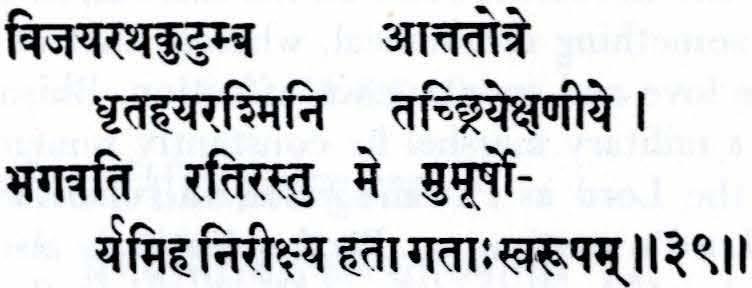
yam iha nirik§ya hatii gatii[1 sva-riipam
vijaya-Arjuna; ratha-chariot; kutumlia-object of protection at all risk; iittatotre-with a whip in the right hand; dhrta-haya-controlling the horses; rasmini-ropes; tat-sriya-beautifully standing; ik§UI)lye-to look at; bhagavati-unto the Personality of Godhead; rati[l. astu-let my attraction be there; mumiir§O�-one who is about to die; yam-unto whom; iha -in this world; ninl.§ya-by looking on; hatii�-those who died; gatii�attained; sva-riipam-original form.
TRANSLATION
At the moment of death, let my ultimate attraction be to SriK��!J.a, thePersonalityofGodhead.I concentrate my mind upon the chariot driver of Arjuna who stood with a whip in His right hand and a bridle rope in His left, who was verycareful to give protection toArjuna'schariot by all means. Those who saw Him on the Battlefield of Kuru�etra attained their original forms after death.
PURPORT
A pure devotee of the Lord constantly sees the presence of the Lord within himself because of being transcendentally relatedby loving service. Such a pure devotee cannot forget the Lord for a moment. This is called trance. The mystic (yogi) tries to concentrate upon the Supersoul by controlling the senses from all other engagements, and thus he ultimately attains samiidhi. A devotee more easily attains samiidhi or trance by constantly remembering the Lord's personal feature along with Hisholy
Text
39) Bhi�ma's Passing Away
493
name, fame, pastimes, etc. Therefore, the concentration of the mystic yogi and that of the devotee are not on the same level. The concentration of the mystic is something mechanical, whereas that of the pure devotee is nahtral in pure love and spontaneous affection. Bhi�madeva was a pure devotee, and as a military marshal he constantly remembered the battlefield feature of the Lord as Piirtha-siirathi, the chariot driver of Arjuna. Therefore, the Lord's pastime as Piirtha-siirathi is also eternal. AU the pastimes of the Lord, beginning from His birth at the prison house of Kamsa up to the Mausala-lilii at the end, all move one after another in all the universes, just as the clock hand moves from one point to another. And in such pastimes His associates like the Pii!J.�avas and Bhi�ma are constant eternal companions. So Bhi�madeva never forgot the beautiful feature of the Lord as Piirtha-siirathi, which even Arjuna could not see. Arjuna was behind the beautiful Piirtha-siirathi while Bhi�madeva was just in front of the Lord. As far as the military feature of the Lord is concerned, Bhi�madeva observed this with more relish than Arjuna.
All the soldiers and persons on the Battlefield of Kuruk�etra attained their original spiritual form like the Lord after their death because by the causeless mercy of the Lord they were all able to see Him face to face on that occasion. The conditioned souls rotating in the evolutionary cycle from the aquatics up to the form of Brahma are all in the form of miiyii, or the form obtained by one's own actions and awarded by material nature. The material forms of the conditioned souls are all foreign dresses, and when the conditioned soul becomes liberated from the clutches of material energy, he attains his originai form. The impersonalist wants to attain the impersonal Brahman effulgence of the Lord, but that is not at all congenial to the living sparks, parts and parcels of the Lord. Therefore, the impersonalists again fall down and get material forms, which are all false to the spirit soul. A spiritual form like the Lord's, either two-handed or four-handed, is attained by the devotees of the Lord either in the Vaiku!J.thas or in the Goloka planets, according to the original nature of the soul. This form, which is cent percent spiritual, is the svariipa of the living being, and all the living beings who participated on the Battlefield of Kuruk�etra, on both sides, attained their svariipa, as confirmed by Bhi�madeva. So Lord Sri Kr�!la was not only merciful to the Pa!J.�avas, but He wasalso merciful to the other parties because all of them attained the same result. Bhi�madeva wanted the same facility also, and that was his prayer to the Lord, although his position as an associate of the Lord is assured in all circumstances. The conclusion is that whoever dies looking on the

494 Srimad-Bhagavatam [Canto I, Ch. 9
Personality of Godhead within or without attains his svariipa, which is the highest perfection of life.
TEXT40

����lfuf��m
srop:rf�:
�J:
Slif'�f�����: 11\?oll
lalita-gati-viliisa-valguhiisa
prar.aya-nirik�ar-a-kalpitorumiinii[l krta-manu-krta-vatya unmadiindhii�
prakrtim agan kila yasya gopa-vadhvaft
lalita-attractive; gati-movements; viliisa-fascinating acts; valgu-hiisasweet smiling; prar.aya-loving; ninh:�ar-a-looking on; kalpita-mentality; urumiiniift-highly glorified; krta-manu-krta-vatya[l-in the act of copying the movements; unmadiindhii[l.-gone mad in ecstasy; prakrtim-characteristics; agan-underwent; kila-certainly ; yasya-whose ; gopa-vadhvaftthe cowherd damsels.

TRANSLATION
Let my mind be fixed upon Lord Sri K���a, whose motions and smiles of love attracted the damsels of Vrajadhama [the gopis]. The damsels imitated the characteristic movements of the Lord [after His disappearance from the rasa dance] .
PURPORT
By intense ecstasy of loving service, the damsels of Vrajabhumi attained the qualitative oneness with the Lord by dancing with Him on an equal level, embracing Him in nuptial love, smiling at Him in joke, and looking at Him with a loving attitude. The relation of the Lord with Arjuna is undoubtedly praiseworthy by devotees like Bhl�madeva, but the relation of the gopis with the Lord is still more praiseworthy because of their still morepurifiedlovingservice. Bythegraceof the Lord, Arjuna was fortunate
Text40] Bhi�ma's Passing Away 495
enough to have the fraternal service of the Lordas chariot driver, but the Lord did not award Arjuna with equal strength. The gopis, however, practically became one with the Lord byattainment of equal footing with the Lord. Bh'i�ma's aspiration to remember the gopis is to pray to have their mercy also at the last stage of his life. The Lord is satisfied more when His pure devotees are glorified, and therefore Bhi�madeva has not only glorified the acts of Arjuna, his immediate object of attraction, but also he has remembered the gopis who were endowed with unrivalled opportunities by rendering loving service to the Lord. The gopi"s' equality with the Lord should never be misunderstood to be like the siiyujya liberation of the impersonalist. The equality is one of perfect ecstasy where the differential conception is completely eradicated, for the interests ofthe lover andthe belovedbecomeidentical.
TEXT 41
munigar-a-nrpavarya-sankule'nta[tsadasi yudhi§fhira-riijasiiya e�iim arhar-am upapeda ik�ar-iyo mama drsi-gocara e�a iivir iitmii
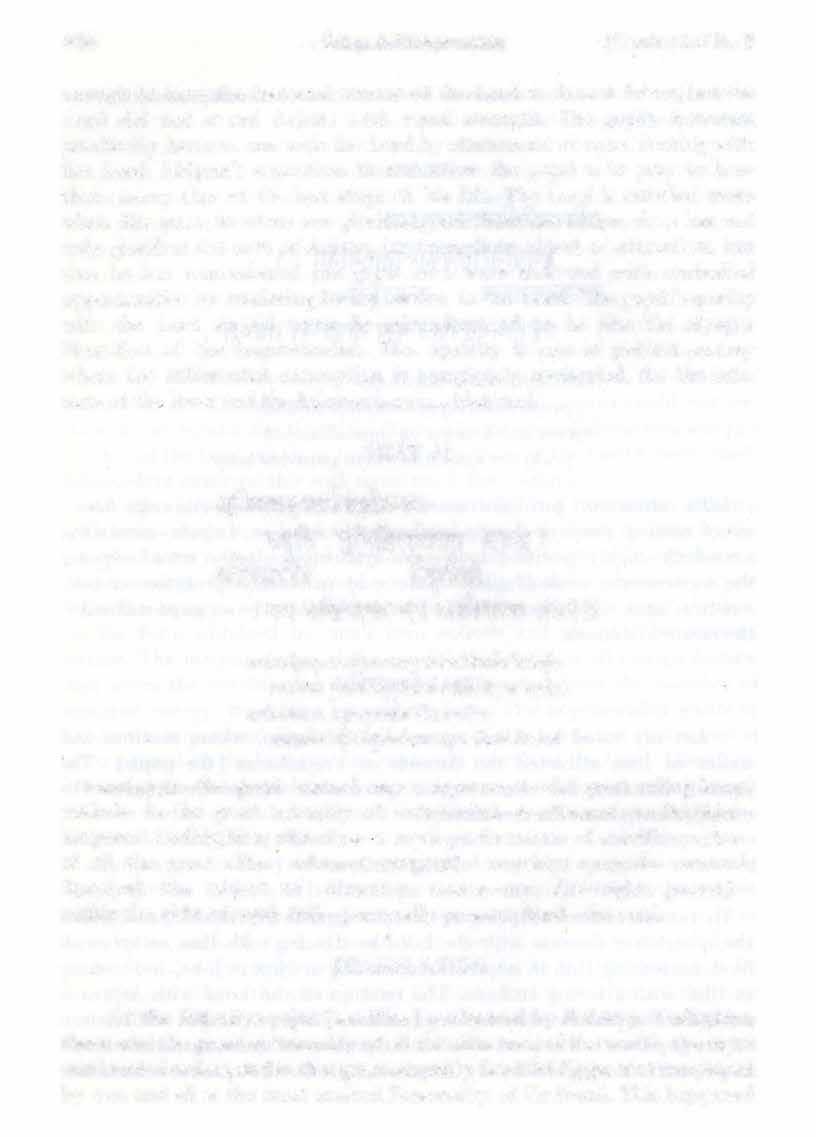
muni-gar-a-the great learned sages; nrpa-varya-the great ruling kings; sankule-in the great assembly of; anta[tsadasi-conference; yudhi§{hiraEmperor Yudhi�thira; riija-siiya-a royal performance of sacrifice; e§iimof all the great elites; arhartam-respectful worship; upap eda-received; ik§artiya[t- the object of attraction; mama-my; drsi-sight; gocara[twithinthe view of; e§alt iivi[t- personallypresent;iitmii-the soul.
TRANSLATION
At the Rajasiiya-yajfia [sacrifice] performed by Maharaja Yudi�thira, there was the greatest assembly of all the elite men of the world, the royal and learned orders, and in that great assembly Lord Sri ���ta was worshiped by one and all as the most exalted Personality of Godhead. This happened
496 Srimad-Bhagavatam [Canto 1, Ch. 9
ir.t•l"l'lq;:poi�s;:ij:� ��rmfu=vrr.I\Sf��r.no� �I 31�1iqqc:; � � mmt� � 311P4<1�¥tl ����II
during my presence, and I remembered the incident in order to keep my mind upon the Lord.
PURPORT
After gaining victory in the Battle of Kuruk�etra, Maharaja Yudhi�thira, the Emperor of the world, performed the Rajasuya sacrificial ceremony. The emperor, in those days, upon his ascendence to the throne, would send a challenge horse all over the world to declare his supremacy, and any ruling prince or king was at liberty to accept the challenge and express his tacit willingness either to obey or to disobey the supremacy of the particular emperor. One who accepts the challenge has to fight with the emperor and establish his own supremacy by victory. The defeated challenger would have to sacrifice his life, making a place for another king or ruler. So Maharaja Yudhi�thira also dispatched such challenging horses all over the world, and every ruling prince and king all over the world accepted Maharaja Yudhi�thira's leadership as the Emperor of the world. After this, allrulers of the world under the regime of Maharaja Yudhi�thira were invited to participate in the great sacrificial ceremony of Rajasuya. Such performances required hundreds of millions of dollars, and it was not an easy job for a petty king. Such a sacrificial ceremony, being too expensive andalso difficult to perform under present circumstances, is now impossible in this age of Kali. Nor can anyone secure the required expert priesthood to take charge of the ceremony.
So, after being invited, all the kings and great learned sages of the world assembled in the capital of Mahara.ia Yudhi�thira. The learned society, including the great philosophers, religionists, physicians, scientists and all great sages, was invited. That is to say, the briihmar-as and the k§atriyas were the topmost leading men in society, and they were all invited to participate in the assembly. The vaisyas and siidras were unimportant elements in society, and they are not mentioned herein. Due to the change of social activities in the modern age, the importance of men has also changed in terms of occupational positions.
So in that great assembly, Lord Sri Kr�l)a was cynosure of the neighboring eyes. Everyone wanted to see Lord Kr��a, and everyone wanted tu pay his humble respects to the Lord. Bhi�madeva remembered all this and was glad that his worshipful Lord, the Personality of Godhead, was present before him in His actual formal presence. So to meditate on the Supreme Lord is to meditate on the activities, form, pastime, name and fame of tht Lord. That is easier than what is imagined as meditation on the impersonal

Text 41) Bhi�ma's Passing Away 497
feature of the Supreme. In the Bhagavad-gitii it is clearly stated (Bg. 12.5) that to meditate upon the impersonal feature of the Supreme is very difficult. t is practically no meditation or simply a waste of time because very seldom is the desired result obtained. The devotees, however, meditate upon the Lord's factual form and pastimes, and therefore the Lord is easily approachable by the devotees. This is also stated in the Bhagavadgitii (Bg. 12.9). The Lord is nondifferent from His transcendental activities. It is indicated also in this sloka that Lord Sri J<r�p.a, while actually present before the human society, especially in connection with the Battle of Kuruk�etra, was accepted as the greatest Per .sonality of the time, although He might not have been recognized as the Supreme Personality of Godhead. The propaganda that a very great man is worshiped as God after his death is misleading beeause a man after his death cannot be made into God. Nor can the Personality of Godhead be a human being, even when He is personally present. Both ideas are misconceptions. The idea of anthropo· morphism cannot be applicable in the case of Lord Kr�p.a.
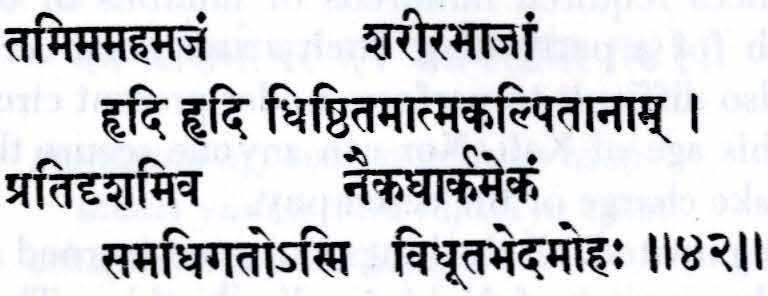
TEXT 42
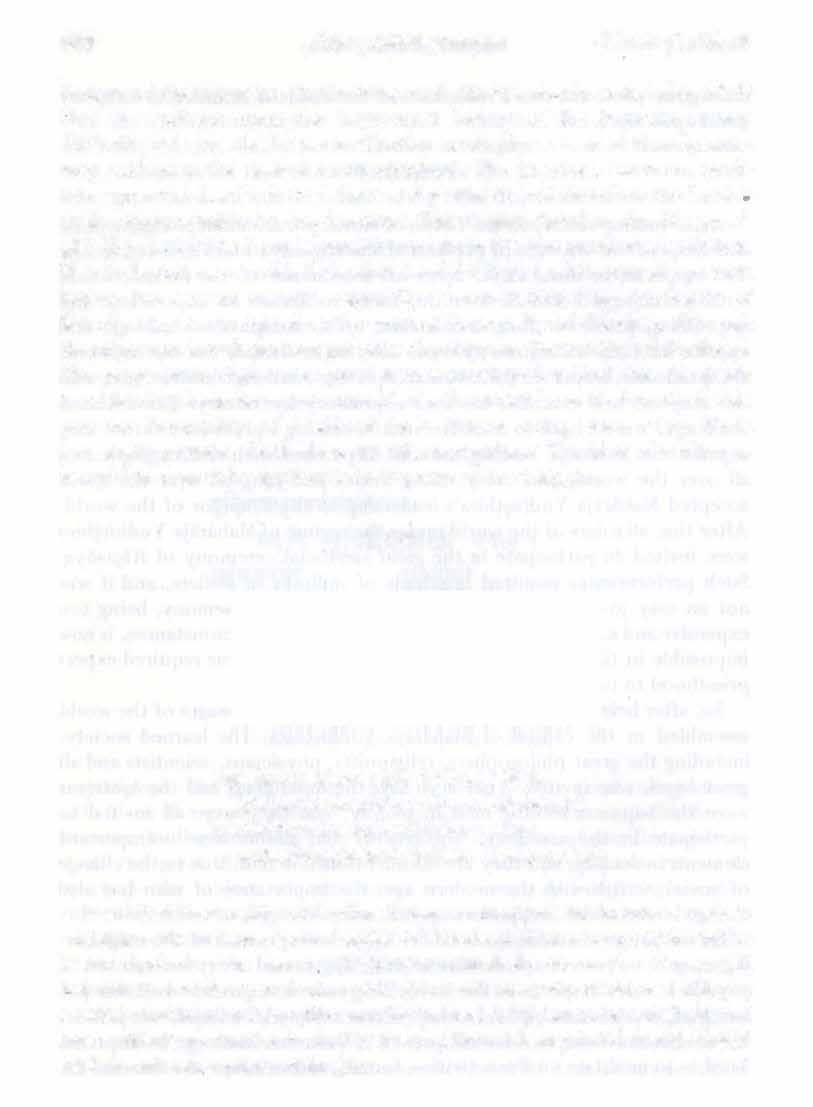
tam imam aham ajarh sarira-bhiijiiriz hrdi hrdi dhi�thitam iitma-kalpitiiniim pratidrsam iva naikadhiirkam ekarh
samadhi-gato'smi vidhuta-bheda-mohaft
tam-that Personality of Godhead; imam-now present before me; aham -I; ajam-the unborn; 5arira-bhaja m - of the conditioned soul; hrdi-in the heart; hrdi - in the heart; dhi§thitam-situated ; atma-the Supersoul; kalpitanam-of the speculators; pratidrsam-in everydirection; iva-like; na ekadha-not one; arkam-the sun; ekam-one only; samadhi-gata[l. asmi-1 have undergone trance in meditation; vidhiita-being freed from; bhedamohaft-misconception of duality.
498 Srimad-Bhagavatam [Canto l, Ch. 9
Now I can toeditate upon that one Lord SriKr��a now present before me with full concentration because now I have transcended the misconceptions of duality in regard to His presence in everyone's heart, even in the hearts of the mental speculators_ He is in everyone's heart_ The sun may be perceived differently, but the sun is one_


PURPORT

Lord Sri Kr��a is the one Absolute Supreme Personality of Godhead, but He has expanded Himself into His multiplenary portions by His inconceivable energy- The conception of duality is due to ignorance of His inconceivable energy. In the Bhagavad-gitii the Lord says (Bg. 9.] l) that only th e foolish take Him to be a mere human being. Such fooli h men arc not aware of His inconceivable energie . By llis inconceivable energy He is present in e eryone' heart, a the sun is present before ever one all over the world. The Paramiitma feature of the Lord is an expansion of His plenary portions. Heexpands Himself as Paramatma in everyone' heart by His inconceivable energy, and He also expands Himself as the glowing effulgence of brahmajyoti by expansion of His personal glow. It is staled in the Brahma-satnhitii that the brahmajyoti is J-1 is personal glow. Therefore, there is no difference between Him and Hi per onal glow brahmajyoti or His plenary portions as Paramatmii. Less intelligent persons '"ho are not aware of this fact cansider brahmajyoti and Paramatmato be different from Sri Kr�Da. This misconception of dualityis completelyremoved from the mind of Bhi�madeva, and he is now satisfied that it is Lord Sri Kr .!Ia only who is aU in all in everything. This enlightenment isattained bythe great mahiitmiis or devotees, as it is statedinthe Bhagavad-gitii (Bg. 7.19) that Vasudeva is aU in aU in everything, and there is noexistenceof anything without Vasudeva. Vasudeva or Lord Sri Kr�!la is the original Supreme Person, as now confirmed by a mahiijana, and therefore both the neophyte and the pure devotees must try to folio' in his footsteps. That is the way of the devotional line.
The worshipable object of Bhi�made..-a is Lord Sri Kr�!la as Parthasarathi, and that of the gopis is the same Kr��a in Vrndavana as the most attractive Syamasundara. Sometimes less intelligent scholars make a mistake and thi nk that the Kr�!!a of Vrndavana and that of the Battle of Kuruk�etr a are different personalities. But for BJ-u�madeva this miscon-

Text 42] Bhi�ma's Passing Away 499 TRANSLATION
ception is completely removed. Even the impersonalist's object of destination is Kr�l)a as the impersonal jyoti, and the yogi's destination of Paramatma is also Kr��Ja. Kr��Ja is both brahmajyoti and localized Paramatma,butin brahmajyoti or Paramatma there is no Kr�l).a or sweet relations with Kr�l).a. In His personal feature Kr�l).a is both Partha-sarathi and Syamasundara of Vrndavana, but in His impersonal feature He is neither in the brahmajyoti nor in the Paramatma. Great mahatmas like Bhismadeva realize all these different features of Lord Sri Kr�l).a, and therefore they worship Lord Kr�l).a, knowing Him as the origin of all features.

TEXT 43

siita uviica k[§TJU evarh bhagavati mano-viig-dr�!i-vrttibhifl, iitmany iitmiinam iivesya so 'nta�-sviisa upiiramat

suta� uviica-Siita Gosvami said; kr�r-aft-Lord Kr��Ja, the Supreme Personality of Godhead; evam-only; bhagavati-unto Him; mana�-mind; viik-speech; dr§ti- sight; vrttibhi"{!, - activities; iitmani-unto the Supersoul; iitmiinam-the living being; iivesya-having merged in; saf!, -he; antab-svasaft -inhaling; uparamat - became silent.
TRANSLATION
Suta Gosvami said: Thus Bhi�madeva merged himself in the Supersoul Lord Sri Kr�l).a, the Supreme Personality of Godhead, with his mind, speech, sight and actions, and thus he became silent, and his breathing stopped.
PURPORT
The stage attained by Bhi�madeva while quitting His material body is called nirvikalpa-samiidhi because he merged his self into thinking of the Lord and his mind into remembering His different activities. He chanted
500 Srimad-Bhagavatam [Canto l, Ch. 9
��cm:r � �ti���liifl�t�'ll: I 311��ri41��lil'l��ms�:���ll\l�II
the glories of the Lord, and by His sight he began to see the Lord personally present before him, and thus all his activities became concentrated upon the Lord without deviation. This is the highest stage of perfection, and it is possible for everyone to attain this stage b practice of devotional service. The devotional service of the Lord consists of nine prineiples of service activities, and they are l) hearing, 2) chanting, 3) remembering, 4) serving the lotus feet, 5) worshiping, 6) praying, 7) executing the orders, 8) fraternizing, and 9) fully surrendering. Any one of them or aU of them are equally competent to award the desired result, but they require to be practiced persistently under the guidance of an expert devotee of the Lord. The first item, hearing, is the most important item of all, and therefore hearing of the Bhagavad-gitii and, later on, SrimadBhiigavatam is essential for the erious candidate "-ho wants to attain the stage of Bhi�madeva at the end. The unique situation at Bhi�madeva's time of deathcan be attained, even though Lord Kr��ta �ay not be personallypresent. His wordsof the Bhagavad-gita or thoseof Srimad-Bhiigavatam are identical with the Lord. They are sound incarnations of the Lord, and one can fully utilize them to be entitled to attain the stage of Sri Bhl�madeva, who was one of the eight Vasus. Every man or animal must die at a certain stage of life, but one who dies like Bhi�madeva attains perfection, and one who dies forced by the laws of nature dies like an animal. That is the difference between a man and an animal, and the human form of life is especially meant for dying like Bhi�madeva.
TEXT 44

��qQ't�� �Ji ;mfur f;{t� 1
�� �ij �aft ;p;fhff.r �� mnw
sampadyamiinam iijiiiiya
bhi§marh brahmar-i ni§kale sarve babhuvus te tii§[l-irh vayiirhsiva diniityaye
sampadyamiinam-having merged into; iijiiiiya-after knowing this; bh�mam-about Sri Bhl!;!madeva; b rahmari-into the Supreme Absolute; ni�kale- unlimited; sarve-all present; babhuvufl te-all of them became; tii§p.im-silent; vayaritsi iva-like the birds; dina-atyaye-at the end of the day.
Text 44) Bhi!;!ma's Passing Away 501
Knowing that Bhi�madeva had merged into the unlimited eternity of the Supreme Absolute, all present there became silent like birds at the end of the day.





PURPORT
To enter into or to become merged into the unlimited eternity of the Supreme Absolute means to enter the original home of the living being. The living beings are all component parts and parcels of the Absolute Per onality of Godhead, and therefore they are eternally related 'vith Him as the servitor and the served. The Lord is served by all His part and parcels, as the complete machine is served by its parts and parcels. Any part of the machine removed from the whole is no longer important. Similarly, any part and parcel of the Absolute detached from the service of the Lord i u eless. The living beings who are in the material world are all disintegrated parts and parcels of the Sll preme whole, and the are no longer as important as the original part· and parcels. There are, ho, ever. more integrated living beings who are eternally liberated. The material energy of the Lord, called Durga-sakti, orthe uperintendent of the prison house, take charge of the disintegrated parts and parcels, and thus they undergo a conditioned life under the laws of material nature. When the living being becomes conscious of this fact, he tries to go back home, Lack to Godhead, and thus the spiritual urge of the living being begin . This spiritual urge is caJied Brahma-jijiiiisii, or inquir aLout Brahman. Principally this Brahma-jijiiiisii is successful by knO\ ledge, renunciation and devotional service of the Lord. J;iiina, or knowledge, mean to know evnything of Brahman, the Supreme, renunciation means detachment of material affection, and devotional service is the revival by practice of the original position of the living being. Tlu� succe sful living beings who are eligible· to enter into the realm of the Absolute arc called the jiiiinis, the yogis and th(' bhaktas. The jiiiinis and yogis enter into the impersonal rays of the Supreme, but the bha.ktas enter into the spiritual planets known as the Vaikur;tthas. In these spiritual planets the Supreme Lord as 1 arayaiJ.a predominates, and the healthy unconditioned living beings live there by rendering loving service to the Lord in the capacity of ervant, friend, parents and fiancee. There the unconditioned living beings enjoy life in full freedom with the Lord, whereas the impersonalist jii.iinis and yogis enter into the impersonal glowing effulgence of the Vaikur�ha planets.
502 Srimad-Bhagavatam [Canto I, Ch_ 9
TRANSLATION
The Vaikuptha planets are all self-illuminating like the sun, and the rays of the Vaikuptha planets are called the brahmajyoti. The brahmajyoti is spread unlimitedly, and the material world is but a covered portion of an insignificant part of the same brahmajyoti. This covering is temporary, and therefore it is a sort of illusion.
Bhi�madeva, as a pure devotee of the Lord, entered the spiritual realm in one Gf the Vaikul)tha planets where the Lord in His eternal form of Piirtha-siirathi predominates over the unconditioned living beings who are constantly engaged in the service of the Lord. The love and affection which bind the Lord and devotee are exhibited in the case of Bhi�madeva. Bhi�madeva never forgot the Lord in His transcendental feature as the Piirtha-siirathi, and the Lord was present personally before Bru;;madeva while he was passing to the transcendental world. That is the highest perfection of life.
TEXT 45
ij;f
tatra dundubhayo nedur deva-miinava-viiditiilz sasarhsulz siidhavo riijiiiirh khiit petu[l. pu�pa-vr�!aya[z
tatra-thereafter; dundubhaya[z-drums; nedu[z-were sounded; devathe demigods from other planets; manava-men from all countries; viiditii[z-beaten by; sasarhsu[l. -praiscd; siidhavalz- honest; riijiiiim-by the royal order; khiit-from the sky; pet u[l. - began to fall; pu�pa-vr�!aya[l.showers of flowers.
TRANSLATION
Thereafter, both men and demigods sounded drums in honor, and the honest royal order commenced demonstrations of honor and respect. And from the sky fell shower� of flowers.
PURPORT
Bhi�madeva was respected both by the human beings and the demigods. The human beings live on earth and similar other planets in the Bhur and Bhuvar group of planets, but the demigods live in the Svar or heavenly

Text 45) Bhi�ma'sPassing Away 503
�� it��·n;r��oon: 1
� ��:
�: ij'NeiT
�q'!ett: 11��11
planets,andallof them knew Bhi�madeva as a great warrior and devotee of the Lord. As a mahiijana (or authority) he was on the level of Brahma, arada and Siva, although he was a human being. Qualification on a par with the great demigods is possible only on attainment of spiritual perfection. Thus Bhi�madeva was known all over the universes, and during his time interplanetary travel was effected by finer methods than the futile endeavors of mechanical spacecraft. When the distant planets were informed of the passing away of Bhi�madeva, all the inhabitants of the upper planets as well as of the earth dropped showers of flowers to show due respect to the departed great personality. This showering of flowers from heaven is a sign of recognition by great demigods, and it should never be compared to the decoration of the dead body. The body of Bhi�madeva lost its material effects due to being surcharged with spiritual realization, and thus the body was spiritualized as when iron becomes red-hot when in contact with fire. The body of a fuJiy self-realized soul is not, therefore, accepted as material. Special ceremonies are observed for such spiritual bodies. The respect and recognition of Bhi�madeva are never to beimitated byartificial means, as it has become a fashion to observe the so-called jayanti ceremony for any and every common man. According to authorized siistras, such a jayanti ceremony for an ordinary man, however exalted he may be materially, is an offense to the Lord because jayanti is reserved for the day when the Lord appears on the earth. Bhi�madeva was unique in his activities, and his passing away to the kingdom of God is also unique.
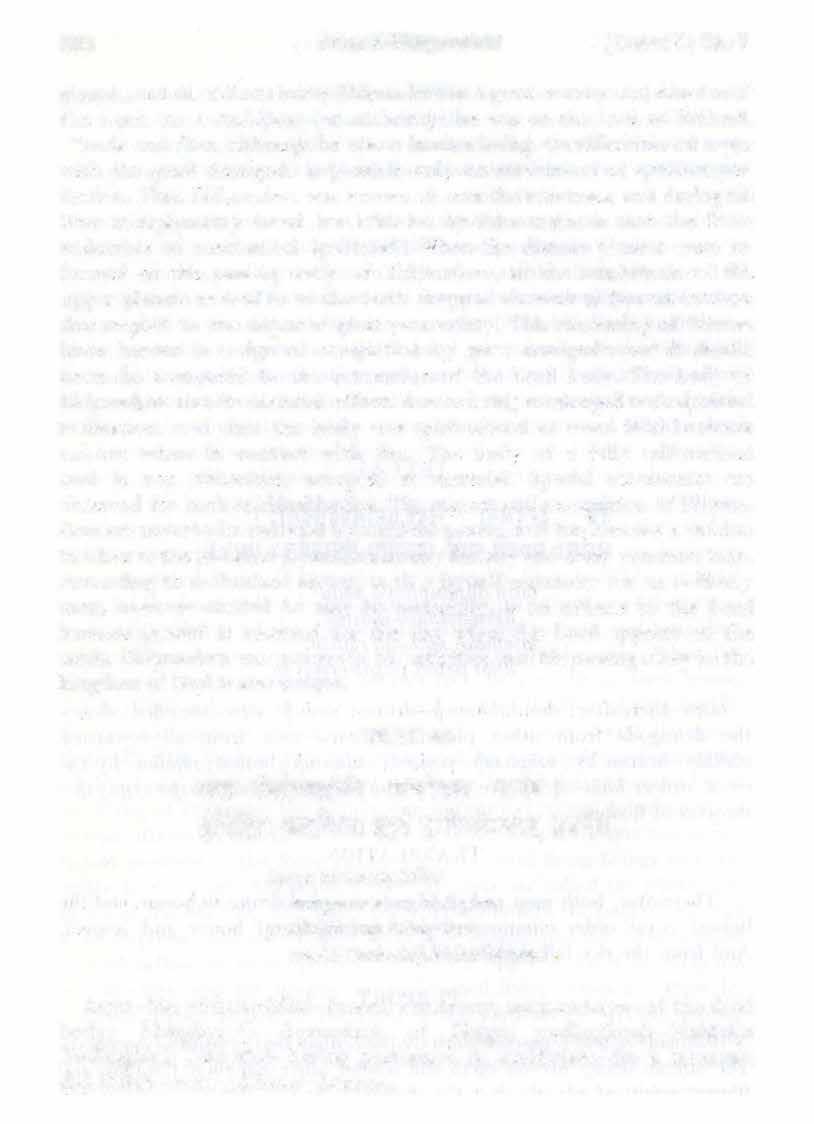
TEXT 46

� f��'\f;r (0(+4�(1� � I

��lR: m�t �ij �:ftc«ft� ll\l�"

tasya nirharar-iidini samparetasya bhiirgava
yudhi§thiraft kiirayitvii
muhiirtarh duftkhito'bhavat
tasya-his; nirharar-iidini-funeral ceremony; samparetasya-of the dead body; bhiirgava-0 descendant of Bhrgu; yudhi§thiraft- Maharaja Yudhi�thira; kiirayitvii-having performed it; muhiirtam-for a moment; duftkhitaft-sorry; abhavat- became.
504 Srimad-Bhagavatam [Canto l, Ch. 9
0 descendant of Bhrgu [Saunaka], after performing funeral rituals for the dead body of Bhi�madeva, Maharaja Yudhi�1hira was momentarily overtaken with grief.



PURPORT
Bhi�madeva was not only a great family head of 1aharaja Yudhi�thira, but also he was a great philosopher and friend of him, his brothers and his mother. Since Maharaja Pap�u, the father of the five brothers headed by Maharaja Yudhi�thira, died, Bhi�madeva was the most affectionate grandfather of the Pap�avas and caretaker of the widow daughter-in-law Kuntidevi. Although l\'Iaharaja Dhrtara�tra, the elder uncle of Maharaja Yudhi�thira, was there to look after them, his affection was more on the side of his hundred sons, headed by Duryodhana. Ultimately a colossal clique was fabricated to deprive the five fatherless brothers of the rightful claim of the kingdom of Hastinapura. There was great intrigue, common in imperial palaces, and the five brothers were exiled into the wilderness. But Bhi�madeva was always a sincerely sympathetic well-wisher, grandfather, friend and philosopherto MaharajaYudhi�thira,evenup tothelast moment of his life. He died very happily by seeing .Maharaja Yudhi�thira to the throne, otherwise he would have long ago quitted his material body, instead of suffering agony over the undue sufferings of the Pap�avas. He was simply waiting for the opportune moment because he was sure and certain that the sons of Pandu would come out victorious inthe Battlefield of Kuruk�etra, as Hi Lor d;hip Sri Kr�pa was their protector. A a devotee of the Lord, he knew that the Lord's devotee cannot be vanquished at any rate. Maharaja Yudhi�thira was quite aware of all these good wishes of Bhi�madeva, and therefore he must have been feeling the great separation. He was sorry for the separation of a great soul, and not for the material body which Bhi�madeva relinquished. The funeral ceremony was a necessary duty, although Bhi�madeva was a liberated soul. Since Bhi�madeva was without is ue, the eldest grandson, namely Maharaja YudhiHhira, was the rightful person to perform this ceremony. It was a great boon to Bhi�madeva that an equally great son of the family undertook the la t rites of a great man.
Text 47) Bhi�ma's Passing Away 505
TRANSLATION
Srimad-Bhagavatam
tu§tuvur munayo h!§tiift
k!§T}arh tad-guhya-niimabhift tatas te k!§IJa-hrdayiil; svasraman prayayub, punab,
tu�tuvu�-satisfied; munayaft-the great sages, headed by Vyasadeva, etc.; h!§tiift-all in a happy mood; k[§T}am- unto Lord Kr�f.la, the Personality of Godhead; tat-His; guhya- confidential; niimabhi[t-by His holy name, etc.; tata[t -thereafter; te-they; kr�TJa-hrdayab, - persons who always bear Lord Kr�f.la in their hearts; sva-iisraman-to their respective hermitages; prayayuft- returned; punaft-again.
TRANSLATION
All the great sages then glorified the Lord Sri Kr��a, who was present there, by confidential Vedic hymns. Then all of them returned to their respective hermitages, bearing always Lord Kr��a within their hearts.

PURPORT
The devotees of the Lord are always in the heart of the Lord, and the Lord is always in the heart of the devotees. That is the sweet relation betwef!n the Lord and His devotees. Due to unalloyed love and devotion for the Lord, the devotees always see Him within themselves, and the Lord also, althoughHe has nothing to do and nothing to aspire to,is alw:1.ys busy in attending to the welfare of His devotees. For the ordinary living beings the law of nature is there for all actions and reactions, but He is always anxious to put His devotees on the right path. The devotees are, therefore, under the direct care of the Lord. And the Lord also voluntarily puts Himself under the care of His devotees only. So all the sages, headed by Vyasadeva, were devotees of the Lord, and therefore they chanted the Vedic hymns after the funeral ceremony just to please the Lord, who was present there personally. All the Vedichymns are chanted to please Lord Kr��a. This is confirmed in the Bhagavad-gitii (Bg. 15.15). All the Vedas, Upani§ads, Vedanta, etc., are seeking Him only, and all hymns are for glorifying Him only. The sages, therefore, performed the exact acts suitable for the purpose, and they happily departed for their respective hermitages.
506
[Canto 1, Ch. 9
TEXT 48
miT �lro � �IJIT �� I f'«Rm-�Jtffi�:q"ijqftq.ft� 11\?�11
tato yudhi§thiro gatvii saha-knrJo gajiihvayam pitararh siintvayiimiisa giindhiirirh ca tapasvinim
tata[l.-thereafter; yudhi�!hira/.1.- Maharaja Yudhi�thira; gatvii- going there; saha-with; k!§ IJafl. -t he Lord; gajiihvayam-in the capital named Gajahvarpa Hastinapura; pitaram-unto his uncle (Dhrtarii�tra); siintvayiimiisa-specified; gandhiirim-wife of Dhrtara�tra; ca- and; tapasvinim-an ascetic lady.

TRANSLATION
Thereafter, Maharaja Yudhi�thira at once went to his capital, 1-Iastinapura, accompanied by Lord Sri Kr�!J.a, and there he consoled his uncle and aunt Gandhari, who was an ascetic.
PURPORT
Dhrtara�tra and Gandhari, the father and the mother of Duryodhana and his brothers, were the elder uncle and aunt of Maharaja Yudhi�thira. After the Battle of Kuruk�etra, the celebrated couple, having lost all their sons and grandsons, were under the care of Maharaja Yudhi�!hira. They were passing their days in great agony over such heavy loss of life and were practically living the life of ascetics. The death news of Bhi�madeva, uncle of Dhrtara�tra, was another great shock for the King and the Queen, and therefore they required solace from Maharaja Yudhi�thira. Maharaja Yudhi�thira was conscious of his duty, and he at once hurried to the spot with Lord Kr��a and satisfied the begrieved Dh[tara�tra with kind words, both from himself and the Lord also.
Gandhari was a powerful ascetic, although she was living the life of a faithful wife and a kind mother. It is said that Gandhari also voluntarily closed her eyes because of the blindness of her husband. A wife's duty is to follow the husband cent percent. And Gandhari was so true to her husband that she followed him even in his perpetual blindness. Therefore
Text 48] Bhi�ma's
Passing Away
..... ,...... ,...... .... .....
507
in her actions she was a great ascetic. Besides that, the shock which she uffered because of the wholesale killing of her one hundred sons and her grandsons also was certainly too much for a woman. But she suffered aU this just like an ascetic. Gandhari, although a woman, is no less than Bhi�madeva in character. They are bothremarkablepersonalities inthe111ahiibhiirata.
TEXT 49


pitra ciinumato raja vasudevanumodita�
cakara rajyarh dharmer-a pitrpaitamaharh vibhu�
pitra-by his uncle, Dhrtara�tra; ca-and; anumataft-with his approval; riijii-KingYudhi�thira;viisudeva-anumoditaft-confirmedbyLordSri Kr�Qa; cakara-executed; rajyam-the kingdom; dharmer-a-in compliance with the codes of royal principles; pitr-father; paitamaham-forefather; vibhu�-as great as.

TRANSLATION

After this, the great religious King, Maharaja Yudhi�?thira, executed the royal power in the kingdom strictly according to the codes and royal principles which were approved by his uncle and confirmed by Lord Sri Kr��a.
PURPORT
'lahariija Yudhi�thira was not a meretaxcollector. Hewas alwaysconscious of his duty as a king, which is no less than that of a father or spiritual master. The king is to see to the welfare of the citizensfrom all angles of social, political, economic and spiritual upliftment. The king must know that human life is meant for liberating the encaged soulfrom the bondage of material conditions, and therefore his duty is to see that the citizens are properly looked after to attain this highest stage of perfection.
508 Srimad-Bhagavatam [Canto l, Ch. 9
i\'Iaharaja Yudhi�thira followed these principles strictly as it will be seen from the next chapter. Not only didhefollowtheprinciples,buthe also got approval from his old uncle who was experienced in political affairs, and that was also confirmed by Lord Kr��a, the speaker of the philosophyof Bhagavad-gitii.

'laharaja Yudhi�thira is the ideal monarch, and monarchy under a trained king like Maharaja Yudhi�thiraisbyfarthemostsuperiorformof government, superior to modern republics or governments of the people, by the people. The mass of people, especially in this age of Kali, are all born sudras, basically low-born, ill-trained, unfortunate and badly associated.Therefore,theythemselvesdonotknow the highestperfectiona! aim of life. Therefore, votes cast by them actually have no value, and thus persons elected by such irresponsible votes cannot be responsible representativeslike Maharaja Yudhi�thira.
Thus end the Bhaktivedanta purports of the First Canto, Ninth Chapter, of tiw Srlmad-Bhagavatam, entitled "The Passing Away of
in the Presence of Lord Kr§!W."

Text 49) Bhi�ma's Passing Away 509
Bht§madeva
CHAPTER TEN
DepartureofLordKf$Oaforovaraka
TEXT I
saunaka uvaca hatvii svariktha-sprdha iitatiiyino yudhi$thiro dharma-bhrtiirh vari�thaft sahiinujaift pratyavaruddha-bhojanaft katharh pravrttaft kim akiira�it tataft
saunakaft uviica- Saunaka inquired; hatvii-after killing ; svariktha-legal inheritance; sprdhaft-desiring to usurp; iitatiiyinaft-the aggressor; yudhi§thira�- King Yudhi�thira; dharma-bhrtiim-of those who strictly follow religious principles; vari$tha�- greatest; saha-anujai�- with his younger brothers; pratyavaru ddha- restricted; bhojana�- acceptance of necessities; katham-how; pravrtta�-engaged; kim-what; akiira§it-executed ; tata�thereafter.
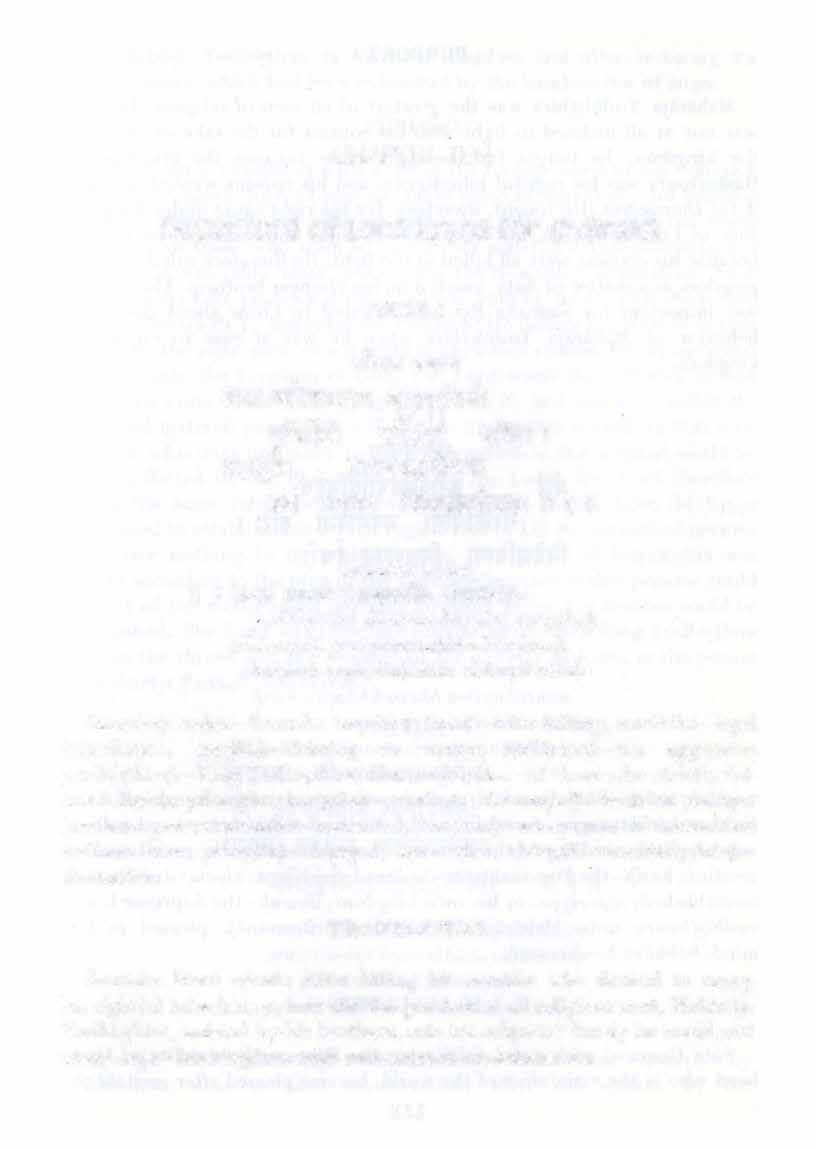
TRANSLATION
Saunaka Muni asked: After killing his enemies who desired to usurp his rightful inheritance, how did the greatest of all religious men, Maharaja Yudhi�thira, assisted by his brothers, rule his subjects? Surely he could not freely enjoy his kingdom with unrestricted consciousness.
���qr;:;r ���\:{�� �� �� �:1 �: Sl�tNW:�;r: � �: fi!fi'ii!fil('fl�: II � II
5ll
PURPORT
Maharaja Yudbi�thira was the greatest of all men of religion. Thus he was not at all inclined to fight with his cousins for the sake of enjoying the kingdom: he fought for the right cause because the kingdom of Hastinapura was his rightful inheritance, and his cousins wanted to usurp it for themselves. He fought, therefore, for the right cause under the guidance of Lord Sri Kri?Da, but he could not enjoy the results of his victory because his cousins were all killed in the fight. He therefore ruled over the kingdom as a matter of duty, assisted by his younger brothers. The inquiry was important for Saunaka J.l�i, who wanted to know about the afterbehavior of Maharaja Yudhi�thira when he was at ease to enjoy the kingdom.
TEXT2
siita uviica
varhsarh kuror varhsa-davagni-nirhrtarh sarhrohayitvii bhava-bhavano hari(l, nivesay,:tva nija-rajya iSvaro yudhi§thirarh prita-mana babhiiva ha
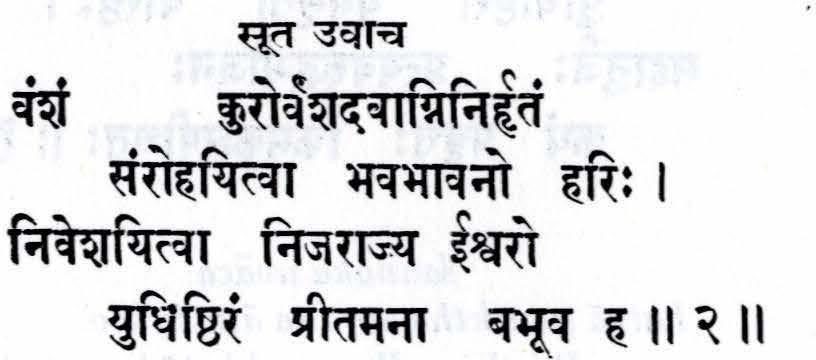
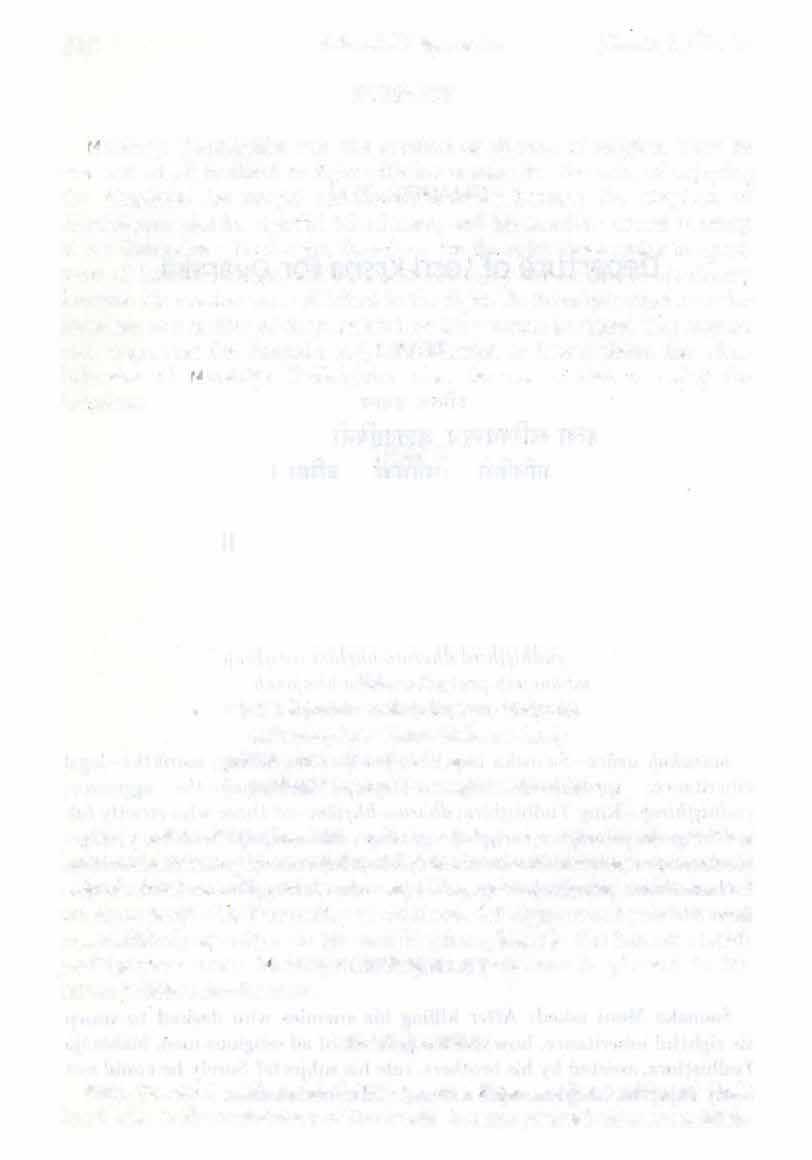
siita[l uvaca- Suta Gosvami replied; varhsam-dynasty; kuro(l,-of King Kuru; varhsa-dava-agni- forest fire set by the bamboos;nirhrtam-exhausted; sarhrohayitva-seedling of the dynasty ; bhava-bhavana(l,-the maintainer of creation; hari(l,-tne Personality of Godhead, Sri Kr�f!a; nivesayitva-having reestablished; nija-riijye-in his own kingdom; isvara(l,-the Supreme Lord; yudhi�thiram-unto Maharaja Yudhi�thira; prita-manii(l,-pleased in His mind; babhiiva ha-became.
TRANSLATION
Suta Gosviimi said: Lord Sri Kr�f!a, the Supreme Personality of Godhead who is the maintainer of the world, became pleased after reestablish-
512 Srimad-Bhiigavatam [Canto 1, Ch. 10
ing Maharaja Yudhi�thira in his own kingdom and after restoring the Kuru dynasty, which had been exhausted by the bamboo fire of anger.
PURPORT
This world i compared with a fire in the forest caused by the cohe ion of bamboo bu;;hes. Such a forest fire takes place automatically, for bamboo cohesion o curs w-ithout external cause. Similarly, in the material world the wrath of tho e who want to lord it over material nature interact , and the fire of war takes place, exhausting the unwanted population. Such fires or wars take place, and the Lord has nothing to do with them. But
because He want to maintain the creation, He desires the mass of people to follow the right path of self-realization, which enables the living beings to enter into the kingdom of God. The Lord wants the suffering human beings to come back home, back to Himself, and cease to suffer the threefold material pangs. The whole plan of creation is made in that way, and one who does not come to his senses suffers in the material world by pangs inflicted by the illusory energy of the Lord. The Lord therefore wants His bona fide representative to rule the world. Lord Sri K191)a descended to establish this sort of regime and to kill the unwanted persons who have nothing to do with His plan. The Battle of Kuruk�etra was fought according to the plan of the Lord so that undesirable persons could get out of ·the world and a peaceful kingdom under His devotee could be established. The Lord was therefore fully satisfied when King Yudhi�thira was on the throne and the seedling of the dynasty of Kuru, in the person of Maharaja Parik�it, was saved.
TEXT3

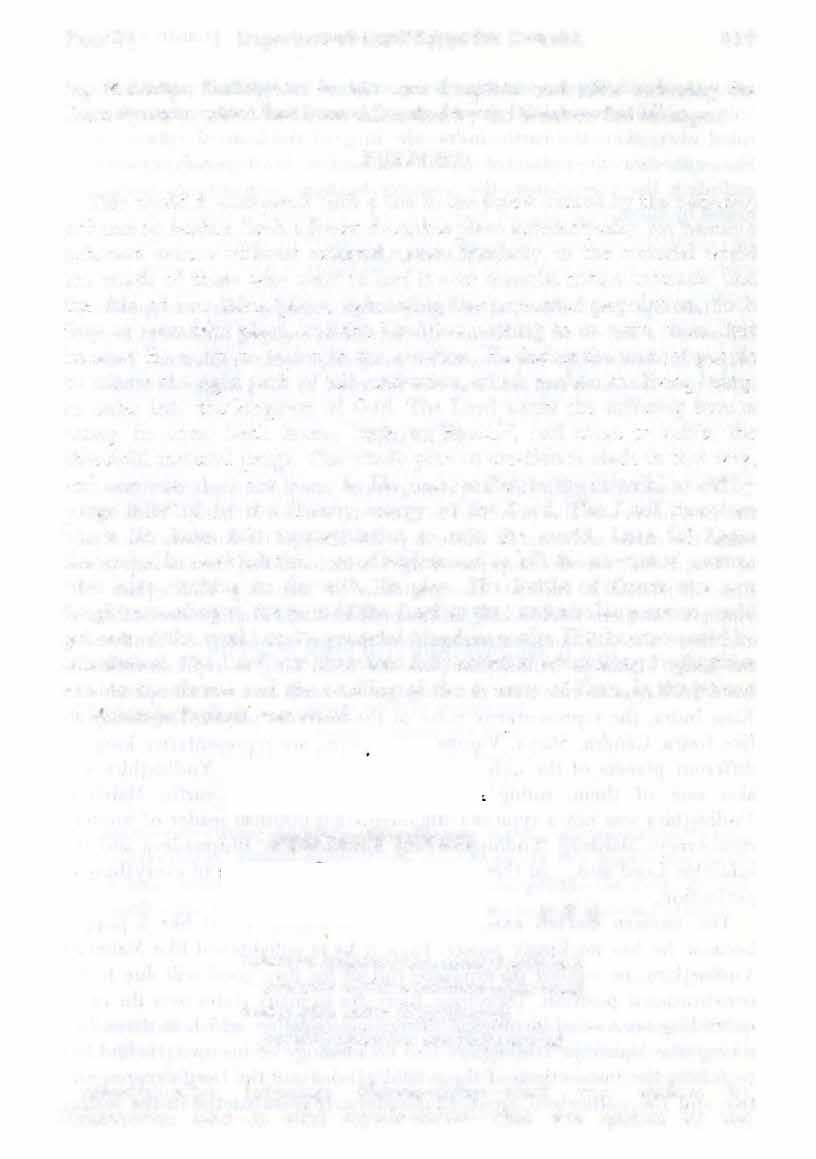
SI'Vtl€4�1111€4��: � rnf� �m�: II � II
niSamya bhi�moktam athiicyutoktarh
pravrtta-vijiiiina-vidhiita-vibhrama[l. sasiisa giim indra iviijitiisrayaft paridhyupiintiim anujiinuvartitafl
niSamya-after listening; bhi§ma-uktam-what was spoken by Bhl�madeva; atha-as also; acyuta-uktam-what was spoken by the


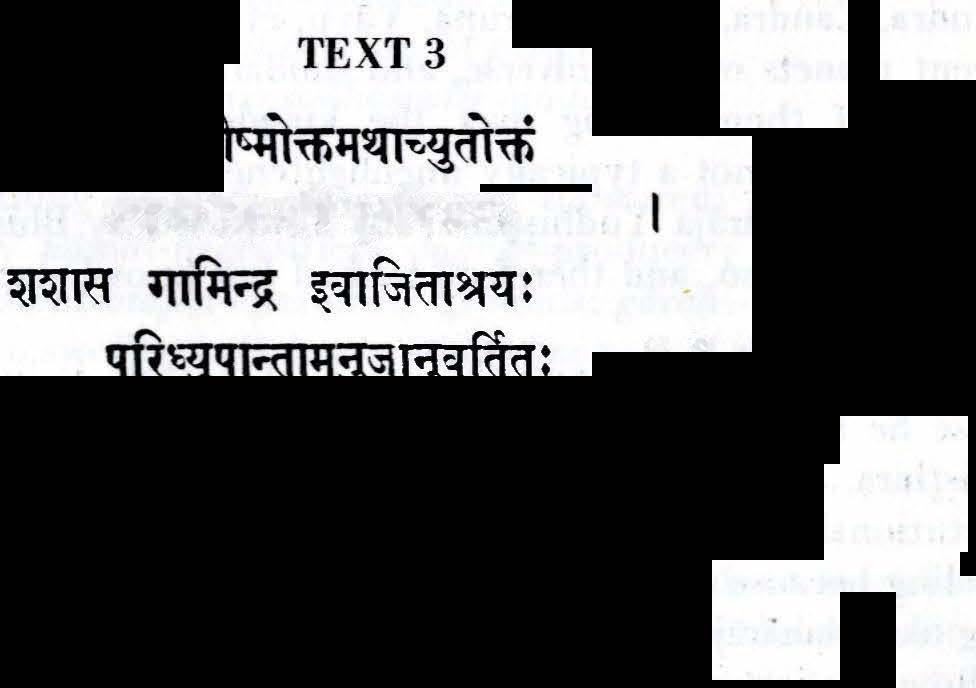

Text 3) Departure of Lord Kr�l).a for Dvaraka 513
"
"'•
" "
infallible Lord Kr�r:ta; pravrtta-being engaged in; vijniina-perfect knowledge; vidhuta-completely washed; vibhrama{l-all misgivings; sasiisaruled over; gam-the earth; indra-the king of the heavenly planet; ivalike; ajita-iisraya[l-protected by the invincible Lord; paridhyupiintiimincluding the seas; anuja-the younger brothers; anuvartita{1-being followed by them.
TRANSLATION

Maharaja Yudhi�thira, after being enljghtened by what was spoken by Bhi�madeva and Lord Sri Kr��a, the infallible, engagedhimself in matters of perfect knowledge because all his misgivings were eradicated. Thus he ruled over the earth and seas and was followed by his younger brothers.
PURPORT
The modern English law of primogeniture, or the law of inheritance by the first-born, was also prevalent in those days when l\Iaharaja Yudhi�!hira ruled the earth and seas. In those days the King of Hastinapura (now part of New Delhi) was the emperor of the world, including the seas, up to the time of Maharaja Parik�it, the grandson of 'laharaja YudhiHhira. His younger brothers were acting as his ministers and commanders of state, and there was full cooperation between the perfectly religious brothers of the king. Maharaja YudhiHhira was the ideal king or representative of Lord Sri Kr�!la to rule over the kingdom of earth and was comparable to King lndra, the representative ruler of the heavenly planet. The demigods like lndra, Candra, Surya, Varu!J.a, Vayu, etc., are representative kings of different planets of the universe, and similarly Maharaja Yudhi�thira was also one of them, ruling over the kingdom of the earth. !laharaja Yudhi�thira was not a typically unenlightened political leader of modern democracy. 1aharaja Yudhi�thira was instructed by Bhi�madeva and the infallible Lord also, and therefore he had full knowledge of everything in perfection.
The modern elected executive head of a state is just like a puppet because he has no kingly power. Even if he is enlightened like Maharaja Yudhi�thlra, he cannot do anything out of his own good will due to his constitutional position. Therefore, there are so many states over the earth quarreling because of ideological differences or other selfish motives. But a king like Maharaja Yudhi�thlra had no ideology of his own. He had but to follow the instructions of the infallible Lord and the Lord's representative and the authorized agent, Bhi�madeva. It is instructed in the siistras

514 Srimad-Bhagavatam [Canto 1, Ch. 10
that one should follow the great authority and the infallible Lord without any personal motive and manufactured ideology. Therefore, it was possible for Maharaja Yudhi�thira to rule the whole world, including the seas, because the principles were infallible and universally applicable to every· one. The conception of one world state can only be fulfilled if we can follow the infallible authority. An imperfect human being cannot create an ideology acceptable to everyone. Only the perfect and the infallible can create a program which is applicable at every place and can be followed by all in the world. It is the person who rules, and not the impersonal government. If the person is perfect, the govemment is perfect. If the person is a fool, the government is a fool's paradise. That is the law of nature. There are so many stories of imperfect kings or executive heads. Therefore, the executive head must be a trained person like Maharaja Yudhi�thira, and he must have the full autocratic power to rule over the world. The conception of a world state can take shape only under the regime of a perfect king like Maharaja Yudhi�thira. The world was happy in those days because there were kings like Maharaja Yudhi�thira to rule over the world.
TEXT4
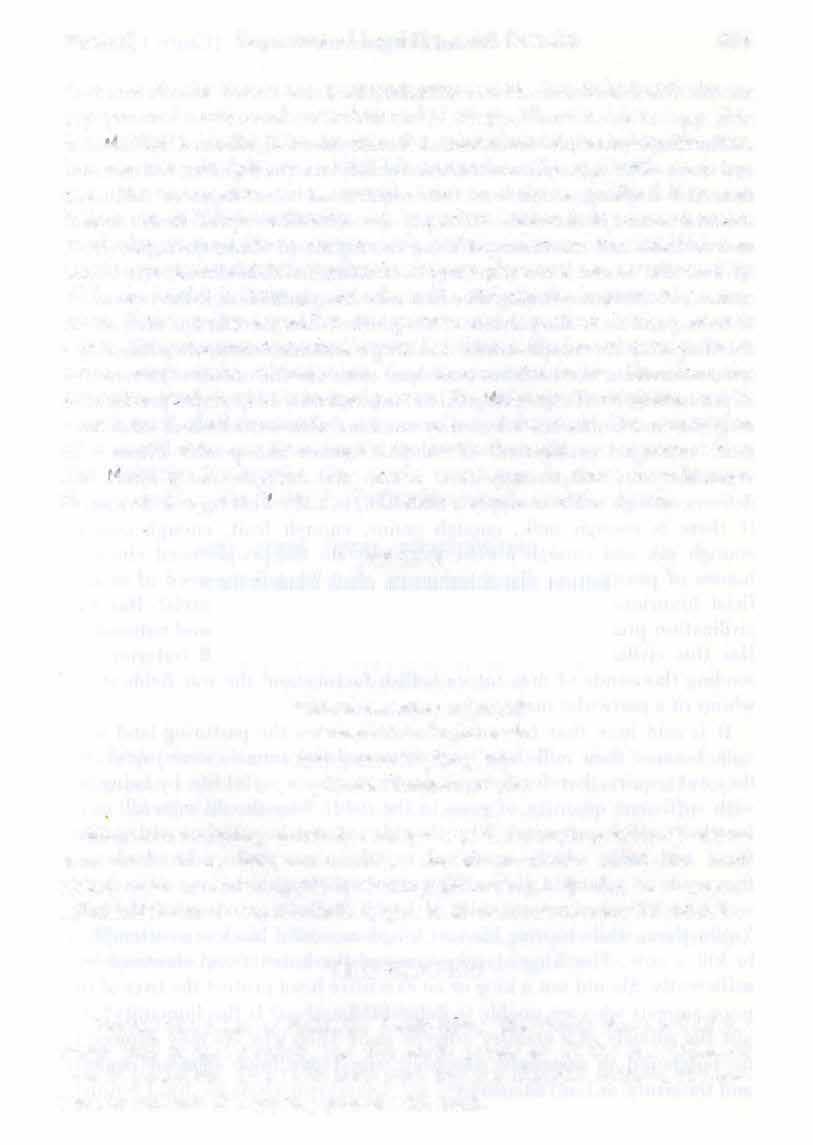
kiimarh vavar§a parjanyaft
sarva-kiima-dughii mahi
si§icuft sma vrajiin giivaft
payasodhasvatir mudii
kiimam-everything needed; vavar§a-was showered; parjanyaft-rains; sarva-everything; kama-necessities; dughii-producer; mahi-the land; si§icuft sma-moisten; vrajiin-pasturing grounds; giivaft-the cow; payasii udhasvati{t-due to swollen milk bags; mudii-because of a joyful attitude.

TRANSLATION
During the reign of Maharaja Yudh�thira, the clouds showered all the water that people needed, and the earth produced all the necessities of man in profusion. Due to its fatty milk bag and cheerful attitude, the cow used to moisten the grazing ground with milk.
Text 4] Departure of Lord K[�a for Dvaraka 515
PURPORT
The basic principle of economic development is centered about land and cows. The necessities of human society are food grains, fruits, milk, minerals, clothing, wood, etc. One requires all these items to fulfill the material needs of the body. Certainly one does not require flesh and fish or iron tools and machinery. During the regime of Maharaja Yudhi�thira, all over the world there were regulated rainfalls. Rainfalls are not in the control of the human being. The heavenly King Indradeva is the controller of rains, and he is the servant of the Lord. When the Lord is obeyed by the king and the people under the king's administration, there are regulated rains from the horizon, and these rains are the causes ofallvarieties ofproduction on theland. Regulated rains not only help ample production of grains and fruits, but when they combine with astronomical influences there is ample production of valuable stones and pearls. Grains and vegetables can sumptuously feed a man and animals, and a fatty cow delivers enough milk to supply a man sumptuously ·with vigor and vitality. If there is enough milk, enough grains, enough fruit, enough cotton, enough silk and enough jewels, then why do the people need cinemas, houses of prostitution, slaughterhouses, etc.? What is the need of an artificial luxurious life of cinema, cars, radio, flesh and hotels? Has this civilization produced anything but quarreling individually and nationally? Has this civilization enhanced the cause of equality and fraternity by sending thousands of men into a hellish factory and the war fields at �he whims of a particular man?
It is said here that the cows used to moisten the pasturing land with milk because their milk bags were fatty and the animals were joyful. Do theynot require,therefore,proper protection for a joyful life by being fed with sufficient quantity of grass in the field? Why should men kill cows for their selfish purposes? Why should man not be satisfied with grains, fruits and milk, which, combined together, can produce hundreds and thousands of palatable dishes. Why are there slaughterhouses all over the world to kill innocent animals?
 Maharaja Parik�it, grandson of iaharaja
Maharaja Parik�it, grandson of iaharaja
Yudhi�thira, while touring his vast kingdom, saw a black man attempting to kill a cow. The King at once arrested the butcher and chastised him sufficiently. Should not a king or an executive head protect the lives ofthe poor animals who are unable to defend themselves? Is this humanity? Are not the animals of a country citizens also? Then why are they allowed to be butchered in organized slaughterhouses? Are these signs of equality and fraternity or nonviolence?

516 Srimad-Bhagavatam rcanto 1, Ch_ 10
Therefore, in contrast with the modern advanced civilized form of government, an autocracy like Maharaja Yudhi�thira's is by far superior to so-called democracy in which animals are killed and a man les than an animal is allowed to cast votes for another less-than-animal man.
We are all creatures of material nature. In Lhe Bhagavad-gitii it is said that the Lord Himself is the seed-giving father and material nature is the mother of all living beings in all shapes. Thus mother material nature has enough foodstuff both for animals and men, by the grace of the Father AJmighty Sri Kr�!la. Thehuman being is the elder brother of all other living beings. He is endowed with intelligence more powerful than animals for realizing the course of nature and the indications of the Almighty Father. Human civilizations should depend on the production of material nahtre without artificially attempting economic development to turn the world into a chaos of artificial greed and power only for the purpose of artificial luxuries and sense gratification. This is but the life of dogs and hogs.
· TEXT 5

nadyaft samudrii girayaft
savanaspati-virudhaft
phalanty O§adhayaft sarviift
kiimam anvrtu tasya vai
nadyaft- rivers ; samudriift-oceans ; girayaft-hil!s and mountains; savanaspati- vegetables; virudhaf:i.- creepers; phalanti-active; o�adhayaf:i.drugs; sarviift- all; kiimam- necessities; anvrtu- seasonal ; tasya-for the King; vai-certainly.
TRANSLATION
The rivers, oceans, hills, mountains, forests, creepers and active drugs, in every season, paid their tax quota to the King in profusion.
PURPORT
Since Maharaja Yudhi�thira was under the protection of the ajita, the infallible Lord, as above mentioned, the property of the Lord, namely the
Text 5) Departure of Lord Kr�f.l a for Dvaraka 517
';{tl: � m: ("t�wt�q��; 1 'h......,e��"'"":q"";m.t"Nlf; �: �����II�II
rivers, oceans, hills, forests, etc., were all pleased, and they used to supply their respective quota of taxation to the King. The secret to success is to take refuge under the protection of the Supreme Lord. Without His sanction, nothing can be possible. To make economic development by our own endeavors on the strength of tools and machinery is not all. The sanction of the Supreme Lord must be there, othenvise despite all instrumental arrangements everything will be unsuccessfuL The ultimate cause of success is the daiva or the Supreme. Kings like laharaja Yudhi�thira knew perfectly well that the king iE the agent of the Supreme Lord tolook after the welfare of the mass of people. Actually the state belongs to the Supreme Lord. The rivers, the oceans, the forests, the hills, drugs, etc., are not creations of man. They are all creations of the Supreme Lord, and the Living being is allowed to make use of the property of the Lord for service of the Lord. Today's slogan is that everything is for the people, and therefore the government is for the people and by the people. But to produce a new species of humanity at the present moment on the basis of philosophy and religion, on the basis of justice and peace, on the basis of God consciousness and perfection of human life, the ideology of godly communism, the world has again to follow in the footsteps of kings like Maharaja Yudhi�thira or Parilqit. There is enough of everything by the will of the Lord, and we can make proper use of things to live comfortably without any enmity between men, or animal and man or nature. Everywhere the control of the Lord is there, and if the Lord is pleased, every part of nature 'viii be pleased. The river will flow profusely to fertilize the land, the oceans will supply sufficient quantity of minerals, pearls and jewels, the forest will supply sufficient wood, drugs and vegetables, and the seasonal changes will effectively help produce fruits and flowers in profuse quantity. The artificial way of living depending on factories and tools can render so-called happiness only to a limited number at the cost of millions. Since the energy of the mass of people is engaged in factory production, the natural products are being hampered, and for this the mass is unhappy. Without being educated properly, the mass of people are following in the footsteps of the vested interest by exploiting natural reserve, and therefore there is acute competition between individual and individual and nation and nation. There is no control by the trained agent of the Lord. We must look into the defects of modern civilization by comparison here, and should follow in the footsteps of Maharaja Yudhi�thirato cleanse man and 'vipe out anachronisms.

518 Srimad-Bhagavatam [Canto 1, Ch. 10
� �: �a:��:l
�ill�ulijctifff'� II � II

niidhayo vyiidhayafr. klesii daiva-bhutiitma-he tavafr. ajata-satriiv abhavan jantuniirh riijni karhicit
na-never; iidhayaft -anxieties; vyiid h ayaft -diseases ; klesiift-trouble due to excessive heat and cold; daiva-bhuta-iitma-all due to the body, supernatural power and other living beings; he tnvaft -due to the cause of; ajiitasatrau- unto one who has no enemy; abhavan- happened; jantuniim-of the living beings; rajiii-unto the King;karhicit-at any time.
TRANSLATION
Due to the King's having no enemy, the living beings were not at any time disturbed by mental agonies, diseases, or excessive heat or cold.
PURPORT
To be nonviolent to human beings and to be a killer or enemy of the poor animals is Satan's philosophy. In this age there is enmity against poor animals, and therefore the poor creatures are always anxious. The reaction of the poor animals is being forced on human society, and therefore there is always the strain of cold or hot war between men, individualJy, collectively or nationally. At the time of Maharaj a Yudhi�thira, there were no different nations, although there were different subordinate states. The whole world was united, and the supreme head, being a trained king like Yudhi�thira, kept all the inhabitants free from anxiety, diseases and excessive heat and cold. They were not only economically well-to-do, but also they were physically fit and undisturbed by supernatural power, by enmity of other living beings and by disturbance of bodily and mental agonies. There is a proverb in Bengali that a bad king spoils the kingdom and a bad housewife spoils the family. This truth is applicable here also.
Because the King was pious, obedient to the Lord and sages, because he
Text6] Departure
of Lord Kr�r:ta for Dvaraka
TEXT6 .... "' -111 -
519
was no one's enemy and because he was a recognized agent of the Lord and therefore protected by Him, all the citizens under the King's protection, were, so to speak, directly protected by the Lord and His authorized agents. Unless one is pious and recognized by the Lord, he cannot make others happy who are under his care. There is full cooperation between man and God and man and nature, and this conscious cooperation between man and God and man and nature, as exemplified by King Yudhi�thira, can bring about happiness, peace and prosperityin the world. The attihtde of exploiting one another, the custom of the day, will only bring misery.
TEXT7

U§itvii hiistinapure miisiin katipayiin hari� suhrdiirh ca viSokiiya svasus ca priya-kiimyayii
U§itvii-staying ; hiistinapure-in the cityof Hastinapura; miisiin-months; katipayiin-a few; ha ri�- Lord Sri J<.r§J).a; suhrdiim-relatives ; ca-also; visokiiya-for pacifying them; svasu� -the sister; ca-and;priya-kiimyayiifor pleasing.
TRANSLATION
Sri Hari or Lord Sri Kr��a resided at Hastinapura for a few months to pacify His relatives and please His own sister [Subhadra).

PURPORT
Kr��a was to start for Dvaraka, His own kingdom, after the Battle of Kuruk�etra and Yudhi�thira's being enthroned, but to oblige the request of Maharaja Yudhi�thira and to show special mercy to Blu�madeva, Lord Kr��a stopped at Hastinapura, the capital of the Pap9avas. The Lord decided to stay especially to pacifythe aggrieved King as well as toplease Subhadra, sister of Lord Sri J<.r�pa. Subhadra was especially pacified because she lost her only son Abhimanyu, who was just married. The boy left his wife, Uttara, mother of Maharaja Parik�it. The Lord is
520 Srimad-Bhagavatam [Canto l, Ch_ 10
always pleased to satisfy His devotees in any capacity. Only His devotees can play the part of His relatives. The Lord is absolute.
TEXTS
iimantrya ciibhyanujniita[l. pari§vajyiibhiviidya tam iimroha ratharh kai.Scit pari§vakto'bhiviidita[l.


iimantrya-taking pernussiOn; ca-and; abhyanujniita[1-being permitted; pari§vajya-embracing; abhiviidya-bowing down at the feet; tamunto Maharaja Yudhi�thira; iimroha-ascended; ratham-the chariot; kai.Scit -by someone; pari§vaktaft-being embraced; abhiviidita{t-being offered obeisances.
TRANSLATION
Afterwards, when the Lord asked permission to depart and the King gave it, the Lord offered His respects to Maharaja Yudhi�!hira by bowing down at his feet, and the King embraced Him. After this the Lord, being embraced by others and receiving their obeisances, got into His chariot.
PURPORT
Maharaja Yudhi�!hira was the elder cousin of Lord Km1a, and therefore while departing from him the Lord bowed down at the King's feet and the King embraced Him as a younger brother, although the King knew perfectly well that Kr�!la is the Supreme Personality of Godhead. The Lord takes pleasure when some of His devotees accept Him as less important in terms of love. No one is greater than nor equal to the Lord, but He takes pleasure in being treated as younger than His devotees. These are all transcendental pastimes of the Lord. The impersonalist cannot enter into the supernatural roles played by the devotee of the Lord. Thereafter Bhima and Arjuna embraced the Lord because they were of the same age, but akula and Sahadeva bowed down before the Lord because they were younger than Him.
Text 8] Departure of Lord Kr�r:tafor Dvaraka 521
subhadrii draupadi kunti
viriita-tanayii tathii
giindhiiri dhrtarii§{ras ca yuyutsur gautamo yamau

vrkodaras (;a dhaumyas ca striyo matsya-sutiidaya�
na sehire vimuhyanto
viraham siiniga-dhanvana�
subhadrii-sister of .Kf�rya; draupadi-the wife of the Patl9-avas; kuntimother of the Patl9-avas; virii{a-tanayii-the daughter of Virata (Uttara); tathii-also; giindhiiri-the mother of Duryodhana; dhrtarii§tra�- the father of Duryodhana; ca-and; yuyutsu[l-the son of Dhrtara�tra by his vaisya wife; gautama�- .Kfpacarya; yamau-the twin brothers Nakula and Sahadeva; vrkodara�-Bhima; ca-and ; dhaumya[l-Dhaumya; ca-and; striya[l- also other ladies of the palace; matsya-sutiidaya�-the daughter of a fisherman (Satyavati, Bhi�ma's stepmother); na-could not; sehiretolerate; vimuhyanta�- almost fainting; viraham- separation ; siirhgadhanvana�-of Sri .Kf�rya, who bears a conch in His hand.
TRANSLATION
At that time Subhadra, Draupadi, Kunti, Uttara, Gandhari, Dhrtara�tra, Yuyutsu, .Kfpacarya, Nakula, Sahadeva, Bhimasena, Dhaumyaand Satyavati all nearly fainted because it was impossible for them to bear separation from Lord .Kf�!la.
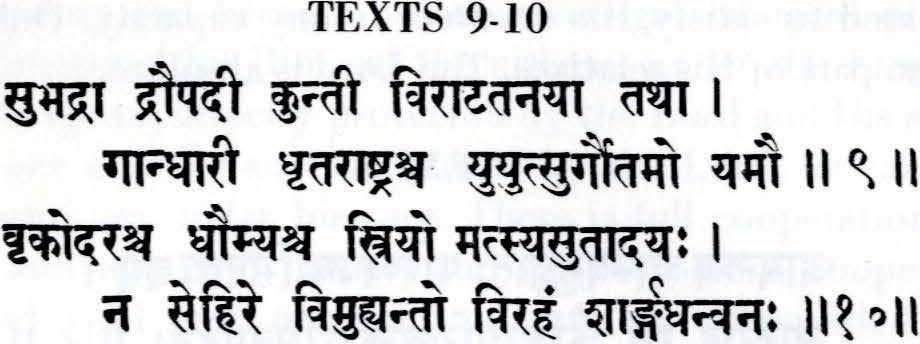
PURPORT
Lord Sri Kr�!la is so attractive for the living beings, especially for the devotees, that it is impossible for them to tolerate separation. The conditioned soul under the spell of illusory energy forgets the Lord, otherwise he cannot. The feeling of such separation cannot be described, but it can simply be imagined by devotees only. After His separationfrom Vrndavana from the innocent rural cowherd boys, girls, ladies and others, they all felt shock throughout their lives, and the separation of Radhariitii, the most
522
Srimad-Bhagavatam
[Canto l, Ch_ 10
beloved cowherd girl, is beyond expression. Once they met at Kuruk�etra during a solar eclipse, and the feeling which was expressed by them is heartrending. There is, of course, a difference in the qualities of the transcendental devotees of the Lord, but none of them who have ever contacted the Lord by directcommunion or otherwise can leave Him for a moment. Thatis the attitude of thepure devotee.
II����
satsahgiin mukta-duftsango
hiiturh notsahate budhaft kirtyamiinarh yaso yasya sakrd iikar[lya rocanam tasmin nyasta dhiyaft piirthiift

saheran viraharh katham darsana-sparsa-sarhliipasayanasana-bhojanaift
satsangiit-by association of pure devotees; mukta-duftsangaft - freed from bad materialistic association; hiitum-to give up; na utsahate-never attempts; budhaft-one who has understood the Lord; kirtyamiinamglorifying; yasaft- fame; yasya-whose; sakrt-once only; iikarrya-hearing only; rocanam- pleasing; tasmin-unto Him; nyasta-dhiyaft-one who has given up his mind unto Him; piirthiift-the sons of Prthii; saheran-can tolerate; viraham-separation; katham-how; dar5ana-seeing eye to eye; sparsa-touching ; sarhliipa-conversing ; sayana-sleeping ; iisana-sitting ; bhojanaift- diningtogether.
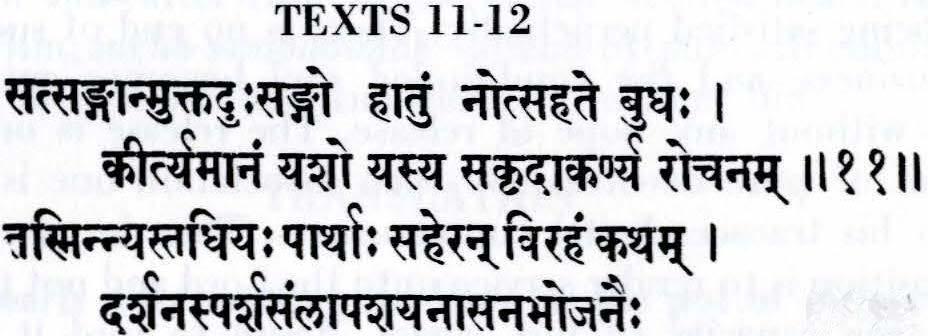
TRANSLATION
The intelligent, who have understood the Supreme Lord in association with pure devotees and have become freed from bad materialistic association, can never avoid hearing the glories of the Lord, even though they have heard them only once. How, then, could the Pii!l�avas tolerate His separation, for they had been intimately associated with His person, seeing Him eye to eye, touching Him, conversing with Him, and sleeping, sitting and dining with Him?
Texts 11-12] Departure of Lord Kr�r.ta for Dvaraka 523
The living being's constitutional position is one of serving a superior. He is obliged to serve by force the dictates of illusory material energy in different phases of sense gratification. And in serving the senses he is never tired. Even though he may be tired, the illusory energy forces him to do so without being satisfied perpetually. There is no end of such sense gratificatory business, and the conditioned soul becomes entangled in such servitude without any hope of release. The release is only effected by association of pure devotees. By such association one is gradually promoted to his transcendental consciousness. Thus he can know that his eternal position is to render service unto the Lord and not to the perverted senses in the capacity of lust, anger desire to lord it over, etc. The material society, friendship and love all are different phases of lust. Home, country, family, society, wealth and all sorts of corollaries are all causes of bondage in the material world where the threefold miseries of life are concomitant factors. By associating with pure devotees and by hearing them submissively, attachment for material enjoyment becomes slackened, and attraction for hearing about the transcendental activities of the Lord becomes prominent. Once they are, they will go on progressively without stoppage, like fire in gunpowder. It is said that Hari, the Personality of Godhead, is so transcendentally attractive that even those who are self-satisfied by self-realization and are factually liberated from all material bondage also become devotees of the Lord. Under the circumstances it is easily understood what must have been the position of the Patt9avas, who were constant companions of the Lord. They could not even think of separation from Sri Kr�r;ta because the attraction was more intense for them because of continuous personal contact. His remembrance by His form, quality, name fame, pastimes, etc., is also attractive for the pure devotee, so much so that he forgets all forms, quality, name, fame and activities of the mundane world, and due to his mature association with pure devotees he is not out of contact 'vith the Lord for a moment.

524 Srimad-Bhagavatam [Canto l, Ch. 10
PURPORT
� ��fi\�-���: I �: �«1144:1 M��(a"31 � � II��II
TEXT 13
sarve te'nim4air ak�ais
tam anu druta-cetasa�
vik�anta� sneha-sambaddhii
vicelus tatra tatra ha
sarve-all; te-they; animi§a*-without twinkling of the eyes; ak§a*by the eye; tam anu-after Him; drta-cetasa�-melted heart; vik§anta[tlooking upon Him; sneha-sambaddhii�-bound by pure affection; viceluftbegan to move; tatra tatra-here and there; ha-so they did.
TRANSLATION
All their hearts were melting for Him on the pot of attraction. They looked at Him without blinking their eyes, and they moved hither and thither in perplexity.
PURPORT
J<r�rya is naturally attractive for all living beings because He is the chief eternal amongst all eternals. He alone is the maintainer of the many eternals. This is stated in the Kathopani§ad Veda, and thus one can obtain permanent peace and prosperity by revival of one's eternal relation with Him, now forgotten under the spell of miiyii or the illusory energy of the Lord. Once this relation is slightly revived, the conditioned soul at once becomes freed from the illusion of material energy and becomes mad after the association of the Lord. This association is made possible not only in personal contact with the Lord, but also by association of His name, fame, form and quality, and Srimad-Bhiigavatam trains the conditioned soul to this stage of perfection by submissive hearing from the pure devotee.
TEXT 14
��l\�#J&q1{1��oaqr(�� I

Text 14] Departure of Lord
Kr�r:ta for Dviiraka
525
�t€tl•ll<l'itl�'{fu�;rf�;f:II�'JII nyarundhann udgalad bii�pam autkartthyiid devaki-sute niryiity agiiriin no'bhadram iti syiid biindhava-striya�
nyarundhan-checking with great difficulty; udgalat-overflowing; bii�pam- tears; autka[tthyiit- because of great anxiety; devaki-sute-unto the son of Devaki; niryati- having come out;agariit-from the palace; naf!,not; abhadram-inauspiciousness ; iti-thus; syiit-may happen; bandhavarelative;striya[l.-ladies.
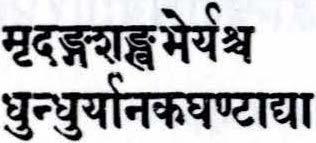


TRANSLATION
Thefemale relatives,whose eyes wereflooded withtears out of anxiety for Kr�!la, came out of the palace. They could only stop their tears with great difficulty. They feared that tears would cause misfortune at the time of departure.
PURPORT
There were hundreds of ladies in thepalace of Hastinapura. All of them were affectionate to Kr�!la. All of them were relatives also. When they saw that Kr�!la was going away from the palace for His native place, they were very anxious for Him, and as usual tears began to roll down their cheeks. They thought, at the same time, that tears at that moment might be a cause of misfortune for Kr�!la; therefore they wanted to check them. It was very difficult for them because they could not be checked. Therefore, they smeared their tears in their eyes, and their hearts throbbed. Therefore ladies who were the wives and daughters-in-law of those who died in the battlefield never came in direct contact with Kr��a. But all of them heard of Him and His great activities, and thus they thought of Him, talked of Him, His name, fame, etc., and thus they became affectionate also like those who were in direct contact. Therefore directly or indirectly anyone who thinks of Kr�!la, talks of Kr�!la or worships Kr�ra becomes attached to Him. Because Kr�!la is absolute, there is no difference between His name, form, quality, etc. Our intimate relation with Kr�!la can be confidentially revived by talking of, hearing of, or remembering Him. It is so done due to spiritual potency.
mrdanga-Sa.nkha-bheryas ca vi[la-pa[lava-gomukha�
dhundhury-iinaka-gha[l!iidyii nedur dundubhayas tatha
526 Srimad-Bhagavatam [Canto 1, Ch. 10
'!G]\����
4luuqo(lf.lin�crl: 1 ���?.JT II�� tl
TEXT 15
mrdanga-sweet sounding drum; sarikha - conchshell; bheryafl.- brass band; ca-and; viCtii-string band; parwva-a kind of flute; gomukhiifl.another flute; dhundhuri-another drum; iinaka-kettle; ghaCtta-beU; iidya{l.-others; nedu{l.-sounded ; dundubhaya{l.-other different types of drums; tathii-at that time.
TRANSLATION
While the Lord was departing from the palace of Hastinapura, different types of drums-like the mrdariga, dhole, nagra, dhundhuri and dundubhi -and flutes of different types, the vil)a, gomukha, and bheri, all sounded together to show Him honor.
TEXT 16
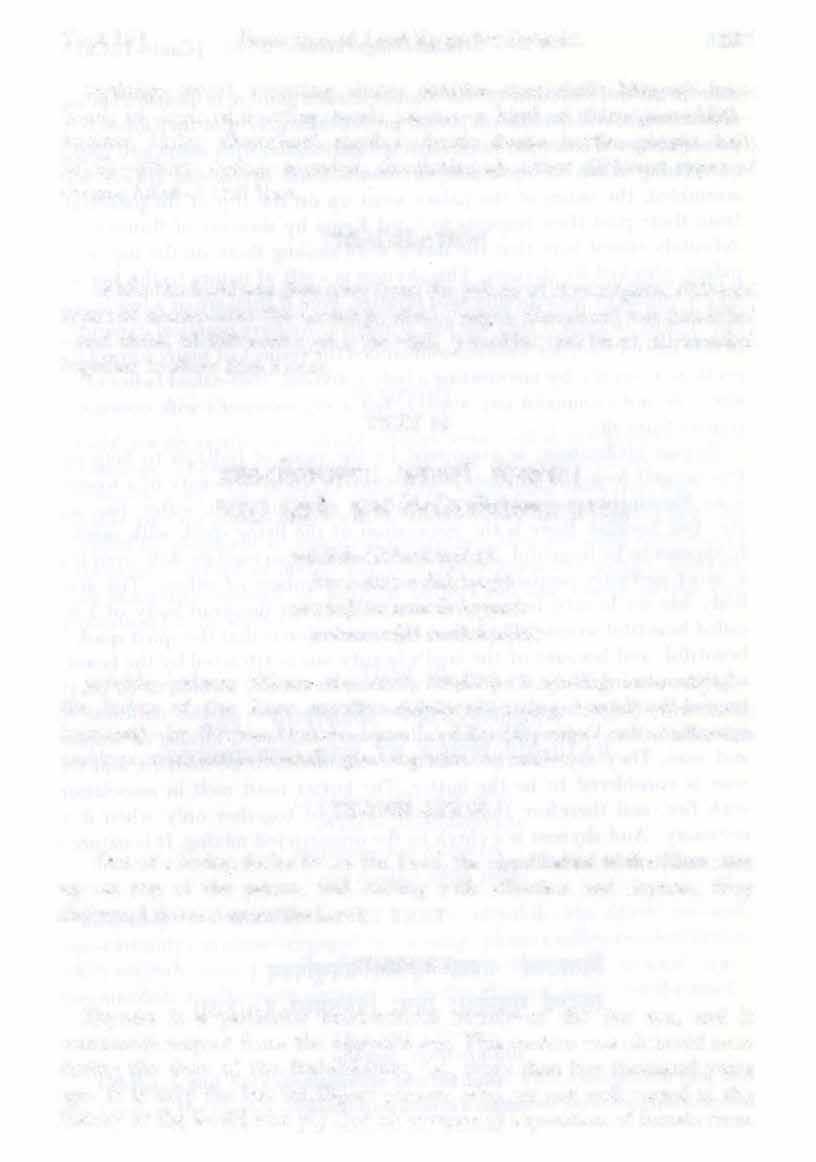
Slltcii(NRct{I�(AI:
priisiida- sikhariiriiflhiifl. kuru-niiryo didrk§ayii vavr§u{l. kusumai[l. k!§1J.Urit prema-vriflii-smitek§ariifl.
priisiida-palace; sikhara-the roof; ariiflhafl.- ascending; kuru-niirya{tthe ladies of the Kuru royalty; didrk�aya-seeing; vavnufl.-showered; kusumaift-by flowers; kr�TJ.am-upon Lord Kr�11a;prema-out of affection andlove; vri<}a-smi ta-ik�artaft -glancing with shy smiles.
TRANSLATION
Out of a loving desire to see the Lord, the royal ladies of the Kurus got up on top of the palace, and smiling with affection and shyness, they showered flowers upon the Lord.
PURPORT
Shyness is a particular extra-natural beauty of the fair sex, and it commands respect from the opposite sex. This custom was observed even during the days of the Mahiibhiirata, i.e., more than five thousand years ago. It is only the less intelligent persons who are not well versed in the history of the world who say that observance of separation offemale from
Text 16] Departure of Lord Kr�a for Dvaraka 527
I
��Tf��: ������
���141 ��
t{n: �: �
male is an introduction of the Mohammedan period in India. This incidence fTom the Mahiibhiirata period proves definitely that the ladies of the palace observed strict purdah (restricted association with men), and instead of coming down in the open air where Lord Kr�ra and others were assembled, the ladies of the palace went up on the top of the palace and from there paid their respects to Lord Kr�!la by showers of flowers. It is definitely stated here that the ladies were smiling there on the top of the palace, checked by shyness. This shyness is a gift of nature to the fair sex, and it enhances their beauty and prestige, even if they are of a less important family or even if they are less attractive. We have practical experience of this fact. A sweeper woman commanded the respect of manyrespectable gentlemen simply by manifesting a lady's shyness. Half-naked ladies in the street do not command any respect, but a shy sweeper's wife commands respect from a]J.
Human civilization, as conceived by the sages of India, is to help one free himself from the clutches of illusion. The material beauty of a woman is an illusion because actually the body is made of earth, water, fire, air, etc. But because there is the association of the living spark with matter, it appears to be beautiful. No one is attracted by an earthen doll, even if it is most perfectly prepared to attract the attention of others. The dead body has no beauty because no one will accept the dead body of a socalled beautifulwoman. Therefore, the conclusion is that the spirit spark is beautiful, and because of the soul's beauty one is attracted by the beauty of the outward body. The Vedic wisdom, therefore, forbids us to be attracted by false beauty. But because we are now in the darkness of ignorance, the Vedic civilization allows very restricted mixing of woman and man. They say that the woman is considered to be the fire and the man is considered to be the butter. The butter must melt in association with fire, and therefore they may be brought together only when it is necessary. And shyness is a check to the unrestricted mixing. It is nature's gift, and it must be utilized.

528 Srimad-Bhiigavatam [Canto I, Ch. 10
TEXT 17 ftHuttq;f �� ��� I � g�: fSr:r: fsttttt'i� � IIZ\91I sitatapatrarh jagriiha muktiidiima-vibhii§itam ratna-dar4am gu�iikesa� priya� priyatamasya ha
sita-atapa tram-soothingumbrella; jagraha- tookup; muktii-dama- decoratedwithlacesandpearls ; vibhu� itam- embroidered ; ratn a-dar{/am- witha handle of jewels; gw;liikesa[l. -Arjuna , the expert warrior, or one who has conquered sleep; priya[l.-mostbeloved; priyatamasya-of themostbeloved; ha-so he did.
TRANSLATION
At that time Arjuna, the great warrior and conquerer of sleep, who is the intimate friend of the most beloved Supreme Lord, took up an umbrella which had a handle of jewels and was embroidered with lace and pearls.
PURPORT
Gold,jewels,pearls, and valuable stones were used in the luxurious royal ceremonies. They are all nature's gifts and are produced by the hills, oceans, etc., by the order of the Lord, when man does not waste his valuable time in producing unwanted things in the name of necessitie>;. By so-called development of industrial enterprises, they are using now pots of gutta-percha instead of metals like gold, silver, brass and copper. They are using margarine instead of purified butter, and one fourth of the city population has no shelter.
TEXT 18

�: ('tlf!tfifi�� �if 'ro{� I
Rtl4¥41CJ(: � � �: q� ����"
uddhava{l siityakis caiva vyajane paramiidbhute vikiryamiirwfl. kusumai reje madhu-pati[l. pathi
uddhavafi--a cousin-brother of Kr�t:ta's; siityakifi--His driver; ca-and; eva- certainly; vyajane-engaged in fanning; parama-adbhute-decorative; vik"ir yamarafi- -seated on scattered; kusumai-flowers all around; rejecommanded; madhu-patifi--master of Madhu (K[�f}.a); pathi- on the road.
TRANSLATION
Uddhava and Satyaki began to fan the Lord with a decorated fan, and the Lord, as the master of Madhu,seated on scattered flowers, commanded them along the road.
Text 18] Departure of Lord Kr�t:ta for Dviiraka 529
TEXT 19


a.Srnyantiis4a� satyiis tatra tatra dvijeritiif:, niinurnpiinurnpiisca nirguf!,asya gu[liitmanal;t
asrnyan ta-being heard; ii.si§aft-benediction; satyii�-all truths; tatrahere; tatra-there; dvija-iritiift-sounded by learned briihma[!,as; na-not; anurupa- befitting; anurilpiil;t-fitting; ca-also; nirguf!,asya-of the Absolute; gu[la-iitmana�-playing the role of a human being.
TRANSLATION
It was being heard here and there that the benedictions being paid to Kf��a were neither befitting nor unbefitting because they were all for the Absolute who was now playing the part of a human being.
PURPORT
At places there were sounds of Vedic benediction aiming at the Personality of Godhead Sri Krwa. The benedictions were fitting in the sense that the Lord was playing the part of a human being as if a cousin of Maharaja Yudhi�thira, but they were unfitting also because the Lord is absolute and has nothing to do with any kind of material relativities. He is nirgupa, or there are no material qualities in Him, but He is full of transcendental qualities. In the transcendental world there is nothing contradictory, whereas in the relative world everything has its opposite. In the relative world white is the opposite conception of black, but in the transcendental world th�re is no distinction between white and black. Therefore the sounds of benedictions uttered by the learned briihmapas here and there appear to be contradictory in relation with the Absolute Person, but when they are applied to the Absolute Person they lose all contradiction and become transcend�ntal. One example may clear this idea. Lord Sri Kr��a is sometimes described as a thief. He is very famous amongst His pure devotees as the .Makhan-Cora. He used to steal butter from the houses of neighbors at Vrndavana in His early age. Since then He is famous as a
530
Srimad-Bhagavatam
[Canto 1, Ch_ 10
thief. Butin spite of Hisbeingfamous as a thief, He is worshiped as a thief, whereas in the mundane world a thief is punished and is never praised. Being the Absolute Personality of Godhead, everything is applicable to Him, and still in spite of all contradictions Heis the Supreme Personality of Godhead.
TEXT 20
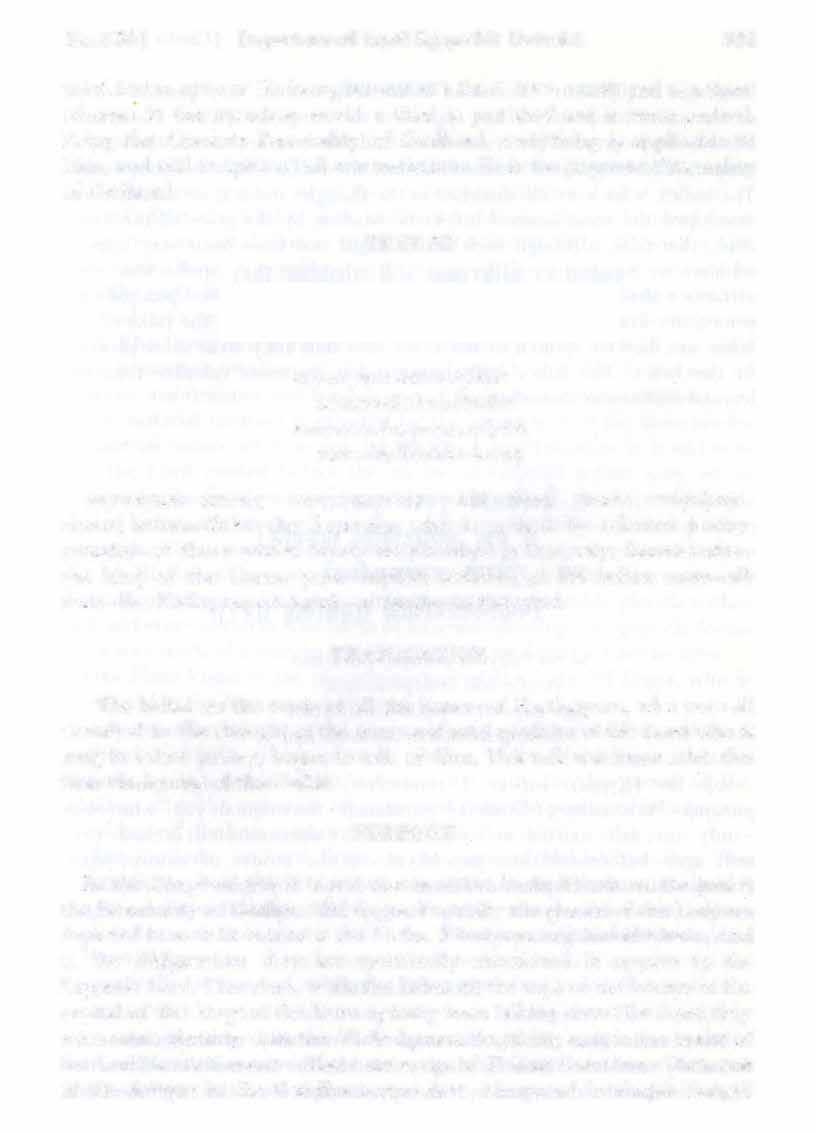
anyonyam iisit saiijalpa uttama-Sloka-cetasiim kauravendra-pura-strir-iim sarva-sruti-mano-hara�
anyonyam-among one another; asit-there were; sanjalpa�about; uttama-sloka-the Supreme, who is praised by selected poetry; cetasiim-of those whose hearts are absorbed in that way; kauravendrathe king of the Kurus; pura-capital; strir-iim-all the ladies; sarva-all; sruti-the Vedas; mana�-hara�-attractive to the mind.
TRANSLATION
The ladies on the roofs of all the houses of Hastinapura, who were all absorbed in the thought of the transcendental qualities of the Lord who is sung in select poetry, began to talk of Him. This talk was more attractive than the hymns of the Vedas.
PURPORT
In the Bhagavad-gitii it is said that in all the Vedic literatures the goal is the Personality of Godhead Sri Kr�!J.a. Factuallythe glories of the Lord are depicted in suchliteratureas the Vedas, Riimiiyar-a and Mahiibhiirata. And in the Bhiigavatam they are specifically mentioned in respect to the Supreme Lord. Therefore, whilethe ladies onthe tops of the houses in the capital of the kings of the Kuru dynasty weretalking aboutthe Lord they were more pleasing than the Vedic hymns. Anything sung in the praise of the Lord is Sruti-mantra. There are songs of Thakur Narottama Dasa, one of the iiciiryas in the Gau�ya-sampradaya, composed in simple Bengali

Text 20] Departure of Lord Kr�f.la for Dvaraka 531
language. But Thakur Visvanatha Cakravarti, another very learned iiciirya of the same sampradiiya, has approved the songs by Thakur arottama Dasa to be as good as Vedic mantras. And this is .so because of the subject matter. The language is immaterial, but the subject matter is important. The ladie , who were all absorbed in the thought and actions ofthe Lord, developed the consciousness of Vedic wisdom by the grace of the Lord. And, therefore, although such ladies might not have been ery learned scholar in Sanskrit or otherwise, still whatever they spoke was more attractive than the Vedic hymns. The Vedic hymns in the Upani§ads are sometimes indirectly directed to the Supreme Lord. But the talks of the ladies are directly spoken of the Lord, and thus they were morepleasing to the heart. The ladies' talks appeared to be more valuable than the learned briihmal}as' benedictions.
TEXT
sa vai kiliiyam puru§aft puriitano ya eka iisid avi.Se§a iitmani agre gur-ebhyo jagad-ii.tmaniSvare nimilitiitman niSi supta-sakti§u

saft-He (Kr�rya); vai- as I remember; kiln-definitely; ayam-this; puru�a[l- Personality of Godhead; puriitanaft-the original; yaft -who; ekaft -only one; iisit-existed; avise§ aQ.-materially unmanifested; iitmani-own self; agre- befor e creation; gur-ebhyaft-of the modes of nature; jagatii.tmani-unto the Supersoul; isvare-unto the Supr eme Lord; nimilitamerged into; iitman-the living entity; niSi supta-inactive at night; sakti�u-of the energies.


TRANSLATION
They said: Here He is, the original Personality of Godhead as we definitely remember Him. Healoneexistedbeforethemanifested creation ofthemodesofnature,andin Him only,because HeistheSupremeLord, all livingbeingsmerge,asifsleepingatnight,theirenergysuspended.
532 Srimad-Bhagavatam [Canto 1,Ch. 10
21
.....
� q �: � � �tfi �� 3W'IRI am glit•"lfl \1{�'f4T� f;rqTf�ijRijf?lf�
ijw.J�� II��II
PURPORT
There are two types.of dissolution of the manifestive cosmos. At the end of every 4,320,000,000 solar years, when Brahma, the lord of one particular universe, goes to sleep, there is one annihilation. And at the end of Brahma's life, which takes place at the end of Brahma's one hundred years of age, in our calculation at the end of 8,640,000,000 x 30 x 12 x 100 solar years, there is complete annihilation of the entire universe, and in both the periods both the material energy called the mahat-tattva and the marginal energy called jiva-tattva merge in the person of the Supreme Lord. The living beings remain asleep within the body of the Lord until there is another creation of the material world, and that is the way of creation, maintenance and annihilation of the material manifestation.
The material creation is effected by the interaction of the three modes of material nature set in action by the Lord, and therefore it is said here that the Lord existed before the modes of material nature were set in motion. In the Sruti mantra it is said that only Vi�p.u, the Supreme Lord, existed before the creation, and there were no Brahma or Siva and other demigods. Vi�p.u means the Maha-Vi�p.u who is lying on the Causal Ocean, and by His breathing only all the universes are generating in seeds and gradually developing into gigantic forms with innumerable planets within each and every universe. The seeds of universes develop into gigantic forms in the way seeds of a banyan tree develop into numberless banyan trees.
This 1aha-Viwu is the plenary portion of the Lord Sri Kr�p.a, who is mentioned in the Brahma-sarhhitii. as follows:
"Let me offer my respectful obeisances unto the original Personality of Godhead, Govinda, whose plenary portion is the Maha-Vi�tJ.U. All the Brahmas or the heads of the universes live only for the period of His exhaling, after the universes are generated from the pores of His transcendental body."(Brahma-sarhhita 5.58).

Thus Govinda, or Lord Kr�p.a, is the cause of Mahii-Vi�t�-u also. The ladies talking about this Vedic truth must have heard it from authoritative sources. An authoritative source is the only means of knowing about transcendental subject matter definitely. There is no other alternative.
The merging of the livingbeingsinto the body of Maha-Vi�!)utakes place automatically at the end of Brahmii's one hundred years. But that does not mean that the individual living being loses his identity. The identity is there, and as soon as there is another creation by the supreme will of the Lord, all the sleeping or inactive living beings are again let loose to begin their activities in the continuation of past different spheres of life. It is called suptotthita naya, or awakening from sleep and again engaging in
Text 21] Departure of Lord K:�':la for Dvaraka 533
one's respective continuous duty. When a man is asleep at night, he forgets himself, what he is, what his duty is and everything of his waking state. But as soon as he awakens from slumber, he remembers all that he has to do and thus engages himself again in his prescribed activities. The living beings also remain merged in the body of Maha-Vi�p.u during the period of annihilation, but as soon as there is another creation they arise to take up their unfinished work. This is also confirmed in the Bhagavad-gzta (8.18-20).
The Lord existed before the creative energy was set in action. The Lord is not a product of the material energy. His body is completely spiritual, and there is no difference between His body,and Himself. Before creation the Lord remained in Hi abode, which is absolute and one.
sa eva bhuyo nija-virya-coditiirh sva-jiva-miiyiirh prakrtirh sisrk§atim aniima-rupiitmani riipa-niimani vidhitsamiino'nusasiira siistra-krt
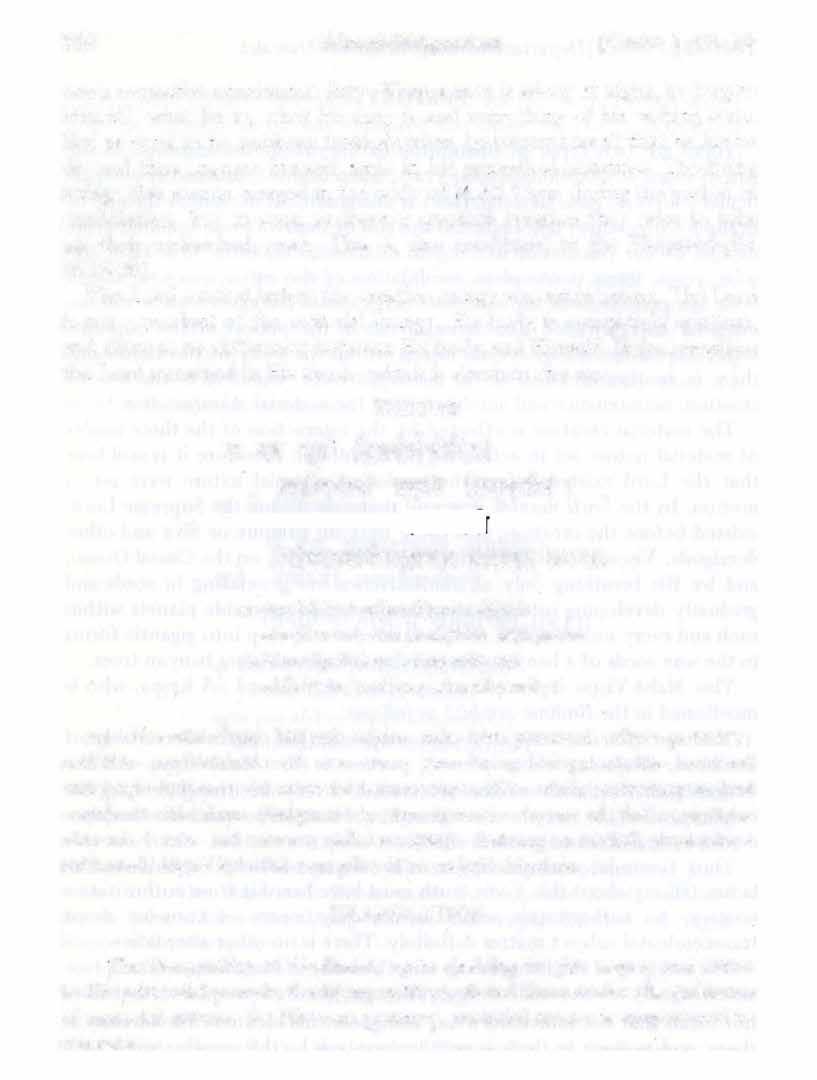
saft-He; eva-thus; bhuyaft-again; nija-own personal ; virya-potency; coditiim-performance of; sva-own; jiva-living being; miiyiim-external energy;prakrtim-unto material nature ; sisrk§atim-while recreating ; aniima -without mundane designation; riipa-iitmani- forms of the soul;riipanamani-forms and names; vidhitsamiinaft-desiring to award; anusasaraentrusted; siistra-krt-the compiler of revealed scripture.

TRANSLATION
The Personality of Godhead, again desiring to give names and forms to His parts and parcels, the living entities, placed them under the guidance of material nature. By His own potency, material nature is empowered to recreate.
534 Srimad-Bhagavatam [Canto 1, Ch_ 10
� � �t �W:f�� �� � �'P{_I �;ft F.ff�'ff;rts�!(H11(��II��II
TEXT 22
The living entities are parts and parcels of the Lord. They are of two varieties, namely the nitya-mukta and nitya-baddha. The nitya-muktas are eternallyliberated souls, and theyare eternallyengaged in the reciprocation of transcendental loving service with the Lord in His eternal abode beyond the manifested mundane creations. But the nitya-baddha or eternally conditioned souls are entrusted to His external energy, miiyii, for rectification of their rebellious attitude towards the Supreme Father. Nitya-baddhas are eternal!y forgetful of their relation with the Lord as parts and parcels. They are be,vildered by the illusory energy as products of matter and thus they are very busy in making plans in the material world for becoming happy. They go on merrily with plans, but by the ""ill of the Lord both the planmakers and the plans are annihilated at the end of a certain period, as above mentioned. This is confirmed in the Bhagavad-gitii as follows: "0 son of Kunti, when the period of a kalpa [the duration of the life of Brahma] is ended, all the living entities merge unto My nature, and again when the time of creation is ripe, I begin creation by the agency of My external energy." (Bg.
9.7)
The word bhiiya� indicates again and again, that is to say the process of creation, maintenance and annihilation is going on perpetually by the external energy of the Lord. He is the cause of everything. But the living beings who are constitutionally the parts and parcels of the Lord and are forgetful of the sweet relation, are given a chance again to get rid of the clutches of the external energy. And to revive his (the living being's) consciousness, the revealed scriptures are also created by the Lord. Vedic literatures are the guiding directions for the conditioned souls so they can get free from the repetition of creation and annihilation of the material world and the material body.
The Lord says in the Bhagavad-gitii, "This created world and material energy are under Mycontrol. Under the influence of prakrti, automatically they are created again and again, and this is done by Me through the agency of My external energy."
Actually the spiritual spark living entities have no material names or forms. But in order to fulfill their desire to lord it over the material energy of material forms and names, they are given a chance for such false enjoyment, and at the same time they are given a chance to understand the real position through the revealed scriptures. The foolish and
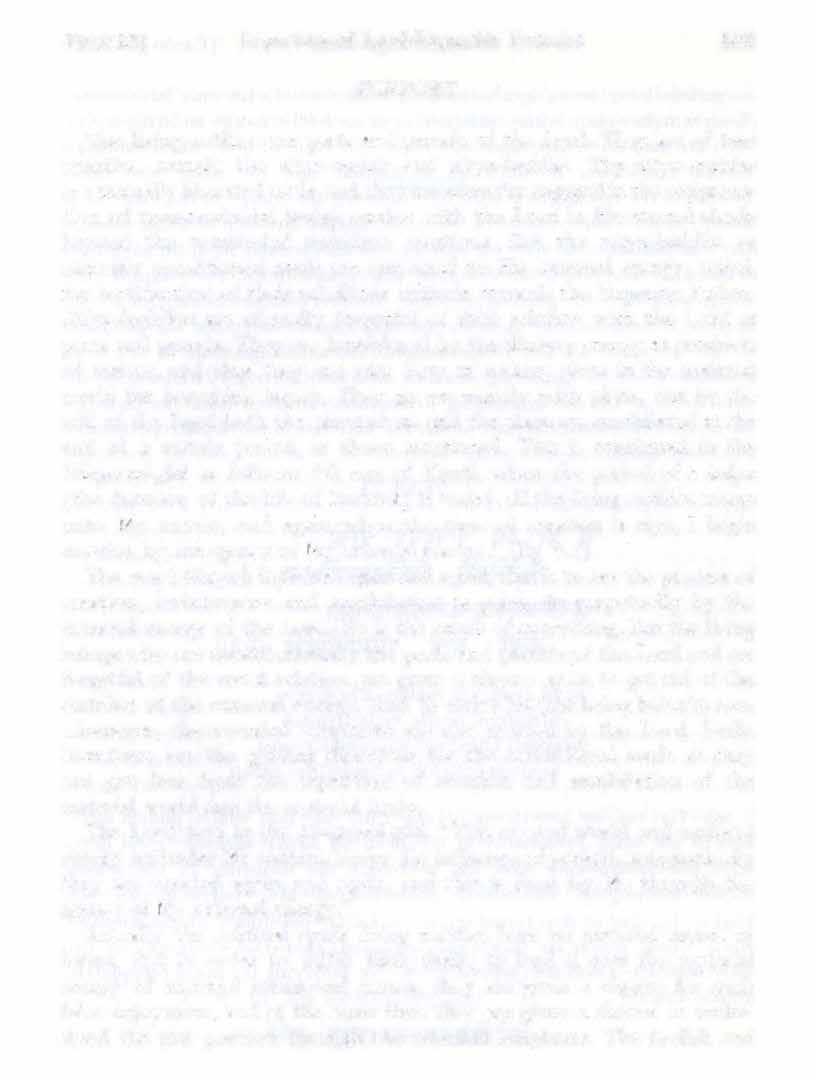
Text 22] Departure of Lord Kr�r:ta for Dvaraka 535
PURPORT
forgetful living being is always busy with false forms and false names. Modern nationalism is the culmination of suchfalse names and falseforms. Men are mad after false name and form. The form of body obtained under certain conditions is taken up as factual, and the name also taken bewilders the conditioned soul into misusing the energy in the name of so many "isms." The criptures, however, supply the clue of understanding the real position, but men are reluctant to take lessons from the scriptures created by the Lord for different places and times. For example, the Bhagavad-gitii is the guiding principle for every human being, but by the spell of material energy they do not take care to carry out the programs of life in terms of the Bhagavad-gitii. Srimad-Bhiigavatam is the postgraduate study of knowledge for one who has thoroughly understood the principles of the Bhagavad-gitii. Unfortunately they have no taste for them, and therefore they are under the clutches of miiyii for repetition of birth and death.
sa vii aymh yat padam atra siirayo jitendriyii nirjita-matarisvana/:1. pasyanti bhaktyut-kalitamaliitmanii

nanve§a sattvarh parimiir§tum arhati


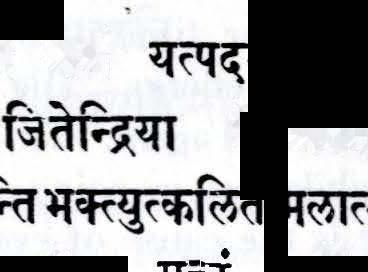
sal).-He; vai-by providence; ayam-this; yat-that which; padam atrahere is the same Personality of Godhead Sri Kf�l}a; siiraya[l-great devotees; jita-indriyii-one who has overcome the influence of the senses; nirjita-thoroughly controlled; miitarisvanaft-life; pasyanti-can see; bhakti-by dint of cJevotiona I service; utkalita-developed· amala-iitmanathose who e minds are th oroughly cleaned; nanu e�a?I-rerlainly by this only; sattvam-existence; parimiir§tum-for purifying the mind completely; arhati-deserve.


TRANSLATION
Here is the same Supreme Personality of Godhead whose transcendental form is experienced by the great devotees who are completely

536 Sr'imad-Bhagavatam [Canto 1, Ch. 10
� qy . "' 3F.[ ��q¢\'i"Jf mT R��'ffil'ft�: 1 �ijfr��l
l�¥t;n � «�ti qft'iJ\�� ������
TEXT 23
�;�r+ti!k��€fiR5ij
cleansed of material consciousness by dint of rigid devotional service and full control of life and the senses. And that is the only way to purify existence.



PURPORT
As it is stated in the Bhagavad-gitii, the Lord can be known in His real nature by dint of pure devotional service only. So it is stated here that only the great devotees of the Lord who are able to clear the mind of all material dusts by rigid devotional service can experience the Lord as He is. ]itendriya means one who has full control over the senses. The senses are active parts of the body, and their activities cannot be stopped. The artificial means of the yogic processes to make the senses inactive has proved to be abject failure, even in the case of great yogis like Visvamitra Muni. Visvamitra Muni controlled the senses by yogic trance, but when he happened to meet Menaka (a heavenly society woman), he became a victim of sex, and the artificial way of controlling the senses failed. But in the case of a-pure devotee, the senses are not at all artificially stopped from doing anything, but they are given different good engagements. When the senses are engaged in more attractive activities, there is no chance of their being attracted by any other inferior engagements. In the Bhagavadgitii it is said that the sensescan only be controlled by betterengagements. Devotional service necessitates purifying the senses or engaging them in the activities of devotional service. Devotional service is not inaction. Anything done in the service of the Lord becomes at once purified of its material nature. Material conception is due to ignorance only. There is nothing beyond Vasudeva. The Vasudeva conception gradually develops in the heart of the learned after a prolonged acceleration of the receptive organs. But the process ends in the knowledge of accepting Vasudeva as all in all. In the case of devotional service, this very same method is accepted from the very beginning, and by the grace of the Lord all factual knowledge becomes revealed in the heart of a devotee due to dictation by theLord from'vitlun. Thereforecontrolling thesensesbydevotionalservice is the only and easiest means.

Text 24] Departure of Lord Kr�r:ta for Dvaraka 537
TEXT 24 • '"' � tO 3R fu ��! =.:t ��n�fl£: 1 � 11:€fi �m iii��� ��l.t*i�Rr ;r ij� � 11��11
Srimad-Bhagavatam
sa va ayam sakhy-anugita-sat-katho . vede�u guhye§u ca gr...Lhyavadibhi.fi.
ya eka iso jagad-atma-lilaya
srjaty avaty atti na tatra sajjate
sa�-He; vai-also; ayam-this; sahhi-0 my friend; anugita-described; sat-katha�-the excellent pastimes; vede§u-in the Vedic literatures; guhye§u-confidentially; ca-as also; guhyava-iidibhi.fi.-by the confidential devotees; ya�-one who; eka�-one only; i'Sa�-the supreme controller; jagat-of the complete creation; iitma-Supersoul; lilaya-by manifestation of pastimes; s ,rjati-creates ; avati atti- also maintains and annihilates; nanever; tatra-there; sajjate-becomes attached to it.
TRANSLATION
0 dear friends, here is that very Personality of Godhead whose attractive and confidential pastimes are described in the confidential parts of Vedic literature by His great devotees. It is He only who creates, maintains and annihilates the material world and yet remains unaffected.
PURPORT
As it is stated in the Bhagavad-gitii, aU the Vedic literatures are glorifying the greatness of Lord Sri Kr�!la. Here it is confirmed in the Bhiigavatam also. The Vedas are expanded by many branches and subbranches by great devotees and empowered incarnations of the Lord like Vyasa, Narada, Sukadeva Gosvami, the Kumaras, Kapila, Prahlada, Janaka, Bali, Yamaraja, etc., but in the Srimad-Bhiigavatam especially, the confidential parts of His activities are described by the confidential devotee Sukadeva Gosvami. In the Vediinta-siitras or Upani§ads there is only hint of the confidential parts of His pastimes. In such Vedic literatures as the Upani§ads, etc., the Lord has expressively been distinguished from the mundane conception of His existence. His identity being fully spiritual, His form, name, quality, and paraphernalia, etc., have been elaborately distinguished from matter, and therefore He is sometimes misunderstood by less intelligent persons as impersonal. But factually He is the Supreme Person, Bhagavan, and He is partially represented as Paramatma or impersonal Brahman.

538
[Canto l, Ch. 10
TEXT 25 ....... �" ..... � � �� �'{T �m� ij� ft ij'�: �� 1
l¥1Fr �lfUT ��it �it II��II
yadii hy adharmerw tamo-dhiyo nrpii jivanti tatrai§a hi sattvata� kila
dhatte bhagam satyam rtam dayiim yaso bhaviiya riipiirti dadhad yuge yuge
yadii-whenever; hi-assured! ; adharmera-against the principles of God's will; tama�-dhiya/:L-persons in the lowest material modes; nrpa�kings and administrators;jivanti-live likeanimals; tatra-thereupon;e�a�He; hi-only; sattvata�-transcendental; hila-certainly; dhatte-is manifested; bhagam-supreme power; satyam-truth;rtam-positiveness; dayiim -mercy; yasa[l.- wonderful activities; bhaviiya-for the maintenance; riipii[ti-in various forms; dadhat-manifested; yuge-different periods; yuge- and ages.
TRANSLATION
Whenever there are kings and administrators living like animals in the lowest modes of existence, the Lord in His transcendental form manifests His supreme power, the Truth Positive, shows special mercy to the faithful, performs wonderful activities and manifests various transcendental forms as is necessary in different periods and ages.

PURPORT
Asmentioned above,the cosmic creationisthe property of theSupreme Lord. This is thebasicphilosophy of lsopani§ad: everythingis the property of the Supreme Being. No one should encroach uponthe property of the Supreme Lord. One should only accept what is kindly awarded by Him. Therefore,theearthor anyother planet or universe is theabsoluteproperty of the Lord. The living beings are certainly His parts and parcels or sons, and thus every one of them has a right to liveat the mercy of the Lord to execute his prescribed work. o one, therefore, can encroach upon the right of another individual man or animal without being so sanctioned by the Lord. The king or the administrator istherepresentative of theLord to look after the management of the Lord's will. He must therefore be a recognized person like Maharaja Yudhi�thira or Parik�it. Such kings have fullresponsibilityandknowledgefrom authoritiesaboutthe administration of the world. But at times, due to theinfluence of the ignorance mode of
Text 25]
� . . . �
Departure of Lord K[�l,la for Dvaraka
� lFT w�:p�q �1:1T �
539
material nature (tamo-gu[ta) or the lo\est of the material modes, kings andadministratorscomeinto power without knowledge andresponsibility, and such foolish administrators live like animals for the sake of their own personal interest. The result is that the whole atmosphere becomes surcharged with anarchy and vicious elements. Nepotism, bribery, cheating, aggres ion and,therefore, famine, epidemic, war and similar other disturbing features become prominPntin human society. And the devotees of the Lord or the faithfuls are persecuted by all means. All these symptoms indicate the time of an incarnation of the Lord to reestablish the principles of religion and to vanquish the maladministrators. This is also confirmed in the Bhagavad-gitii.


The Lord then appears in His transcendental form without any tinge of material qualities. He descends just to keep the state of His creation in a normalcondition_ The normal condition is that the Lord has provided each and every planet with aU the needs of the native living beings- They can happily live and execute their predestined occupations to attain salvation at the end, following the rules and regulations mentioned in the revealed scriptures. The material world is created to satisfy the whims of the nitya-baddha or everlasting conditioned souls, just as naughty boys are provided with pla ing cradles. Othen¥1 e there was no need of the matttrial world. But when they become intoxicated with the power of material science to exploit the resources unlawfully without the sanction of the Lord, and that also only for sense gratification, there is necessity of the Lord's incarnation tochastise the rebelliousand to protect thefaithful.
\\hen He descends, He exhibits superhuman acts just to prove His supreme right, and materialists like RavatJa, Hirapyakasipu, Kamsa, etc., are sufficiently punished. He acts in a manner which no one can imitate. For example, the Lord, when He appeared as Rama, bridged the Indian Ocean_ When He appeared as Kr§pa, from His very childhood He showed superhuman activities by killing Putana, Aghasura, Sakatasura, Kaliya, etc., and then His maternal uncle Kamsa. When He was at Dvaraka He married 16,108 queens, and all of them were blessed with a sufficient number of children. The sum total of His personal family members amounted to about 100,000, popularly known as the Yadu-vamsa. And again, during His lifetime, He managed to vanquish them all. He is famous as the Govardhanadhari Hari because He lifted at the age of only seven the hill known as Govardhana. The Lord killed many undesirable kings in His time, and as k§atriya He fought chivalrously. He is famous as the asamaurdha, unparalleled. Noone is equal to or greater than Him.
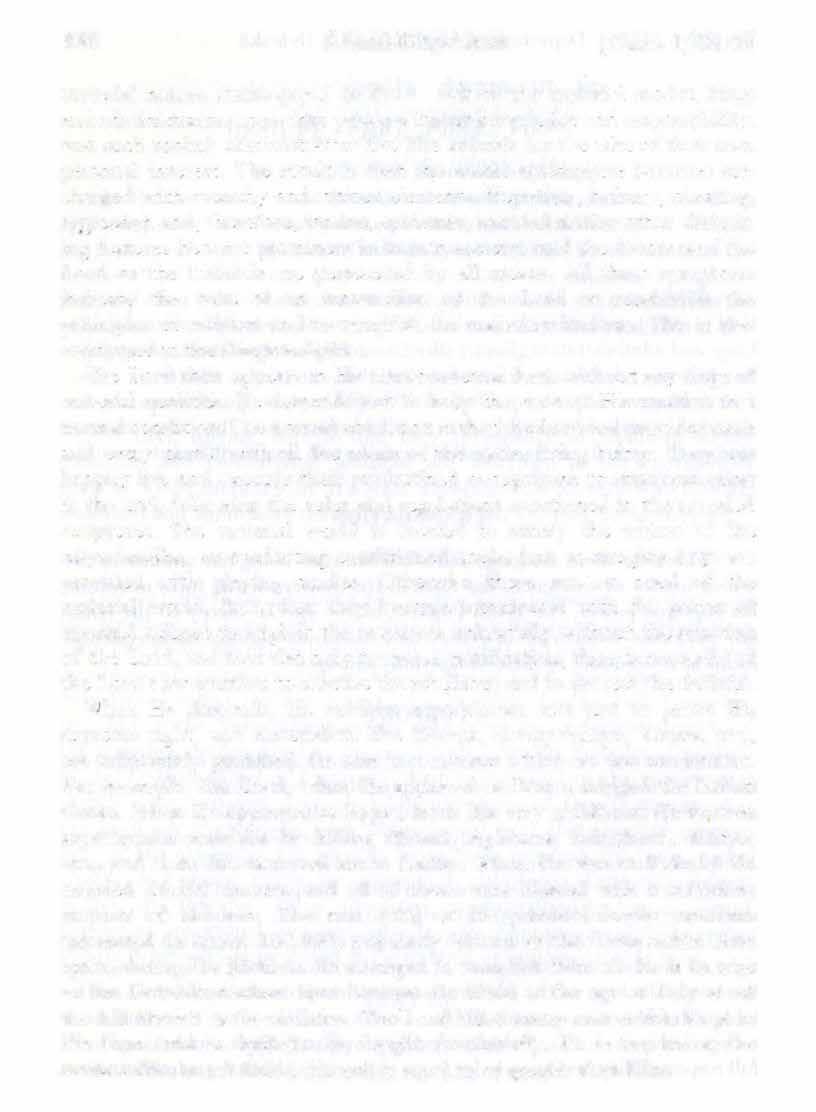
540 Srirnad-Bhagavatarn [ Canto I, Ch. 10
Departure of Lord Kr��a for Dvaraka
TEXT 26
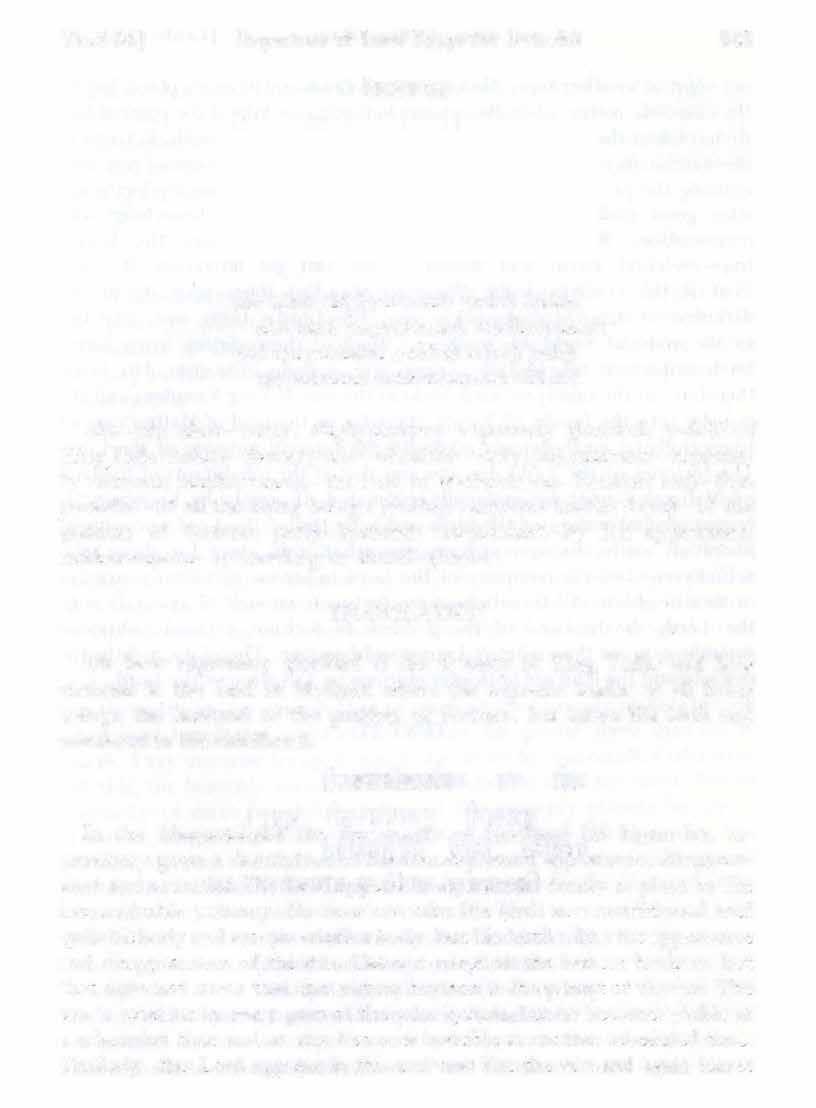
aho alarh sliighyatamarh yadoft kulam
aho alarh pUT;tyatammh madhoroanam yad e§a purhsiim rfiabhaft sriyaft patift
sva-janmanii cwikramar-ena ciiiicati
aho-oh; alam-verily; sliighyatamam-supremely glorified; yado[t-of J(jngYadu; kulam- dynasty;aho-oh;alam-verily;pu[tyatamam-supremely virtuous; madhoroanam-the land of Mathura; yat-because;esalJ,-this; purhsiim-of all the living beings; nabhaft-supreme leader; sriya[t-of the goddess of fortune; pati[1 -husband; sva-janmanii-by His appearance; cankramar-ena-by crawling; ca aiicati-glories.
TRANSLATION
Oh how supremely glorified is the dynasty of King Yadu, and how virtuous is the land of Mathura where the supreme leader of all living beings, the husband of the goddess of fortune, has taken His birth and wandered in His childhood.
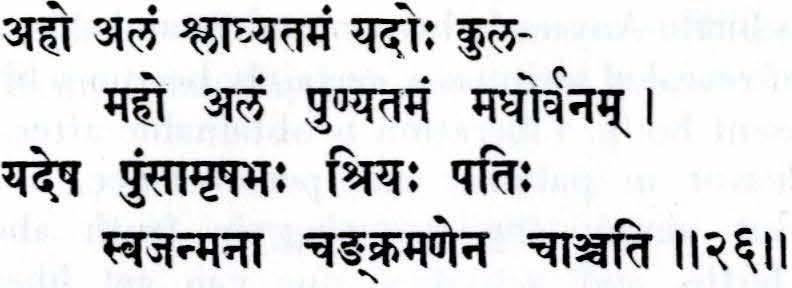
PURPORT
In the Bhagavad-gitii the Personality of Godhead Sri Kr�1.1a has expressively given a description of His transcendental appearanc e , disappe arance and activities. The Lord appears in a particular family or place by His inconceivable potency. He does not take His birth as a conditioned soul quits his bodyand acceptsanother body. But His birth is like the appearance and disappea rance of the sun. The sun arises on the eastern horizon, but that does not mean that the eastern horizon is the parent of the sun. Thesun is existent in every part of the solar system, but he becomes visible at a scheduled Lime and so also becomes invisible at another scheduled time. Similarly, the Lord appears in this univer e like the sun and again leaves
Text 26]
541
our sight at another time. He exists at all times and at every place, but by His causeless mercy when He appears before us we take it forgranted that He has taken His birth. Anyone who can understand this truth, in terms of the statementsof revealed scriptures, certainly becomes liberated just after quitting the present body. Liberation is obtainable after many births and after great endeavor in patience and perseverance, in knowledge and renuncJatiOI�. But simply by knowing in truth about the Lord's transcendental births and activities, one can get liberation at once. That is the verdict of the Bhagavad-gitii. But those who are in the darkness of ignorance conclude that the Lord's birth and activities in the material world are similar to those of the ordinary living being. Such imperfect conclusions cannot give anyone liberation. His birth, therefore, in the family of King Yadu as the son of King Vasude a and His transfer into the family of anda Maharaja in the land of fathura are all transcendental arrangements made by the internal potency of the Lord. The fortunes of the Yadu dynasty and that of the inhabitants of the land of 1athura cannot be materially estimated. If simply by knowing the transcendental nature of the birth and activities of the Lord one can get liberation easily, we can just imagine what is in store for those who actually enjoyed the company of the Lord in person as a family member or as a neighbor. All those who were fortunate enough to associate with the Lord, the husband of the goddess of fortune, certainly obtained something more than what is known as liberation. Therefore, rightly the dynasty and the land are both ever glorious by the grace of the Lord.
TEXT 27
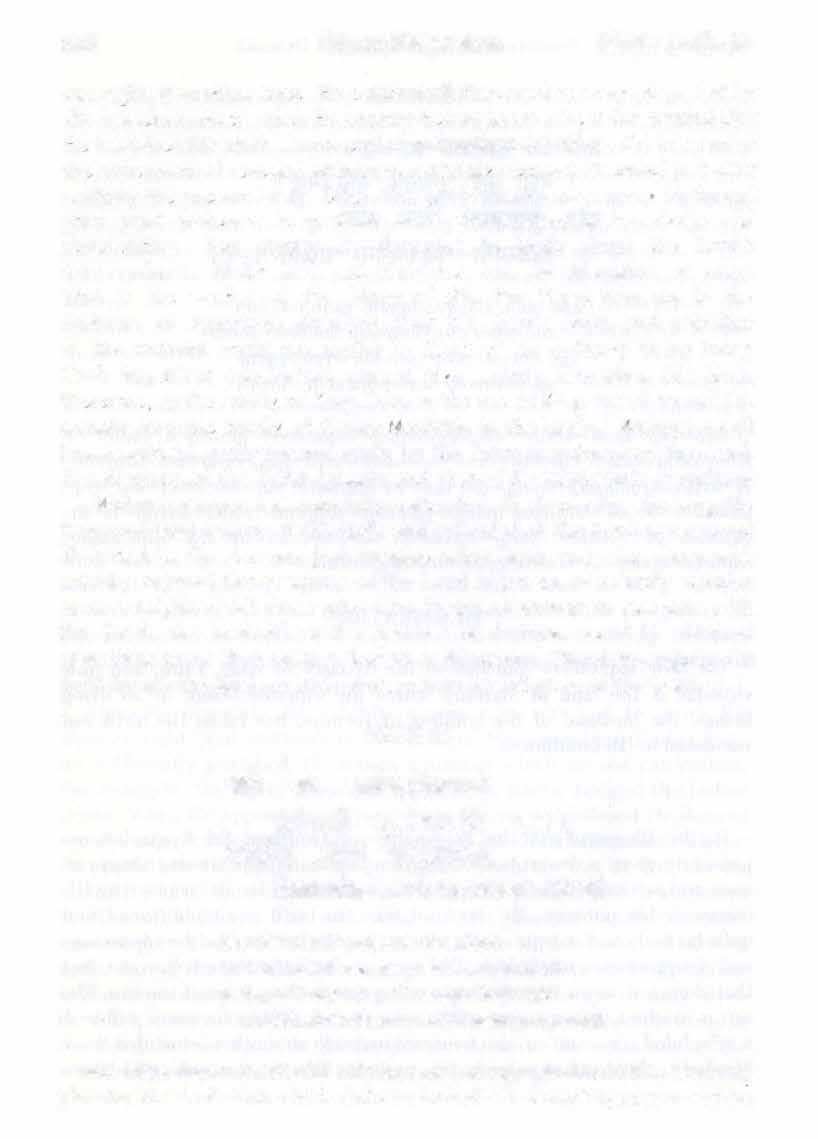
31it iffl
€4��1flf(ij(Wlt
m�u��lifi(<4'qfij- � �t: 11�\Sll


aho bata svar-yasasas tiraskari
kusasthali pupya yasaskari bhuvafl. pasyanti nityam yad anugrahe§itam
smitiivalokarh sva-patim sma yat-prajiifl.
aho bata-how wonderful this is; svar-yasasafl. -glories of the heavenly planets; tiraskari-that which defeats; kusas thali- Dvaraka ; pur1ya-virtue;
542 Sr'imad-Bhagavatam [Canto l, Ch. 10
�� ��
��'«[
�:1 q�tiRt �
yasask ari-famous; bhuvaft-the earth planet; pasyanti- see; nityamconstantly ; yat-that which; anugraha-i§itam-to bestow benediction; smita-avalokam -glance with the favor of sweet smiling ; sva-patim -unto the soul of the living being (Kr��Ja); sma-used to; yat-pra]a�-the inhabitants of the place.
TRANSLATION
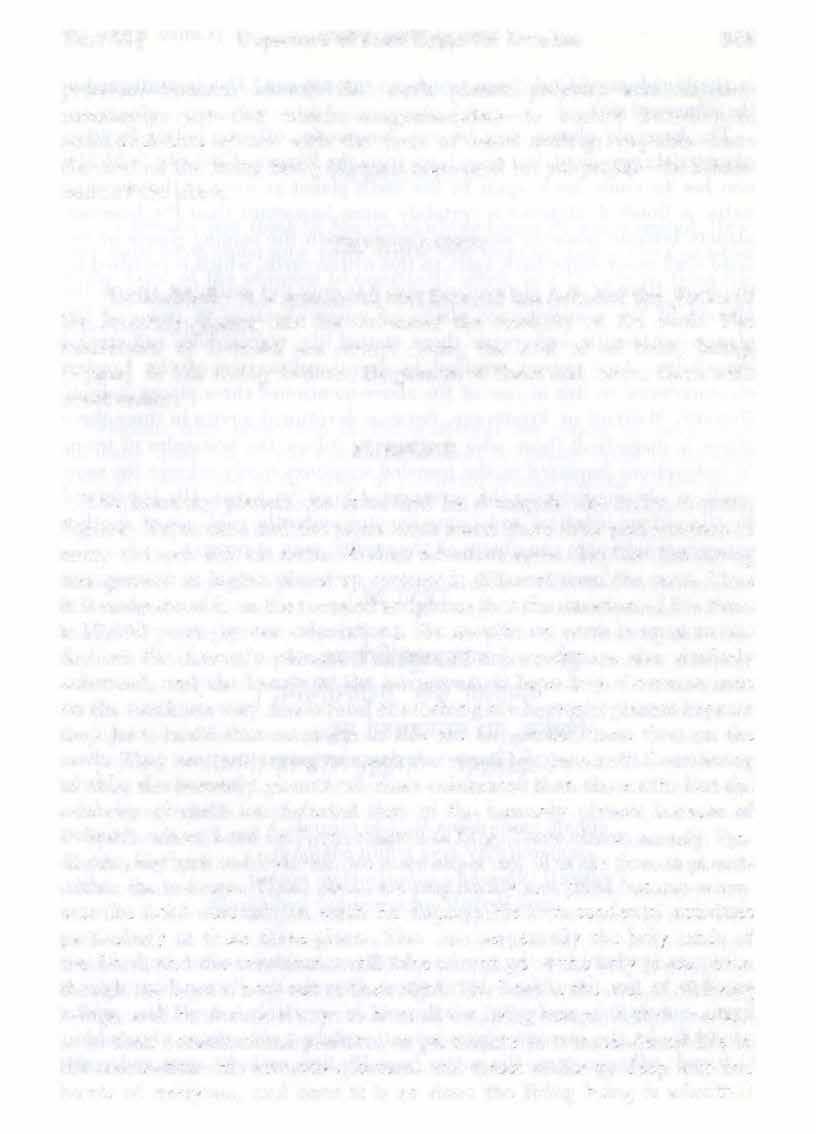
Undoubtedly it is wonderful that Dvaraka has defeated the glories of the heavenly planets and has enhanced the celebrity of the earth. The inhabitants of Dvaraka are always seeing the soul of all living beings [�·��a] in His loving feature. He glances at them and favors them with sweet smiles.
PURPORT
The heavenly planets are inhabited by demigods like Indra, Candra, Varupa, Vayu, etc., and the pious souls reach there after performance of many virtuous acts on earth. 1odern scientists agree also that the timing arrangement in higher planetary systems is different from the earth. Thus it is understood from the revealed scriptures that the duration of life there is 10,000 years (by our calculation). Six months on earth is equal to one day on the heavenly planets. Facilities of enjoyment are also similarly enhanced, and the beauty of the inhabitants is legendary. Common men on the earth are very much fond of reaching the heavenly planets because they have heard that comforts of life are far greater there than on the earth. They are now trying to reach the moon by spacecraft. Considering all this, the heavenly planets are more celebrated than the earth. But the celebrity of earth has defeated that of the heavenly planets because of Dvaraka, where Lord S ri Kr�l)a reigned as King. Three places, namely Vp1davana, Mathura and Dvaraka, are more important than the famousplanets within the universe. These places are perpeh1ally sanctified becau e whenever the Lord descends on earth He displays His lran cendental activities particularly in these three places. The are perpetually the holy lands of the Lord, and the inhabitants still take advantage of the holy places, even though the Lord is now out of their sight. The Lord is the soul of all living beings, and He desires always to have all the living beings, in their svarnpa, or in their constitutional position, to participate in transcendental life in His association. His attractive features and sweet smilt>s go deep into the hearts of everyone, and once it i so done the living being is admitted

Text 27] Departure of Lord Kr��a for Dvarkaa 543
in the kingdom of God, from which no one returns. This is confirmed in the Bhagavad-gitii.
The heavenly planets may be very famous for offering better facilities of malerial enjoyment, but as we learn from theBhagavad-gitii (Bg. 9.20-21), one has to come back again to the earth planet as soon as the acquired virtue is finished. Dvaraka is certainly more important than the heavenly planets because whoever has been favored with the smiling glance of the Lord shall never come back again to this rotten earth, which is certified by the Lord Himself as a place of misery. ot only this earth but also all the planets of the universes are places of misery because in none of the planets \vithin the universe is there eternal life, eternal bliss and eternal knowledge. Any person engaged in devotional service of the Lord is recommended to live in one of the above-mentioned three places, namely Dvaraka, Mathura or Vrndavana. Because devotional service in these three places is magnified, those who go there to follow the principles in terms of instructions imparted in the revealed scriptures surely achieve the same result as obtained during the presence of Lord Sri Kr�va. His abode and He Himself are identical, and a pure devotee under the guidance of another experienced devotee can obtain all the results, even at present.
TEXT28

�ijt � �tfurflr: I ��: ���
i�: �r:(�: ����II
nunam vrata-sniina-hutiidinesvara� samarcito hy asya grhita-pii[tibh* pibanti yii� sakhy-adhariimrtam muhur vraja-striyafi, sammumuhur yad-iisayii�
nunam-certainly in the previous birth; v ra ta-vow; sniina- bath; hulasacrifice in the fire; iidinii-by all these; iSvara�-the Personality of Godhead; samarcitafi,-perfectly worshiped; hi-certainly; asya- His; grhitapar:tibhifi,- by the married \vives; pibanti-relishes; yii�-those who; sahhi0 friend; adharamrtam-the nectar from His lips; muhufi,-again and again;
544 Srimad-Bhagavatam [Canto 1, Ch. 10
;@
i4�{ii•����Rit�:
vraja-s t riya"{!. ;-the damsels of Vrajahhiimi; sammu-muhu"{!.-often fainted; yat-asaya�-expecting to be favored in that way.

TRANSLATION

0 friends, just think of His wives whose hands He has accepted. How they must have undergone vows, baths, fire sacrifice and perfect worship of the Lord of the universe to constantly relish now the nectar from His lips [by kissing). The damsels of Vrajabhiimi would often faint by just expecting such favors.
PURPORT
Religious rites prescribed in the scriptures are meant to purify the mundane qualities of the conditioned souls to enable them to become gradually promoted to the stage of rendering transcendental service unto the Supreme Lord. Attainment of this stage of pure spiritual life is the highest perfection, and this stage is called svan"Lpa, or the factual identity of the living being. Liberation means to renovate this stage of svan"Lpa. In that perfect stage of svariipa, the living being i established in five phases of loving service, one of which is the stage of miidhurya-rasa, or the humor of conjugal love. The Lord is always perfect in Himself, and thus He has no hankering for Himself. He, however, becomes a master, a friend, a son or a husband to fulfill the intense love of the devotee concerned. Herein two classe of devotee of the Lord are mentioned in the stage of conjugal love. One is svakiyii, and the other is parakiyii. Both of them are in conjugal love with the Personality of Godhead Kf§J).a. The queens at Dvaraka were svakiyii, or duly married wives, but the damsels of the Vraja were young friends of the Lord while He was unmarried. The Lord stayed at Vrndavana till the age of sixteen, and His friendly relations with the neighboring girls were in terms of parakiyii. These girls, as well as the queens, underwent severe penances by taking vows, bathing and offering sacrifice in the fire, as prescribed in the scriptures. The rites, as they are, are not an end in themselves, nor are fruitive action, culture of knowledge or perfection in mystic powers ends in themselves. They a:re all means to attaintothe higheststageof svariipa torenderconstitutionaltranscendental ervice to the Lord. Each and every living being has his individual position in either of theabove-mentioned five differentkinds ofreciprocating means with the Lord, and in one's pure spiritual form of svariipa the relation
Text 28) Departure of Lord Kr�J.la for Dvaraka 545
becomes manifest without mundane affinity. The kissing of the Lord, either by His wi es or His young girl friends who aspired to have the Lord as their fiance, is not of any mundane perverted quality. Had uch things been mundane, a liberated soul like Sukadeva would not have taken the trouble to relish them, nor would Lord Sri Caitanya Mahaprabhu have been inclined to participate in those subjects after renouncing worldly life. The stage is earned after many lives of penance.
TEXT 29

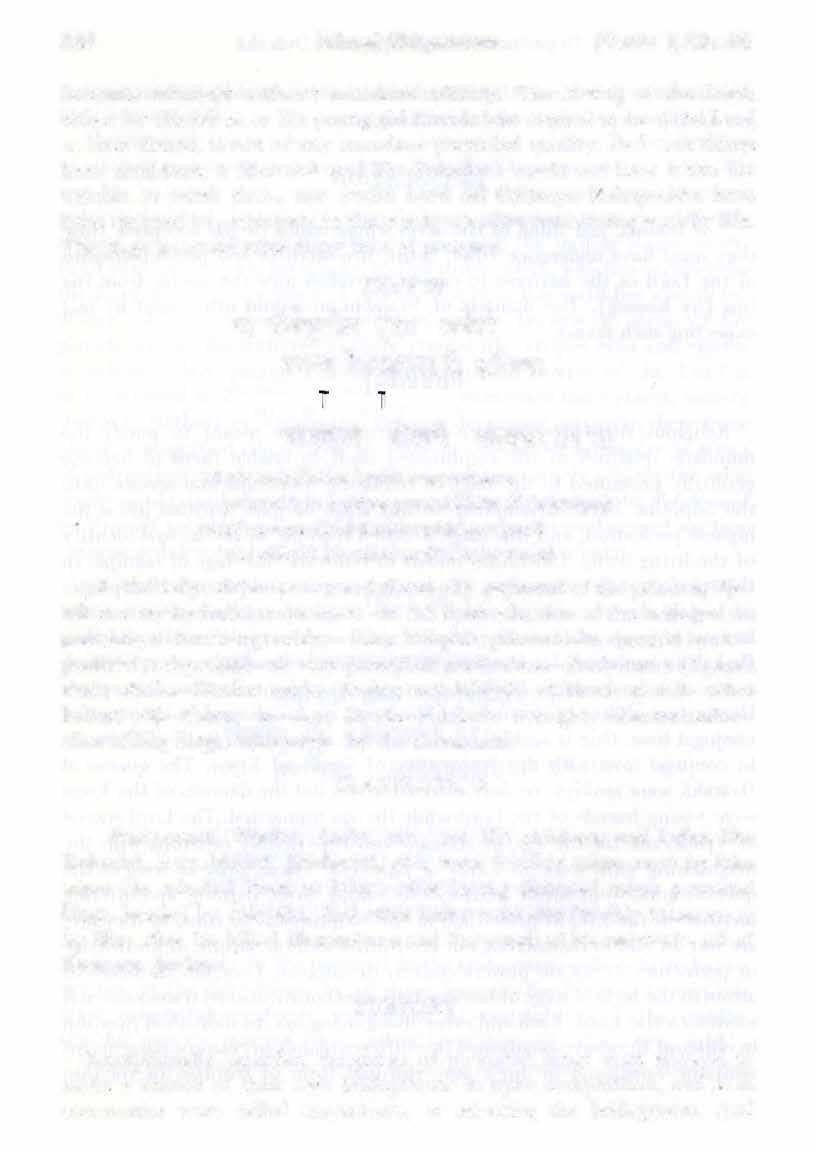
�����: �
� �: 11��11
yii virya-sulkena hrtii� svayarhvare pramathya caidya pramukhiin hi SU§mirw�
pradyumna-siimbiimba-sutiidayo 'parii yas cahrta bhauma-vadhe sahasrasalJ
yii-the lady; virya-prowess ; sulkena-by payment of the price; hrtii�taken awaybyforce; svayamvare-in the open selection of the bridegroom; pramathya-harassing; caidya-King Sisupala; pramukhan·-headed by; hipositively; SU§mirw�-all very powerful; pradyumna-Pradyumna (J<r�J).a's son); samba-Samba; amba-Amba; suta-iidaya�-cmldren; apariift-other ladies; yii�-those; ca-also; iihrta�-similarly brought; bhauma-vadheafter killing kings; sahasrasa�-by the thousands.

TRANSLATION
Pradyumna, Samba, Amba, etc., are His children, and ladies like Rukmi�i, Satyabhiima, Jambavati, etc., were forcibly taken away by Him when He selected them as brides after having defeated many powerful kings, headed by Sisupiila. And other ladies were also forcibly taken away by Him after He killed Bhaumasura and thousands of his assistants. All of them are glorious.


PURPORT
Exceptionally qualified daughters of powerful kings were allowed to make a choice of their own bridegrooms in open competition, and such ceremonies were called svayarhvara, or selecting the bridegroom. And
546 Srimad-Bhagavatam [Canto 1, Ch. 10
�'f��ttsta(ctl"{f{
��
W�ur: I
because it was open competition between the rival and valiant princes, such princes were invited by the fathers of the princess, and usually there were regular fights between the invited princely order in a sporting spirit, but it so happened that sometimes the belligerent princes were killed in such marriage-fighting, and the victorious prince was offered the trophy princess for whom so many princes died. Rukmir;Ji, the principal queen of Lord Kf�p.a, was the daughter of the King of Vidarbha, who wished that his qualified and beautiful daughter be given away to Lord Kr�pa. But her eldest brother wanted herto be given away to King Sisupala, who happened to be a cousin of Krwa. So there was open competition, and as usual Lord Kr�p.a emerged successful, after harassing Sisupala and other princes by His unrivalled prowess. Rukmi!)i had ten sons, like Pradyumna, etc. There were other queens also taken away by Lord Knpa in a similar way. Full description of this beautiful booty of Lord Kr�Q.a will be given in the Tenth Canto. There were 16,100 beautiful girls who were daughters of many kings and were forcibly stolen by Bhaumasura, who kept them captive for his carnal desire. These girls prayed piteously to Lord Kr�l)a for their deliverance, and called by their fervent prayer, the merciful Lord released them all by fighting and killing Bhaumasura. All these captive princesses were then accepted by the Lord as His wives, although in the estimation of society they were all fallen girls. The all-powerful Lord Kmta accepted the humble prayers of these girls and married them with the adoration of queens. So altogether Lord Krwa had 16,108 queens at Dvaraka, and in each of them He begot ten children. All these children grew up, and each had as many children as the father. The aggregate number of the family numbered 10,000,000.
TEXT 30
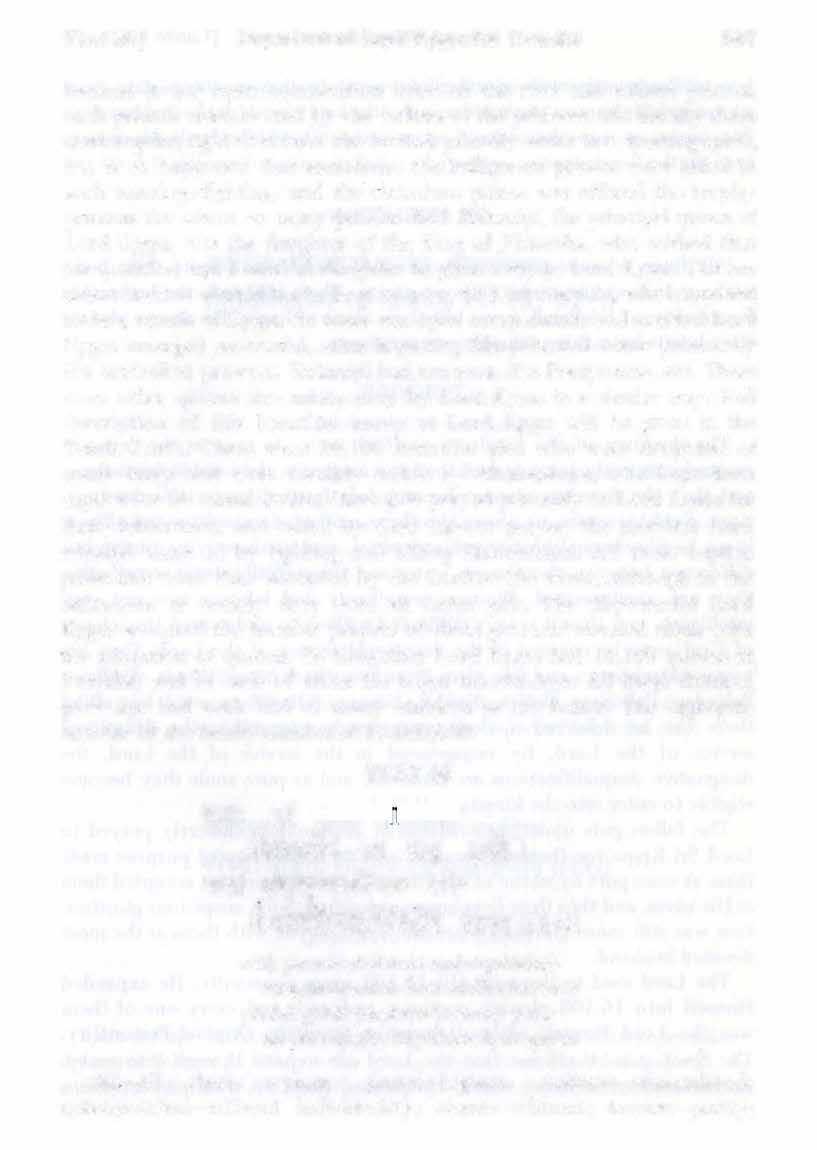
etii� param stritvam apiistapesalam nirasta-saucam bata siidhu kurvate yiisiim grhiit pu§kara-locana� patir na iiitv apaity iihrtibhir hrdi sprsan
etii�-all these women; param- highest; stritvam-womanhood; apiistapesalam-without individuality; nirasta-without; saucam- purity;



Text 30) Departure of Lord Kr�r:ta for Dvaraka 547
tm: � M(��� iRr ID'-l � I � •z(it:�J\4'.4"":-mr�:jf.�qt:tll(fffl'� � ll�oH
bata siidhu-auspiciously glorified; kurvate-do they make; yiisiim-from whose;grhiit-homes; pu§kara-locanafl.-the lotus-eyed;patif!.-husband;na jatu-never at any time; apaiti-goes away; ahrtibhifl.-by presentation; hrdi-in the heart;sprsan-endeared.
TRANSLATION
All these women auspiciously glorified their lives despite their being without individuality and without purity. Their husband, the lotus-eyed Personality of Godhead, never left them alone at home. He always pleased their hearts by making valuable presentations.
PURPORT
The devotees of the Lord are purified souls. As soon as the devotees surrender unto the lotus feet of the Lord sincerely, the Lord accepts them, and thus the devotees at once become free from all material contaminations. Such devotees are above the three modes of material nature. There is no bodily disqualification of a devotee, just as there is no qualitative difference between the Ganges water and the unfilthy drain water when they are amalgamated. Women, merchants and laborers are not very intelligent, and thus it is very difficult for them to understand the science of God or to be engaged in the devotional service of the Lord. They are more materialistic, and less than them are the Kiratas, Hupas, Andhras, Pulindas, Pulkasas, Ahhira, Kanka, Yavana, Khasadaya, etc., but all of them can be delivered if they are properly engaged in the devotional service of the Lord. By engagement in the service of the Lord, the designative disqualifications are removed, and as pure souls they become eligible to enter into the kingdom of God.
The fallen girls under the clutches of Bhaumasura sincerely prayed to Lord Sri K.fwa for their deliverance, and their sincerity of purpose made them at once pure by virh1e of devotion. The Lord therefore acceptedthem as His wives, and thus their lives became glorified.Such auspicious glorification was still more glorified when the Lord played with them as the most devoted husband.
The Lord used to live with His 16,108 wives constantly. He expanded Himself into 16,108 plenary portions, and each and every one of them was the Lord Himself without deviation from the Original Personality. The Smti mantra affirms that the Lord can expand Himself into many. As husband of so many wives, He pleased them all with presentations,
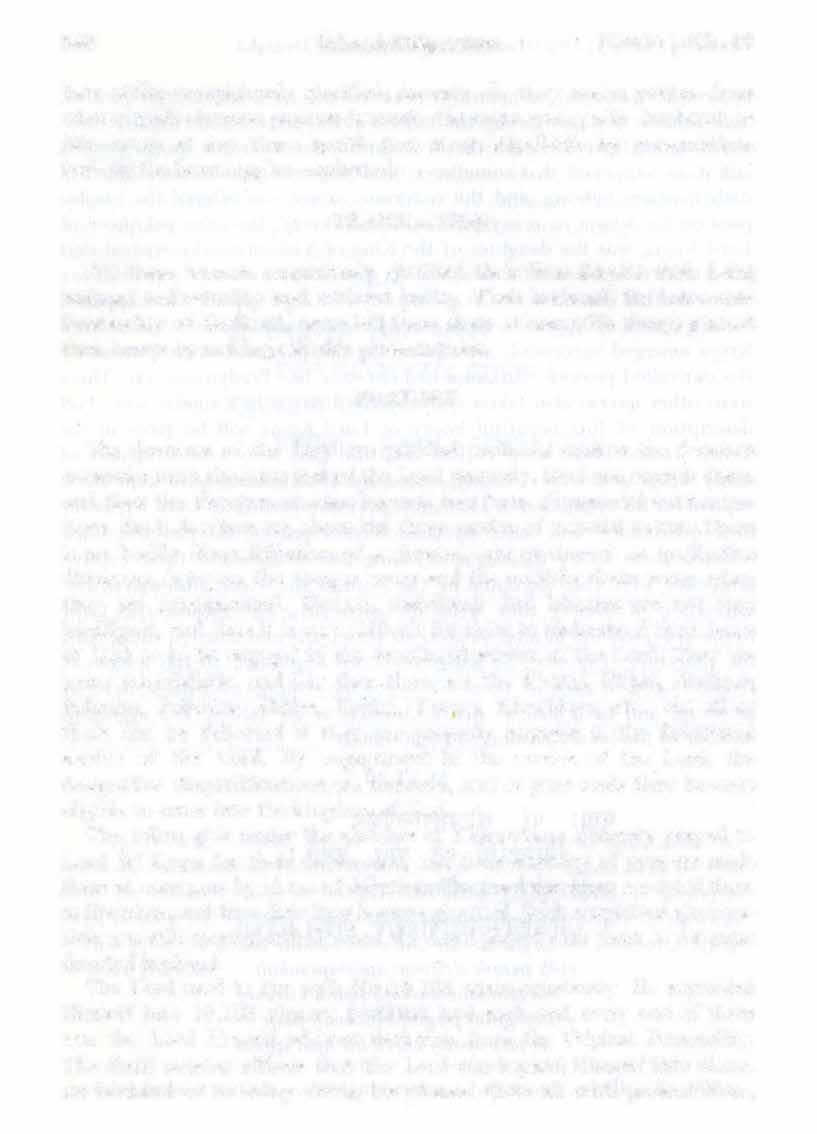
548 Srimad-Bhagavatam [Canto I, Ch. 10
even at a costly endeavor. He brought the piirijiita plant from heaven and implanted it at the palace of Satyabhama, one of the principal queens. If, therefore, anyone desires the Lord to become one's husband, the Lordfulfills such desires in full.
TEXTiH
�� �ffl;rt � f�: F-JT� 1
f.:R�(if��Wi triT m: II��II
evarhvidhii gadantiniirh sa giraft purayo§itiim nirik§arzeniibhinandan sa-smitena yayau harift
evarhvidhiift-in this way; gadantiniim-thus praying and talking about Him; saft-He (the Lord); girafi,-of words; purayo§itiim-of the ladies of the capital; nin1t§arzena- by His grace of glancing overthem; abhinandanand greeting them; sa-smitena-with a smiling face; yayau-departed; harift -the Personality of Godhead.
TRANSLATION
While the ladies of the capital of Hastinapura were greeting Him and talking in this way, the Lord, smiling, accepted their good greetings, and casting the grace of His glance over them, He departed from the city.
TEXT 32

��: 'l� •ftt{hlll{ ��:I
�:�:�(ldll@!�d(fi\'��fh(II��II
ajiita-satrufi. prtaniirh gopithiiya madhu-dvi§a[l parebhyaft sankitaft snehiit priiyunkta catur-angirzim
ajiita-satrufi.-Maharaja Yudhif?thira, who was no one's enemy;prtaniimdefensive forces; gopithiiya-for giving protection; madhu-dvi§aft-of the enemy of Madhu (Sri Kr�f.la);parebhyafi,-from others (enemies); sankitaft
Text 32] Departure of Lord Kr�f.la for Dvaraka 549
-being afraid of; snehiit-out of affection; priiyunkta-engaged; caturangir-""im-four defensive divisions.
TRANSLATION
Maharaja YudhiHhira, although no one's enemy, engaged four divisions of defense [horse, elephant, chariot.and army] to accompany Lord Kr�!la, the enemy of the asuras [demons]. The Maharaja did this because of the enemy, and also out of affection for the Lord.
PURPORT
1atural defensive measures are horses and elephants combined with chariots and men. Horses and elephants are trained to move to any part of the hills or forests or plains. The charioteers could fight with many horses and elephants by the strength of powerful arrows, even up to the standard of the brahmiistra (similar to modern atomic weapons). l\'laharaja Yudhi�thira knew well that Kr�!la is everyone's friend and well-wisher, and yet there were asuras who were by nature envious of the Lord. So out of fear of attack from others and out of affection also, he engaged all varieties of defensive forces as bodyguards of Lord Kr�!la. If required, Lord Kr�!la Himself was sufficient to defend Himself from the attack of others who counted the Lord as their enemy, but still He accepted all the arrangements made by Maharaja Yudhighirabecause He could not disobey the King, who was His elder cousin. The Lord plays the part of a subordinate in His transcendental sporting, and thus sometimes He puts Himself in the care of Yasodamata for His protection in His so-called helplessness of childhood. That is the transcendental lilii or pastime of the Lord. The basic principle for aU transcendental exchanges between the Lord and His devotees is exhibited to enjoy a transcendental bliss for which there is no comparison, even up to the level of brahmiinanda.
TEXT 33


3N <(•••ij•ttm:��rmt� , ijf;t�J"d�stt�l&4wt•tffftA: II��II
atha duriigatiin sauri�
kauraviin virahiituriin
sannivartya dglham snigdhiin
p,.q.yat sva-nagarirh priya*
atha-thus; duriigatiin-having accompanied Him for a long distance; sauri!t-Lord Krflqa; kauraviin-the Pal)«;lavas; virahiituriin-overwhelmed
550 Srimad-Bhagavatam [Canto l, Ch. 10
by a sense of separation; sannivartya-politely persuaded; dnlhamdetermined; snigdhiin-full of affection;priiyiit-proceeded; sva-nagarimtowards His own city (Dvaraka);priyai{l-with dear companions.
TRANSLATION
Out of profound affection for Lord Kr��a, the Pa��avas, who were of the Kuru dynasty, accompanied Him a considerable distance to see Him off. They were overwhelmed with the thought of future separation. The Lord, however, persuaded them to return home, and He proceeded towards Dvaraka with His dear companions.
TEXTS 34-35
kuru-jiingala-piinciiliin siiraseniin sa-yiimuniin brahmiivartarh kuruk§etrarh
matsyiin siirasvatiin atha maru-dhanvam atikramya
sauviriibhirayo{l pariin iinartiin bhiirgavopiigiic
chriintaviiho maniig vibhu{l
kuru-jiingala-the province of Delhi; piinciiliin-part of the province Panjab; suraseniin-part of the province of Uttar Pradesh; sa{l.-with; yiimuniin-the districts on the bank of the Yamuna;brahmiivartam-part of northern Uttar Pradesh; kuruk§etram-the place where the battle was fought; matsyiin-the province Matsya;siirasvatiin-part of Punjab;atkaand so on;maru- Rajasthan,the land of deserts;dhanvam- Madhya Pradesh, where water is very scanty;atikramya-after passing;sauvira-Saurastra; abh"irayo{l-part of Gujurat; pariin-western side;anartan-the province of Dvaraka; bhiirgava-0 Saunaka; upiigiit-overtaken by; sriinta-fatigue; viiha{l-the horses;manak vibhu{l-slightly, because of the long journey.

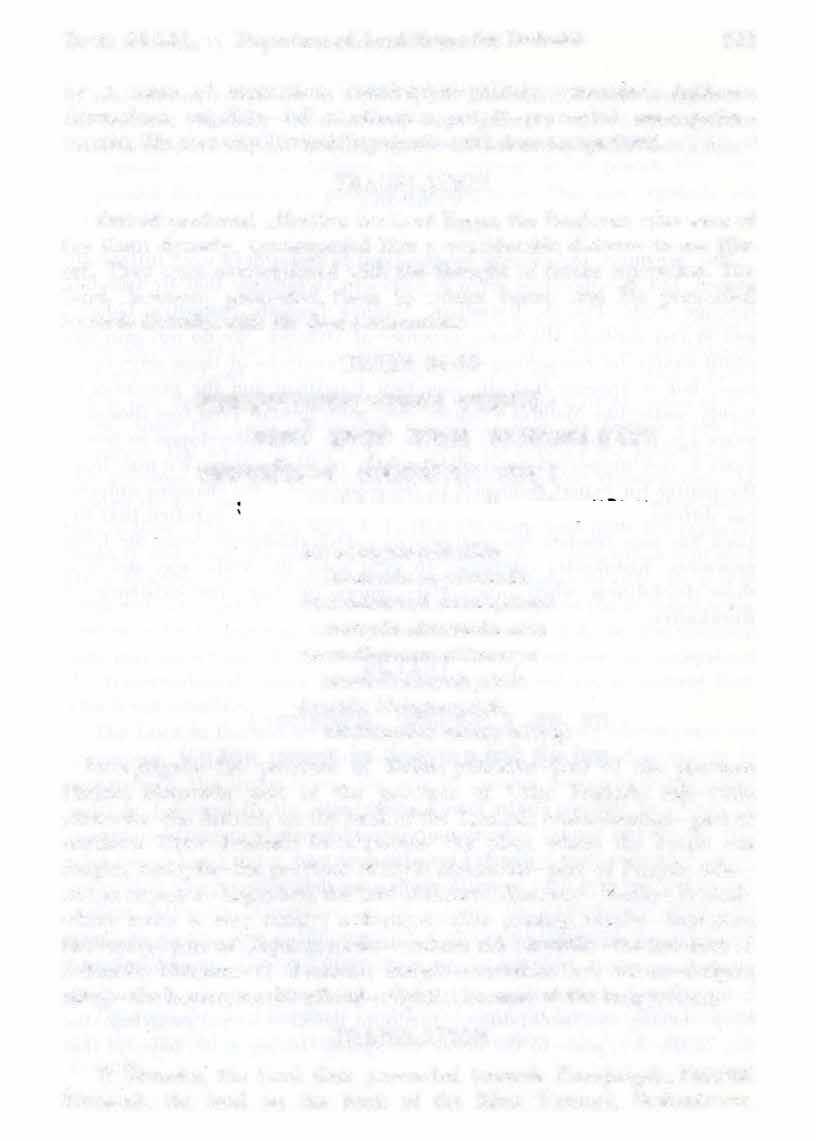
TRANSLATION
0 Saunaka, the Lord then proceeded towards Kurujangala, Paiicala, Surasena, the land on the bank of the River Yamuna, Brahmavarta,

Texts 34-35] Departure of Lord Kr�r:ta for Dvaraka 551
� � *IH� 11�\?11 �rit+�Rtst�i<4 m�rwiroit: '«f.{1 l::'"\ "'+tWill,...�:II��II
t�lfi'eql�meW11'{(14iijW11'{I qmf
Kuruk�etra, Matsya, Sarasvata, the province of the desert and the land of scanty water. After crossing these provinces He gradually reached the Sauvira and Ahhira provinces, then west of these, reached Dviiraka at last.
PURPORT
The provinces passed over by the Lord in those days were differently named, but the direction given is sufficient to indicate that He travelled through Delhi, Punjab, Rajasthan, Madhya Pradesh, Saurastra, Gujarat and at last reached His home province at Dvaraka. We do not gain any profit simply by researching the analogous provinces of those days up to now, hut it appears that the desert of Rajasthan and the provinces of scanty water like Madhya Pradesh, etc., were present even five thousand years ago. The theory of soil experts that the desert developed in recent years i not supported by the statements of Bhiigavatam. We may leave the matter for expert geologists to research because the changing universe has different phases of geological development. We are satisfied that the Lord has now reached His own province, Dvarakadhama, from the Kuru provinces. Kumk�etra continues to exist since the Vedic age, and it is sheer foolishness when interpreters ignore or deny the existence of Kuruk;;etra.
TEXT
I ��mtq�� tlf �� ����II
tatra tatra ha tatratyair haril;t pratyudyatiirhar-alJ
siiyarh bheje diSarh pasciid gavi§tho gam galas tadii
tatra tatru -at different places; ha-it so happened; tatratyail;t-by local inhabitants; haril;t-the Personality of Godhead; pratyudyata-arhar-alJbeing offered presentations and worshipful regards; sayam- the evening; bheje-having overtaken; diSam-direction; pasciit-eastern ; g,.,i§thal;t-the sun in the sky; giim-to the ocean side; gatalJ-having gone; tadii-at that time.

552 Srimad-Bhagavatam [Canto 1, Ch. 10
<:' � � � ij*��H: *fi?.tijJ�I:
36 .�(,<;'"'
On His journey through these provinces He was welcomed, worshiped and given various presentations. In the evening, in all places, the Lord suspended His journey to perform evening rites. This was regularly observed after sunset.
PURPORT
It is said here that the Lord observed the religious principles regularly while He was on the j ourney. There are certain philosophical speculations that even the Lord is under the obligations of fruitive action. But actually this is not the case. He does not depend on the action of any good or bad work. Since the Lord is absolute, everything done by Him is good for everyone. But when He descends on earth, He acts for the protection of the devotees and for the annihilation of the impious nondevotees. Although He has no obligatory duty, still He does everything so lhat others may follow. That is the way of factual teaching; one must act properly Himself and teach the same to others, otherwise no one will accept such blind teaching. He is Himself the awarder of fruitive results. He is selfsufficient, and yet He acts according to the rulings of the revealed scripture in order to teach us the process. If He does not do so, the common man may go wrong. But in the advanced stage, when one can understand the transcendental nature of the Lord, one does not try to imitate Him. This is not possible.
The Lord in the human society does what is the duty of everyone, but sometimes He does something which is extraordinary and is not to be imitated by the living being. His acts of evening prayer as stated herein must be followed by the living being, but it is not possible to follow His mountain-lifting or dancing with the gopis. One cannot imitate the sun, who can exhaust water even from a filthy place; the most powerful can do somethjng which is ali-good, but our imitation of such acts \viti put us into endless difficulty. Therefore, in all actions, the experienced guide, the spiritual master, who is the manifested mercy of the Lord, should always be consulted, and the path of progress \vill be assured.
Thus end the Bhaktivedanta purports of the First Canto, Tenth Chapter, of the Srlmad-Bhagavatam, entitled "Departure of Lord Kr�FJ.a for Dviirakii. "

Text 36] Departure of Lord Kr�r:ta for Dviiraka 553
TRANSLATION
CHAPTER ELEVEN
Lord Kr$Qa'sEntranceintoovaraka
TEXT l
�'3'e{Rl'
31Rfflot ij''34i4�\t:§l§t�q((r-{�1 � ((m

siita uvaca iinartan sa upavrajya svrddhiin jana-padiin svakiin dadhmau daravararit te§am vi.§iidarit samayann iva

siitafi. uviica- Suta Gosvam'i said; iinartiin-the country known as Anartiin (Dvaraka); safi.- He; upavrajya-reaching the border of; svrddhiinmost prosperous; jana-padiin- city; svakiin-His own; dadhmau-sounded; daravaram-the auspicious conchshell (Paficajanya); te§iim-of them; vi.§iidam-dejection; samayan- pacifying; iva-seemingly.
TRANSLATION
Suta Gosvam'i said: The Lord, upon reaching the border of His most prosperous metropolis, known as the country of the Anartas [Dvaraka], sounded His auspicious conchshell, heralding His arrival and apparently pacifying the dejection of the inhabitants.
PURPORT
The beloved Lord was away from His own prosperous metropolis of Dviiraka for a considerably long period because of the Battle of Kuruk(letra,and thus all the inhabitants were overcomewith melancholia due to
r� �������
�
555
the separation. When the Lord descends on the earth, His eternal associates also come with Him, just as the entourage of the king accompanies him. Such associates of the Lord are eternally liberated souls, and they cannot bear the separation of the Lord even for a moment because of intense affection for the Lord. Thus the inhabitants of the city of Dvaraka were in a mood of dejection and expected the arrival of the Lord at any moment. So the heralding sound of the auspicious conchshell was very encouraging, and apparent] the sound pacified their dejection. They were still more aspirant to see the Lord amongst themselves, and all of them became alert to receive Him in the befitting manner. These are the signs of spontaneous l.ove of Godhead.
TEXT 2


sa uccakiise dhavalodaro daro
'py urukramasyiidharasor-a-sor-imii diidhmiiyamiina� kara-kaiija-sampute yathiibja-khart!le kala-hamsa utsvana�
sa�-that; uccakiise-became brilliant; dhavalodara�- white and fatboweled; dara�-conchshell; api-although it is so; urukramasya-of the great adventurer; adharasor-a-by the transcendental quality of His lips; sortimii-reddened; diidhmiiyamiina�- being sounded; kara-kaiija-sampufebeing caught by the grip of the hand; yathii-as it is;iibja-khar-t;le-by the stems of lotus flowers; kala-hamsa- ducking swan; utsvana�-loudly sounding.

TRANSLATION
The white and fat-boweled conchshell, being gripped by the hand of Lord Kr��a and sounded by Him, appeared to be reddened by the touch of His transcendental lips. It seemed that a white swan was playing in the stems of red lotus flowers.
556 Srimad-Bhagavatam [Canto 1, Ch_ 11
� \3�tfil� ����« ��
���� ����
�1{11f'{A:
�:11�11
PURPORT
Redness of the white conchshell due to the lip-touch of the Lord is a symbol of spiritual significance. The Lord is all spirit, and matter is ignorance of this spiritual existence. Factually there is nothing like matter in the spiritual enlightenment, and this spiritual enlightenment takes place at once by the contact of the Supreme Lord Sri Kr�!la. The Lord is present in every particle of all existence, and He can manifest His presence in anyone. By ardent love and devotional service of the Lord, or in other words by spiritual contact with the Lord, everything becomes spiritually reddened like the conchshell in the grip of the Lord, and the paramaharhsa, or the supremely intelligent person, plays the part of the ducking swan in the \Vater of spiritual bliss, eternally decorated by the lotus flower of the Lord's feet.
TEXT 3

Sl$9;: sm: � �'\�l�eteer: 11 � 11 tam upasmtya n.inadarh jagad-bhaya-bhayiivaham pratyudyayu{L prajii{L sarvii bhartr-darsana-liilasii[l

tam-that; upasmtya-having overheard; ninadam-sound;jagat-bhayathe fear of material existence; bhayavaham -the threatening principle; prati-towards ; udyayu{L-rapidly proceeded; prajii[l. -the citizens; sarviifi.all; bhartr-the protector; dar-Sana-audience; ltilasa{L -having so desired.
TRANSLATION
The citizens of Dvaraka, having heard that sound which threatens fear personified in the material world, began to run towards Him fast, just to have a long desired audience with the Lord, who is the protector of all devotees.
PURPORT
As already informed, the citizens of Dvaraka who lived at the time of Lord Kg;l)a's presence there were all liberated souls who descended there along with the Lord as entourage. All were very anxious to have an audi-
Text 3] Lord ��1_1a's Entrance in Dvaraka 557
ence with the Lord, although they were never separated from the Lord by spiritual contact. Just as the gopis at Vrndavana used to think of Kr�pa while He was away from the village for cowherding engagements, so also the citizens of Dvaraka were all immersedin thoughtof the Lord while He was away from Dvaraka to attend the Battle of Kuruk�etra. Some distinguished fiction writer in Bengal concluded that the Kr�pa of Vrndavana, that of tJathura and that of Dvaraka were different personalities. Historically there is no truth in this conclusion. The Kr�r.a of Kuruk�etra and the Kr�pa of Dvaraka are one and the same personality.
The citizens of Dvaraka were thus in a state of melancholy due to the Lord's absence from the transcendental city, as much as we are put in a state of melancholy at night because of the absence of the sun. The sound heralded by Lord Kr�pa was something like the heralding of the sunrise in the morning. So all the citizens of Dvaraka awoke from a state of slumber because of the sunrise of Kr�r.a, and they all hastened towards Him just to have an audience. The devotees of the Lord know no oneelseas protector.
This sound of the Lord is identical with the Lord, as we have tried to explain by the nondual position of the Lord. The material existence of our present status is full of fear. Out of the four problems of material existence, namely the food problem, the shelter problem, the fear problem and the mating problem, the fear problem gives us more trouble than the others. We are always fearful due to our ignorance of the next problem. The whole material existence is full of problems, and thus the fear problem is always prominent. This is due to our association with the illusory energy of the Lord, known as miiyii or external energy, yet all fear is vanished as soon as there is the sound of the Lord represented by His holy name, as it was sounded by Lord Sri Caitanya Mahaprabhu in the following sixteen words: Hare K!§T}a, Hare K!§T}a, K[§T}a K!§T}a, Hare Hare, Hare Riima, Hare Riima, Riima Riima, Hare Hare. We can take advantage of these sounds and be free from all threatening problems of material existence.

558 Srimad-Bhagavatam [Canto I, Ch_ II
TEXTS 4-5 ijsftq;ftij€h'5itl �'41t6HI 311�'(Uf�i&i A�f��II � II sft��$@Fi4H �(q•ll=:G\tli flm I Pm ���:II�II
Lord Kr�1_1a's Entrance in Dvaraka
tatropanita-balayo
raver dipam iviidrtiift
iitmiiriimarh piirrta-kiimarh
nija-liibhena nityadii
prity-utphulla-mukhii� procur har.sa-gadgadayii gira
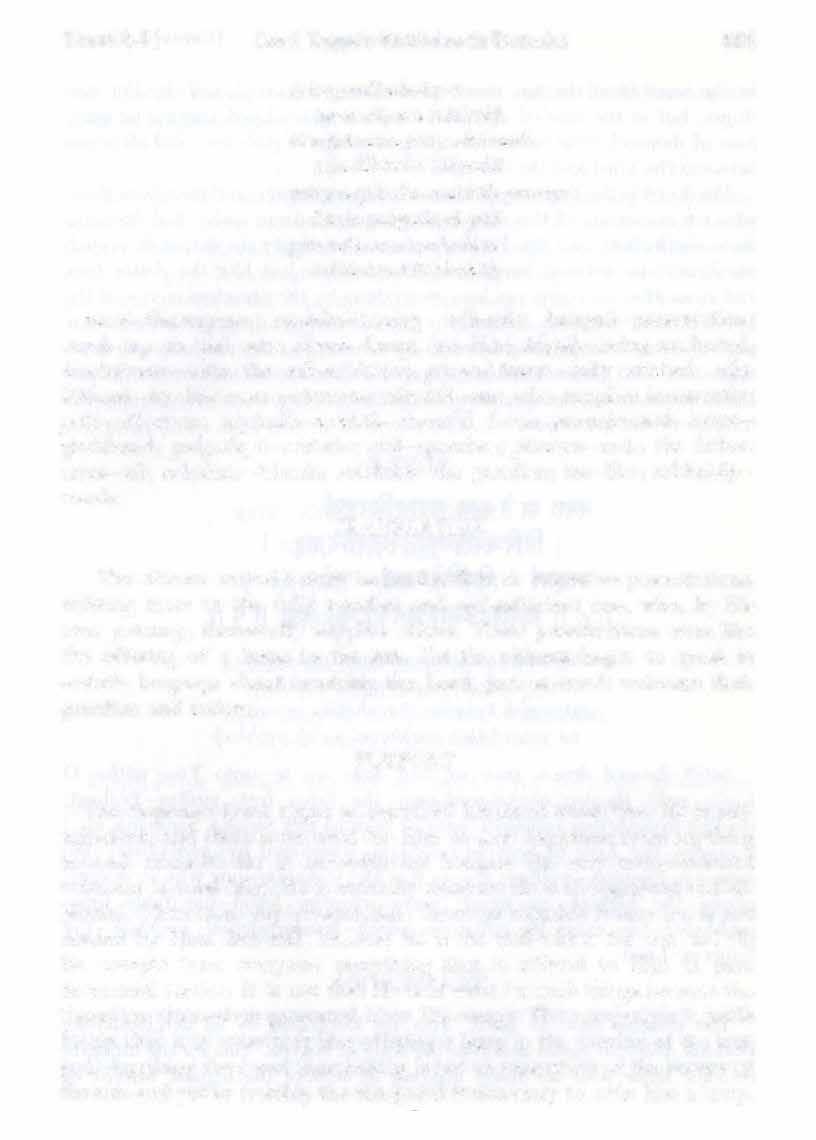
pitararh sarva-suhrdam
avitiiram iviirbhalo.iift
tatra-thereupon; upanita-having offered; balayaft- presentation; raveft-up to the sun; dipa m-lamp; iva-like; iidrtiift-being evaluated; iitmiiriimam-unto the self-sufficient; puqw-kiimam-fully satisfied; nijalabhena-by His own potencies; nityadii-one who supplies incessantly; priti-affection; utphulla-mukhiift-cheerful faces; pro cu ft- said; harfiagladdened; gadgadayii-ecstatic; girii-speeches; pitaram-unto the father; sarva-all; suhrdam-friends; avitiiram-the guardian; iva-like; arbhakiiftwards.
TRANSLATION
The citizens arrived before the Lord with their respective presentations, offering them to the fully satisfied and self-sufficient one, who, by His own potency, incessantly supplies others. These presentations were like the offering of a lamp to the sun. Yet the citizens began to speak in ecstatic language about receiving the Lord, just as wards welcome their guardian and father.
PURPORT
The Supreme Lord Kr�t�-a is described herein as iitmiiriima. He is selfsufficient, and there is no need for Him to seek happiness from anything beyond Himself. He is self-sufficient because His very transcendental existence is total bliss. He is eternally existent; He is all-cognizant and allblissful. Therefore, any presentation, however valuable it may be, is not needed by Him. But still, because He is the well-wisher for one and all, He accepts from everyone everything that is offered to Him in pure devotional service. It is not that He is in want for such things because the things are themselves generated from His energy. The comparison is made herein that it is something like offering a lamp in the worship of the sungod. Anything fiery and illuminating is but an emanation of the energy of the sun,and yet to worship the sun-god it is necessary to offer him a lamp.
Texts 4-5]
559
In the worship of the sun, there is some sort of demand made b . the worshiper, but in the case of devotional service of the Lord, there is no question of demand from either side. It is aJl a sign of pure love and affection between the Lord and the devotee.
The Lord is the Supreme Father of all living beings, and therefore those who are conscious of this vital relation with God can make filial demands from the Father, and the Father is pleased to upply the demands of such obedient sons \vithout bargaining. The Lord is just like the desire tree, and from Him everyone can have everything by the causeless mercy of the Lord. As the Supreme Father, the Lord, however, does not supply to a pure devotee what is considered to be a barrier to the discharge of devotional service. Those who are engaged in the devotional service of the Lord can rise to the position of unalfoyed devotional service by His transcendental"attraction.
TEXT 6

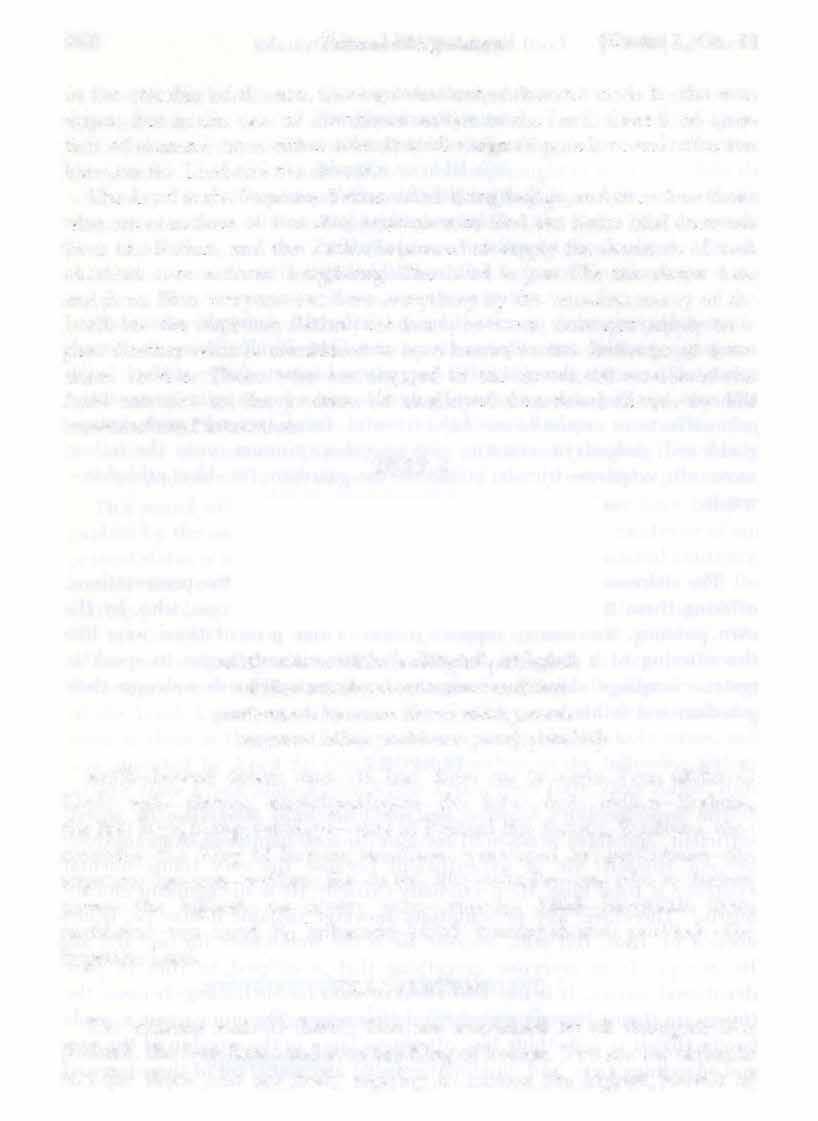
natii.� sma te nii.tha sadii.nghri-pankajarh
viriiica-vairiiicya-surendra-vanditam parii.yararh k�emam ihecchatii.rh pararh
na yatra kii.la� prabhavet para� prabhu�
nata�-bowed down; sma-we had done so; te-unto You; nii.tha-0 Lord; sadii.-always; anghri-pankajam-the lotus feet; viriiica-Brahma, thefirst livingbeing; vairiiicya-sons of Brahma like Sanaka, Sanatana, etc.; surendra-the King of heaven; vanditam-worshiped by; parii.yaram-the supreme; k�emam-welfare; iha-in this life; icchatam-one who so desires; param-the highest; na-never; yatra-wherein; kala�-inevitable time; prabhavet-c an exert its influence; paraft-transcendental; prabhuft- the Supreme Lord.
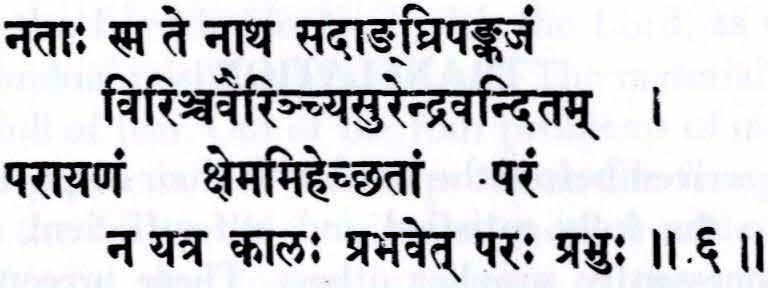
TRANSLATION
The citizens said: 0 Lord, You are worshiped by all demigods like Brahma, the four Sanas and even the King of heaven. You are the ultimate rest for those who are really aspiring to achieve the highest benefit of
560 Srimad-Bhagavatam [Canto l, Ch. 11
life. You are the supreme transcendental Lord, and inevitable time cannot exert its influence upon You.
PURPORT
The Supreme Lord is Sri Kr�pa, as confirmed in Bhagavad-gita, Brahmasamhita and other authorized Vedic literatures. o one is equal to or greater than Him, and that is the verdict of all scriptures. The influence of time and space is exerted upon the dependent living entities, who are all parts and parcels ofthe Supreme Lord. The living entitiesare predominated Brahman, whereas the Supreme Lord is the predominating Absolute. As so'on as weforget this clear fact,we are at once in illusion, and thus we are put into threefold miseries, as one is put into dense darkness. The clear consciousness of the cognizant living being is God consciousness, in which one bows down unto Him in all circumstances.
TEXT 7

bhaviiya nas tvarh bhava vi.Sva-bhiivana
tvam eva miitiitha suhrt-pati[l pitii
tvarh sad-gumr na� paramarh ca daivatarh
yasyiinuvrttyii lqtino babhuvima
bhaviiya-for welfare ; na�-for us; tvam- Your Lordship; bhava-just become; vi.Sva-bhiivana-the creator of the universe; tvam-Your Lordship; eva-certainly; miitii-mother; atha-as also; suhrt-well-wisher ; pati[lhusband; pita-father; tvam- Your Lordship; sat-guru�- spiritual master ; na�-our; paramam-the supreme; ca-and; daivatam- worship able Deity; yasya-whose; anuvrttyii-following in the footsteps; k rtin�-successful; babhuvima-just become.
TRANSLATION
0 creator of the universe, You are our mother, well-wisher, Lord, father, spiritual master and worshipable Deity. By following in Your footsteps we have become successful in every respect. We pray, therefore, that You continue to bless us with Your mercy.
Text 7) Lord K.f��a's Entrance in Dvaraka 561
llCrFt � � N� �� � ij��qfu: � I • . I;' • � • � ��= 'ml :q � ����'tftll � • II \9 II
PURPORT
The all-good Personality of Godhead, being the creator of the universe, also plans for the good of all good living beings. The good living beings are advised by the Lord to follow His good advice, and by doing so they become successful inall spheres of life. There ·is no need to worship any deity but the Lord. The Lord is all-powerful, and if He is satisfied by our obedience unto His lotus feet, He is competent to bestow upon us all kinds of blessings for the successful execution of both our material and spiritual lives. For attaining spirih1al existence, the human form is a chance for all to understand our eternal relation with God. Our relation with Him is eternal; it can neither be broken nor vanquished. It may be forgotten for the time being, but it can be revived also by the grace of the Lord, if we follow His injunctions, which are revealed in the scriptures of all times and all places.
TEXT 8


aho saniithii. bhavatii sma yad vayarh
traiv4!a-piiniim api dura-darsanam
prema-smita-snigdha-nin"k§ariinanarh pasyema rnparh tava sarva-saubhagam
aho-oh, it is our good luck; su-nathal;t- to be under the protection of the master; bhavata-by Your good self; sma-as we have become; yat vayam- as we are; traiv4tapanam-of the demigods; api-also ; duradarsanam- very rarely seen; prema-smita-smiling with love; snigdha- affectionate; nirik�aT)a-ananam-face looking in that mode; pasyema-looking upon You; rupam- beauty ; tava- Your; sarva-all; saubhagam- auspiciousness.

TRANSLATION
Oh, it is our good luck that we have come again today under Your protection by Your presence, for Your Lordship rarely visits even the denizens of heaven. Now it is possible for us to look into Your smiling face, which is full of affectionate glances. We can now see Your transcendental form, full of all auspiciousness.
562
[Canto I, Ch. II
Srimad-Bhagavatam
��lltfm�m " C' t'<��l'1�I �'lf��;ffiaJUT�
"'
� � � ��11�11
PURPORT
The Lord in His eternal personal form can be seen only by the pure devotees. The Lord is never impersonal, but He is the Supreme Absolute Personality of Godhead possible to be visited by devotional service face to face, which is impossible to be done even by the denizens of higher planets. When Brahmajl and other demigods want to consult Lord Vi�p.u, the plenary portion of Lord Kr�p.a, they have to wait on the shore of the ocean of milk where Lord Vi�p.u is lying on White Land (Svetadvi"pa). This ocean of milk and the Svetadvi"pa planet are the replica of Vaikup�haloka within the universe. Neither Brahmajl nor the demigods like lndra can enter into this island of Svetadvi"pa, but they can stand on the shore of the ocean of milk and transmit their message to Lord Vi�p.u, known as �irodakasayi Vi�p.u. Therefore, the Lord is rarely seen by them, but the inhabitants of Dvaraka, because of their being pure devotee without any tinge of material contamination of fruitive activities and empiric philosophical speculation, can see Him eye to eye by the grace of the Lord. This is the original state of the living entities and can be attained by reviving our natural and constitutional state of life discovered by devotional service only.
TEXT9 ���14(H1H lll �
w-t � qp:r w� 1 (1'31t�fit�f�'f!� l{� & �oi\f� Wf{ij'41T.@ II �II
yarhy ambujak�iipasasara bho bhavan
kuriin madhiin vatha suhrd-didrk�aya
tatrabdakoti-pratimafr. k�ar.o bhaved
ravirh vinak�r.or iva nas taviicyuta
yarhi-whenever; ambuja-ak�a-0 lotus-eyed one; apasasiira- You go away; bho-oh;. bhaviin- Yourself; kuriin-the descendants of King Kuru; madhiin-the inhabitants of Mathura (Vrajahhiimi); va-either; athatherefore; suhrt-didrk�ayii-for meeting them; tatra-at that time; abdakoti-millions; pratimafr.-years like that; k�ar. afr.-moments; bhavetbecomes; ravim-the sun; vina-without; aksnoh-ofthe eyes; iva-likethat; nafr.-ours; tava-Your; acyuta-0 infallible ·�n;. ·

Text 9] Lord K{�l).a's Entrance in Dvaraka 563
TRANSLATION
0 lotus-eyed Lord, whenever You go away to Mathurii, Vrndiivana or Hastinapura to meet Your friends and relatives, every moment of Your absence seems like a million years. 0 infallible one, at that time our eyes become useless, as if bereft of sun.



PURPORT
We are all proud of our material senses for making experiments to determine the existence of God. But we forget that our senses are not absolute by themselves. They can only act under certain conditions. For example, our eyes. As long as the sunshine is there, our eyes are useful to a certain extent. But in the abEence of sunshine, the eyes are useless. Lord Sri Kr�!J.a, being the primeval Lord, the Supreme Truth, is compared to the sun. Without Him all our knowledge is either false or partial. The opposite of the sun is the darkness, and similarly the opposite of Kr�l).a is miiyii or illusion. The devotees of the Lord can see everything in true perspective due to the light disseminated by Lord Kr�!J.a. By the grace of the Lord the pure devotee cannot be in the darkness of ignorance. Therefore, it is necessary that we must always be in the sight of Lord Kr�!la so that we can see both ourselves and the Lord with His different energies. As we cannot see anything in the absence of the sun, so also we cannot see anything including our own self without the factual presence of the Lord. Without Him all our knowledge is covered by illusion.
TEXT 10

" n ;m' f•()f-:4��tt"1'f6C!ilt �mq�flqof 1


� q9fleo<tt u tm �: � I
"PfR)� �
fif�-suf-.�tC2<1 u �on
katham bayam niitha ciro�ite tvayi
prasanna-dr�.tayii khila tiipaso�artarh
fivema te sundara-hiisa-sobhitam
apasyamanii vadanam manoharam
iti codiritii viicaft
prafiiniim bhakta-vatsalaft
s.rrtviino'nugraharh dr$tayii
vitanvan priivisat puram
564
Ch.
Srimad-Bhiigavatam [Canto I,
II
katham-how; bayam-we; natha-0 Lord; ciro�ite-being abroad almost always; tvayi-by You; pras anna-satisfaction; dr�taya-by the glance; khila- universal; tapa-miseries; so�ar-am-vanquishing;jlverna-shall be able to live; te-Your; sundara-beautiful; has a-smiling; sobhitamdecorated; apasyarnanii- without having seen ;vadanarn- face ;manohararnattractive; iti-thus ; codirita-speaking; vacaQ.-words; prajaniim-of the citizens; bhakta-vatsalaQ.-kind to the devotees; snwanaQ. - thus hearing; anugraharn-kindness; dr�tayii-by glances; vitanvan-distributing; pravisatentered; puram- Dvarakapur1.

TRANSLA TION
0 master, if You live abroad all the time, then we cannot look at Your attractive face whose smiles vanquish all our sufferings. How can we exist without Your presence?
The Lord, who is very kind to the citizens and the devotees, upon hearing their speeches, entered the city of Dvaraka and acknowledged all their greetings by casting His transcendental glance over them.
PURPORT
Lord Kr�!'la's attraction is so powerful that once being attracted by Him no one can tolerate separation from Him. Why is this so? Because we are all eternally related with Him as the sun rays are eternally related with the sun disc. The sun rays are molecular parts of the solar radiation. Thus the sun rays and the sun cannot be separated. The separation by the cloud is temporary and artificial, and as soon as the cloud is cleared, the sun rays again display their natural effulgence in the presence of the sun. Similarly, the living entities, who are molecular parts of the whole spirit, are separated from the Lord by the artificial covering of miiyii, illusory energy. This illusory energy or the curtain of miiyii has to be removed, and when it is so done, the living entity can see the Lord face to face, and all his miseries are at once removed. Every one of us wants to remove the miseries of life, but we do not know how to do it. The solution is given here, and it rests on us to assimilate it or not.
TEXT ll

Text ll) Lord K��l}a's Entrance in Dvaraka 565
madhu-bhoja-dasiirhii.rhakukurii.ndhaka-vnribhi{t

iitma-tulya-balair guptii.rh
niigair bhogavatim iva
madhu- l\ladhu ; bho ja-Bhoj a; dasarha-Dasarha; arha-Arha; kukuraKukura; andhaka-Andhaka; vr�ribhi{t-by the descendants of Vg;l)i; ii.tma-tulya-as good as Himself; balai{t-by strength; guptii.m-protected; nii.gai{t-bythe Nagas; bhogavatim-the capital of Nagaloka; iva-like.

TRANSLATION
As Bhogavati, the capital of Nagaloka, is protected by the Nagas, so was Dviiraka protected by the descendants of Vr�!li-Bhoja, Madhu, Dasarha, Arha, Kukura, Andhaka, etc.-who were as strong as Lord Kr�!la·
PURPORT
The Nagaloka planet is situated below the earth planet, and it is understood that the sun rays are hampered there. The darkness of the planet is, however, removed by the flashes of thejewels set on the head of theNagas (celestial serpents), and it is said that there are beautiful gardens, rivulets, etc., for the enjoyment of the Nagas. It is understood here also that the place is well protected by the inhabitants. So also the city of Dvaraka was well protected by the descendants of Vr�!J.i, who were as powerful as the Lord, insofar as He manifested His strength upon this earth.
TEXT 12

��dij���:l
sarvartu-sarva-vibhavapurya-vrk�a-latii.sramai{t udyii.nopavaniirii.mair
vrta-padmii.kara-sriyam
II��II
sarva-all; rtu-seasons; sarva-all; vibhava-opulences; purya-pious; vrk�a-trees; latii.- creepers; ii.sramai{t-with hermitages; udyii.na-orchards; upavana-flower gardens; ii.rtimai{t-pleasure gardens and beautiful parks; vrta-surrounded by; padma-akara-the birthplaces of lotuses or nice reservoirs of water; sriyam-increasingthe beauty.
566
Srimad-Bhagavatam
[Canto I, Ch. II
TRANSLATION

The city of Dvaraka Puri was filled with the opulences of all seasons. There were hermitages, orchards, flower gardens, parks and reservoirs of water breeding lotus flowers all over.
PURPORT
Perfection of human civilization is madepossibleby utilizing thegifts of nature in their own way. As we find herewith in the description of its opulence, Dvaraka was surroundedby flower gardens and fruit orchards along with reservoirs of water and growing lotuses. There is no mention of mills and factories supported by slaughterhouses, which are the necessary paraphernalia of the modern metropolis. Thepropensity to utilize nature's own gifts is still there, even in the heart of modern civilized men. The leaders of modern civilization select their own residential quarters in a place where there are such naturally beautiful gardens and reservoirs of water, but they leave the common men to reside in congested areas without parks and gardens. Herein of course we find a different description of the city of Dvaraka. It is understood that the whole dhiima or residential quarter was surrounded by such gardens and parks with reservoirs of water where lotuses grew. It is understood that all the people depended on nature's gifts of fruits and flowers withoutindustrialenterprises promoting filthy huts and slums for residential quarters. Advancement of civilization is estimated not on the growth of mills and factories to deteriorate the finer instincts of the human being, but it rests on developing the potent spiritual instincts of human beings and giving them a chance to go backto Godhead. Development of factories and mills is called ugra-karma, or pungent activities, and such activities deteriorate the finer sentiments of the human being and society to form a dungeon of demons.
We find herein the mention of pious trees which produce seasonal flowers and fruits. The impious trees are uselessjungles only, and they can only be used to supply fuels. In the modern civilization such impious trees are planted on the sides of roads. Human energy shouldbe properly utilized in developing thefiner senses for spiritual understanding, in which lies the solution of life. Fruits, flowers, beautiful gardens, parks and reservoirs of waters with ducks and swans playing in the midst of lotus flowers and cows giving sufficient milk and butter are essential for developing the finer tissues of the human body. As against this, the dungeons of mines, factories and workshops develop demoniac propen-
Text 13] Lord Kt!!l).a's Entrance in Dvaraka 567
sities in the working class. The vested interests flourish at the cost of the working class, and consequently there are severe clashes between them in so many ways. The description of Dvaraka-dhama is the ideal of human civilization.


TEXT 13
· gopuro-dviira-miirge§u krta-kautuka-torartiim citra-dhvaja-patiikiigroir antafl. pratihatii-tapiim
gopura- the gateway of the city; dviira-door; miiTge§u-on different roads; krta-undertaken; kautuka-because of festival; torartiim- decorated arch; citra-painted; dhvaja-flags; patiikii-agraifl.-by the slogan signs; antafl.-within; pratihatii- checked; tapiim-sunshine.
TRANSLATION
The city gateway, the household doors and festooned arches along the roads were all nicely decorated with festive signs like plantain trees and mango leaves, all to welcome the Lord. Flags, garlands and painted signs and slogans all combined to shade the sunshine.
PURPORT
Signs of decoration in special festivals were also collected from the gifts of nature, such as the plantain trees, the mango trees, fruits and flowers. Mango trees, coconut palms and plantain trees are still accepted as auspicious signs. The flags mentioned above were all painted either with the picture of Garupa or Hanuman, the two great servitors of the Lord. For devotees, such paintings and decorations are still adored, and the servitor of the master is paid more respects for the satisfaction of the Lord.
TEXT 14

sammiirjita-mahiimiirgarothyiipartaka-catvariim siktiim gandha-jalair uptiim
phala-pu§piik§atiinkuraifl.

568 Srimad-Bhagavatam [Canto 1, Ch_ ll
.n�GII(¥1tii! tRtitd'fiffl(UIIi(
I f�'l\r.l151q(ll4ili(;ij: II��II
��'M$�1�611(: ll�\lll
ftArr
sammiirjita-thoroughly cleansed; mahii-miirga-highways; rathya-lanes and subways; aparwka-shopping marketplaces; catvariim-public meeting places; siktiim-moistened with; gandha-jalaift- scented water; uptiim-was strewn with; phala- fruits; pu§ pa-flowers; ak§ata-unbroken; ankuraiftseeds.

TRANSLATION
The highways, subways, lanes, markets and public meeting places were all thoroughly cleansed and then moistened with scented water. And to welcome the Lord, fruits, flowers and unbroken seeds were strewn every· where.
PURPORT
Scented waters prepared by distilling flowers like rose and keora were requisitioned to wet the roads, streets and lanes of Dvaraka-dhama. Such places along with the marketplace and public meeting places were thoroughly cleansed. From the above description, it appears that the city of Dvaraka-dhama was considerably big, containingmanyhighways, streets, and public meeting places with parks, gardens and reservoirs of water, all very nicely decorated with flowers and fruits. And to welcome the Lord such flowers and fruits with unbroken seeds of grain were also strewn over the public places. Unbroken seeds of grain or fruits in the seedling stage were considered auspicious, and they are still so used by the Hindus in general on festival days.
TEXT 15

dviiri dviiri grhiifliirh ca dadhy-ak§ata-phalek§ubhift alankrtiim puf!la:kumbhair balibhir dhupa-dipakai[l
dviiri dviiri-the door of each and every house; grhiiriim-of· all the residential buildings; ca-and; dadhi-curd; ak§ata-unbroken; phalafruit; ik§ubhift- sugarcane; alankrtiim- decorated; pur'(la-kumbhaift-full water pots; balibhift-along with articles for worship; dhupa-incense; dipakai[l-with lamps and candles.
Text 15) Lord KpJQ.a's Entrance in Dvaraka 569
TRANSLATION
In each and every door of the residential houses, auspicious things like curd, unbroken fruits, sugarcane and full water pots with articles for worship, incense and candles were all displayed.
PURPORT
The proces of reception according to Vedic rites is not at all dry. The reception was made not simply by decorating the roads and treets as above mentioned, but by worshiping the Lord with requisite ingredients like incense, lamps, flower , sweets, fruits and other palatable eatables, according to one's capacity. All were offered to the Lord, and the remnant of the foodstuff were distributed amongst the gathering citizens. So it was not like a dry reception of these modern days. Each and every house was ready to receive the Lord in a similar way, and thus each and every house on the roads and streets distributed such remnants of food to the citizens, and therefore the festi al was successful. Without distribution of food, no function is complete, and that is the way of Vedic culture.
TEXTS 16-17
� �U+t1441rJ W+tll�Rl! I ��SI(lwt�
������ � �li'iictfflt;�6: I
�•niiSM6�44wtH.twt�-.rn U��II
niSamya pre�tham iiyiintam vasudevo mahiimaniift
akriiras cograsenas ca
riimas ciidbhuta-vikramaft
pradyumnas ciirude�ras ca
siimbo jiimbavati-sutaft
prahar§a-vegocchasitasa_yaniisana-bhojaniift

niSamya-j us t hearing; prefitham-the dearmost; iiyiintam-coming home; vasudeva{l-Vasudeva (the father of Kr�Qa); mahii-maniift-the magnanimous; akriiraft-Akriira; ca-and; ugrasenaft- Ugrasena ; ca-and; riimaftBalarlima (the elder brother of Kr�Qa); ca-and; adbhuta-superhuman;

570 Sr"imad-Bhagavatam [Canto 1, Ch.ll
Ulf�l!6�iti+t!
II��II
vikrama�-prowess; pradynmna�- Pradyumna; ciirude§f1U�-Carude;;r;�a; caand· siimba�-Samba ; jiimbavati-suta�-the son of Jambavafi; prahar§aextreme happiness; vega- force ; ucchasita-being influenced by; sayanalying down; iisana-sitting on; bh ojan ii�-dining.
TRANSLATION
On hearing that the most dear Kr�r:ta was approaching Dvaraka-dhama, magnanimous Vasudeva, Akriira, Ugrasena, Balarama, the superhumanly powerful, Pradyumna, Carude�!la and Samba, the son of Jambavati, all extremely happy, abandoned resting, sitting and dining.
PURPORT
Vasudeva: Son of KingSi:irasena, husband of Devaki and father of Lord Sri Kr�!la. He is the brother of Kunti and father of Subhadra. Subhadra was married with her cousin Arjuna, and this system is still prevalent in some parts of India. Vasudeva was appointed minister of Ugrasena, and later on he married eight daughters of Ugrasena's brother Devaka. Devaki is only one of them. Kamsa was his brother-in-law, and Vasudeva accepted voluntary imprisonment by Kamsa on muhtal agreement to deliver the eighth son of Devaki. This was foiled by the will of Kr�r:ta. As maternal uncle of the Pa!l�avas, he took active parts in the purificatory process of the Pa!l�avas. He sent for the priest Kasyapa at theSataspi.ga Parvata, and he executed the functions. When Kr�!la appeared within thebars of Kamsa's prison house, He was transferred to Gokula by Vasudeva at the house of Nanda Maharaja, the foster father of Kr�!la. KH!la disappeared along with Baladeva prior to the disappearance of Vasudeva, and Arjuna (his nephew) undertook the charge of the funeral ceremony after his disappearance.

A kriira: The commander-in-chief of the Vf�l)i dynasty and a great devotee of Lord Kr�!la. Akriira attained success in devotional service of the Lord by the one single process of offering prayers. He was the husband of Siitani, daughter of Ahiika. He supported Arjuna when Arjuna took Subhadra forcibly away by the will of Kr�!Ja. Both Kr�!la and Akriira went to see Arjuna after his successful kidnapping of Subhadra. Both of them presented dowries to Arjuna after this incidence. Akriira was present also when Abhimanyu, the son of Subhadra, was married with Uttara, mother of Maharaja Parik�it. Ahiika, the father-in-law of Akriira, was not on good terms with Akriira. But both of them were devotees of the Lord.
l]grasena: One of the powerful kings of the Vr�!li dynasty and cousin of Maharaja Kuntibhoja. His other name is Ahiika. His minister was Vasudeva,
Texts 16-17] Lord �l!r.•a's Entrance in Dvaraka 571
and his son was the powerful Kamsa. This Kamsa imprisoned his father and became the King of Mathura. By the grace of Lord Km1a and His brother Lord Baladeva, Kamsa was killed, and Ugrasena was reinstalled on the throne. When Salva attacked the city of Dvaraka, Ugrasena fought very valiantly and repulsed the enemy. Ugrasena inquired from Naradaji about the divinity of Lord Kr��a. When the Yadu dynasty was to be vanquished, Ugrasena was entrusted with the iron lump produced from the womb of Samba. He cut the iron lump into pieces and then pasted it and mixed it up with the sea water on the coast of Dvaraka. After this, he ordered complete prohibition within the city of Dvaraka and the kingdom. He got salvation after his death.
Baladeva: He is the divine son of Vasudeva by his wife Rohi!il. He is also known as Rohi�lnandana, the beloved son of Rohi!il. He was also entrusted to Nanda Maharaja along with His mother Rohi�l when Vasudeva embraced imprisonment by mutual agreement with Kamsa. So anda Maharaja is also the foster father of Baladeva along with Lord Kr��a. Lord Kr��a and Lord Baladeva both were constant companions from very childhood, although They were stepbrothers. He is the plenary manifestation of the Supreme Personality of Godhead, and therefore He is as good and powerful as Lord Kr��a. He belongs to the Vi§[lU-tattva (the principle of Godhead). He attended the svayarhvara ceremony of Draupadi along with Sri Kr��a. When Subhadra . was kidnapped by Arjuna by the organized plan of Sri Kr��a, Baladeva was very angry with Arjuna and wanted to kill him at once. Sri Kr��a, for the sake of His dear friend, fell at the feet of Lord Baladeva and implored Him not to be so angry. Sri Baladeva was thus satisfied. Similarly, He was once very angry with the Kauravas, and He wanted to throw the whole city into the depths of the Yamuna. But the Kauravas satisfied him by surrendering unto His divine lotus feet. He was actually the seventh son of Devakl prior to the birth of Lord Kr��a, but by the will of the Lord He was transferred to the womb of Rohi�l to escape the wrath of Kamsa. His other name is therefore Sankar�a�a, who is also the plenary portion of Sri Baladeva. Because He was as powerful as Lord Kr��a and can bestow spiritual power to the devotees, He istherefore known as Baladeva. In the Vedas also it is enjoined that no one can. know the Supreme Lord without being favored by Baladeva. Bala means spiritual strength and not physical. Some less intelligent persons interpret bala as the strength of the body. But no one can have spiritual realization by physical strength. Physical strength ends with the end of the physical body, but spiritual strength follows the spirit soul to the next transmigration, and therefore the strength obtained by Baladeva is never wasted.
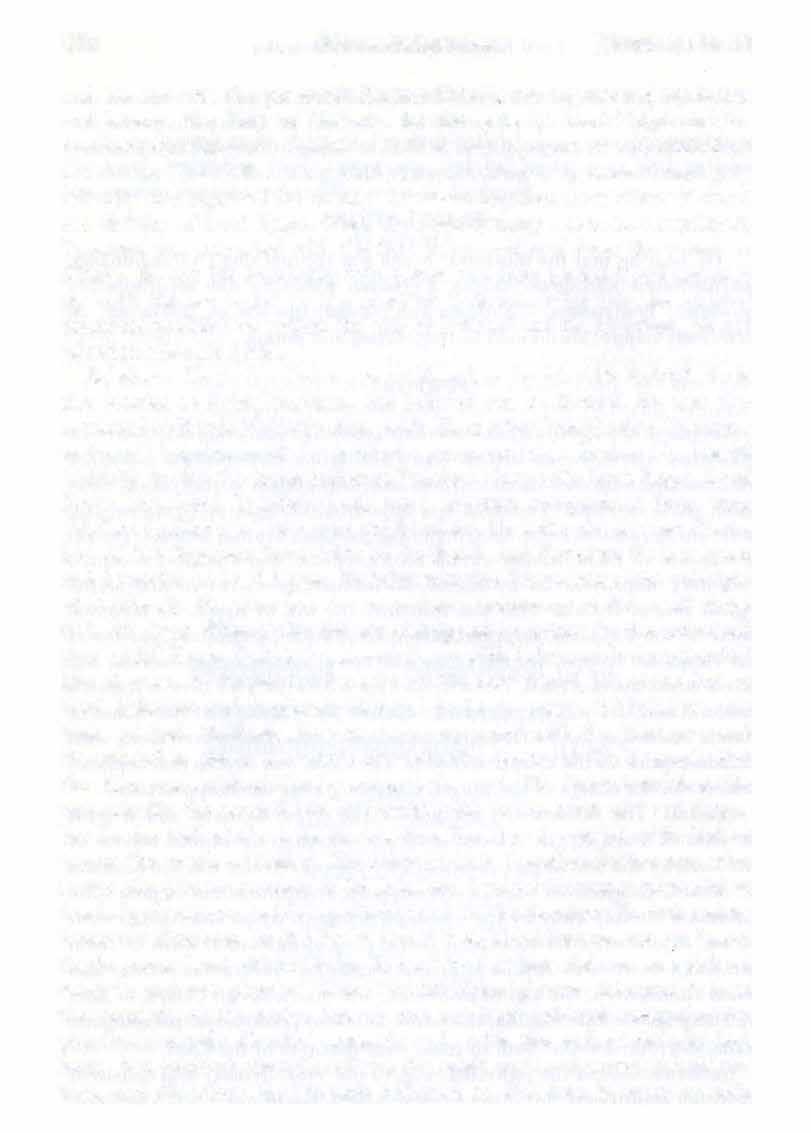
572
[Canto I, Ch. II
Srimad-Bhagavatam
Sri Baladeva was also a class friend of Lord Sri Krsna as a student of Sandipani Muni. In His childhood He killed many a��ras along with Sri KplQa, and specifically He killed the Dhenukasura at Talavana. During the Kuruk�etra battle, He remained neutral, and Hetried his bestnot to bring about the fight. He was in favor of Duryodhana, but still He remained neutral. Whenthere was a club-fight between Duryodhana and Bhimasena, He was present on the spot. He was angry at Bhimasena when the latter struck Duryodhana on the thigh or below the belt, and He wanted to retaliate the unfair action. Lord Sri Kr�!la saved Bhima from His wrath. But He left the place at once, being disgusted at Bhimasena, and after His departure Duryodhana fell to the ground to meet his death. The funeral ceremony of Ahhimanyu, the son of Arjuna, was performed by Him, as He was the maternal uncle. It was impossible to be performed byany one of the Pa!J.�avas, who were all overwhelmed with grief. At the last stage, He departed from this world by producing a great white snake from His mouth, and thus He was carried by S�anaga in the shape of a serpent.
Pradyumna: Incarnation of Kamadeva or, according to others, incarnation of Sanat-kumara, born as the son of the Personality of Godhead Lord Sri Kr�!la andLak�midevi-SrimafiRukmir",the principalqueen atDvaraka. He was one of those who went to congratulate Arjuna upon marrying Subhadra. He was one of the great generals who fought with Salva, and while fighting with him he became unconscious on the battlefield. His charioteer brought himbacktothe camp from thebattlefield, andforthis action he was very sorry and rebuked his charioteer. However, he fought again with Salva and was victorious. He heard all about the different demigods from Naradaji. Heis one ofthe four plenaryexpansionsof Lord Sri Kr�!J.a. Heis the third one. He inquired from his father Sri Kr�!la about the glories of the briihmarz-as. During the fratricidal war amongst the descendants of Yadu, he died at the hand of Bhoja, another king of the Vr�!J.is. Afterhisdeath, he wasinstalledin his original position.
Ciirude§rz-a: Another son of Lord Sri Kr�!la and Rukmi!J.idevi He was also present during the svayamvara ceremonyof Draupadi. He was agreat warrior like his brothersandfather. He foughtwithVivindhaka and killed him in thefight.
Samba: One of the great heroes of the Yadu dynasty and the son of Lord Sri Kr�!la by His wife Jambavafi. He learned the military art of throwing arrows from Arjuna, and he became a member of parliament during the time of Maharaja Yudhi�thira. He was present during the

Texts 16-17] Lord �l!r:ta's Entrance in Dvaraka 573
Thestrength is eternal, and thus Baladeva is the originalspiritual master of all devotees.
Rajasuya-yajfia of Maharaja Yudhi9thira. When all the Vmris were assembled during the time of Pravasa-yajfia, his glorious activities were narrated by Satyaki before Lord Baladeva. He was also present along with his father Lord Sri Kr9!1a during the Asvamedha-yajfia performed by Yudhi9thira. He was presented before some [§is falsely dressed as a pregnant woman by his brothers, and in fun he asked the [§is what he was going to deliver. The [§is replied that he would deliver a lump of iron, whieh would be the cause of fratricidal war in the family of Yadu. The next day, in the morning, Samba delivered a large lump of iron, which was entrusted with Ugrasena for necessary action. Actually later on there was the foretold fratricidal war, and Samba died in that war.
So all these sons of Lord Kr�l)a left their respective palaces and leaving aside all engagements, including lying down, sitting and dining, hastened towards their exalted father.
TEXT 18
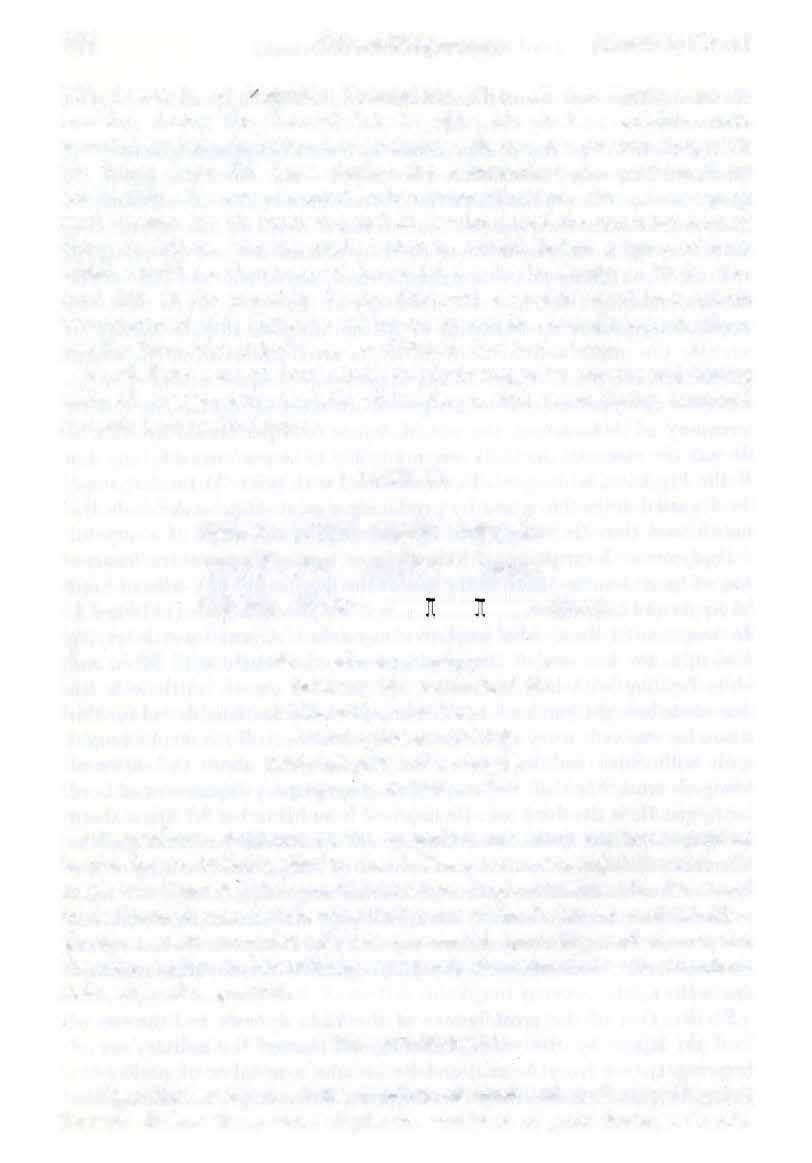
*�aiin( �: l&.f�U: II��II
varar-endrarh puraskrtya
briihma[Lai[l sa-sumangalaifi. sankha-tiirya-niniidena
brahma-gho§e[la ciidrtii� pratyujjagmii rathair hr§tii� prar-ajiigata-siidhvasii�
viira[Lendram-elephants on the auspicious mission; puraskrtya-putting in the front; briihmallai�-by the brahmar-as; sa-sumaligalai�-with allauspicious signs;sankha-conchshell; tiirya-bugle; niniidena-by the sound of; brahma-gho1ella-by chantingthe hymns ofthe Vedas; ca-and; adrta[lglorified; prati-towards; ujjagmii-proceeded hurriedly; rathai�-on the chariots; hr�tii�-in cheerfulness; proflayiigata-saturated with affection; siidhvasii�-all-respectful.



TRANSLATION
They hastened toward the Lord on chariots with brahmll!las bearing flowers. Before them were elephants, emblems of good fortune. Conch-
574 Srimad-Bhagavatam [Canto I, Ch. II
ctl@l4 �«tt� ;nA: ��: I
�H�M•u,._ iUAt�l1ot �: I �{'
shells and bugles were sounded, and Vedic hymns were chanted. Thus they offered their respects, which were saturated with affection.
PURPORT
The Vedic wayof receiving a great personality creates an atmosphere of respect, which is saturated with affection and veneration for the per on received. The auspicious atmosphere of such a reception depends on the paraphernalia described above, including conchshell, flowers, incense, decorated elephants, and the qualified briihmarws reciting verses from the Vedic literatures. Such a program of reception is full of sincerity, both on the part of the receiver and the received.
TEXT 19

viiramukhyiis ca sataso yiinais tad-darsanotsukiifl lasat-kurz4ala-nirbhiitakapola-vadana-sriyafl
viiramukhyiifl-well-known prostitutes; ca-and; sata5a[l-hundreds of; yanai[l-by vehicles; tat-dariana-for meeting Him (Lord Sri Kp�qa); utsukii[l-very much anxious; lasat-hanging; kurflala-earrings; nirbhiitadazzling; kapola-forehead; vadana-face; sriyafl-beauty.



TRANSLATION
At the same time, many hundreds of well-known prostitutes began to proceed on various vehicles. They were all very eager to meet the Lord, and their beautiful faces were decorated with dazzling earrings, which enhancedthe beauty of their foreheads.
PURPORT
We may not hate even the prostitutes if they are devotees of the Lord. Even to date there are many prostitutes in great cities of India who are sincerely devotees of the Lord. By tricks of chance one may be obliged to adopt a profession which is not very adorable in society, but that does
Text 19) Lord �l!r:ta's Entrance in Dvaraka 575
� ....
I
II��II
�
�U(fl(.oqj� 41wt(a«lwti.��i:
�e�OIS�Mlilij4iql�tt�wR�!
not hamper one in executing devotional service to the Lord. Devotional service of the Lord is uncheckable in all circumstances. It is understood herewith that even in those days, about 5,000 years ago, there were prostitutes in a city like Dvaraka, where Lord .Kf�p.a resided. This means that prostitutes are necessary citizens for the proper upkeep of society. The government opens wine shops, but this does not mean that the government encourages the drinking of wine. The idea is that there is a class of men who will drink at any cost, and it has been experienced that prohibition in great cities encouraged illicit smuggling of wine. Similarly, men who are not satisfied at home require such concessions, and if there is no prostitute, then such low men will induce others into prostitution. It is better that prostitutes be available in the marketplace so that the sanctity of society can be maintained. It is better to maintain a class of prostitutes than to encourage prostitutes within society. The real reformation is to enlighten aU people to become devotees of the Lord, and that will check all kinds of deteriorating factors of life.
Sri Bilvamailgala Thakur, a great iiciirya of the Vi�p.usvami Vai�p.ava sect, in his householder life was overly attached to a prostitute who happened to be a devotee of the Lord. One night when the Thakur came to Cintamapi's house in torrents of rain and thunder, Cintamapi was astonished to see how the Thakur could come on such a dreadful night after crossing a foaming river which was fulJ of waves. She said to Thakur Bilvamail.gala that his attraction for the flesh and bone of an insignificant woman like her would be properly utilized if it could be diverted to devotional service of the Lord to achieve attraction for the transcendental beauty of the Lord. It was a momentous hour for the Thakur, and he took a turn towards spiritual realization by the words of a prostitute. Later on the Thakur accepted the prostitute as his spiritual master, and in several places of his literary works he has glorified the name of Cintamap.i, who showed him the right path.
In the Bhagavad-gitii (Bg. 9.32) the Lord says, "0 son of Prtha, even the low-born caru}iilas and those who are born in a family of unbelievers, and even the prostitutes, shaH attain perfection of life if they take shelter of unalloyed devotional service to Me because in the path of devotional service there are no impediments due to degraded birth and occupation. The path is open for everyone who agrees to follow it."
It appears that the prostitutes of Dvaraka, who were so eager to meet the Lord, were all His unalloyed devotees, and thus they were all on the path of salvation according to the above version of the Bhagavad-gitii. Therefore, the only reformation that is necessary in society is to make an

576 Srimad-Bhagavatam [Canto 1, Ch. 11
organized effort to turn the citizens into devotees of the Lord, and thus all good qualities of the denizens of heaven will overtake them in their own way. On the other hand, those who are nondevotees have no good qualifications whatsoever, however they may be materially advanced. The difference is that the devotees of the Lord are on the path of liberation, whereas the nondevQtees are on the path of further entanglement in material bondage. The criterion of advancement of civilization is whether the people are educatedand advanced on the path ofsalvation.
TEXT 20

nata-nartaka-gandharvii� suta-miigadha-vandina� giiyanti cottamaslokacaritiiny adbhutiini ca
I
nata-dramatists; nartaka- dancers; gandha rvaft- celestial singers; suta-professional historians; miigadha-professional genealogists; vandinaft-professional learned speakers; giiyanti-all ejaculating; carespectively; uttama-slokaft-the Supreme Lord; caritiini- activities; adbhutiini-all superhuman; ca-and.
TRANSLATION
Expert dramatists, artists, dancers, singers, historians, genealogists and learned speakers all gave their respective contributions, being inspired by the superhuman pastimes of the Lord. Thus they proceeded on and on.
PURPORT
It appears that 5,000 years ago the society also needed the services of the dramatists, artists, dancers, singers, historians, genealogists, public speakers, etc. Dancers, singers and dramatic artists mostly hailed from the sudra community, whereas the learned historians, genealogists and public speakers hailed from the briihmara community. All of them belonged to a particularcaste, and they became so trained in their respective families. Such dramatists, dancers, singers, historians, genealogists and
Text 20] Lord �!!�).a's Entrance in Dvaraka 577
wttwtJ��t: «_(l+tltfli.tiifKwt:
���:n�lP�I�:qfutl;tji�IM � II� o II
public speakers would dwell on the subject of the Lord's superhuman activities in different ages and millenniums, and not on ordinary events. Nor were they in chronological order. All the Puriirws are historical facts described only in relation with the Supreme Lord in different ages and times as well as on different planets also. Therefore, we do not find any chronological order. The modern historians, therefore, cannot catch up the link, and thus they unauthoritatively remark that the Puriirws are all imaginary stories only.
Even one hundred years ago in India, all dramatic performances were centered round the superhuman activities of the Supreme Lord. The common people would be verily entertained by the performances of dramas, and yiitrii parties played wonderfully on the superhuman activities of the Lord, and thus even the illiterate agriculturist would be a participant in the knowledge of Vedic literature, despite a considerable lack of academic qualifications. Therefore, expert players in drama, dancers, singers, speakers, etc., are required for the spiritual enlightenment of the common man. The genealogists would give account completely of the descendants of a particular family. Even at the present moment the guides in the pilgrimages of India submit a complete account of genealogical tables before a newcomer. This wonderful act sometimesattracts more customers to receive such important information.
TEXT 21
lftiEfi(ijSI � ql(IOiii4�ctM'114( I
�ttl�'iq411POI � '41'1'41��II��II
bhagaviirhs tatra bandhiiniirh paurii[liim anuvartiniim yathii-vidhy upasangamya sarve�iirh miinam iidadhe
bhagaviin-Sri Krl?J}a, the Personality of Godhead; tatra-in that place; bandhiiniim-of the friends; pauriirtiim-of the citizens; anuvartiniimthose who approached Him to receive and welcome; yathii-vidhi-as it behooves; upasangamya-going nearer; sarve�iim-for each and every one; miinam-honor and respects; iidadhe-offered.
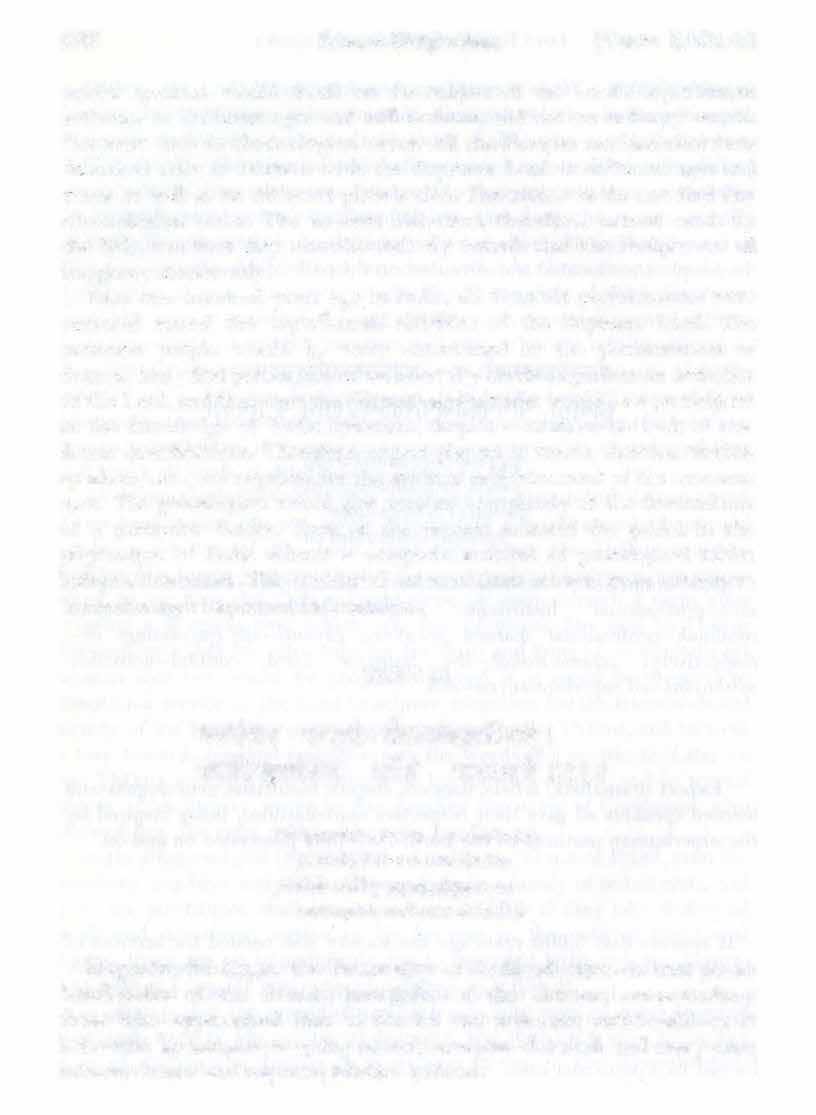
578
Ch.
Srimad-Bhagavatam [Canto I,
II
Lord Kr��a, the Personality of Godhead, approached them and offered due honor and respect to each and every one of the friends, relatives, citizens and all others who came to receive and welcome Him.
PURPORT
The Supreme Lord Personality of Godhead is neither impersonal nor an inert object unable to reciprocate the feelings of His devotees. Here the word yathiividhi or "just as it behooves" is significant. He reciprocates "just as it behooves" with His different types of admirers and devotees. Of course, the pure devotees are of one type only because they have no other object for service but the Lord, and therefore the Lord also reciprocates with such pure devotees just as it behooves, namely, He is always attentive to aU the rn..atters of His pure devotees. There are others who designate Him as impersonal, and so the Lord also does not take any personal interest. He satisfies everyone in terms of one's development of spiritual consciousness, and a sample of such reciprocation is exhibited here with His different welcomers.
TEXT 22

prahviibhiviidaniisle§a
kara-sparsa-smitek�a!lai�
iiSviisya ciisvapiikebhyo
varais ciibhimatair vibhu�
prahvii-by bowing His head; abhiviidana-by greeting with words; iisle�a-embracing; kara-sparsa-shaking hands with; smita-Lkfia1Ja*- by a glancing smile; iisviisya-by encouragement; ca-and; a5vapiikebhya�-down to the lowest rank of dog-eaters; varai�-by benedictions; ca-also; abhimata*-as desired by; vibhu�-the Almighty.

Text 22) Lord K.r�r:aa's Entrance in Dvaraka 579
TRANSLATION
TRANSLATION
The Almighty Lord greeted everyone present by bowing His head, exchanging greetings, embracing, shaking hands, looking and smiling, giving assurances and awarding benedictions, even to the lowest in rank.
PURPORT
To receive the Lord Sri Kr�!ia there were all grades of population beginning from Vasudeva, Ugrasena, Gargamuni, etc., i.e. the father, grandfather, teacher, etc., down to the prostitutes and ca!l{,liilas, who are accustomed to eat dogs. And every one of them was properly greeted by the Lord in terms of rank and position. As pure living entities, all are the separated parts and parcels of the Lord, and thus no one is alien by His eternal relation. Such pure living entities are graded differently in terms of contamination of the modes of material nature, but the Lord is equally affectionate to all His parts and parcels, despite material gradation. He descends only to recall these materialistic living beings back to His kingdom, and intelligent persons take advantage of this facility offered by the Personality of Godhead to all living beings. No one is rejected by the Lord for being accepted in the kingdom of God, and it remains withthe living being to accept this or not.

TEXT 23
svayarh ca gumbhir viprai{l
sadiira* sthavirair api
ii.Sirbhir yujyamiino 'nyairvandibhi.S ciivi.Sat puram
svayam-Himself; ca-also; gumbhi{l-by elderly relatives; viprai�-by the briihmarzas; sadiirai{l-with their wives; sthavirai{l- invalid; api-also; iisirbhi{l-by the blessing of; yujyamiina�-being praised by; anyai�:....by others; vandibhi{l,-admirers; ca-and; avi.Sat-entered;puram-the city.

580
l, Ch. ll
Srimad-Bhagavatam (Canto
TRANSLATION
Then the Lord personally entered the city accompanied by elderly relatives and invalid brahm�as with their wives, all offering benedictions and singing the glories of the Lord. Others also praised the glories of the Lord.
PURPORT
The briihma[laS in society were never attentive in banking money for future retired life. When they were old invalids, they used to approach the assembly of the kings, and simply by praising the glorious deeds performed by the kings, along with their wives, they would be provided with all necessities of life. Such briihma[las were not, so to speak, flatterers of the kings, but the kings were actually glorified by their actions, and they were sincerely still more encouraged in pious acts by such briihma"{las in a dignified way. Lord Sri Kr��a is worthy of all glories, and the praying briihma[laS and others were glorified themselves by chanting the glories of the Lord.
TEXT 24

UJ1¥4PT iT� � §ii(i!fii�U: ���: I
Ml�-���feisr ij�lli+iilttt!!41: 11�\ill
riija-miirgarh gate knrte
dviirakiiyiift kula-striyaft harmyii[ly iiruruhur vipra
tad-ik�ar-a-mahotsavii�
riija-miirgam-the public roads; gate-while passing over; k,rp;e-by Lord Kr�I}a; dviirakiiyii{t-of the city of Dvaraka; kula-striya�- ladies of the respectable families; harmyiipi-on the palaces; iiruruhu{t-got up; vipra-0 brahmaJJas; tat-ik§aJJa-just to look upon Him (Kr1111a); mahiiutsavafl- accepted as the greatest festival.
TRANSLATION
When Lord Kr��a passed over the public roads, all the ladies from the respectable families of Dvaraka went up to the roofs of their palaces just to have a look at the Lord. They considered this to be the greatest festival:
Text 24] Lord ��r:aa's Entrance in Dvaraka 581
PURPORT


To have a look at the Lord is a great festive occasion undoubtedly, as it ' as considered by the metropolitanladies of Dvaraka. Thisis still followed by the devout ladies of India. Especially during the days of the Jhulana and Janma�tami ceremonies, the ladies of India still throng up in the greatest number at the temple of the Lord, where His transcendental eternal form is worshiped. The transcendental form of the Lord installed in a temple is not different from the Lord personally. Such a form of the Lord is called arca-vigraha, or area incarnation, and is expanded by the Lord by His internal potencyjust to facilitate the devotional service of His innumerable devotees who are in the material world. The material senses cannot perceive the spiritual nature of the Lord, and therefore the Lord accepts the arca-vigraha which is apparently made of material elements like earth, wood, stone, etc., but actually there is no material contamination. The Lord being kaivalya (Or).e alone), there is no matter in Him. He is one without a second, and therefore the Almighty Lord can appear in any form without being contaminated by the material conception. Therefore, festivities in the temple of the Lord, as held generally, are like festivals performed during the manifestive days of the Lord of Dvaraka, about 5,000 years ago. The authorized acaryas, who know the science perfectly, install such temples of the Lord under regulative principles just to offer facilities to the common man, but persons who are less intelligent, without being conversant with the science, mistake this great attempt to be idol worship and poke their nose into that to which they have no access. Therefore, the ladies or men who observe festivals in the temples of the Lord just to have a look at the transcendental form are a thousand times more glorious than those who are nonbelievers in the transcendental form of the Lord.
It appears from the verse that the inhabitants of Dvaraka were all owners of big palaces. This indicates the prosperity of the city. The ladies got up on the roofs just to have a look at the procession and the Lord. The ladies did not mix with the crowd on the street, and thus their respectability was perfectly observed. There was no artificial equality with the man. Female respectability is preserved moreelegantly by keeping her separate from the man. The sexes should not mix unrestrictedly..
582 Srimad-Bhagavatam (Canto 1, Ch_ 11
25 ����fq-��1 Wf�Rft��:f�ll��ll
TEXT
nityarh ninff.§amii[liiniirh yadapi dviirakaukasiim na vitrpyanti hi drsa{l sriyo dhiimiingam acyutam

nityam-regularly, always; ninff.§amiirtiiniim-of those who look at Him; yat-although; api-in spite of; dvaraka-okasam-the inhanitants of Dvaraka; na-never; vitrpyanti- satisfied;hi-exactly; drsaft-sight; sriyaftbeauties; dhiima-angam-the bodily reservoir; acyutam-the infallible.

TRANSLATION
The inhabitants of Dvaraka were regularly accustomed to look upon the reservoirof allbeauty,theinfallible Lord, yetthey were never satiated.
PURPORT
When the ladies of the city of Dvaraka got up on the roofs of their palaces, they never thought that they had previously many times seen the beautiful body of the infallible Lord. This indicates that they had no satiation in desiring to see the Lord.Anything material seen for anumber of times ultimately becomes unattractive by the law of satiation. The law of satiation acts materially, but there is no scope for it in the spiritual realm. The word infallible is significant here, because although the Lord has mercifully descended·on earth, He is still infallible. The living entities are fallible because when they come in contact with the material world they lack their spiritual identity, and thus the body materially obtained becomes subjected to birth, growth, transformation, situation, deterioration and annihilation under the laws of nature. The Lord's body is not like that. He descends as He is and is never under the laws of the material modes. His body is the source of everything that be, the reservoir of all beauties beyond our experience. No one, therefore, is satiated by seeing the transcendental body of the Lord because there are always manifestations of newer and newer beauties. The transcendental name, form, qualities, entourage, etc.,_ are all spiritual manifestations, and there is no satiation in chanting the holy name of the Lord, there is no satiation in discussing the qualities of the Lord, and there is no limitation of the entourage of the Lord. He is the source of all and is limitless.
Text 25) Lord Kr��a's Entrance
in Dvaraka
583
Srimad-Bhagavatam
TEXT 26

sriyo niviiso yasyorafl. piina-piitrarh mukharh drsiim biihavo loka-piiliiniirh
siirangii[!-iirh padiimbujam
sriyafl.-of the goddess of fortune; niviisafi.-residential place; yasyaone whose; urafl.-chest; piina-piitram-the drinking pot; mukham-face; dr§iim-of eyes; biihava�- the arms; loka-piilaniim-of the administrative demigods; siirangiir:iim-of the devotees who talk and sing of the essence or substance; pada-ambujam- thelotusfeet.
TRANSLATION
The Lord's chest is the abode of the goddess of fortune. His moonlike face is the drinking vessel for eyes which hanker after all that is beautiful. His arms are resting places for the administrative demigods. And His lotus feet are the refuge of pure devotees who never talk or sing of any subject except His Lordship.
PURPORT
There are different classes of humanbeings,allseekingdifferentenjoyments from different objects. There are personswhoareseeking afterthe favor of the goddess of fortune, and for them the Vedic literatures give information thatthe Lordis always served with all reverenceby thousands and thousands of goddesses of fortune at the cintiimar-i-dhiima, * the transcendental abode of the Lord where the trees are all desire-trees and the buildings are made of touchstone. TheLord Govindaisengaged there in herding the surabhi cows as Hisnaturaloccupation.Thesegoddessesof
*cintiimarzi-prakara-sadmasu kalpa-vrk�a
lak�iivrte�u surabh!r abhipiilayantam
lak�m!-sahasra-sata-sambhrama-sevyamiinam
govindam iidi-puru�arh tam aham bhajami (Bs. 5.29)

584
[Canto l, Ch. ll
fortune can be seen automatically if we areattracted by thebodily features of the Lord. The impersonalists cannot observe such goddesses of fortune because of their dry speculative habit. Andthose who are artists, overtaken by the beautiful creation, should better see to the beautiful face of the Lord for complete satisfaction. The face of the Lord is the embodiment of beauty. What they call beautiful nature is but His smile, and what they call the sweet songs of the birds are but specimens of the whispering voice of the Lord. There are administrative demigods in charge of departmental service of cosmic management, and there are tiny administrative gods in the state service. They are always afraid of other competitors, but if they take shelter of the arms of the Lord, the Lord can protect them always from the attacks of enemies. A faithful servant of the Lord engaged in the service of administration is the ideal executive head and can well protect the interest of the people in general. Other so-called administrators are symbols of anachronisms leading to the acute distress of the people who are governed by them. The administrators can remain safely under the protection of the arms of the Lord. The essence of everything is the Supreme Lord: He is called the siiram. And those who sing and talk about Him are called the siirangas, or the pure devotees. The pure devotees are always hankering after the lotus feet of the Lord. The lotus has a kind of honey which is transcendentally relished b the devotees. They are like the bees who are always after the honey. Srila Riipa Gosvami, the great devotee iiciirya ofthe Gau�ya-Vai�pava-sampradaya, has sung a song about this lotus honey, comparing himself to the bee: "0 my Lord Kr�pa, I beg tooffer my prayers unto You. My mind is like the bee, and it is after some honey. Kindly, therefore, give my bee-mind a place at Your lotus feet, which are the resources for all transcendental honey. I know that even big demigods like Brahma do not see the rays of the nails of Your lotus feet, even though they are engaged in deep meditation for years together. Still, 0 infallible one, my ambition is such, for You are very merciful to your surrendered devotees. 0 Madhava, I know also that I have no genuine devotion for the service of Your lotus feet, but because Your Lordship is inconceivably powerful, You can do what is impossible to be done. Your lotus feet can deride even the nectar of the heavenly kingdom, and therefore I am very much attracted by them. 0 supreme eternal, please, therefore, let my mind be fixed at Your lotus feet so that eternally I may be able to relish the taste of Your transcendental service." The devotees are satisfied with being placed at the lotus feet of the Lord and have no ambition to see··His all-beautiful face or aspire for the protection of the strong arms of the Lord. They are humble by nature, and the Lord is always leaning towards such humble devotees.



Text 26] Lord �!!r.ta's Entrance in Dvaraka 585
Srimad-Bhagavatam
TEXT 27
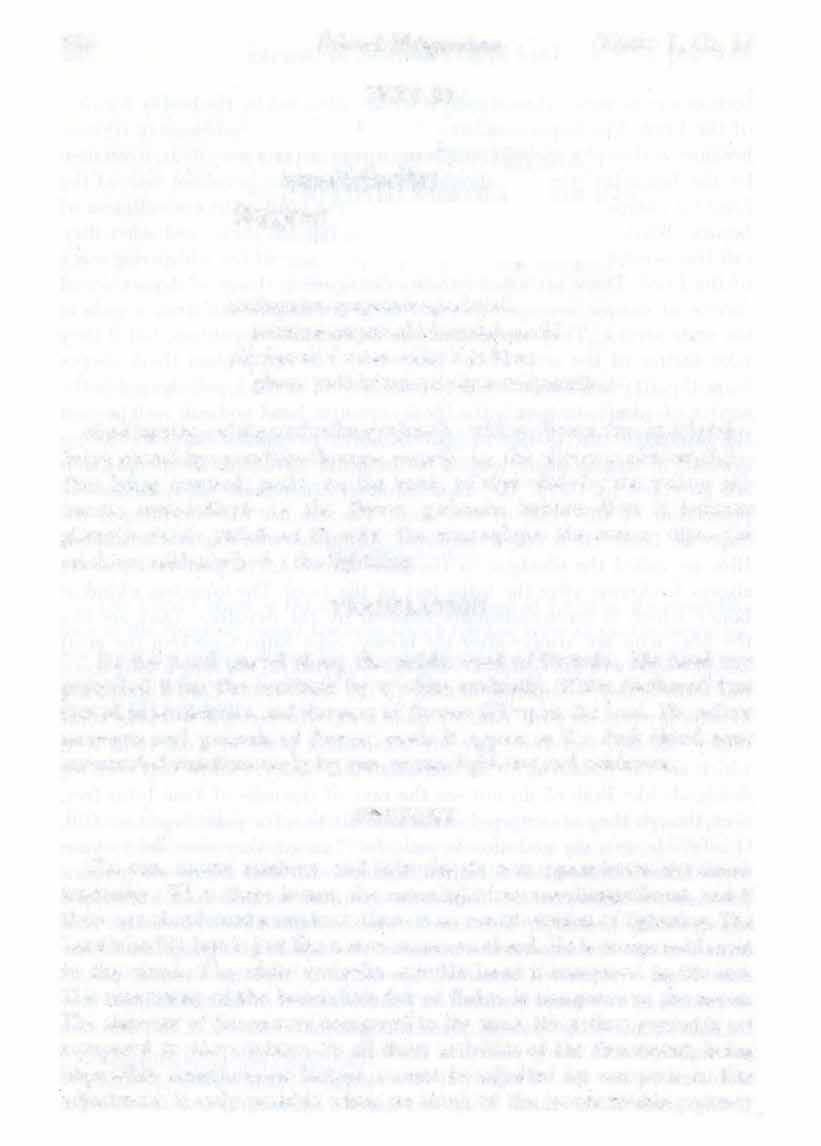
fu�1{1q"3tot('J1��: 3{�;r�"'ifdit�ftffl: f�W:tR:n
sitatapatra-vyajanair upaskrta�
prasiina-var§air abhivar§itaft pathi

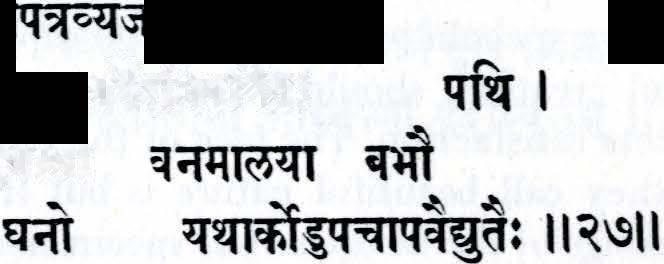
pisanga-viisa vana-malaya babhau
ghano yatharkofjupa-capa-vaidyutai�
sita-atapatra-white umbrella; vyajanai�-with a camara fan; upaskrta�being served by; prasiina- flowers ; var§aift-by the showers; abhivar§itaftthus being covered; pathi-on the road; pisanga-viisii-by the yellow garments; vana-miilayii-by the flower garlands; babhau-thus it became; ghanaft- cloud ; yathii- as if; arka-the sun; ufjupa-the moon; ciipa- the rainbow; vaidyutaift-by the lightning.
TRANSLATION
As the Lord passed along the public road of Dvaraka, His head was protected from the sunshine by a white umbrella. White feathered fans moved in semicircles,and showers of flowersfell upon the road. Hisyellow garments and garlands of flowers made it appear as if a dark cloud were surroundedsimultaneously by sun, moon, lightning andrainbows.
PURPORT
The sun, moon, rainbow and lightning do not appear in the sky simultaneously. When there is sun, the moonlight becomes insignificant, and if there are clouds and a rainbow,there is no manifestation of lightning. The Lord's bodily hue is just like a new monsoon cloud. He is compared herein to the cloud. The white umbrella over His head is compared to the sun. The movement of the hunch-hair fan of flukes is compared to the moon. The showers of flowers are compared to the stars. His yellow garments are compared to the rainbow. So all these activities of the firmament, being impossible simultaneous factors, cannot be adjusted by comparison. The adjustment is only possible when we think of the inconceivable potency.
586
[Canto 1, Ch. 11
of the Lord. The Lord is aU-powerful, and in His presence anything impossible can be inade possible by His inconceivable energy. But the situation created at the time of His passing on the roads of Dvarakii was beautiful and could not be compared to anything besides the des<;ription of natural phenomena.
TEXT 28


pravi§tas tu grharh pitro[I pari�vakta[I sva-miitrbhi[Ivavande sirasii sapta
devaki-pramukhii mudii
pravi�ta{l -after entering; tu -but ; grham-houses;pitro{l-of the father; pari�vakta{l-embraced; sva- miitrbhil; - by His own mothers; vavandeoffered obeisances; sirasii- His head; sapta- seven; devaki- Devaki; pramukhii-headed by; mudii-at that time.
TRANSLATION
After entering the house of His father, He was embraced by the mothers present, and the Lord offered His obeisances unto them by placing His head at their feet. The mothers were headed by Devaki [His real mother].
PURPORT
It appears that Vasudeva,the father of Lord Kr�l}a, had completely separate residential quarters where he lived with his eighteen wives, out of whom Srimati Devaki is the real mother of Lord Kr��a. But inspite of this, all other stepmothers were equally affectionate to Him, as will be evident from the following verse. Lord Kr��a also did not distinguish His real mother from His stepmothers, and He equally offered fiis obeisances unto all the wives of Vasudeva present on the occasion. According to scriptures also, there are seven mothers: l) the real mother, 2) the wife of the spiritual master, 3) the wife of a briihmar-a, 4) the wife of the king, 5) the cow, 6) the nurse, and 7) the earth. All of them are mothers. Even by this injunction of the siistras, the stepmother, who is the wife of the father, is
Text 28] Lord ���a's Entrance in Dvaraka 587
,..... .,.....� "' . ,......, SU'f-1���� T'ffi: 'fr�: �lqJq: I � f� ij1{ �� � 11��11
also as good as the mother because the father is also one of the spiritual masters. Lord Kr§l)a, the Lord of the universe,plays the part of an ideal son just to teach others how to treat their stepmothers.

TEXT 29

m: ��'ti(IQI �w"�r.�:
tii[l putram ankam iiropya
sneha-snuta-payodhariift har§a-vihvalitiitmiinaft
si§icur netrajair jalai[l
tiifi.-all of them ;putram-the son;ankam-the lap;iiropya- having placed on; sneha-snuta-moistened by affection; payodharii[l-breasts filled up; har�a-delight;vihvalita-iitmiinaft-overwhelmedby; si� icuft-wet;netrajaiftfrom the eyes;jalaift-water.
TRANSLATION
The mothers, after embracing their son, sat Him on their laps. Due to pure affection, milk sprang from their breasts. They were overwhelmed with delight, and the tears from their eyes wetted the Lord.
PURPORT
When Lord Kf§!la was at Vrndavana even the cows would become moistened by affection towards Him, and He would draw milk from the nipples of every affectionate living being, so wha·t to speak of the stepmothers who were already as good as His own mother.
TEXT 30
athiivi.Sat sva-bhavanarh

sarva-kiimam anuttamam
priisiidii yatra patniniirh
sahasrii!li ca �opl1Sa
588 Srimad-Bhagavatam (Canto 1, Ch. 11
atha- thereafter; aviSat- entered; sva-bhavanam-personalpalaces; saroaall; kamam-desires; anuttamam-perfect to the fullest extent ;priisiidiiftpalaces; yatra- where; patninam-of the wives numbering; sahasrarithousands; ca-over and above; §O!iasa- sixteen .




TRANSLATION
Thereafter, the Lord entered His palaces, which were perfect to the fullest extent. His wives lived in them, and they numbered over sixteen thousand.
PURPORT
Lord Kr�!la had 16,108 wives, and for each and every one of them there was a fully equipped palace complete with necessary compounds and gardens. Full description of these palaces is given in the Tenth Canto. All the palaces were made of the best marble stone. They were illuminated by jewels and decorated by curtains and carpets of velvet and silk, nicely bedecked and embroidered with gold lace. The Personality of Godhead means one who is full with all power, all energy, all opulences, all beauties, all knowledge and all renunciation. Therefore, in the palaces of the Lord there was nothing wanting for fulfilling all desires of the Lord. The Lord is unlimited, and therefore His desires are also unlimited, and the supply is also unlimited. Everything being unlimited, it is shortly described here as sarva-kamam, or full with all desirable equipment.
TEXT
Text 31] Lord ��l)a's Entrance in Dvaraki 589
31 �: .mt � •zc:•�ru•cd AJ\4M 6:sttdil;f\ilit«iitt: I �rMtft�ijeNwttwtwtt: II��II
v1i_dita-locanananii�
patnyaft patim pro�ya grhanupagatam vilokya saiijata-mano-mahotsava� uttasthur arat sahasasanasayat sakam vratair
patnya[l. -the ladies (wives of Lord Sri Kr�rya);patim- husband; p ro§yawho was away from home; grha-anupiigatam-now returned home; vilokyathus seeing; sanja ta- having developed; mana�-maha-utsava�-a sense of joyful ceremony within the mind; uttasthu[l.-got up; iiriit-from a distance; sahasa-all of a sudden; iisana --from the seats; iisayiit- from the state of meditation; siikam- along with; vratai[l.-the vow; vri�ita-looking coyly; locana-eyes;iinaniift- with such faces.

TRANSLATION

The queens of Lord Sri Kr��a rejoiced within their minds to see their husband home after a long period abroad_ The queens got up at once from their seats and meditations. As was socially customary, they covered their faces shyly and looked about coyly.
PURPORT
As mentioned above, the Lord entered His home palaces occupied by I6,108 queens. This means that the Lord at once expanded Himself in as many plenary expansions as there were queens and palaces and entered in each and every one of them simultaneously and separately. Here is another manifestation of the feature of His internal potency: He can expand Himself in as many forms of spiritual identity as He desires, even though He is one without a second. It is confirmed by the sruti mantra that the Absolute is one alone, and yet He becomes many as soon as He so desires. These manifold expansions of the Supreme Lord are manifested as plenary and separated portions. The separated portions are representations of His energy, and the plenary portions are manifestations of His Personality. Thus the Personality of Godhead manifested Himself in I6,108 plenary expansions and simultaneously entered into each and every one of the palaces of the queens. This is called vaibhava, or the transcendental potency of the Lord. And because He can do so, He is also known as yogesvara. Ordinarily a yogi or mystic living being is able to expand himself at utmost to tenfold expansions of his body, but the Lord can do so to the extent of as many thousands or infinitely, as He likes. Unbelievers become astonished to learn that Lord Kr�!la married more than 16,000 queens because they think of Lord Kr�!la as one of them and measure the potency of the Lord by their own limited potency. One should know, therefore, that the Lord is never on the level of the living beings who are but expansions of His marginal potency, and one should never equalize
590 Srimad-Bhagavatam [Canto I, Ch_ II
the potent and the potency, although there is very little difference of quality between the potent and the potency. The queens were also expansions of His internal potency, and thus the potent and potencies are perpetually exchangingtranscendental pleasures, known as pastimes of the Lord. One should not, therefore, become astonished to learn that the Lord married so many wives. On the contrary, one should affirm that even if the Lord marries sixteen thousand million wives, He is not completely manifesting His unlimited and inexhaustible potency. He married only 16,000 wives and entered in each and every one of the different palaces just to impress in the history of the human beings on the surface of the earth that the Lord is never equal to or lesser than any human being, however powerful he may be. o one is, therefore, either equal to or greater than the Lord. The Lord is always great in all respects. "God is great" is eternal truth.
Therefore, as soon as the queens saw from a distance their husband, who was away fromhome forlong periods due to the Battle of Kuruk�etra, they all arose from the slumber of meditation and prepared to receive their most beloved. According to Yajfiavalkya's religious injunctions, a woman whose husband is away from home should not take part in any social functions, should not decorate her body, should not laugh and should not go to any relative's house in any circumstance. This is the vow of the ladies whose husbands are away from home. At the same time, it is also enjoined that a wife should never present herself before the husband in an unclean state. She must decorate herself with ornaments and good dress and should always be present before the husband in a happy and joyous mood. The queens of Lord Kr�!la were all in meditation, thinking of the Lord's absence, and were always meditating upon Him. The Lord's devotees cannot live for a moment without meditating on the Lord, and what to speak of the queens who were all goddesses of fortune incarnated as queens in the pastimes of the Lord at Dvaraka. They can never be separated from the Lord, either by presence or by trance. The gopis at Vrndavana could not forget the Lord when the Lord was away in the for· est cow herding. When the Lord boy Kpll)a was absent from the village, the gopis at home used to worry about Him traversing the rough ground with His soft lotus feet. By thinking thus, they were sometimes over· whelmed in trance and mortified in the heart. Such is the condition of the pure associates of the Lord. They are always in trance, and so the queens also were in trance during the absence of the Lord. Presently, having seen the Lord from a distance, they at once gave up all their engagements, including the vows of women as described above. According to Sri

Text 31] Lord KJ:��a's Entrance in Dvaraka 591
Visvanatha Cakravarti Thakur, there was a regular psychological reaction on the occasion. First of all, rising from their seats, although they wanted to see the husband, they were deterred because of feminine shyness. But due to strong ecstasy, they overcame that stage of weakness and became caught up with the idea of embracing the Lord, and this thought factually made them unconscious of their surrounding environment. This prime state of ecstasy annihilated all other formalities and social conventions, and thus they escaped all stumbling blocks in the path of meeting the Lord. And that is the perfect stage of meeting the Lord of the soul, Sri Km�.a.
TEXT 32

<tte�fliM0€¥4-n
((rd'INI: qf(�fl« 1ffil1{ I f;M:¥PCI(Iii4(1 ifritR���f ��������
tam iitmajair dntibhir antariitmanii duranta-bhiivii� parirebhire patim niruddham apy iisravad ambu netrayor vilajjatiniirit bhrgu-varya vaiklaviit
tam-Him (the Lord); iitmajai�-by the sons; d!§tibh*-by the sight; antara-iitmanii-by the innermost part of the heart; duranta-bhiiviiftinsuperable ecstasy; parirebhire-embraced; patim-husband; niruddhamchoked up; api-in spite of; iisravat-tears; ambu-like drops of water; netrayo�-from the eyes; vilajjatiniim-of those compact in shyness; bhrgu-varya-0 chief of the Bhrgus; vaiklaviit- inadvertently .
TRANSLATION
The insuperable ecstasy was so strong that the queens, who were shy, first embraced the Lord in the innermost recesses of their hearts. Then they embraced Him visually, and then they sent their sons to embrace Him [which is equal to personal embracing]. But, 0 chief amongst the Bhrgus, though they tried to restrain their feelings, they inadvertently shed tears.
592 Srimad-Bhagavatam [Canto 1, Ch. 11
PURPORT
Although due to feminine shyness there were many hindrances to embracing the dear husband Lord Sri Kr�p.a, the queens performed that act by seeing Him, by putting Him in the core of their hearts, and by sending their sons to embrace Him. Still, the act remained unfinished, and tears rolled down their cheeks despite all endeavors to check them. One indirectly embraces the husband by sending the son to embrace him because the son is developed as part of the mother's body. The embrace of the son is not exactly the embrace of husband and wife from the sexual point of view, but the embrace is satisfaction from the affectionate point of view. The embrace of the eyes is more effective in the conjugal relation, and thus according to Srila Jiva Gosvam'ithere is nothing wrong in such an exchange of feeling between husband and wife.
yadyapy asau piirsva-gato raho-gatas
tathiipi tasyiinghri-yugarh navarh navam
pade pade kii virameta tat-padiic
caliipi yac chrir na jahiiti karhicit
yadi- although; api-certainly;asau-He (Lord Sri Kr�Qa);piirsva-gatafi.just by the side; rahafi.-gatafi.- exclusively alone; tathiipi-still; tasya- His; anghri-yugam-the feet of the Lord; navam navam-newer and newer; pade- step; pade-in every step; kii-who; virameta-can be detached from; tat-padiit-from His feet; caliipi- moving; yat-whom; sn{l-the goddess of fortune; na-never; jahiiti-quits; karhicit-at any time.

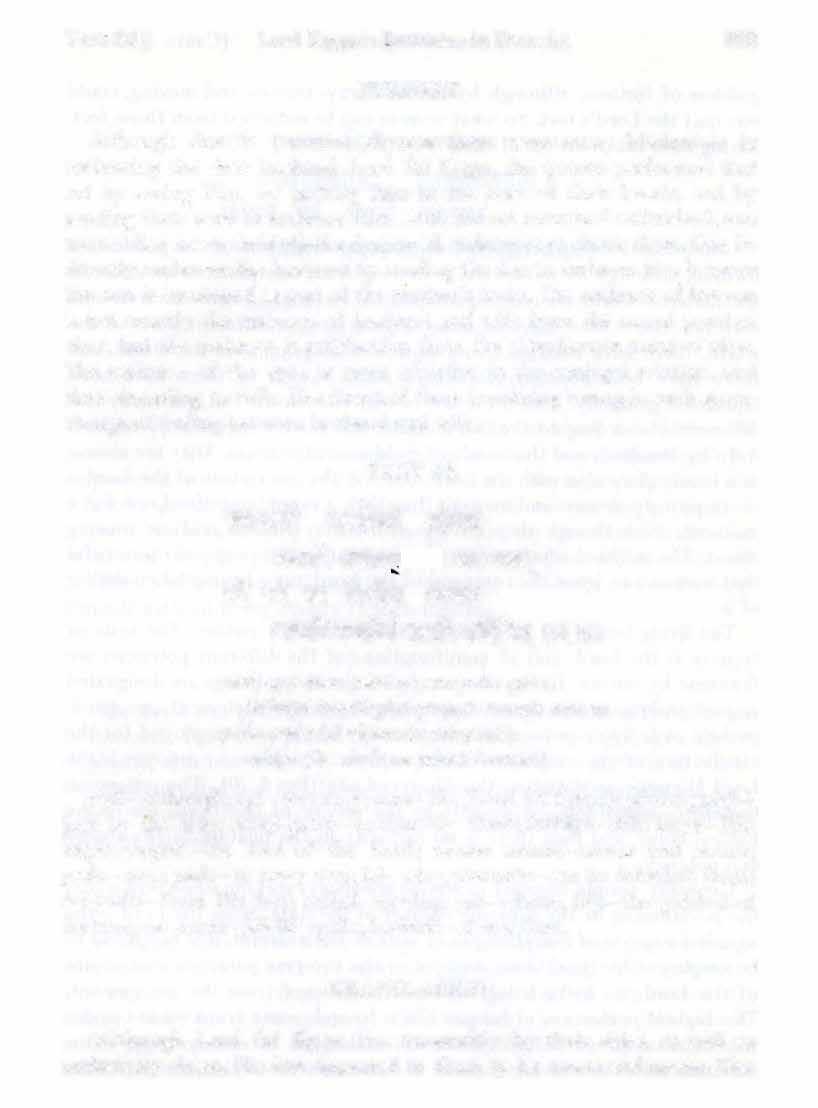
TRANSLATION
Although Lord Sri Kr��a was constantly by their sides, as well as exclusively alone, His feet appeared to them to be newer and newer. The
Text 33] Lord ���a's Entrance in Dvaraka 593
��'liT��
TEXT 33 ijqtq((l �1161 ��6(4411 wR�I
�tfipr�lf.fGitlf<f41lffRl<t_II��II
goddess of fortune, although by nature always restless and moving, could not quit the Lord's feet. So what woman can be detached from those feet, having once taken shelter of them?
PURPORT
Conditioned living beings are always after the favor of the goddess of fortune, although by nature she is moving from one place to another. In the material world no one is permanently fortunate, however clever one may be. There have been so many big empires in different parts of the world, there have been so many powerful kings all over the world, and there have been so many fortunate men, but all of them have been liquidated gradually. This is the law of material nature. But spiritually it is different. According to Brahma-sarhhitii, the Lord is served very respectfully by hundreds and thousands of goddesses of fortune. They are always in a lonely place also with the Lord. But still the association of the Lord is so inspiringly newer and newer that they cannot quit the Lord for a moment, even though they are by nature very restless and are moving about. The spiritual relation 'vith the Lord is so enlivening and resourceful that no one can leave the company of the Lord, once having taken shelter of it.
The living beings are by constitution feminine by nature. The male or enjoyer is the Lord, and all manifestations of His different potencies are feminine by nature. In the Bhagavad-gitii, the living beings are designated as parii-prakrti, or the superior potency. The material elements are apariiprakrti, or inferior potency. Such potencies are always employed for the satisfaction of the employer or the enjoyer. The supreme enjoyer is the Lord Himself, as .stated in the Bhagavad-gitii (Bg. 5.29). The potencies, therefore, when engaged directly in the service of the Lord, revive the natural color, and thus there is no disparity in the relation of the potent and potency.
Generally people engaged in service are always seeking some post under the government or the supreme enjoyer of the state. Since the Lord is the supreme enjoyer of everything in or outside the univers.e, it is happiness to be employed by Him. Once engaged in the supreme governmental service of the Lord, no living being wishes to be relieved from the engagement. The highest perfection of human life is to seek some employment under the Lord's supreme service. That will make one extremely happy. One need not seek the moving goddess of ·fortune without the relation of the Lord.

594 Srimad-Bhagavatam [Canto l, Ch_ ll
TEXT 34

� � �'ll�flii11*J1f(uftf¥�: qf(t�6�� I fiAR � � ��ii1J � �;{tq(;, �: 11�\111
evarh nrpiirtiirh k§iti-bhiira-janmaniim ak§auhirtibhifl parivrtta-tejasiim vidhiiya vairarh svasano yathiinalarh mitho vadhenoparat_o niriiyudhal)
evam-thus ; nrpiir.iim-of the kings or administrators; k�iti-bhiira-the burden of the earth; janmanam-born in that way; ak�auhir."ibhi�empowered by a military strength of horses, elephants, chariots and infantry; parivrtta- being puffed up by such surroundings; tejasiimprowess; vidhaya-having created; vairam-hostility; svasanab--interaction of air and the pipe plants; yathii-as it is; analam-fire ; mitha . Z,. -wit h one another; vadhena-by killing them; uparataZ,. - relieved ; niriiyudhaf!.- by Himself without being a party to such fighting.
TRANSLATION
The Lord was pacified after killing those kings who were burdensome to the earth. They werepuffed up with their military strength, theirhorses, elephants, chariots, infantry, etc. He Himself was not a party in the fight. He simply created hostility between the powerful administrators, and they fought amongst themselves. He was like the wind which causes friction between bamboos and so sparks a fire.
PURPORT
As stated above, the living beings are not factual enjoyers of things which are manifested as God's creation..The Lord is the genuine proprietor and enjoyer of everything manifested in His creation. Unfortunately, influenced by the deluding energy, the living being becomes afalse enjoyer under the dictation of the modes of nature. Puffed up by such a false sense of becoming God, the deluded living being increaSes his material strength by so many activities and thus becomes the burden of the earth,
Text 34) Lord Kts.n.a's Entrance in Dvaraka
595
so much so that the earth becomes completely uninhabitable by the sane. This state of affairs is called dharmasya gliirzi�, or misuse of the energy of the human being. When such misuse of human energy is prominent, the saner living beings become perturbed by the awkward situation created by the vicious administrators who are simply burdens of the earth, and the Lord appears by His internal potency just to save the saner section of humanity and_to alleviate the burden due to the earthly administrators in different parts of the world. He does not favor either of the unwanted administrators, but by His potential power He creates hostility between such unwanted administrators, as the air creates fire in the forest by the friction of thebamboos.Thefireinthe forest takesplace automaticallybythe force of the air, and similarly the hostility between different groups of politieians takes place by the unseen design of the Lord. The unwariled administrators, puffed up by false power and military strength, thus become engaged in fighting amongst themselves over ideological conflicts and so exhaust themselves of all powers. The history of the world reflects this factual will of the Lord, and it will continue to be enacted until the living beings are attached to the service of the Lord.In the Bhagavad-gitii this fact is very vividly described (Bg. 7.14-15). It is said, "The deluding energy is My potency, and thus it is not possible for the dependent living beingsto supersede the strength of the material modes. But those whotake shelter in Me [the Personality of Godhead Sri Kr�pa] can cross over the gigantic ocean of material energy." This means that no one can establish peace and prosperity in the world by fruitive activities or by speculative philosophy or ideology. The only way is to surrender unto the Supreme Lord and thus become free from the illusion of the deluding energy. Unfortunately persons who are engaged in destructive work are unable to surrender unto the Personality of Godhead. They are all fools of the first order; they are the lowest of the human species of life; they are robbed of their knowledge, although apparently they seem to be academically educated. They are all of the demoniac mentality, always challenging the supreme power of the Lord. Those who are very materialistic, always hankering after material power and strength, are undoubtedly fools of the firstorder because theyhave no information of the living energy, and being ignorant of that supreme spiritual science, they are absorbed in material science, which ends with the end of the material body. They are the lowest of human beings because the human life is especially meant for reestablishing the lost relation with the Lord, and they miss this opportunity by being engaged in material activities. They are robbed of their knowledge because even after prolonged speculation they cannot reach to the stage of knowing the Personality of Godhead, the summum bonum

596 Srimad-Bhagavatam [Canto 1, Ch. 11
of everything. And all of them are men of demonic principle, and they suffer the consequences, as did such materialistic heroes as Rava!la, Hira!lyakasipu, Kamsa and others.
TEXT 35


� � 1 � 4Jll(ittWJ � � � ����II
sa e§a nara-loke 'sminn avati'!lafl sva-miiyayii reme stri-ratna-kutastho bhagaviin priikrto yathii
sa�-He (the Supreme Personality of Godhead); e�a�-all these; naraloke-on this planet of human beings; asmin-on this; avat"ir!la�-having appeared;sva-personal, internal; miiyayii-causeless mercy;reme-enjoyed; stri-ratna-woman who is competent to become a wife of the Lord; kiitastha��among; bhagaviin-the Personality of Godhead; priikrta[lmundane;yathii- as if it were.
TRANSLATION
That Supreme Personality of Godhead Sri .Kf�!la, out of His causeless mercy, appeared on this planet by His internal potency and enjoyed Himself amongst competent women as if He were engaging in mundane affairs.
PURPORT
The Lord married and lived like a householder. This is cetainly like a mundane affair, but when we learn that He married 16,108 Wives and lived with them separately in each and every palace, certainly it is not mundane. Therefore, the Lord, liVing as a householder amongst His competent wives, is never mundane, and His behavior with them is never to be understood as mundane sex relation. The women who became the wives of the Lord are certainly not ordinary women, because to get the Lord as one's husband is the result of many, many millions of births' tapasya (austerity). When the Lord appearson different lokas, or planets, oron this planet of human beings, He displays His transcendentalpastimes just to attract the conditioned souls to become His eternal servitors, friends, parents and lovers respectively in the transcendental world where
Text 35] Lord l<.r�J!a's Entrance in Dvaraka 597
the Lord eternally reciprocates such exchanges of service. Service is pervertedly represented in the material world and broken untimely, resulting in sad experience. The illusioned living being conditioned by material nature cannot understand out of ignorance that all our relations here in the mundane world are temporary and full of inebrieties. Such relations cannot help us be happy perpetually, but if the same relation is established with the Lord, then we are transferred to the transcendental world after leaving this material body and become eternally related with Him in the relation we desire. The women amongst whom He lived as their husband are not,therefore, women of this mundane world, but are eternally related with Him as transcendental wives, a position which they attained by perfection of devotional service. That is their competency. The Lord is param brahma, or the Supreme Personality of Godhead. Conditioned souls seek after perpetual happiness in all places-not only on this earth but also on otherplanets throughouttheuniverse because constitutionally a spiritual spark, as he is, can travel to any part of God's creation. But being conditioned by the material modes, he tries to travel in space by spacecraft and so fails to reach his destination. The law of gravitation is binding upon him like the shackles of a prisoner. By other processes he can reach anywhere, but even if he reaches the highest planet, he cannot attain that perpetual happiness which he is searching after life after life. When he comes, however, to his senses, he seeks after Brahman happiness, knowing it for certain that unlimited happiness, which he is seeking, is never attainable in the material world. As such, the Supreme Being, Param Brahman, certainly does not seek His happiness anywhere in the material world. Nor can His paraphernalia of happiness be found in the material world. He is not impersonal. Because He is the leader and Supreme Being amongst innumerable living beings, He cannot be impersonal. He is exactly like us, and He has all the propensities of an individual living being in fullness. He marries exactly like us, but His marriage is neither mundane nor limited by our experience in the conditioned state. His wives, therefore, appear like mundane women, but factually they are all transcendental liberated souls, perfect manifestations of internal energy.
TEXT 36



598 Srimad-Bhagavatam [Canto l, Ch. ll
iftcHil•f.tc:<itrisftf�I �::qcqqllt(ldlqi(l*I+U�I �P�4fitq�{i��q:11�11
uddiima-bhiiva-pi.Suniimala-valguhiisavrir}iivaloka-nihato madano pi yiisiim
sammuhya ciipam ajahiit pramadottamiis tii yasyendriyam vimathitum kuhakair na sekufl.
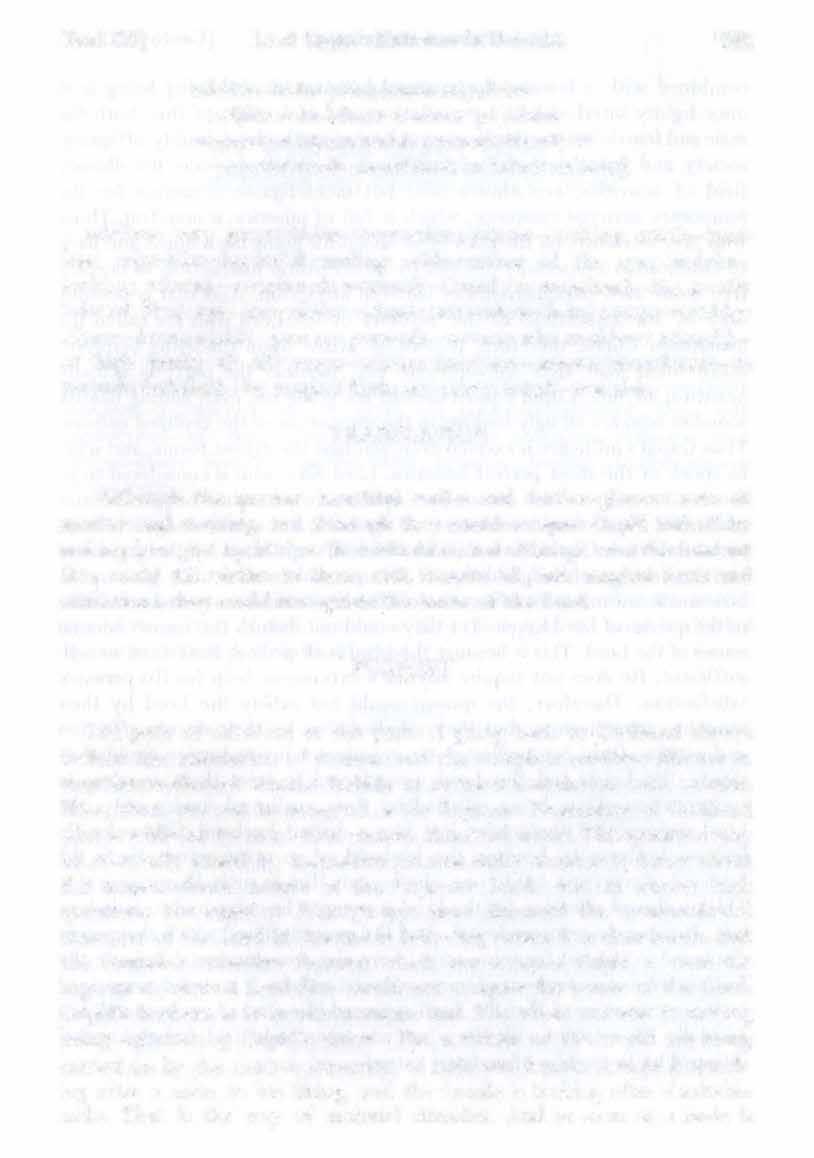
uddiima- very grave; bhiiva-expression; pi.Suna-exciting; amala- spotless; valgu-hiisa- beautiful smiling; vri"r}a- corner of the eye; avalokalooking; nihataft- conquered; madanalt - Cupid (or amadanalt - the greatly tolerant Siva); api- also;yiisiim- whose; sammuhya-being overpowered by; ciipam-bows; ajahiit - gave up; pramada- woman who maddens; uttamiiftof high grade; tii-all; yasya- whose; indriyam- senses ; vimathitum-to perturb; kuhakailt-by magical feats; na - never; sekuft-was able.
TRANSLATION
Although the queens' beautiful smiles and furtive glances were all spotless and exciting, and although they could conquer Cupid himself by making him give up.his bow in frustration, and although even the tolerant Siva could fall victim to them, still, despite all their magical feats and attractions, they could not agitate the senses of the Lord.
PURPORT
The path of salvation or the path of going back to Godhead always forbids the association of women, and the complete saniitana-dharma or va'!liisrama-dharma scheme forbids or restricts association with women. How, then, can one be accepted as the Supreme Personality of Godhead who is addicted to more than sixteen thousand wives? This question may be relevantly raised by inquisitive persons really anxious t<? know about the transcendental nature of the Supreme Lord. And to answer such questions, the sages at Naimi�arapya have discussed the transcendental character of the Lord in this and in following verses. It is clear herein that the feminine attractive features which can conquer Cupid or even the supermost tolerant Lord Siva could not conquer the senses of the Lord. Cupid's business is to invoke mundane lust. The whole universe is moving being agitated by Cupid's arrow. The activities of the world are being carried on by the central attraction of male and female. A male is searching after a mate to his liking, and thP- female is looking after a suitable male. That is the way of material stimulus. And as soon as a male is
Text 36] Lord �1!'1a's Entrance in Dvaraka
599
combine� with a female, the material bondage of the living being is at once tightly interlocked by sex relation, and as a result of this, both the maleand female'sattraction for sweet home, motherland, bodily offspring, society and friendship and accumulation of wealth become the illusory field of activities, and thus a false but indefatigable attraction for the temporary material existence, which is full of miseries, is manifest. Those who are, therefore, on the path of salvation for going back home and back to Godhead are especially advised by all scriptural instruction to become free from such paraphernalia of material attraction. And that is possible only by the association of the devotees of the Lord who are called the mahiitmiis. Cupid, therefore, throws his arrow upon the living beings to make them mad after the opposite sex, whether the party is actually beautiful or not. Cupid's provocations are going on, even among beastly societies who are all ugly-looking in the estimation of the civilized nations. Thus Cupid's influence is exerted even amongst the ugliest forms, and what to speak of the most perfect beauties. Lord Siva, who is considered to be most tolerant, was also struck by Cupid's arrow because he also became mad after the Mohini incarnation of the Lord and acknowledged himself to be defeated. Cupid, however, was himself captivated by the grave and excitingdealings of the goddesses of fortune, and he voluntarily gave uphis bowandarrowina spirit of frustration. Such was the beauty and attraction ofthe queensof Lord Kr�!la. Yet they could not disturb the transcendental sensesofthe Lord. This is because the Lord is all-perfect iitmiiriima, or selfsufficient. He does not require anyone's extraneous help for His personal satisfaction. Therefore, the queens could not satisfy the Lord by their feminine attractiveness, but they satisfied Him by their sincere affection and service. Only by unalloyed transcendental loving service could they satisfy the Lord, and the Lord was pleased to treat them as wives in reciprocation. Thus being satisfied by their unalloyed service only, the Lord reciprocated the service just like a devout husband. Otherwise He had no business to become the husband of so many wives. He is the husband ofeveryone, but to one who accepts Him as such, He reciprocates. This unalloyed affection for the Lord is never to be compared to mundane lust. It i� purely transcendental. And the grave dealings, which the queens displayed in natural feminine ways, were also transcendental because the feelings wereexpressedout of transcendental ecstasy. Itis already explained in the previous verse that the Lord appeared like a mundane husband, but factually His relation with His wives was transcendental, pure and unconditioned by the modes of material nature.

600 Srimad-Bhagavatam [Canto I, Ch. II
TEXT 37

m � � �tc1\·+tN tcf1\·<i4( I 311�1q4-.�041�14�ffi�: 11�\911
tam ayarh manyate loko hyasangam api sanginam iitmaupamyena manujarh vyiip_n;wiinarh yato 'budha[l,
tam-unto Lord Kp�qa; ayam-al! these (common men); manyate-do speculate within the mind; loka[l,-the conditioned souls; hi-certainly; asahgam-unattached ; api-in spite of; sanginam-affected; atma-self; aupamyena-by comparison with the self; manujam-ordinary man; V)'iiprr-viinam- being engaged in; yata[l,-because; abudhafi.-foolish because of ignorance.
TRANSLATION
The common materialistic conditioned souls speculate that the Lord is one of them. Out of their ignorance they think that the Lord is affected by matter, although He is unattached.
PURPORT
The word abudha[l, is significant here. Due to ignorance only, the foolish mundane wranglers misunderstand the Supreme Lord and spread their foolish imaginations amongst innocent persons by propaganda. The Su· preme Lord Sri Kf�p.a is the original primeval Personality of Godhead, and when He was personally present before the eyes of everyone, He displayed full-fledged divine potency in every field of activities. As we have already explained in the first verse of Srimad-Bhiigavatam, He is completely independent to act however He likes, but all His actions are full of bliss, knowledge and eternity. Only the foolish mundaners misunderstand Him, unaware of His eternal form of knowledge and bliss which is confirmed in the Bhagavad-gitii and Upani§ads. His different potencies work in a perfect plan of natural sequence, and doing everything by the agency of His different potencies, He remains eternally the supreme independent.
Text 37)
Lord ���a's Entrance in Dvaraka
601
When He descends on the material world by His causeless mercy to different living beings, He does so by His own potency, He is not subject to any condition of the material modes of nature, and He descends as He is originally. The mental speculators misunderstand Him as the Supreme Person, and they consider His impersonal features as inexplicable Brahman tobe all. Such a conception is also the product of conditioned life, because they cannot go beyond their own personal capacity. Therefore, one who considers the Lord on the level of one's limited potency is only a common man. Such a man cannot be convinced that the Personality of Godhead is always unaffected by the modes of material nature. He cannotunderstand that the sun is always unaffected by infectious matter. The mental speculators compare everything from the standpoint of experimental knowledge of their own selves. Thus when the Lord is found to act like an ordinary person in matrimonial bondage, they consider Him to be like one of them, without considering that the Lord can marry at once sixteen thousand wives or more. Due to a poor fund of knowledge they accept one side of the picture while disbelieving the other. This means·that due to ignorance only they always think of Lord Kr�!la as like themselves and make their own conclusions, which are absurd and unauthentic from the version of the Srimad-Bhiigavatam.
TEXT 38

*«<t:1,"14l:ti�stt'M(Iqlsfil �: I � ��s�,;ft(ija:i�����II
etad isanam iSasya
prakrti-stho 'pi tad-gu[lai[!
na yujyate sadii "tma-sthair
yathii buddhis tad-iisrayii
etat- this; iSanam-divinity; iSasya-of the Personality of Godhead; prakrti-sthaft- being in contact with material nature; api-in spite of; tat-gurtaift-by the qualities; na-never; yujyate-is affected; sadii iitmasthaift-by those who are situated in eternity; yathii-as is; buddhifl.intelligence; tat-the Lord; iisrayii-those who are under the shelter of.
TRANSLATION
This is the divinity of the Personality of Godhead: He is not affected by the qualities of material nature, even though He is in contact with them.
602 Srimad-Bhagavatam [Canto I, Ch. II
Similarly, the devotees who have taken shelter of the Lord do not become influenced by the material qualities.
PURPORT
In the Vedas and Vedic literatures (Sruti and Smrti) it is affirmedthat in the Divinity there is nothing material. He is transcendental (nirgu[la) only, the supreme cognizant. Hari, or the Personality of Godhead, is the Supreme transcendental Person situated beyond the range of material affection. These statements are also confirmed even by Acarya Sankara. One may argue that His relation with the goddesses of fortune may be transcendental, but what about His relation with the Yadu dynasty, being born in that family, or His killing the nonbelievers like Jarasandha and other asuras directly in contact with the modes of material nature. The answer is that the Divinity of the Personality of Godhead is never in contact withthe qualities ofmaterial nature inany circumstances.Actually He is in contact with such qualities because He is the ultimate source of everything, yet He is above the actions of such qualities. He is known, therefore, asYoge8vara, or the master of mystic power, or in other words the all-powerful. Even His learned devotees are not affected by the influence of the material modes. The great six Gosvamis of Vrndavana all came from greatly rich and aristocratic families, but when they adopted the life of mendicants at Vrndavana, superficially they appeared to be in wretched conditions of life, but factually they were the richest of all in spiritual values. Such mahiibhiigavatas, or first-grade devotees, although moving amongst men, are not contaminated by honor or insult, hunger orsatisfaction, by sleep or wakefulness, which are all resultant actions of the three modes of material nature. Similarly, some ofthem are engaged in worldly dealings, yet are unaffected. Unless these neutralities of life are there, one cannot be considered situated in transcendence. The Divinity and His associates are on the same transcendental plane, and their glories- are always sanctified by the action of yogamiiyii, or the internal potency of the Lord. The devotees of the Lord are always transcendental, even if they are sometimes found to have fallen in their behavior. The Lord emphatically declares in the Bhagavad-gitii (Bg. 9.30) that even if an unalloyeddevoteeis found tobe fallen due to a previom material contamination, he is nevertheless to be accepted as fully transcendental becauseof his being engaged cent percent in the devotional service of the Lord. The Lord protects him always because of his rendering service unto Him, and the fallen conditions are to be considered accidental and temporary. They will vanish in no time.
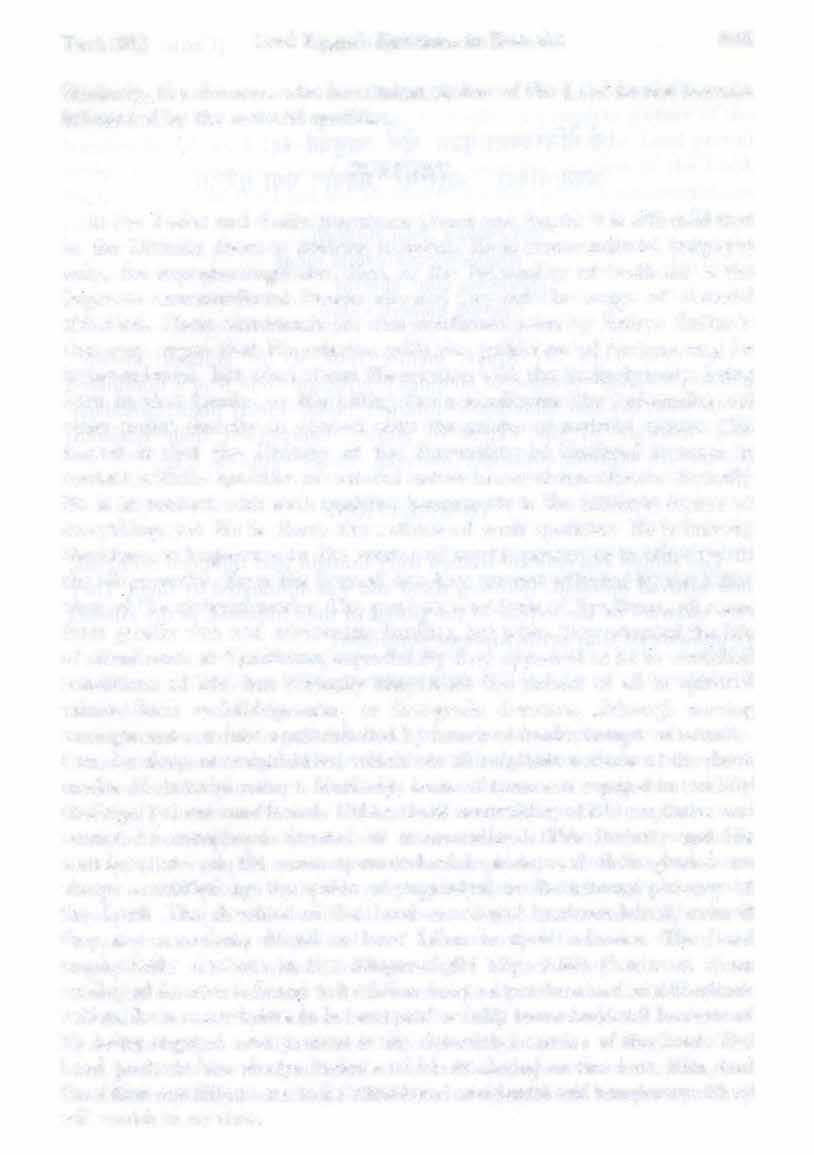
Text 38] Lord ��Qa's Entrance in Dvaraka 603
Srimad-Bhagavatam
TEXT 39

tarh menire 'balii miiphii� strairwrh ciinuvratarh rahaft
apramiir-a-vido bhartur
isvararh matayo yathii
tam-unto Lord Sri Kr�l)a; menire-took it for granted; abaliiftdelicate; miiphiift-because of simplicity; s trairwm-one who is dominated by his wife; ca-also; anuvratam-follower; rahaft-1one1y place; apramiir-avida�-unaware of the extent of glories; bhartu[t-of their husband; iSvaram-the supreme controller; matayaft-thesis; yat hii- as it is.

TRANSLATION
The simple and delicate women truly thought that the Lord Sri Kf�pa, their beloved husband, followed them and was dominated by them. They were unaware of the extent of the glories of their husband, as the atheists are unaware of Him as the supreme controller.
PURPORT
Even the transcendental wives of Lord Sri Kr�pa did not know completely the unfathomable glories of the Lord. This ignorance is not mundane because there is some action of the internal potency of the Lord in the exchange of feelings between Him and His eternal associates. The Lord exchanges transcendental relations in five ways, as proprietor, master, friend, son and lover, and in each of these pastimes He plays fully by the potency of yogamiiyii, the internal potency. He plays exactly like an equal friend with the cowherd boys or even with friends like Arjuna. He plays exactly like a son in the presence of Y asodamata, He plays exactly like a lover in the presence of the cowherd damsels, and He plays exactly like a husband in the presence of the queens of Dviiraka. Such devotees of the Lord never think of the Lord as the Supreme, but think of Him exactly as a common friend, a pet son or a lover or husband very much dear to heart and soul. That is the relation between the Lord and His transcendental devotees, who act as His associates in the spiritual sky
604
[Canto l, Ch. ll
where there are innumerable Vaikup.tha planets. When the Lord descends, He does so along with His entourage to display a complete picture of the transcendental world where pure love and devotion for the Lord prevail without any mundane tinge of lording it over the creation of the Lord. Such devotees of the Lord are all liberated souls, perfect representations of the marginal or internal potency in complete negation of the influence of the external potency. The wives of Lord Kf�p.a were made to forget the immeasurable glories of the Lord by the internal potency so that there might not be any flaw of exchange, and they took it for granted that the Lord was a henpecked husband, always following them in lonely places. In other words, even the personal associates of the Lord do not know Him perfectly well, so what do the thesis writers or mental speculators know about the transcendental glories of the Lord? The mental speculators present different theses as to His becoming the causes of the creation, the ingredients of the creation or the material and efficient cause of the creation, etc., but all this is but partial knowledge about the Lord. Factuallythey are asignorant asthe common man. The Lord canbe known by the mercy of the Lord only, and by no other means. But since the dealings of the Lord with His wives are based on pure transcendental love and devotion, the wives are all on the transcendental plane without material contamination.
Thus end the Bhaktivedanta purports of the First Canto, Eleventh Chapter, of the Srimad-Bhagavatam, entitled "Lord Kr�!la's Entrance into Dviirakii. "

Text 39] Lord ���a's Entrance in Dvaraka 605
CHAPTER TWELVE
BirthofEmperorParTk$it
TEXT I

5aunaka uviica a.Svatthiimnopasr§tena brahma-sirHWru-tejasii uttariiyii hato garbha
iSeniijivitafl punafl
sri saunakab- uvaca-thesageSaunaka said;asvatthamna-of Asvatthama (the son of Drol)a); upasr§tena-by release of; brahma-Szrfir-ii- the invincible weapon; brahmiistra; uru-tejasii-by high temperature; uttariiyii-of Uttara (mother of Pa�it);hatafl-being spoiled; garbha-womb; iSenabythe Supreme Lord;ajivitafl-broughttolife;punafi.-again.
TRANSLATION
The sage Saunaka said: The womb of Uttara, mother of Maharaja P�t, was spoiled by the dreadful and invincible brahmastra weapon released by ASvatthama. But Maharaja Par�it was saved by the Supreme Lord.
PURPORT
The sages assembled in the forest of Naimi�iira!lya inquired from Suta Gosvami about the birth of Maharaja Pa�it, but in course of the narration other topics like the release of brahmiistra bythesonof DroQa,
�� '!elt';:J 3N�f41t:;{tqqiwt iiiA�t�lllm 1
�� Plml: �: II
II
\i'q(I4U
�
607
his punishment by Arjuna, Queen Kuntidevi's prayers, the Pa!l�avas' visit to the place where Blu�madeva was lying, his prayers and thereafter the Lord's departure for Dvaraka were discussed. His arrival at Dvaraka and residing with the sixteen thousand queens, etc., were narrated. They were absorbed in hearing such descriptions, but now they wanted to turn to the original topic, and thus the inquiry was made by Saunaka ��i. So the subject of the release of the brahmiistra weapon by ASvatthama is renewed.
TEXT 2

� � �: �ur � 'iiil�¥4'1: 1
fiN;f � �l!4141ffl��1'{� II � II
tasya janma mahii-buddhefl. karmiirti ca mahiitmanafl. nidhanarh ca yathaiviisit sa pretya gataviin yathii
tasya-his (of Maharaja Parik�it);janma-birth; mahii-buddhefl.-of great intelligence; karmiirti-activities; ca-also; mahii-iitmanafl.-of the great devotee; nidhanam-demise; ca-also; yathii-as it was; eva-of course; iisit-happened;safl.-he;pretya-destination afterdeath;gataviin- achieved; yathii-as it were.
TRANSLATION
How was the great Emperor Parilq;it, who was a highly intelligent and great devotee, born in that womb? How did his death take place, and what did he achieve after his death?
PURPORT
The King of Hastinapura (now Delhi) used to be the Emperor of the world, at least till the time of the son of Emperor Parlk�it. Maharaja PanK.�it was saved by the Lord in the womb of his mother, so he could certainly be saved from an untimely death due to the ill will of the son of a briihmarta. Because the age of Kali began to act just after the assumption of power by Maharaja Parlk�it, the first sign of misgivings was exhibited in the cursing of a greatly intelligent and devoted king like
608
[Canto I, Ch. 12
Srimad-Bhagavatam
Maharaja Parlk�it. The king is the protector of the helpless citizens, and their welfare, peace and prosperity depend on him. Unfortunately, by the instigation of the fallen age of Kali, an unfortunate briihmaT)a's son was employed to condemn the innocent Maharaja Parilqit, and so the King had to prepare himself for death within seven days. Maharaja Par�it is especially famous as one who is protected by Vil2I)u, and when he was unduly cursed by a briihmaT)a's son, he could have invoked the mercy of the Lord to save him, but he did not want to because he was a pure devotee. A pure devotee never asks the Lord for any undue favor. Maharaja PanK.�it knew that the curse of the briihmaT)a's son upon him was unjustified, as everyone else knew, but he did not want to counteract it because he knew also that the age of Kali had begun and that the first symptom of the age, namely degradation of the highly talented briihmaT)a community, had also begun. He did not want to interfere with the current of the time, but he prepared himself to meet death very cheerfully and very properly. Being fortunate, he got at least seven days to prepare himself to meet death, and so he properly utilized the time in the association of Sukadeva Gosvami, the great saint and devotee of the Lord.
TEXT3

�l6\1t�fl\�1fil tr��tt� I
�WI!'l�lwtlwtf � �1'1¥\G\1��€6: II � II
tad idarh srotum icchiimo gaditurh yadi manyase briihi na� sraddadhiiniiniirh yasya jniinam adiic chuka[l.
tat-all; idam-this; srotum-to hear; icchiima[l.-all willing; gaditumto narrate; yadi-if; manyase-you think; briihi-please speak, na[l.-we; sraddadhiiniiniim-who are very much respectful; yasya-whose; jniinamtranscendental knowledge; adiit-delivered; suka[l.-Sri Sukadeva Gosvami.
TRANSLATION
We all respectfully want to hear about him [Maharaja Par�it l to whom Sukadeva Gosvami imparted transcendental knowledge. Please speakonthismatter.
Text3) Birth of EmperorPar�it 609
PURPORT
Sukadeva Gosvarni imparted transcendental knowledge to Maharaja Parik�it during the remaining seven days of his life, and Maharaja Parik�it heard him properly, just like an ardent student, and the effect of such a bona fide hearing and chanting of $rimad-Bhiigavatam was equally shared by both the hearer and the chanter. Both of them were benefited. Out of the nine different transcendental means of devotional service of the Lord prescribed in the Bhii.gavatam, either all of therri, or some of them or even one of them, are equally beneficial if properly discharged. Maharaja Panlqit and Sukadeva Gosvami were serious performers of the first two important items, namelytheprocess of chanting and the process of hearing, and therefore both of them were successful in their laudable attempt. Transcendental realization is attained by such serious hearing and chanting and not otherwise. There is a type of spiritual master and disciple much advertised in this age of Kali. It is said that the master injects spiritual forceinto the disciple by an electrical current generated by the master, and the disciple begins to feel the shock. He becomes unconscious, and the master weeps for his exhausting his store of so-called spiritual assets. Such bogus advertisement is going on in this age, and the poor common man is becoming the victim of such advertisement. We do not find such folk tales in the dealings of Sukadeva Gosvami and his great disciple Maharaja Parik�it. The sage recited $rimad-Bhiigavatam in devotion, and the great King heard him properly. The King did not feel any shock of electrical current from the master, nor did he become unconscious while receiving knowledge from the master. One should not, therefore, become a victim of these unauthorized advertisements made by some bogus representative of Vedic knowledge. The sages of Naimi�a!J.ya were very respectful in hearing about Maharaja Parik�it because of his receiving knowledge from Sukadeva Gosvarni by means of ardent hearing. Ardent hearing from the bona fide master is the only way to receive transcendental knowledge, and there is no need for medical performances or occult mysticism for miraculous effects. The process is simple, but only the sincere party can achieve the desired result.

610 Srimad-Bhagavatam [Canto I, Ch. 12
TEXT4 � � ac4)q8(4uac:--- �- �: 1 f.(:�:��:f)\Uiqlii;t1�ijffi II� II
Birth of Emperor Par�it
suta uviica apipalad dharma-riijaft pit.rvad raiijayan prajiift niftsprhaft sarva-kamebhyaft
kr�T}a-piidiinusevayii
sri sutaft uviica-Sr1 Suta Gosvam! said;apipalat-administered prosperity; dharma-riijaft-King Yudhi�thira; pitrvat-exactly like his father; raiijayan-pleasing; prajiift-all those who took birth; niftsprhaft-without personal ambition; sarva-all; kiimebhya[t-from sense gratification; kr�TJapiida-the lotus feet of Lord Sri Kr�l)a; anusevayii-by dint of rendering continuous service.
TRANSLATION
Sri Siita Gosvami· said: Emperor Yudhi!;thira administered generously to everyone during his reign. He was exactly like his father. He had no personal ambition and was freed from all sorts of sense gratification because of his continuous service unto the lotus feet of the Lord Sri K!"�!la.
PURPORT
As mentioned in our introduction, "There is a need for the science of Kr�!la in human society for all the suffering humanity of the world, and we simply request the leading personalities of all nations to take to the science of Kr�!la for their own good, for the good of society, and for the good of all the people of the world." So it is confirmed herein by the example of Maharaja Yudhi�thira, the personality of goodness. In India the people hanker after Riima-riijya because the Personality of Godhead was the ideal king and all other kings or emperors in India controlled the destiny of the world for the prosperity of every living being who took birth on the earth. Herein the word prajiift is significant. The etymological import of the word is "that which is born." On the earth there are many species of life, from the aquatics up to the perfect human beings, and all are known as prajiis. Lord Brahma, the creator of this particular universe, is known as the prajiipati because he is the grandfather of all who have taken birth. Thus prajii is used in a broader sense than it is now used. The king represents all living beings, the aquatics, plants, trees, the reptiles, the birds, the animals and man. Every one of them is a part and parcel of the Supreme Lord (Bg. 14.4), and the king, being the representative of the Supreme Lord, is duty-bound to give proper protection to every one of

Text 4]
611
them. This is not the case with the presidents and dictators of this demoralized system of administration where the lower animals are given no protection while the higher animals are given so-called protection. But this is a great science which can be learned only by one who knows the science of K[§T:W. By knowing the science of Kr�!J.a, one can become the most perfect man in the world, and unless one has knowledge in this science, all qualifications and doctorate diplomas acquired by academic education are spoiled and useless. Maharaja Yudhi�thira knew this science of Kr�!la very well, for it is stated here that by continuous cultivation of this science, or by continuous devotional service to Lord Kr�!J.a, he acquired thequalificationof administering the state. The father is sometimes seemingly cruel to the son, but that does not mean thatthe father has lost the qualification to be a father. A father is always a father because he has always thegood of the son at heart. The father wants every one of his sons to become a better man than himself. Therefore, a king like Maharaja Yudhi�thira, who is the personality of goodness, wanted everyone under his administration, especially human beings who have better developed consciousness, to become devotees of Lord Kr�!la so that everyone can become free from the trifles of material existence. His motto of administration was all good for the citizens, for as personified goodness, he knew perfectly well what is actually good for them. He conducted the administration on that principle, and not on tht- riik§asi or demonic principle of sense gratification. As an ideal king, he had no personal ambition, and there was no place for sense gratification because all his senses at all times were engaged in the loving service of the Supreme Lord, which includes the partialservice to thelivingbeings who form theparts and parcelsof the complete whole. Those who are busy rendering service to the parts and parcels, leaving aside the whole, only spoil time and energy, as one does when watering the leaves of a tree without water�ng the root. If water is poured on the root, the leaves are enlivened perfectly and automatically, but if water is poured on the leaves only, the whole energy is spoiled. Maharaja Yud�thira, therefore, was constantly engaged in the serviceof the Lord,and thusthepartsand parcelsof the Lord,thelivingbeings under his careful administration, were perfectly attended with all comforts in this life andall progress inthe next. Thatis the wayof perfectmanagement of stateadministration.

612 Srimad-Bhagavatam [Canto 1, Ch. 12
TEXTS �t�m���TI � lil �� N� �II� II
Birth ofEmperorPar�it
sampada[l, kratavo lokii
mah�i bhriitaro mahi
jambii-dvipiidhipatyarh ca
yasas ca tridivarh gatam
sampada[l,-opulence; kratava�- sacrifices; lokii[l,-future destination; mahi�i-the queens; bhriitara[l,-the brothers; mahi-the earth; jambiidvipa- the globe or planet of our residence; adhipatyam- sovereignty; ca-also; yasa[l,- fame ; ca-and; tridivam-celestial planets; ga t am- spread over.
TRANSLATION
News even reached the celestial planets about Maharaja Yudhi�thira's worldly possessions, the sacrifices by which he would attain a better destination, his queen, his stalwart brothers, his extensive land, his sovereigntyoverthe planetearth, andhisfame, etc.

PURPORT
Only a rich and great man's name and fame are known all over the world, and the name and fame of Maharaja Yudhi�thira reached the higher planets because of his good administration, worldly possessions, glorious wifeDraupadi, thestrengthofhisbrothersBh'imaandArjuna, and his solid sovereign power over the world, knownasJambiidvipa. Here the word loka is significant. There are different lokas or higher planets scat· teredalloverthe sky,bothmaterialand spiritual.A person canreach them by dint of his work in the present life, as stated in the Bhagavad-gitii (Bg. 9.25). No forceful entrance is allowed there.The tinymaterial scientists and engineers who have discoveredvehicles to travelover a few thou· sandmilesin outerspace willnot be allowedentrance.That is not the way to reach the better planets. One must qualify himself to enter into such happy planets by sacrifice and service. Those who are sinful in everystep of life can expect only to be degradedinto animallife tosuffermore and more the pangs of material existence, and this is also stated in the Bhagavad-gitii (Bg. 16.19). Maharaja Yudhi�thira's good sacrifices and qualifications were so lofty and virtuous that even the residents of the higher celestial planets were already prepared to receive him as one of them.
Text6]
613
TEXT6 �a�:ti��·(lo�¥1wtm�: , �� �: �� �11�11 ':I
Srimad-Bhagavatam
kim te kiimii[l. sura-spiirhii mukunda-manaso dvijii[l. adhijahur mudam riipia�

k�udhitasya yathetare
kim-what for; te-ail those; kiimii�-objects of sense enjoyment; suraofthe denizens of heaven; sparhii[l.- aspirations; mukunda-manasa[l.-of one who is already God conscious; dvijii[l.-0 briihma"!J.as; adhijahu[l.-could satisfy; mudam-pleasure; riijfia�-of the king; k§udhitasya-of the hungry; yathii-as it is; itare-in other things.
TRANSLATION
0 brahma!las, the opulence of the King was so enchanting that the denizens of heaven aspired for it. But because he was absorbed in the service of the Lord, nothing could satisfy him except the Lord's service.
PURPORT
There are two things in the world which can satisfy living beings. When one is materially engrossed, he is satisfied only by sense gratification, but when one is liberated from the conditions of the material modes, he is satisfied only by rendering loving service for the satisfaction of the Lord. This means that the living being is constitutionally a servitor, and not one who is served. Being illusioned by the conditions of the external energy, one falsely thinks himself to be the served, but actually he is not served; he is servant of the senses like lust, desire, anger, avarice, pride, madness and intolerance. Whenone is in his propersenses by attainment of spiritual knowledge, he realizes that he is not the master of the material world but is only a servant of the senses. At that time he begs for the service of the Lord and thus becomes happy without being illusioned by so-called material happiness. Maharaja Yudhi�thira was one of the liberated souls, and therefore for him there was no pleasure in a vast kingdom, good wife, obedient brothers, happy subjects and prosperous world. These blessings automatically follow for a pure devotee, even though the devotee does not aspire for them. The example set herein is exactly suitable. It is said that one who is hungry is never satisfied by anything other than food.
The whole material world is full of hungry living beings. The hunger is not for good food, shelter or sense gratification. The hunger is for the spiritual atmosphere. Due to ignorance only they think that the world is
614
[Canto 1, Ch. 12
not satisfied because there is not sufficient food, shelter, defense and objects of sense gratification. This is called illusion. When the living being is hungry for spiritual satisfaction, he is misrepresented by material hunger. But the foolish leaders cannot see that even the people who are most sumptuously materially satisfied are still hungry. And what is their hunger and poverty? This hunger is actually for spiritual food, spiritual shelter, spiritual defense and spiritual sense gratification. These can be obtained in the association of the Supreme Spirit Lord Sri Kf�p.a, and therefore one who has them cannot be attracted by the so-called food, shelter, defense and sense gratification of the material world, even if they are relished by the denizens of the heavenly planets. Therefore, in the Bhagavad-gitii it is said by theLord (Bg. 8.16) that even in thetopmost planet of theuniverse, namelythe Brahmaloka,where theduration oflife is multipliedby millions of years by earth calculation, one cannot satisfy his hunger. Such hunger can onlyby satisfied whenthe living being issituated inimmortality, which is attained in the spiritual sky far, far above the Brahmaloka, in the association of Lord Mukunda, the Lord who awards His devotees the transcendentalpleasure of liberation.
miitur garbha-gato viraft sa tadii bhrgu-nandana dadar·sa puru�am kaiiciddahyamiino'stra-tejasii
miitu[l- mother; garbha-womb; gataft-being situated there; vira[l-the great fighte�; saft-child Par1k�it;tadii-at that time; bhrgu-nandana-0 son of Bhfgu; dadar5a-could see; puru§am-the Supreme Lord; kaiicit-as someone else; dahyamiinaft-suffering from being burned; astra - the brahmiistra; tejasii-temperature.

TRANSLATION
0 son of Bhfgu [Saunaka), when the child Pan""lc]it, the great fighter, was in the womb of his mother Uttara and was suffering from the burning heat of the brahmastra [thrown by ASvatthama), he could observe the Supreme Lord coming to him.
Text7) Birth of Emperor Par�it 615
� �wt�wt I ��
cd:il(tgqtwt{��
TEXT7 �� it'«: �
�
II \9 II
PURPORT
Death generally involves remaining in trance for seven months. A living being, according to his own action, is allowed to enter into the womb of a mother by the vehicle of a father's semina, and thus he develops his desired body. This is the law of birth in specific bodies according to one's past actions. When he is awake from trance, he feels the inconvenience of being confined within the womb, and thus he wants to come out of it and sometimes fortunately prays to the Lord for such liberation. Maharaja Parik�it, while in the womb of his mother, was struck by the brahmiistra released by Asvatthama, and he was feeling the burning heat. But because he was a devotee of the Lord, the Lord at once appeared Himself within the womb by His all-powerful energy,and thechild could see that someone else had come to save him. Even in that helpless condition, the child Parik�it endured the unbearable temperature due to his being a great fighter by nature. And for this reason the word v'iral) has been used.
TEXTS
ahgu§tha-miitram amalmh sphurat-purata-maulinam apivyadarianam syiimam ta�idviisasam acyutam

angu�tha- by the measure of a thumb; matram- only; amalam-transcendental; sphurat-blazing; pu rata-gold; maulinam-helmet; apivyavery beautiful; darsanam-to look at; syiimam- blackish ; ta�it-lightning; viisasam-clothing; acyutam-the Infallible (Lord).



TRANSLATION
He [the Lord) was only thumb high, but He was all transcendental. He had a very beautiful, blackish, infallible body, and He wore a dress of lightning yellow and a helmet of blazing gold. Thus He was seen by the child.
616 Srimad-Bhagavatam [Canto 1, Ch. 12
����(l!+tlMW{t( 1 II (; II
srimad-dirgha-catur-biihum

tapta-kiiiicana-kurzpalam
k�atajak�ath gadii-pii[Lim
iitmana� saroato diSam

paribhramantam ulkiibhiim

bhriimayantam gadiim muhu�
srimat- enriched; dirgha-prolonged ; catur-biihum-four-handed; taptakiiiicana-molten gold; kurzpalam-earrings ; k§ataja-ak§am-eyes with the redness of blood; gadii-piirzim-hand with a club; iitmana� -own; saroatalrall; diSam-around; paribhramantam-loitering; ulkiibhiim-like shooting stars; bhriimayantam-encircling; gadiim-the club; muhu�- constantly.
The Lord was enriched with four hands, earrings of molten gold and eyes blood red with fury. As He loitered about, His club constantly encircled Him like a shooting star.
PURPORT
It is said in the Brahma-samhitii (Ch. V) that the Supreme Lord Govinda by His one plenary portion enters into the halo of the universe and distributes himself as Paramatma, or the Supersoul, not only within the heart of every living being, but also within every atom of the material elements. Thus the Lord is all-pervading by His inconceivable potency, and thus He entered the womb of Uttara to save His beloved devotee Maharaja Parik�it. In the Bhagavad-gitii (Bg.9.13) the Lord assured everyone that His devotees are . never to be vanquished. No one can kill a devotee of the Lord because he is protected by the Lord, and no one can save a person whom the Lord desires to kill. The Lord is all-powerful, and therefore He can both save and kill as He likes. He became visible to His devotee _Maharaja Parik�it
Text9)
Birth of Emperor Par�it TEXT9
617
. TRANSLATION
even in that awkward position (in the womb of his mother) in a shape just suitable for his vision. The Lord can become bigger than thousands of universes and can become smaller than an atom at the same time. Merciful as He is, He becomes just suitable to the vision of the limited living being. He is unlimited. He is not limited by any measurement of our calculation. He can become bigger than what we can think of, and He can become smaller than what we can conceive. But in all circumstances He is the same all-powerful Lord. There is no difference between the thumblike Vigm in the womb of Uttarli. and the full-fledged Narli.yap.a in the Vaikup.tha-dhama, the kingdom of Godhead. He accepts the form of arca-vigraha (worshipable Deity) just to accept service from His different incapable devotees. By the mercy of the arca-vigraha, the form of the Lord in material elements, the devotees who are in the material-world can easily approach the Lord, although He is not conceivable by the material senses. The arca-vigraha is therefore an all-spiritual form of the Lord to be perceived by the material devotees; such arca-vigraha of the Lord is never to be considered material. There is no difference between matter and spirit for the Lord, although there is a gulf of difference between the two in the case of the conditioned living being. As for the Lord, there is nothing but spiritual existence, and there is nothing except spiritual existence for the pure devotee of the Lord in his intimate relation with the Lord.
TEXT 10


31�ij:jf: ((141((tfl ;ft(Hf'lcc tWmr: I
� (if;(�({ �� � � IJ�oJJ
astra-teja� sva-gadayii
nihiiram iva gopati�
vidhamantam sannikar�e paryaik�ata ka ityasau
astro-teja�-radiation of the brahmiistra; sva-gadayii-by means of His own club; nihiiram-drops of dew; iva-like; gopat�-the sun; vidhamantam -act of vanishing; sannikar§e-nearby; paryaik§ata-observing; kafz-who; ityasau-this body.
TRANSLATION
The Lord was thus engaged in vanquishing the radiation of the brahmli.stra, just as the sun evaporates a drop of dew. He was observed by the child, who thought it to be Him.
618 Srimad-Bhagavatarn [Canto I, Ch. 12
TEXT ll

� aa;lt�I�'IT �fCf1: I � � "' ffmil m� ��� (ft: 11����
vidhuya tad ameyiitmii
bhagaviin dharmagub vibhu[l mi§ato dasamiisasya
tatraiviintardadhe hari[l
vidhuya-having completely washed off; tat-that; ameytitmii-the allpervading Supersoul; bhagaviin-the Personality of Godhead; dharmagupthe protector of righteousness; vibhu[l-the Supreme; mi.§ata[l-while observing; dasanuisasya-�f one who is dressed by all direclions; /,a/ra evathenand there; anta[l-out of sight; dadh e-became;hari[l-the Lord.
TRANSLATION
While thus being observed by the child, the Supreme Lord Personality of Godhead, the Supersoul of everyone and the protector of the righteous, who stretches in all directions and who is unlimited by time and space, disappeared at once.
PURPORT
Child Parik�it was not observing a living being who is limited by time and space. There is agulfof difference between the Lord and theindividual living being. The Lord is mentioned herein as the supreme livingbeing unlimited by time and space. Every living being is limited by time and space. Even though a living being is qualitatively one with the Lord, still quantitatively there is a great difference between the Supreme Soul and the common individual soul. In the Bhagavad-gitii both the living beings and the Supreme Being are said to be all-pervading (yena sarvam idam tatam), yet thereisa difference between thesetwokindsof all-pervasiveness. A common livingbeingor soulcanbeall-pervadingwithinhis own limited body,butthe supremelivingbeingis all-pervadinginallspaceandalltime. A common living being cannot extend itsinfluenceover another common living being by its all-pervasiveness, but the Supreme Supersoul, the Personality of Godhead, is unlimitedly able toexert His influence over all places and all times and over all living beings. And because He is allpervasive, unlimited by time and space, He can appear even within the
Text ll) Birth of Emperor Par�t
619
womb of the mother of child Pari1qit. He is mentioned herein as the protector of the righteous. Anyone who is a surrendered soul unto the Supreme is righteous, and he is specifically protected by the Lord in all circumstances. He is the indirect protector of the unrighteous also, for He rectifies their sins through His external potency. The Lord is mentioned herein as one who is dressed in the ten directions. This means dressed with garments on ten sides, up and down. He is present everywhere and can appear and disappear at His will from everywhere and anywhere. His disappearance from the sight of the child PanK.�it does not mean that He appeared on the spot from any other place. He was present there, and even after His disappearance He was there, although invisible to the eyes of the child. This material covering of the effulgent firmament is also something like a womb of the mother nature, and we are all put into the womb by the Lord, the father of all living beings. He is present everywhere, even in this material womb of mother Durga, and amongst those who deserve to see the Lord.
TEXT 12

tatalJ. saroa-gu[Lodarke siinukula-grahodaye
jajne vamsa-dharalJ. pii[L�Or
bhuyalJ. piirt�ur ivaujasii
tatalJ.-thereupon; sarva-all; gurta-good signs; udarke-having gradually evolved; siinukula-all favorable; grahodaye- constellation of stellar influence; jajiie- took birth; va msa-dharalJ.-heir apparent; pii[Lt}oft-of Pat_l�u; bhuyalJ.-being; pii[L�ult iva-exactly like Papc;J.u; ojasii-by prowess.

TRANSLATION
Thereupon, when all the good signs of the zodiac gradually evolved, the heir apparent of Papc;J.u, who would be exactly like him in prowess, took birth.
620 Srimad-Bhagavatam [Canto 1, Ch. 12
Astronomical calculations of stellar influences upon a living being are not suppositions but are factual, as confirmed in Srimad-Bhiigavatam. Every living being is controlled by the laws of nature at every minute,just as a citizen is controlled by the influence of the state. The state laws are grossly observed, but the laws of material nature, being subtle to our gross understanding, cannot be experienced grossly. As stated in the Bhagavadgitii (Bg. 3.9), every action of life produces another reaction, which is binding upon us, and only those who are acting on behalf of Yajna (Vigm) are not bound by reactions. Our actions are judged by the higher authorities, the agents of the Lord, and thus we are awarded bodies according to our activities. The law of nature is so subtle that every patt of our body is influenced by the respective stars, and a living being obtains his working body to fulfill his terms of imprisonment by the manipulation of such astronomical influence. A man's destiny is therefore ascertained by the birthtime constellation of stars, and a factual horoscope is made by a learned astrologer. It is a great science, and misuse of a science does not make it useless. Maharaja Parilqit or even the Personality of Godhead appear in certain constellations of good stars, and thus the influence is exerted upon the body thus born at an auspicious moment. The most auspicious constellation of stars takes place during the appearance of the Lord on this material world, and it is specifically called jayanti and is not to be abused for any other purposes. Maharaja PanK.�it was not only a great k§atriya emperor, but also a great devotee of the Lord. Thus he cannot take his birth at any inauspicious moment. As a proper place and time is selected to receive a respectable personage, so also to receive a personality like Maharaja Parik�it, who is especially cared for by the Supreme Lord, a suitable moment is chosen when all good stars assembled together to exert their influence upon the King. Thus he took his birth just to be known as the great hero of Srimad-Bhiigavatam. This suitable arrangement of astral influences is never a creation of man's will, but is the arrangement of the superior management of the agency of the Supreme Lord. Of course, the arrangement is made according to the good or bad deeds of the living being. Herein lies the importance of pious acts performed by the living being. By pious acts only can one be allowed to get good wealth, good education and beautiful features. The samskiiros of the school of saniitana-dharma (man's eternal engagement) are highiy suitable for creating an atmosphere for taking advantage of good stellar influences,

Text l2j Birth of Emperor Pari�it 621
PURPORT
and, therefore, Garbhiidhana-samskiiram, or the first seedling purificatory processprescribed for the higher castes, is the beginning of all pious acts to receive a good, pious and intelligent class of men in human society. There will be peace and prosperity in the world due to good and sane population only; there is hell and disturbance only because of the unwanted insane populace addicted to sex indulgence.
TEXT 13

� s06'1'11 00 fd�tqlr1:fq: I
�
tasya pritamanii riijii viprair dhaumya-k.rpiidibhifi. jiitakam kiirayiimiisa viicayitvii ca mangalam
tasya-his; pr1tamaniifl-satisfied; riijii-King Yudhi�thira; viprai�-by the learned briihmarws; dhaumya- Dhaumya; k.rpa-J<rpa; iidibhi�-and others also; jiitakam- one of the purificatory processes performed just after the birth ofa child; kiirayiimiisa-had themperformed; viicayitvii-by recitation; ca-also; mahgalam-auspicious.
TRANSLATION
King Yudh�thira, who was very satisfied with the birth of Maharaja Par�t, had the purificatory process of birth performed. Learned brahma!Uls, headed by Dhaumya and .Kfpa, recited auspicious hymns.
PURPORT
There is a need for a good and intelligent class of briihma[laS who are expert in performing the purificatory processes prescribed in the system of va'!liisrama-dharma. Unless such purificatory processes are performed, there is no possibility of good population, and in the age of Kali the population all over the world is of siidra quality or lower for want of this purificatory process. It is not possible, however, to revive the Vedic process of purification in this age for want ofproper facilities and good briihmapas, but there is the Piincariitrika system also recommended for this age. The
622 Srimad-Bhagavatam [Canto 1, Ch. 12
��(�.uqH:r f!ll=qP:f�crr :q- �������
Piiiicariitric system acts on the siidra class of men, supposedly the population of the Kali-yuga, and it is the prescribed purificatory process suitable to the age and time. Such a purificatory process is allowed only for spiritual upliftment and not for any other purpose. Spiritual upliftment is never conditioned by higher or lower parentage.
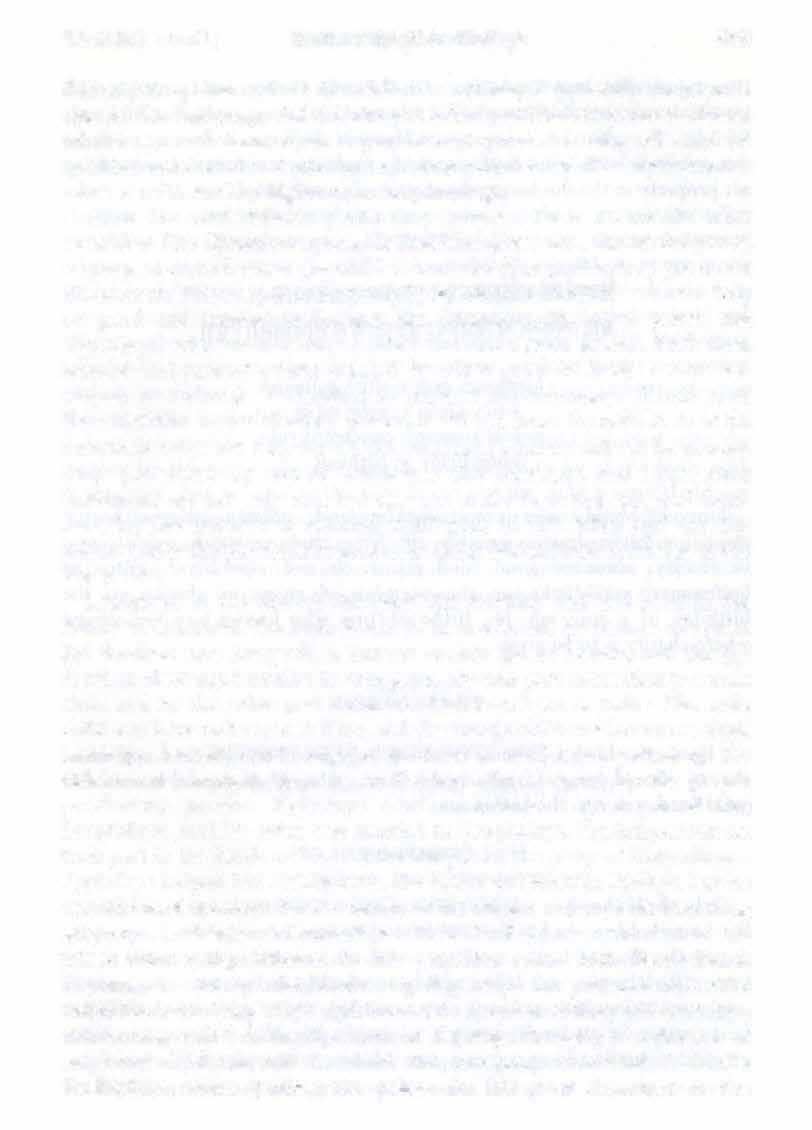
After the Garbhiidhana purificatory process, there are certain other sarhskiiras like Simantonnayana, Sadhabhak�arwm, etc., during the period of pregnancy, and when the child is born the first purificatory process is jiitakarman. This wasperformed duly by Maharaja Yudhi�thira with the help of good and learned briihma[laS like Dhaumya, the royal priest, and K.fpad.rya, who was not only a priest but also a great general. Both these learned and perfect priests assisted by other good briihma[las were employed. by Maharaja Yudhi�thira to perform the ceremony. Therefore all the sarhskiiras or purificatory processes are not mere formalities or social functions only, but they are all for practical purposes and can be successfully performed by expert briihma[laS like Dhaumya and Krpa. Such briihma[laS are not only rare but also not available in this age, and therefore, for the purpose of spiritual upliftment in this fallen age, the Gosvarriis prefer the purificatoryprocesses under Piincariitrika formulas to the Vedic rites.
K.fpacarya is the son of the great J;t�i Sardban and was born in the family of Gautama. The birth is said to be accidental. By chance, the great J;t�i Sardban met ]anapadi, a famous society girl of heaven, and the J;t�i Sardban discharged semina in two parts. By one part immediately a male child and by the other part a female child were born as twins. The male child was later onknown as Krpa,and the female child was known as K.fpi. Maharaja Santanu, while engaged in chase in the jungle, picked up the children and brought them up to the brahminical status by the proper purificatory process. K.fpacarya later on became a great general like Drol)acarya, and his sister was married to Drol)acarya. K{pacarya later on took part in the Battle of Kuruk�etra andjoined the party of Duryodhana. K.fpacarya helped kill Abhimanyu, the father of Maharaja Parik�it, but he was still held in esteem by the family of the Pap.?avas due to his becoming as great a briihma[la as Drol)acarya. When the Pap.?avas were sent to the forest after being defeated in the gambling game with Duryodhana, Dhrtarii�tra entrusted the Pap.?avas to K.fpacarya for guidance. After the endof thebattle, K.fpacarya again became a member of theroyal assembly, and he was called during the birth of Maharaja Parik�it for recitation of auspicious Vedic hymns to make the ceremony successful. Maharaja Yudhi�thira, while quitting the palace for his great departure to the
Text 13) Birth of Emperor Parik{!it 623
Himalayas, entrusted l<fpacarya with Maharaja Parik�it as his disciple, and he left home satisfied because of l<fpacarya's taking charge of Maharaja Parik�it. The great administrators, kings and emperors were always under the guidance of learned briihmarws like l<fpacarya and thus were able to act properly in the discharge of politicalresponsibilities.
TEXT 14

�rtf'lifJI11nil I
SIIG:IM;;i��:�ihr�II�\lll
hirar-yarh giirh mahirh griimiin hasty-a5viin nrpatir variin priidiit svannarh ca viprebhya� prajii-tirthe sa tirthavit
hirar-yam- gold; giim- cows; mahim-land; griimiin-villages; hastielephants; a5viin-horses; n .rpati�- the King; variin-rewards; priidiit- gave in charity; svannam-good food grains; ca-and; viprebhya�- unto the briihmar-as; prajii-tirthe-on the occasion of giving in charity on the birthday of a son; sa�- he ; tirtha-vit-one who knows how, when and where charity is to be given.


TRANSLATION
Upon the birth of a son, the King, who knew how, where and when charity should be given, gave gold, land, villages, elephants, horses and good food grains to the brahm�as.
PURPORT
Only the briihmar-as and sannyiisis are authorizedto accept charity from the householders. In all the different occasions of sarhskiiras, especially during the time of birth, marriage and death, wealth is distributed to the briihmar-as because the briihmar-as give the highest quality of service in regards to the prime necessity of humankind. The charity was substantial in the shape of gold, land, villages, horses, elephants and foodgrains, with other materials for cooking complete foodstuff. The briihmar-as were not, therefore, poor in the actual sense of the ter.m. On the contrary, because
624 Srimad-Bhagavatam [Canto 1, Ch_ 12
they possessed gold, land, villages, horses, elephants and sufficient grains, they had nothing to earn for themselves. They would simply devote themselves to the well-being of the entire society.
The word tzrthavit is significant because the King knew well where and when charity has to be given. Charity is never unproductive nor blind. In the siistras charity was offered to persons who deserve to accept charityby dint of spiritual enlightenment. The so-called Daridra-Naraya!la, a misconception of the Supreme Lord by unauthorized persons, is never to be found in the siistras as the object of charity. Nor can a wretched poor man receive much munificent charity in the way of horses, elephants, land and villages. The conclusion is that the intelligent men, or the briihmar-as specifically engaged in the service of the Lord, were properly maintained without anxiety for the needs of the body, and the King and other householders gladly looked after all their comforts.
It is enjoined in the siistras that as long as a child is joined with the mother by the navel pipe, the child is considered to be of one body with the mother, but as soon as the pipe is cut and the child is separated from the mother, the purificatory process ofjiitakarman is performed. The administrative demigods and past forefathers of the family come to see a newly born ·child, and such an occasion is specifically accepted as the propertime for distributing wealth to the right persons productively for the spiritual advancement of society.
TEXT 15

�lfAOII�f!l mn;f !l�telfi<tij'{ I
� � SlliiRt;:ffl�.- II��II
tam iicur briihmar-iis tufitii
riijiinam pra5rayiinvitam
e§a hy asmin prajii-tantau
puriir-iim paurava11abha
tam-unto him; U:cuh-addressed; briihmar-ii�-the learned briihmar-as; tu§Jii�-very much satisfied; riijiinam-unto the king; prasrayiinvitam- very much obliging;efi�-this; hi-certainly; asmin-in the chain of; prajii-tantau -descending line; puriir-iim-of the Purus; paurava -nabha-the chief among the Purus.
Text 15] Birth of Emperor Par�it 625
TRANSLATION
The learned brahm�as, who were very satisfied with the charities of the King, addressed him as the chief amongst the Purus and informed him that his son was certainly in the line of descent from the Purus.
TEXT 16


daiveniipratighiitena
sukle sarhsthiim upeyu§i riito vo 'nugrahiirthiiya
vi§rmnii prabha-vi§rmnii
daivena-by supernatural power; apratighiitena-by what is irresistible; sukle-unto the pure; sarhsthiim-destruction; upeyu�i-having been enforced; riitaft -restored; vaft -for you; anugraha-arthiiya-for the sake of obliging; vi§ryunii-by the all-pervasive Lord; prabha-vi§ryunii-by the allpowerful.
TRANSLATION
The brahm�as said: This spotless son is restored by the all-powerful and all-pervasive Lord Vi�u, the Personality of Godhead,in order to oblige you. He was saved when he was doomed to be destroyed by an irresistible supernatural weapon.
PURPORT
The child Parik�it was saved by the all-powerful and all-pervasive Vi�!lu (Lord Kr�!la) fo_! two reasons. The first reason is that the child in the wornb of his mother was spotless due tohis becoming a pure devotee of the Lord. The second reason is that the child was the only surviving male descendant of Puru, the pious forefather of the virtuous King Maharaja Yudhi�thira. The Lord wants to continue the line of pious kings to rule over the earth as His representatives for actual progress of a peaceful and
626
[Canto I, Ch. 12
Srimad-Bhagavatam
��WiistRt�i�"' ri" 4�1�9;N I mitifS�!f(IY.t�fii'"'!J"'I31lfW'"'!j'11II��II
prosperous life. After the Battle of Kuruk�etra, even up to the next generation of Maharaja Yudhi�thira was annihilated, and there were none who could generate another son in the great royal family. Maharaja Parik�it, the son of Abhimanyu, was the only surviving heir apparent in the family, and by the irresistible supernatural brahmiistra weapon of Asvatthama, he was forced to be annihilated. Lord Kr�rta is described herein as Vi�rtu, and this is also significant. Lord Kr1ll}a, the original Personality of Godhead, does the work of protection and annihilation in His capacity as Vi�rtu. Lord Vi�rtu is the plenary expansion of Lord Kr�rta. The all-pervasive activities of the Lord are executed by Him in His Vi�rtu feature. Child Pan"K�it is described here as spotlessly white because he is an unalloyed devotee of the Lord. Such unalloyed devotees of the Lord appear on the earth just to execute the mission of the Lord. The Lord desires the conditioned souls hovering in the material creation to be reclaimed to go back home, back to Godhead, and thus He helps them by preparing the transcendental literatures like the Vedas, by sending mis ionaries of saints and sages and by deputing His representative, the spiritual master. Such transcendental literatures, missionaries and representatives of the Lord are spotlessly white because the contamination of the material qualities cannot even touch them. They are always protected by the Lord when they are threatened with annihilation. Such foolish threats are made by the gross materialists. The brahmiistra, which was thrown by Asvatthama at the child Pan"K�it, was certainly supernaturally powerful, and nothing of the material worldcould resistits force of penetration. But the all-powerful Lord, who is present everywhere, within and without, could counteract it by His all-powerful potency just to save a bona fide servant of the Lord and descendant of another devotee, Maharaja Yudhi�thira, who was always obhged by the Lord by His causeless mercy.

Text 17) Birth of Emperor Par�it 627
ij.Cl41lm �mrd� �iff�qftr: 1 11111l1JlW( � � �ll�\911 tasman niimnii v�ru-riita iti loke bhav�yati mahii-bhiiga na sandeho mahii-bhiigavato mahiin
TEXT 17
tasmiit-therefore; niimnii-by the name; ui§�u-riita�-protected by Vi�l).u, the Personality of Godhead; iti-thus; loke-in all the planets; bhavi,syati-shall become well known; mahiibhiiga-most fortunate;na-no; sandeha�-doubts; mahii-bhiigavata[t-the first-class devotee of the Lord; mahan-qualified by all goodqualities.

TRANSLATION
For this reason this child will be well known in the world as one who is protected by the Personality of Godhead. 0 most fortunate one, there is no doubt that this child will become a first-class devotee and will be qualified with all good qualities.
PURPORT
The Lord givesprotectionto all livingbeingsbecause He is their supreme leader. The Vedic hymns confirm that the Lord is the Supreme Person amongst all personalities. The difference between the two living beings is that the one, the Personality of Godhead, provides for all other living beings, and by knowing Him one can achieve eternal peace (Katha Upan�ad). Such protection is givenby His different potencies to different grades of living beings. Butas far as His unalloyed devotees are concerned, He gives the protection personally. Therefore, Maharaja Parik�it is protected from the very beginning of his appearan�e in the womb of his mother. And because he is especially given protection by the Lord, the indication must be concludedthat the child would be afirst-grade devotee of the Lord with all good qualities. There are three grades of devotees, namely the mahiibhiigavata, madhyam-adhikiiri and the kani§thiidhikiiri. Those who go to the temples of the Lord and offer worshipfulrespect to the Deity without sufficient knowledge in the theological science and therefore without any respect for the devotees of the Lord are called materialistic devotees, or kani§thiidhikiiri, or the third-grade devotees. Secondly, the devotees who have developed genuine service mentality for the Lord and thus make friendships with similar devotees only, show favor to the neophytes and avoid the atheists are called the second-grade devotees. But those who see everything in the Lord or everything of the Lord and also see in everything an eternal relation of the Lord, so that there is nothing within their purview of sight except the Lord, arecalled the mahiibhiigavatas, or the first-grade devotees of the Lord. Such firstgrade devotees of the Lord are perfectin allrespects. A devotee who may ....
628 Srimad-Bhagavatam [Canto 1, Ch. 12
be in any of these categories is automatically qualified by all good qualities, and thus a mahiibhiigavata devotee like Maharaja Parik�it is certainly perfect in allrespects. And because Maharaja Parik�ittook his birth in the family of Maharaja Yudhi�thira, he is addressed herein as the mahiibhiigavata, or the greatest of the fortunates. The family in which a mahiibhiigavata takes his birth is fortunate because due to the birth of a first-grade devotee, the members of the family, past, present and future up to one hundred generations, become liberated by the grace of the Lord, out of respect ft>r His beloved devotee. Therefore, the highest benefit is done to one's family simply by becoming an unalloyed devotee of the Lord.
TEXT 18

���Ujftft'{���ll�:I
�ijctMijl RqQ�t('ltm�ctl� �n II��II
yudh�thira uviica
apy e§a varhsyiin riijar§in pupya-slokiin mahiitmana[l anuvartitii svid yasasii siidhu-viidena sattamii[l
sri riijii-the aU-good king (Maharaja Yudhi�thira); uviica-s aid; apiwhether; e§a{l-this; varhsyiin- family; riija11in-of saintly kings; pupyaslokiin-pious by the very name; mahii-iitmana[l-all great souls; anuvartitii -follower; svit-it will be; yasasii-by achievements; siidhu-viidena-by glorification; sattamii[l.- great souls.
TRANSLATION
The good King [Yudh�hira) inquired: 0 great souls, will he become as saintly a king, as pious in his very name and as famous and glorified in his achievements, as others who appeared in this great royal family?
PURPORT
The forefathers of King Yudhi�thira were all great saintly kings, pious and glorified by their great achievements. They were all saints on the royal throne. And, therefore, all the members of the state were happy, pious, well behaved, prosperous and spiritually enlightened. Under strict
Text 18) Birth of Emperor Pari�it 629
���
guidance of the great souls and spiritual injunctions, such great saintly kings were trained up, and as a result the kingdom was full of saintly persons and was a happy land of spiritual life. Maharaja Yudhi�thira was himself a prototype of his ancestors, and he desired that the next king after him become exactly like his great forefathers. He was happy to learn from the learned briihmaras that by astrological calculations the child would be born a first-grade devotee of the Lord, and more confidentially he wanted to know whether the child was going to follow ig the footsteps of his great forefathers. That is the way of the monarchical state. The reigning king should be a pious, chivalrous devotee of the Lord and fear personified for the upstarts. He must also leave an heir apparent equally qualified to rule over the innocent citizens. In the modern setup of the democratic states, the people themselves are fallen to the qualities of the siidras or less, and the government is run by their representative, who is ignorant of the scriptural mode of administrative education. Thus the whole atmosphere is surcharged with siidra qualities, manifested by lust and avarice. Such administrators quarrel every day among themselves. The cabinet of ministers changes often du� to party and group selfishness. Everyone wants to exploit the state resources till he dies. No one retires from political life unless forced to do so. How can such low-grade men do good to the people? The result is corruption, intrigue and hypocrisy. They should learn from the Srimad-Bhiigavatam how ideal the administrators must be before they can be given charge of different posts.
TEXT 19

Qurr�:
qp,i�Wm �ltf« �: I
�: �� U1iT ilOI�i(Ntff.flII��II
briihmar;tii iicu�
piirtha prajiivitii siik§iid
ik§viikur iva miinava�
brahmarya� satya sandha5 ca
riimo diisarathir yathii
briihmar;tii�-the good briihmar;tas; iicu�-said; piirtha-0 son of Prtha (Kunh); prajii-those who are born; avitii-maintainer; siik§iit-directly;
iva-exactly like King Ik�vaku; miinava�-son of Manu; brahma{lya[t- followers and respectful to the briihmaras; satya-sandh�truthful by promise; ca-also; riima�-the Personality of Godhead Rama;
diisarathifl-the son of Maharaja Da8aratha ; yathii- like Him.
630 Srimad-Bhagavatam [Canto 1, Ch. 12
ik�viiku�
The learned brahm�as said: 0 son of Prtha, this child shall be exactly like King �aku, son of Manu, in maintaining all those who are born. And as for following the brahminical principles, especially in being true to his promise, he shall be exactly like Rama, the Personality of Godhead, the son of Maharaja Da8aratha.
PURPORT
Prajii means the living being who has taken his birth in the material world. Actually the living being has no birth and no death, but because of his separation from the service of the Lord and due to his desire to lord it over material nature, he is offered a suitable body to satisfy his material desires. In doing so, one becomes conditioned by the laws of material nature, and the material body is changed in terms of his own work. The living entity thus transmigrates from one body to another in 8,400,000 species of life. But due to his being the part and parcel of the Lord, he is not only maintained with all necessaries of life by the Lord, but also is protected by the Lord and His representatives, the saintly kings. These saintly kings give protection to all the prajiis, or living beings, to live and to fulfill their terms of imprisonment. Maharaja Parik�it was actually an ideal saintly king because while touring his kingdom he happened to see that a poor cow was about to be killed by the personified Kali, and he at once took him to task as a murderer. This means that even the animals were given protection by the saintly administrators, not from any sentimental point of view, but because those who have taken their birth in the world have the right to live. All the saintly kings, beginning from the King of the sun globe down to the King of the earth, are so inclined by the influenceof the Vedic literatures. The Vedic literatures are taught in higher planets also, as there is reference in the Bhagavad-gitii (Bg. 4.7) about the teachings to the sun-god (Vivasvan) by the Lord, and such lessons are transferred by disciplic succession,as it was done by the sun--god to his son Manu, and from Manu to Maharaja Ik�vaku. There are fourteen Manus in one day of Brahma, and the Manu referred to herein is the seventh Manu, who is one of the Prajapatis (those who create progeny), and he is the son of the sun-god. He is known as the Vaivasvata Manu. He had ten sons, and Maharaja Ik�vaku is one of them. MaharajaIk�vaku also learned bhakti-yoga as taught in the Bhagavad-gitii from his father, Manu, who got it from his father,thesun-god. Later on the teaching of the Bhagavad-gitii came down by disciplic succession from Maharaja �vaku, but in course of time the
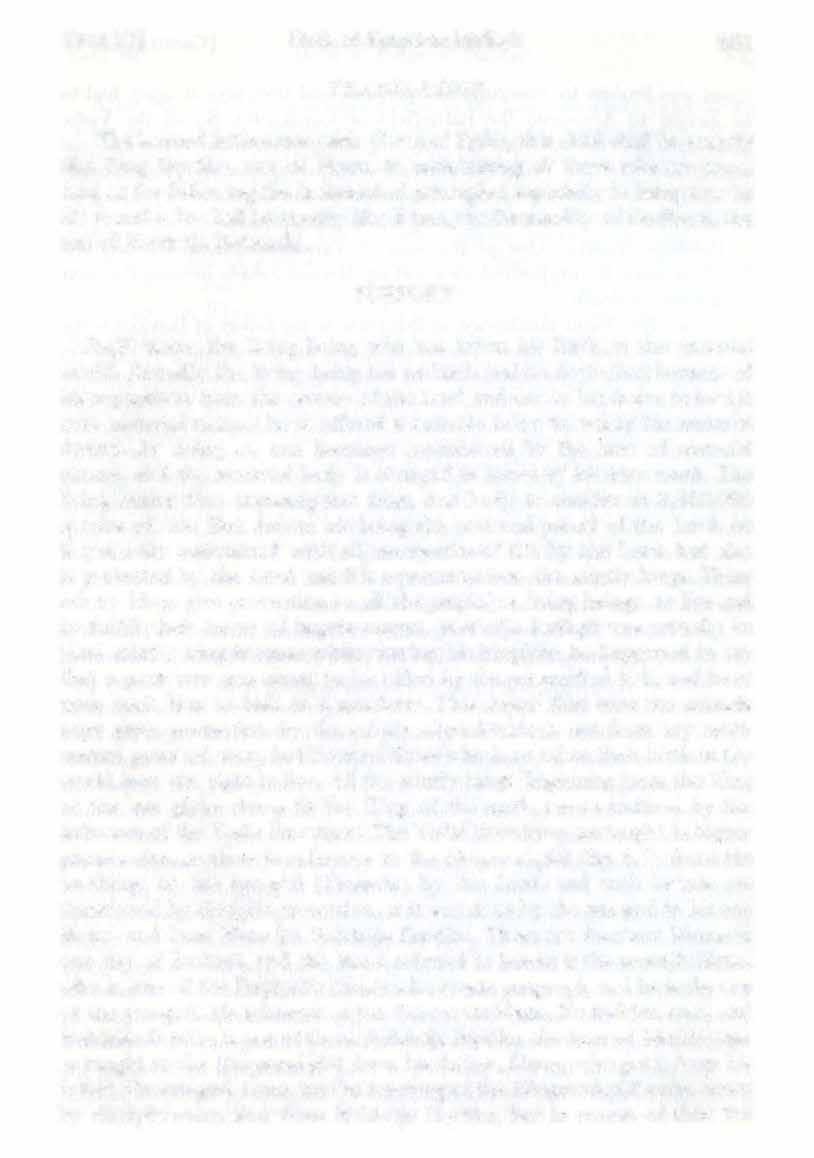
Text 19] Birth of Emperor Parilqit 631
TRANSLATION
chain was broken by unscrupulous persons, and therefore it again had to be taught to Arjuna on the Battlefield of Kuruk�etra. So all the Vedic literatures are current from the very beginning of creation of the material world, and thus the Vedic literatures are known as apaum§eya (not made by man). The Vedic knowledge was spoken by the Lord and first heard by Brahma, the first created living being within the universe.

Mahiiriija lk§viiku: One of the sons of Vaivasv�ta Manu. He had one hundred sons. He prohibited meat eating. His son Sasada became the next king after his death.
Manu: The Manu mentioned in this verse as the father of Ik�vaku is the seventh Manu, of the name Vaivasvata Manu, the son of sun-god Vivasvan to whom Lord Kr�!ia instructed the teachings of Bhagavad-gitii prior to His teaching them to Arjuna. Mankind is the descendant of Manu. This Vaivasvata Manu had ten sons, named Ik�vaku, Nabhaga, Dhr�ta, Saryati, Nari�yanta, Nabhaga, Di�ta, Karii�a, Pr�adhra, and Vasuman. The Lord's incarnation Matsya (the gigantic fish) was advented during the beginning of Vaivasvata Manu's reign. He learned the principles of Bhagavad-gitii from his father Vivasvan, the sun-god, and he reinstructed the same to his son Maharaja Ik�vaku. In the beginning of the Treta-yuga the sun-god instructed devotionalservice to Manu,and Manu in his turn instructed it to Ik�vaku for the welfare of the whole human society.
Lord Riima: The Supreme Personalityof Godhead incarnated Himself as Sri Rama, accepting the sonhood of His pure devotee Maharaja Dasaratha, the King of Ayodhya. Lord Rama descended along with His plenary portions, and all of them appeared as His younger brothers. In the month of Caitra on the ninth day of the growing moon in the Treta-yuga, the Lord appeared, as usual, to establish the principles of religion and to annihilate the disturbing elements. When He was just a young boy, He helped the great sage Visvamitra by killing Subahu and striking Mar1ca,the she-demon, who was disturbing the sages in their daily discharge of duties. The briihma'{las and k§atriyas are meant to cooperate for the welfare of the mass of people. The briihma'!la sages endeavor to enlighten the people by perfect knowledge, and the k§atriyas are meant for their protection. Lord Ramacandra is the ideal king for maintaining and protecting the highest culture of humanity known as brahma'{lya-dharma. The Lord is specifically the protector of the cows and the briihma'{las, and hence He enhances the prosperity of the world. He rewarded the administrative demigods by effectiveweaponsto conquer thedemonsthroughtheagency of Visvamitra. He was present in the bow sacrifice of King Janaka, and by breaking the invincible bow of Siva, He married Sitadevi, daughter of Maharaja Janaka.
632 Srimad-Bhagavatam [Canto l, Ch. 12
After His marriage He accepted exile in the forest fourteen years by the order of His father, Maharaja DaSa.ratl:a. To help the administration ofthe demigods, Hekilled fourteen thousand demons, and bythe intrigues ofthe demons, His wife Sitadevl was kidnapped by Rava!)a. He made friendship with Sugriva, who was helped by the Lord to kill Vali, brother of Sugrlva. By the help of Lord Rama, Sugrlva became the king of the Vap.aras (a race of gorillas). He built a floating bridge of stones on the Indian Ocean and reached Lanka, the kingdom of Ravap.a, who kidnapped Sita. Later on Ravap.a was killed by Him, and Ravap.a's brother Vibhi�ap.a was installed on the throne of Lanka. Vibhi�ap.a was one of the brothers of Ravap.a, a demon, but Lord Ramamade him immortal by His blessings. On the expiry of fourteen years, after settling the affairs at Larika, He came back to His kingdom Ayodhya by flower plane. He instructed His brother Satrughna to attack Lavar)asura, who reigned at Mathura, and the demon was killed. He performed ten Asvamedha sacrifices, and later on He disappeared while taking a bath in the Sarayu River. The great epic Riimiiya[la is the history of Lord Rama's activities in the world, and the authoritative Riimii_ya[la is written by the great poet Valmiki.
TEXT 20

�A6M61R�lQ4f.:af«
�11{11� 0 II
e§a diitii sarar-yas ca yathii hyausinara� sib*
yaso vitanitii sviiniim dau§yantiriva yajvaniim
e§a�-this child; diitii-donor in charity; saror-ya�-protector of the surrendered;ca-and;yatha-as;hi-certainly;auiinaraJ:t-thecountrynamed USinara; sib*-Sibi; yasa�-fame; vitanitii-disseminator; sviiniim-of the kinsmen; dau§yantih iva-like Bharata, the son of Du�yanta; yajvanam-of those who have performed many sacrifices.
TRANSLATION
This child will be a munificent donor of charity and protector of the surrendered, like the famous King Sibi of the USinara country. And he will
Text 20] Birth of Emperor Par�it 633
� � �� � �hftif(:fuf.r:
expand the name and fame of his family like Bharata, the son of Maharaja Du�yanta.

PURPORT
A king becomes famous by his acts of charity, performances of yajiias, protection of the surrendered, etc. A k§atriya king is proud to give protection to the surrendered souls. This attitude of a king is called iSvara-bhava, or powerful to give protection in a righteous cause. In the Bhagavad-gitii the Lord instructs living beings to surrender unto Him, and He promises all protection. The Lord is all-powerful and true to His word, and therefore, He never fails to give protection to His different devotees. The king, being the representative of the Lord, must possess this attitude to give protection to the surrendered souls. at all risk. Maharaja Sibi, the King of Usinara, was an intimate friend of Maharaja Yayati, who was able to reach the heavenly planets along with Maharaja Sibi. Maharaja Sibi was aware of the heavenly planet where he was to be transferred after his death, and the description of this heavenly planet is given in the Mahiibhiirata (.Adi, 96/6-9). Maharaja Sibi was so charitably disposed that he wanted to give over his acquired position in the heavenly kingdom to Yayati, but he did not accept it. He went to the heavenly planet along with great [§is like A§itaka and others. On inquiry from the [flis, Yayati gave an account of Sibi's pious acts when all of them were on the path to heaven. He has become a member of the assembly of Yamaraja, who has become his worshipful deity. As confirmed in the Bhagavad-gitii, the worshiper of the demigods goes to the planets of the demigods (yiinti deva-vratii deviin); so Maharaja Sibi has become an associate of the great Vai§il)ava authority Yamaraja on that particular planet. While he was on the earth he became very famous as a protector of surrendered souls and a donor of charities. The King of heaven once took the shape of a pigeon hunter bird (eagle), and Agni the fire-god took the shape of a pigeon. The pigeon, while being chased by the eagle, took shelter on the lap of Maharaja Sibi, and the hunter eagle wanted the pigeon back from the King. The King wanted to give it some other meat to eat and requested the bird not to kill the pigeon. The hunter bird refused to accept the King's offer, but it was. settled later on that the eagle would accept flesh from the body of the King of the pigeon's equivalent weight. The King began to cut flesh from his body to weigh in the balance equivalent to the weight of the pigeon, but the mystic pigeon always remained heavier. The King then put himself on the balance to equate with the pigeon, and the
634 Srimad-Bhagavatam [Canto l, Ch. 12
demigods were pleased with him. The King of heaven and the fire-god disclosed their identity, and the King was blessed by them. Devar�i Narada also glorified Maharaja Sibi for his great achievements, specifically in charity and protection. Maharaja Sibi sacrificed his own son for the satisfaction of human beings in his kingdom. And thus child Parlk�it was to become a second Sibi incharity and protection.
Dau§yanti Bharata: There are many Bharatas in history, of which Bharata the brother of Lord Rama, Bharata the son of King J;t�abha, and Bharata the son of Maharaja Du�yanta are very famous. And all these Bharatas are historically known to the universe. This earth planet is known as Bharata,or Bharatavar�a, due toKing Bharata the son of J;t�abha, but according to some this land is known as Bharata due to the reign of the son of Du�yanta. So far as we are convinced, this land's name Bhiiratavar§a was established from the reign of Bharata, the son of King ��bha. Before him the land was known as llavativar�a, but just after the coronation of Bharata, the son of J;t�abha, this land is famous as Bharatavar�a.
But despite all this, Bharata, son of Maharaja Du�yanta, was not less important. He is the son of the famous beauty Sakuntala. Maharaja Du�yanta fell in love with Sakuntala in the forest, and Bharata was conceived. After that, Maharaja forgot his wife Sakuntala by the curse of Ka�JVamuni, and the child Bharata was brought up in the forest by his mother. Even in his childhood he was so powerful that he challenged the lions and elephants in the forest and would fight with them as little children play with cats and dogs. Because of the boy's becoming so strong, more than the so-called modern Tarzan, the [§is in the forest called him Sarvadaman, or one who is able to control everyone. A full description of Maharaja Bharata is givenin the Mahabhiirata Adi Parva. The Pap.�avas, or the Kurus, are sometimes addressed as Bharata dueto being born in the dynasty offamous Maharaja Bharata,the son of King Du�yanta.

TEXT 21

� � ��:
dhanviniim agra!lir e�a tulyas ciirjunayor dvayofi. hutiiSa iva durdhar§afi. samudra iva dustarafi.
Text 21] Birth of Emperor Par�it 635
'4M•nq5fuft�tt
dhanviniim-of the great bowmen; agraflifi.-the foreman; e§aft-this child; tulya[l-equally good; ca-and; arjunayo[l-of the Arjunas; dvayo[lof the two; hutiisa/:1.-fire; iva-like; durdhar§a[l-irresistible; samudro[locean;iva-like; dustaraft-unsurpassable.
TRANSLATION
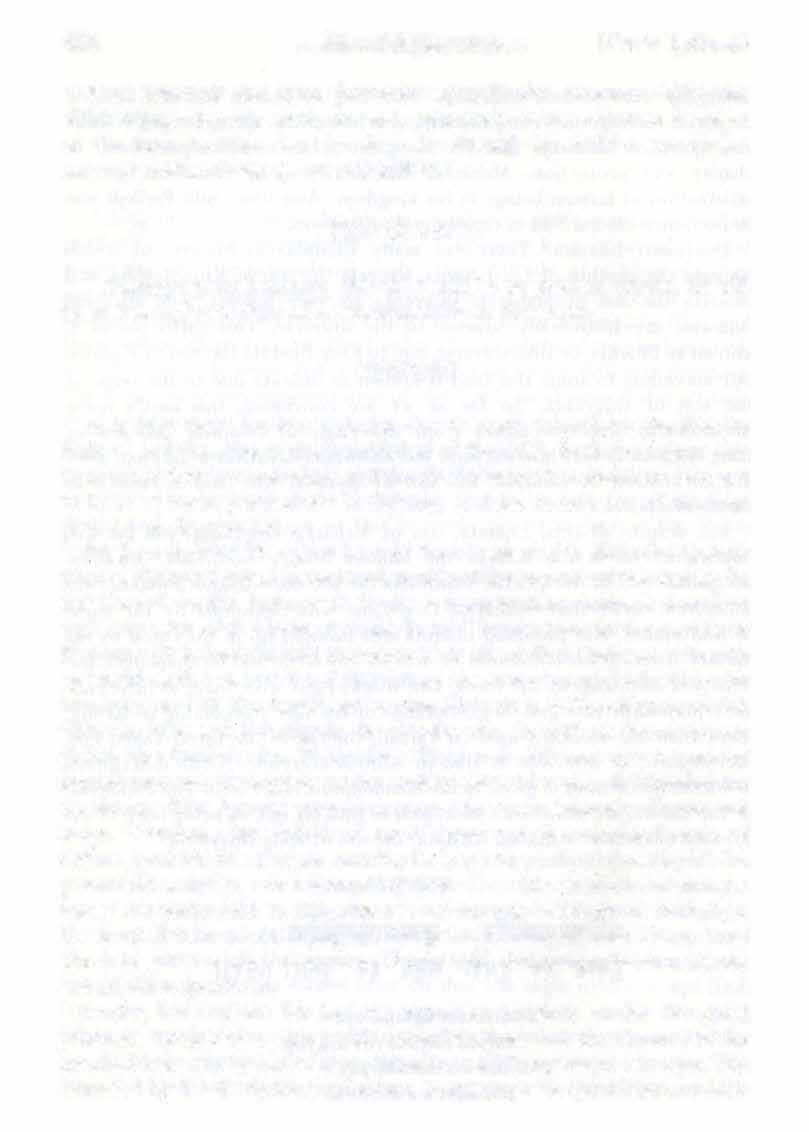
Amongst great bowmen, this child will be as good as Arjuna. He will be as irresistible as fire and as unsurpassable as the ocean.
PURPORT
In history there are two Arjunas. One is Karta Viryarjuna, the King of Haihya, and the other is the grandfather of the child. Both the Arjunas are famous for their bowmanship, and the child Pan""k�it is foretold to be equal to both of them, particularly in fighting. A short description of the PiiQgava Arjuna is given below:
Piiflpava Arjuna: The great hero of the Bhagavad-gitii. He is the k§etraja son ofMaharajaPart�u. Queen Kunficouldcall for any one of the demigods, and thus she called lndra, and Arjuna is born by him. Arjunais therefore a plenary part of the heavenly King Indra. He was born in the month of Phalguna (Feb.-March), and therefore he is also called Phalguni. When he appeared as the son of Kunfi, his future greatness was proclaimed by air messages, and all the important personalities from different parts of the universe, such as the demigods, the Gandharvas, the Adityas (from the sun globe) the Rudras, the Vasus, the Nagas and different nis (sages) of importance, and the Apsaras or the society girls of heaven, all attended the ceremony. The Apsaras pleased everyone by their heavenly dances and songs. Vasudeva, the father of Lord �!la and the maternal uncle of Arjuna, sent his priest representative Kasyapa to purify Arjuna by all the prescribed sarhskiiras or reformatory processes. His sarhskiira of giving a name was performed in the presence of the [§is, residents of Satasp1ga. He married four wives, Draupadi, Subhadra, Citrangada and U1Up1, from whom he got four sons of the names Srutaklrti, Abhimanyu, Babhruvahana, and Iravan respectively.
During his student life he was entrusted to study under the great professor Drortacarya, along with other Part�avas and the Kurus. But he excelled everyone by his studious intensity, and Drortacarya was especially attracted by his disciplinary affection. Drortacarya accepted him as a first-
636 Srimad-Bhagavatam [Canto 1, Ch. 12
grade scholar and loved heartily to bestow upon him all the blessings of military science. He was so ardent a student that he used to practice bowmanship even at night, and for all these reasons Professor Drortacarya was determined to make him the topmost bowman of the world. He passed very brilliantly the examination in piercing the target, and Drortacarya was very pleased. Royal families at Manipur and Tripura are descendants of Babhruvahana. He saved Drol)acarya from the attack of a crocodile, and the A.carya, being pleased with him, rewarded him a weapon of the name Brahmasira. Maharaja Drupada was inimical toward Dro�acarya, and thus when he attacked the Acarya, Arjuna got him arrested and brought him before Dro�acarya. He besieged a city of the name Ahichhatra, belonging to Maharaja Drupada, and after taking it over he gave it to Dro�acarya. The confidential treatment of the weapon Brahmasira was explained to Arjuna, and Drortaclirya was promised by Arjuna that he would use the weapon if necessary when he (Drortacarya) personally became an enemy of Arjuna. By this, the Acarya forecasted the future battle of Kuruk�etra, in which Drol).acarya was on the opposite side. Maharaja Drupada, although defeated by Arjuna on behalf of his professor Drottlidirya, decided to hand over his daughter Draupadi to his young combatant, but he was disappointed when he heard the false news of Arjuna's death in the fire of a lac-house intrigued by Duryodhana. He therefore arranged for Draupadl's personal selection of a groom who could pierce the eye of a fish hanging on the ceiling. This trick was especially made because only Arjuna could do it, and he was successful in his desire to hand over his equally worthy daughter to Arjuna. His brothers were at that time living incognito under agreement with Duryodhana, and Arjuna and his brothers attended the meeting of Draupadi's selection in the dress of briihmar-as. When all the k�atriya kings assembled saw that a poor briihmar-a had been garlanded by Draupadi for her lord, Sri Kr�rya disdosed his identity to -Balarama.
He met UlUpi at Haridvar, and he was attracted by the girl belonging to Nagaloka, and thus Iravan was born. Similarly, he met Citrangada, a daughter of th� King of Mal).ipura, and thus Babhruvahana was born. Lord Sri Kr��a made a plan to help Arjuna to kidnap Subhadra, sister of Sri Kr��a, because Baladeva was inclined to hand her over to Duryodhana. Yudhi�thira also agreed with Sri Kr�rta, and thus Subhadra was taken by force by Arjuna and then married to him. Subhadra's son is Ahhimanyu, the father of Pa�it Maharaja, the posthumous child. He satisfied the fire-god by setting fire to the Khart�ava Forest, and thus the fire-god gave him one weapon. lndra was angry when fire was set in the Khart�ava

Text 21] Birth of Emperor Par'ik{!it 637
Forest, and thus Indra, assisted by all other demigods, began fighting with Arjuna for his great challenge. They were defeated by Arjuna, and Indradeva returned to his heavenly kingdom. Arjuna also promised all protection to one Mayasura, and the latter presentedhim one valuable conchshell celebrated as the Devadatta. Similarly, he received many other valuable weapons from lndradeva when he was satisfied to see his chivalry.

When Maharaja Yudhi�thira was disappointed in defeating the King of Magadha, Jarasandha, it was Arjuna only who gave King Yudhi�thira all kinds of assurances, and thus Arjuna, Bhima and Lord Kr�!la started for Magadha to kill Jarasandha. When he went out to bring all other kings of the world under the subjection of the Pap.�avas, as was usual after the coronation of every emperor, he conquered the country named Kelinda and brought in ·subjugation King Bhagdutt. Then he travelled through countries like Antagiri, Ulukpur, Modapur, etc., and brought under subjugation all the rulers.
Sometimes he underwent severe types of penances, and later on he was rewarded by Indradeva. Lord Siva also wanted to try the strength of Arjuna, and in the form of an aborigine, Lord Siva met him. There was a great fight between the two, and at last Lord Siva was satisfied with him and disclosed his identity. Arjuna prayed to the lord in all humbleness, and the lord, being pleased with him, presented him the pasupata weapon. He acquired many other important weapons from different demigods. He received darz!liistra from Yamaraja, pasiistra from Varu!la, and antardhanaastra from Kuvera, the treasurer of the heavenly kingdom. lndra wanted him to come to the heavenly kingdom, the lndraloka planet beyond the moon planet. In thatplanet he wascordially receivedby the local residents, and he was awarded reception in the heavenly parliament of Indradeva. Then he met Indradeva, who not only presented him with his Vajra weapon, butalso taught himthe military and musical science as used in the heavenly planet. In one sense, Indra is the real father of Arjuna, and therefore indirectly he wanted to entertain Arjuna with the famous society girl of heaven, UrvaSi the celebrated beauty. The society girls of heaven are lusty, and UrvaSi was very eager to contact Arjuna, the strongest human being, and she met him in his room and expressed her desires. But Arjuna sustained his unimpeachable character by closing his eyes before UrvaSi and addressing her as mother of the Kuru dynasty and placing her in the category of his mothers Kunti, Madri and Sacidevi, wife of lndradeva. Disappointed,UrvaSi cursed Arjuna and left. In the heavenly planet he also met the great celebrated ascetic Lomasa and prayed to him for the protection of Maharaja Yudhi�thira.
638 Srimad-Bhagavatam [Canto I, Ch. 12
When his inimical cousin Duryodhana was under the clutches of the Gandharvas, he wanted to save him and requested the Gandharvas to release Duryodhana, but the Gandharvas refused, and thus he fought with them and got Duryodhana released.When all the Patt9avas lived incognito, he presented himself in the court of King Virata as a eunuch and was employed as the musical teacher of Uttara, his future daughter-in-law, and was known in the Virata court as the Brhannala. As Brhannala, he fought on behalf of Uttara, the son of King Virata, and thus defeated the Kurus in the fight incognito. His secret weapons were safely kept in the custody of a somi tree, and he ordered Uttara to get them back. His identity and his brothers' identity were later on disclosed to Uttara. Drol)acarya was informed of Arjuna's presence in the fight of the Kurus and the Viratas. Later,on the Battlefield of Kuruk{letra, Arjuna killed many great generals like Karl)a and others. After the Battle of Kuruk�etra, he punished Asvatthama, who killed all the five sons of Draupadi. Then all the brothers went to Bhi�madeva.
It is due to Arjuna only that the great philosophical discourses of the Bhagavad-gitii were again spoken by the Lord on the Battlefield of Kuruk{letra. His wonderful acts on the Battlefield of Kuruk11etra are vividly described in the Mahiibhiirata. Arjuna was, however, defeated by his son Babhruvahana at Mal)ipura and fell unconscious when Ulupi saved him.Mter the disappearance of Lord Kr�tta, the message was brought by him to Maharaja Yudhi�thira. Again, he visited Dvaraka, and all the widow wives of Lord Kr�tta lamented before him. He took them all in the presence of Vasudeva and pacified all of them. Later on, when Vasudeva passed away, he performed his funeral ceremony in the absence of Kr�tta. While Aijuna was taking all the wives of Kr�tta to lndraprastha, he was attacked on the way, and he could not protect the ladies in his custody.At last, advised by Vyasadeva, all the brothers headed for Mahaprasthan. On the way, at the request of his brother, he gave up all important weapons as useless, and he dropped them all in the water.
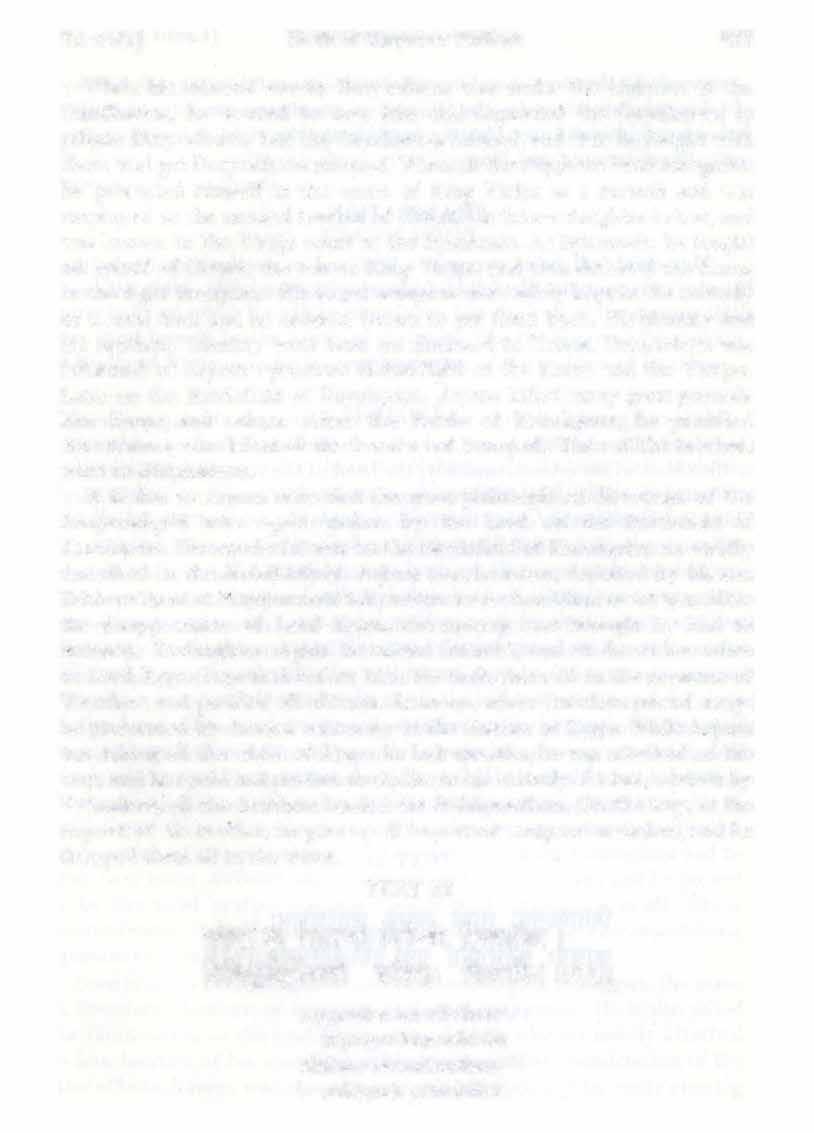
Text 22) Birth of Emperor Par�it 639
22 � � f�tf� ftlmf'WR I RIRI��cu«< �: f{t(l(lrq4 ������
vikranto ni.§evyo
iva
vasudhevasau
pitaraviva
TEXT
mrgendra iva
himavan
titik§ur
sahi.§rtufr.
mrgendra�-the lion; iva-like; vikranta�-powerful; n� evya�-worthy of taking shelter; himavan-the Himalayan mountains; iva-like; titik§u�forbearance; vasudhii iva-like the earth; asau-the child; sah�cw�- tolerant; pitarau-parents; iva-like.
TRANSLATION
This child will be as strong as a lion, and as worthy a shelter as the Himalayan mountains. He will be forbearing like the earth, and as tolerant as his parents.
PURPORT
One is comparedto the lion when one is very strong in chasing anenemy. One should be a lamb at home and a lion in the chase. The lion never fails in the chase of an animal; similarly, the head of the state should never fail in chasing an enemy. The Himalayan mountains arefamous for all richness. There are innumerable caves to live in, numberless trees of good fruits to eat, good springs to drink water from and profuse drugs and minerals to cure diseases. Any man who is not materially prosperous can take shelter of these great mountains, andhe will be provided with everything required. Both the materialist and the spiritualist can take advantage of the great shelter of the Himalayas. On the surface of the earth there are so many disturbances caused by the inhabitants. In the modern age the people have begun to detonate atomic weapons on the surface of the earth, and still the earth is forbearing to the inhabitants, like a mother excuses a little child. Similarly, parents are always tolerant to children for all sorts of mischievous acts. An ideal king maybe possessed of allthese good qualities, and the child Parik�it is foretold to have all these qualities in perfection.
TEXT
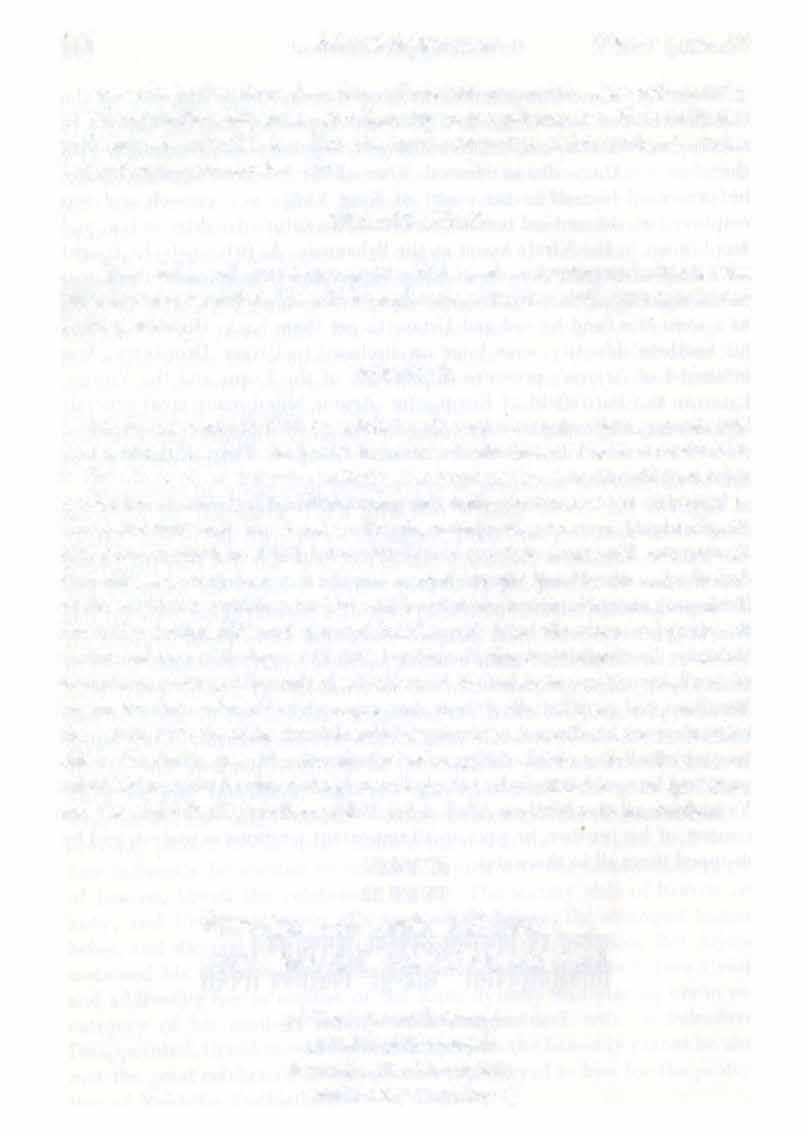
640 Srimad-Bhagavatam [Canto I, Ch. 12
23 Ntttii(Qq: � � i1tf«ftqq: I �: � � � �: ����II pitamaha-sama� siimye prasade giriSopama� asraya� sarva-bhutiiniirh yathii devo ramiisraya�
pitamaha-grandfather, or Brahma; samatt-equally good; samye-in the matter; prasade-in charity or in munificence; girisa-Lord Siva; upamatt -comparison of equilibrium; iisrayaft-resort; saroa-all; bhiitiiniim-of the living beings; yathii-as; �evatt-the Supreme Lord;ramii-iisraya[t-the Personalityof Godhead.

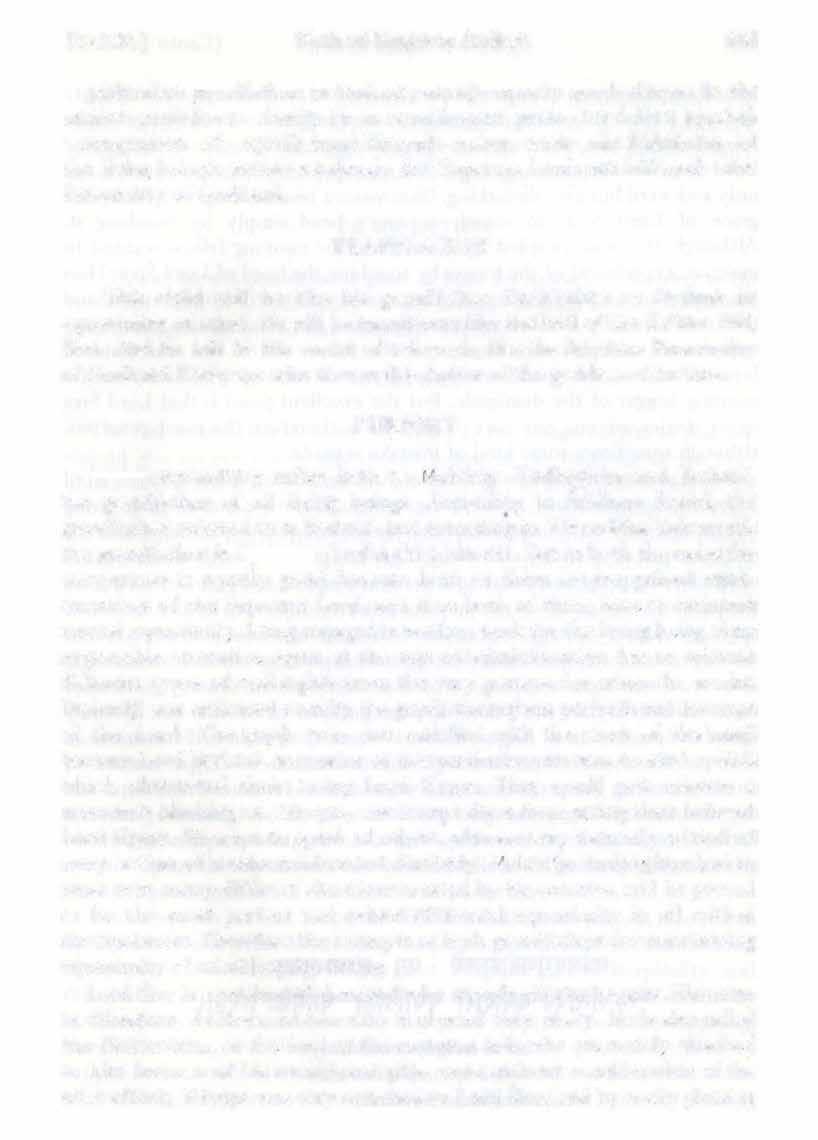
TRANSLATION
This child will be like his grandfather Yudhi��hira or Brahma in equanimity of mind. He will be munificent like the lord of the Kailasa Hill, Siva. And he will be the resort of everyone, like the Supreme Personality of Godhead Naraya!la who is even the shelter of the goddess of fortune.
PURPORT
1ental equanumty refers both to Maharaja Yudhi�thira and Brahma, the grandfather of all living beings. According to Sridhara Svami, the grandfather referred to is Brahma, but according to Visvanatha Cakravarti, the grandfather is 1aharaja Yudhi�thira himself. But in both the casesthe comparison is equally good because both of them are recognized representatives of the Supreme Lord, and thus both of them haveto maintain mental equanimity,being engagedin welfare workfor the living being. Any responsible executive agent at the top of administration has to tolerate different types of onslaughts from the very persons for whom he works. Brahmajiwas criticized even bythe gopis, thehighest perfectionaldevotees of the Lord. The gopis were not satisfied with the work of Brahmaji because Lord Brahma, as creator of this particular universe, created eyelids which obstructed their seeing Lord Kr�!la. They could not tolerate a moment's blinking of the eyes, forit kept them from seeing their beloved Lord Kr�!la. So what to speak of others, who are verynaturally critical of every action of a responsible man? Similarly, Maharaja Yudhi�thirahadto cross over many difficult situations createdby his enemies, and he proved to be the most perfect maintainer of mental equanimity in all critical circumstances. Therefore the example ofbothgrandfathersfor maintaining equanimity of mind is quite fitting.
Lord Siva is a celebrated demigodwho awards giftsto beggars. His name is, therefore, Asuto;;a, or one who is pleased very easily. He is also called the Bhiitanatha, or the lord of the common folk who are mainly attached to him because of his munificent gifts, even without consideration of the after effects. Ravat�a was very attached to Lord Siva, and by easilypleasing
Text 23) Birth of Emperor Par�it 641
him, Rava!la became so powerful that he wanted to challenge the authority of Lord Rama. Of course, Rava!la was never helped by Lord Siva when he fought with Rama, the Supreme Personality of Godhead and the Lord of Lord Siva. To Bhaumasura, Lord Siva awarded a benediction which is not only awkward but also disturbing. Bhaumasura became empowered, by the grace of Lord Siva, to vanish anyone's head simply by touching it. Although this was awarded by Lord Siva, the cunning fellow wanted to make an experiment of the power by touching the head of Lord Siva. Thus the lord had to take shelter of Vi�I)U to save himself from trouble, and the Lord Vi�l)u, by His illusory potency, asked the Bhaumasura to make an experiment with his own head, and the fellow did it and was finished himself, and so the world was saved from all sorts of trouble by such a cunning beggar of the demigods. But the excellent point is that Lord Siva never denies anyone any sort of gift. He is therefore the most generous, although sometimes some kind of mistake is made.
Ramii meansthe goddess of fortune. And her shelter is Lord Vi�tJ.U. Lord Vi�tJ.U is the maintainer of all living beings. There are innumerable living beings, not only on the surface ofthis planet but also in all other hundreds of thousands of planets, and all of them are provided with all necessities of life for the progressive march towards the end of self-realization, but on the path of sense gratificatiOn they are put into difficulty by the agency of miiyii, the illusory energy, and so travel the path of a false plan of economic development. Such economic development is never successful because it is illusory. These men are always after the mercy of the illusory goddess of fortune, but they do not know that the goddess of fortune can live only under the protection of Vi�ttu. Without Vi�ttu, the goddess of fortune is an illusion. We should therefore seek the protection of Vi�!J.U instead of directly seeking the protection of the goddess of fortune. Only Vi�pu and the devotees of Vi�tJ.U can give protection to all, and because Maharaja Parik�it was himself protected by Vi�l)u, it was quite possible for him to give complete protection to all who wanted to live under his rule. TEXT
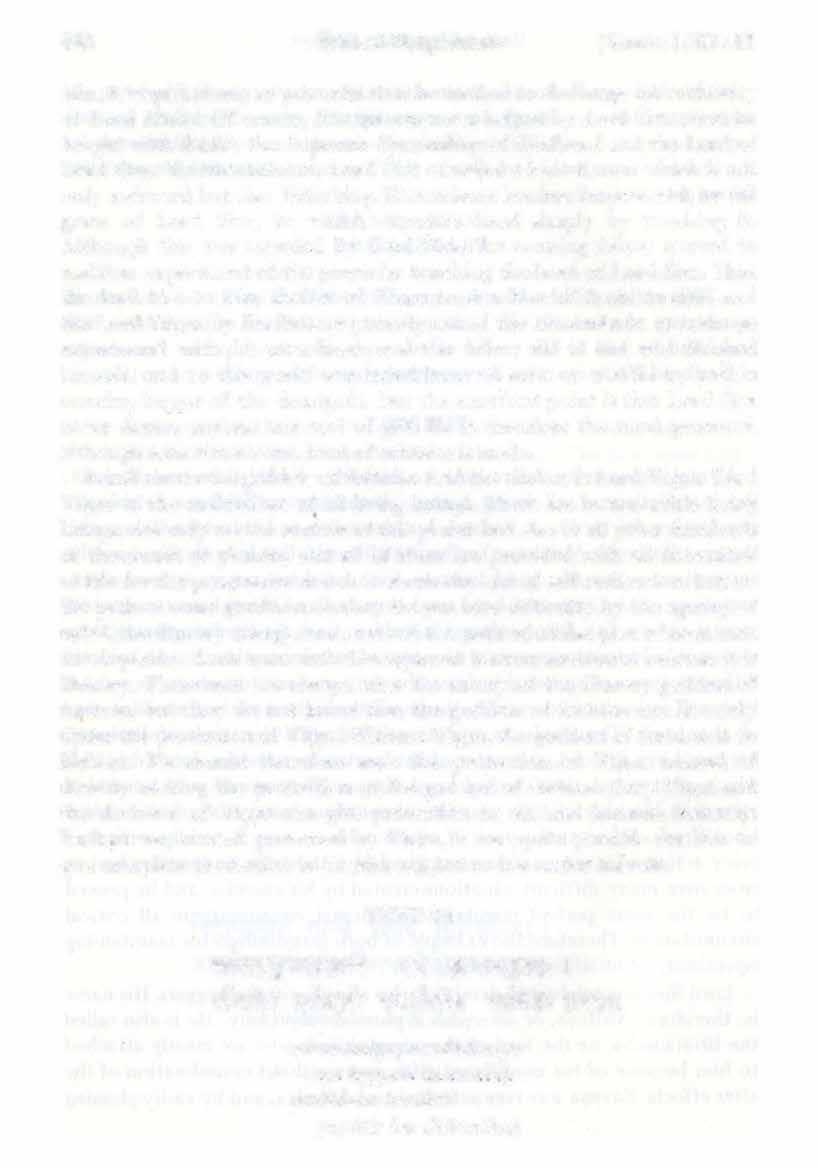
642 Srimad-Bhagavatam [Canto 1, Ch. 12
24 ���C(WJI¥41(1�q 0:� tiQJI¥taf4(t: I (Mta.C4 (C4l�IU �fur �: 11�\?11 saroa-sadgu[La-miihiitmye e�akr�!wmantLvrata(t rantidevaivodaro yayiitirivadhiirmika[l
sarva-sadgurta-mahatmye-glorified by all godly attributes; e§afi.-this child; kn�am-like Lord .Kfl}Qa; anuvratafl.-follower in His footsteps; rantideva-Rantideva; iva-like; udiirafi.-in the matter of magnamimity; yayiitil;r,- Yayati; iva-like; dhiirmikal;r,-concerning religion.
TRANSLATION

This child will almost be as good as Lord Sri Kr��a by following in His footsteps. And in magnanimity he will become as great as King Rantideva. And in religion he will be like Maharaja Yayati.
PURPORT
The last instruction of Lord Sri Kr��a in the Bhagavad-gitii is that one should give up everything and should follow in the footsteps of the Lord alone. Less intelligent persons do not agree to this great instruction of the Lord, as ill luck would have it, but one who is actually intelligent catches up this sublime instruction and is immensely benefited. Foolish people do not know that association is the cause of acquiring qualities. Association with fire makes an object hot, even in the material sense. Therefore, association with the Supreme Personality of Godhead makes one qualified like the Lord. As we have discussed previously, one can achieve seventyeight percent of the godly qualities by the Lord's intimate association. To follow the instructions of the Lord is to associate with the Lord. The Lord is not a material object whose presence one has to feel for such association. The Lord is present everywhere and at all times. It is quite possible to have His association simply by following His instruction because the Lord and His instruction and the Lord and Hisname, fame, attributes and paraphernalia, are all identical with Him, being absolute knowledge.
Maharaja Parik�it associated with the Lord even from the womb of his mother up to the last day of his valuable life, and thus he acquired all the essential good qualities of the Lord in all perfection.
Rantideva: An ancient king prior to the Mahabhiirata period, referred to by Narada Muni while instructing Saiijaya as mentioned in Mahiibharata (Drortaparva 67 Ch). He was a great king liberal for hospitality and distribution of foodstuff. Even Lord Sri Kr��a praised his acts of charity and hospitality. He was blessed by the great Vas�tha Muni for supplyi�g him cold water, and thus he achieved the heavenly planet. He used to supply fruits, roots and leaves to the [§is, and thus he was blessed by them by fulfilling his desires. Although a k§atriya by birth, he never ate flesh in his life. He was especially hospitable to Vasi�tha Muni, and by his blessings
Birth of Emperor Parik{;it 643
only he attained the higher planetary residence. He is one of those pious kings whose names are remembered in the morning and evening.


Yayiiti: The great emperor of the world and the original forefather of all great nations of the world who belong to the Aryan and Indo-European stock. He is the son of Maharaja Nahu�a, and he became the emperor of the world due to his elder brother's becoming a great and liberated saintly mystic. He ruled over the world for several thousands of years and performed many sacrifices and pious activities recorded in history, although his early youth was very lustful and full of romantic stories. He fell in love with Devayani, the most beloved daughter of Sukracarya. Devayani wished to marry him, but at first he refused to accept her because of her being a daughter of a briihmara. According to siistras, a briihmarw could marry the daughter of a briihmara. The were very much cautious about varra-sankara population in the world. ukracarya ammended this law of forbidden marriage and induced Emperor Yayati to accept Devayani. Devayani had a girl friend named Sarmi�tha, who also fell in love with the emperor and thus went with her friend Devayani. Sukracarya forbade Emperor Yayati to call Sarmi�tha into his bedroom, but Yayati could not strictlyfollow his instruction. He secretly married Sarmi�thii also andbegot sons by her. When this was known by Devayani, she went to her father and lodged a complaint. Yayati was much attached to Devayani, and when he went to his father-in-law's place to call her, Sukracarya was angry with him and cursed him to become impotent. Yayati begged his father-in-law to withdraw his curse, but the sage asked Yayati to ask youthfulness from his sons and let them become old as the condition of his becoming potent. He had five sons, two from Devayani and three from Sarmi�tha. From his five sons, namely I) Yadu, 2) Turvasu, 3) Druhyu, 4) Anu, and 5) Piiru, five famous dynasties, namely l) the Yadu dynasty, 2) the Yavana (Turk) dynasty, 3) the Bhoja dynasty, 4) the Mleccha dynasty (Greek), and 5) the Paurava dynasty, all emanated to spread all over the world. He reached the heavenly planets by dint of his pious acts, but he fell down from there because of his self-advertisement and criticizing other great souls. After his fall, his daughter and grandson bestowed upon him their accumulated virtues, and by the help of his grandson and friend Sibi, he was again promoted to the heavenly kingdom, becoming one of the assembly members of Yamaraja, with whom he is staying as a devotee. He performed more than one thousand different sacrifices, gave in charity very liberally and was a very influential king. His majestical power was felt all over the world. His youngest son agreed to award him his youthfulness when he was troubled with lustful-desires, even for on� thousand years. Finally he

644 Srimad-Bhagavatam [Canto I, Ch. I2
became detached from worldlylife and returned the youthfulness again to his son Piiru. He wanted to hand over the kingdom to Piiru, but his noblemen and the subjects did not agree. But when he explained to his subjects the greatness of Piiru, they agreed to accept Piiru as the King, and thus Emperor Yayati retired from family_life and left home for the forest.
TEXT 25

��:���m:1
3116_�SJqi:l1iU-.i mwtl q�qiQ'i! 11�'-\11
dhrtyii bali-sama� km1e
prahliida iva sad-graha� iiharta4o 'svamedhiiniim vrddhiiniim paryupiisaka�
dhrtyii- by patience; bali-sama�-like Bali Maharaja; kr��e- unto Lord Sri Kr�I].a; prahlada-Prahlada Maharaja; iva-like; sat-graha� -devotee of; iiharta- perfor mer; e�a�- this child; asvamedhiiniim-of' Asvamedha sacrifices; v.rddhiinam-of the old and experienced men; paryupiisaka�follower.
TRANSLATION
This child will be like Bali Maharaja in patience, a staunch devotee of Lord Kr��a like Prahlada Maharaja, a performer of many a8vamedha [horse] sacrifices and a follower of the old and experienced men.
PURPORT
Bali Maharaja: One of the twelve authorities in devotional service of the Lord. Bali Maharaja is a great authority in devotional service because he sacrificed everything to please the Lord and relinquished the connection of his so-called spiritual master who obstructed him on the path of risking everything for the service of the Lord. The highest perfection of religious life is to attain to the stage of unqualified devotional service of the Lord without any cause or without being obstructed by any kind of worldly obligation. Bali Maharaja was determined to give up everything for the satisfaction of the Lord, and he did not care for any obstruction whatsoever. He is the grandson of Prahlada Maharaja, another authority in devotional service of the Lord. Bali Maharaja and the history of his
Text 25] Birth of Emperor Parik{!it 645
dealings with Vi�!J.U Vamanadeva are described in the Eighth Canto of Srimad-Bhagavatam (Chapters ll to 24).
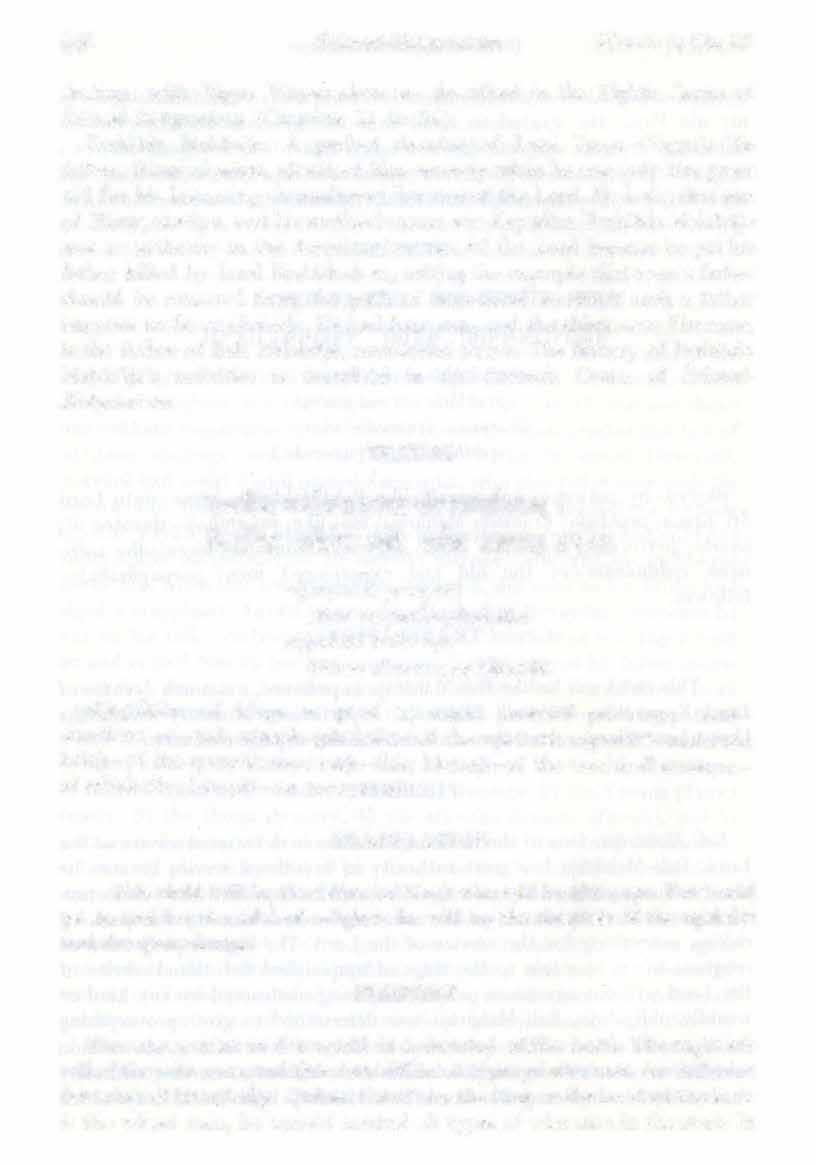
Prahlada Maharaja: A perfect devotee of Lord Kr�!la (Vi�!J.U)- His father, Hira!J.yaka.Sipu, chastised him severely when he wasonly five years old for his becoming an unalloyed devotee of the Lord. Heis thefirst son of Hira!J.yakasipu, and his mother's namewas Kayadhu. Prahlada Maharaja was an authority in the devotional service of the Lord because he got his father killed by Lord Nrsimhadeva, settingtheexamplethat even afather should be removed from the path of devotional service if such a father happens to be anobstacle. He had foursons, andthe eldestson, Virocana, is the father of Bali Maharaja, mentioned above. The history of Prahlada Maharaja's activities is described in the Seventh Canto of SrimadBhagavatam.
TEXT
riijar�iniirh janayitii siistii cotpatha-giiminiim nigrahitii kaler e�a bhuvo dharmasya kiirartiit
riij�-niniim-of kings as good as sages; janayita-producer; siistiichastiser; ca-and; utpatha-giiminiim-of the upstarts; nigrahitii-molester; kaleft-of the quarrelsome; e�afl-this ; bhuva[l-of the world; dharmasyaof religiosity;kiira[Uit-on account of.
TRANSLATION
This child will be the fatherof kingswho will be likesages.Forworld peace and for the sake of religion, he will be the chastiser of the upstarts and the quarrelsome.
PURPORT
The wisest man in the world is a devotee of the Lord. The sages are calledthewise men,and thereare different types ofwise menfor different branches of knowledge. Unless, therefore, theking orthe head of the state is the wisest man, he cannot control all types of wise menin the state. In
646 Srimad-Bhagavatam [Canto l, Ch. 12
� � • ilii(Uil(n��11
26 u��;rl1m�;(l�q�•nllt�1 f.nlftiji
the line of royal succession in the family of Maharaja Yudhi�thira, all the kings, without exception, were the wisest men of their times, and so also it is foretold about Maharaja Pan�it and his son Maharaja J anamejaya who was yet to be born. Such wise kings can become chastisers of upstarts and uprooters of Kali, or quarrelsome elements. As it will be clear in the chapters ahead, Maharaja Parik�it wanted to kill the personified Kali who was attempting to kill a cow, the emblem of peace and religion. The symptoms of Kali are l) wine, 2) women, 3) gambling and 4) slaughterhouses. Wise rulers of all states should take lessons from Maharaja Parik�it in how to maintain peace and morality by subduing the upstarts and quarrelsome people who indulge in wine, illicit connection with women, gambling andmeat-eatingsupplied by regularlymaintainedslaughterhouses. In this age of Kali, regular license is issued for maintaining all of these different departments of quarrel. So how can they expect peace and morality in the state? The state fathers, therefore, must follow the principles of becomingwiserbydevotion to the Lord, by chastising the breaker of discipline and by uprooting the symptoms of quarrel, as mentioned above. If we want blazing fire, we must use dry fuel. Blazing fire and moist fuel go ill together. Peace and morality can prosper only by the principles of Maharaja Pan�it and his followers.
TEXT 27
stq�<t aq� �Qf: q( ": 11�\911
tak�akiid iitmano mrtyurh dvija-putropasarjitiit
prapatsyata upasrutya mukta-sang� padarh hare�

tak�akiit-by the snake-bird; iitmana{l-of his personal self; m]tyumdeath; dvija-putra-the son of a briihmarw; upasarjitiit-being sent by; prapatsyate-having taken shelter of; upaSrutya-after hearing; muktasanga{l-freed from all attachment;padam-position;hare{l-of the Lord.
TRANSLATION
After hearing about his death, which will be caused by the bite of a snakebird sent by a son of a brahm�a, he will get himself freed from all
Text 27] Birth of Emperor Par�it 647
"4il�k¥4wtl���iNQilt<tl<)\ l
material attachment and surrender unto the Personality of Godhead, taking shelter of Him.
PURPORT
Material attachment and taking shelter of the lotus feet of the Lord go ill together. Material attachment means ignorance of transcendental happiness under the shelter of the Lord. Devotional service of the Lord, while existing in the material world, is a way to practice one's transcendental relation with the Lord,and when it is matured,one gets completely free from all material attachment and becomes competent to go back home, back to Godhead. Maharaja PanK.�it, being especially attached to the Lord· fromthebeginning of his body in the womb of his mother,was continually under the shelter of the Lord, and the so-called warning of his death within seven days from the date of curse by the briihmar-a,s son became a boon to him to prepare himself to go back home, back to Godhead. Since he was always protected by the Lord, he could have avoided the effect of such a curse by the grace of the Lord, but he did not take such undue advantage for nothing. Rather, he made the best use of a bad bargain, and for seven days continually he heard Srimad-Bhiigavatam from the right source, and thus he got shelter of the lotus feet of the Lord by that opportunity.
TEXT 28
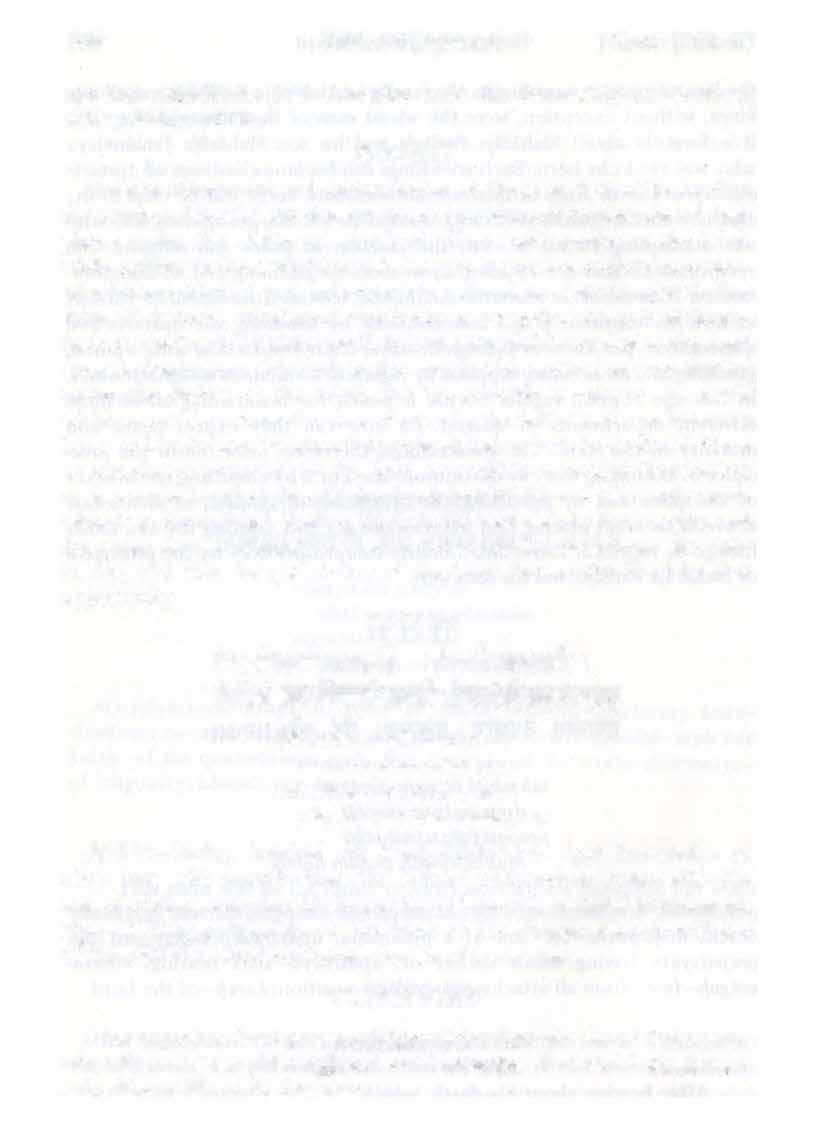
�
� erf '1llllftii\!4�4Jtfflfltt¥( ������
jijiiiisitiitma-yiithiirthyo
muner vyiisa-sutiid asau
hitvedarh nrpa gangiiyiirh
yiisyaty addhiikutobhayam
jijiiiisita-having inquired of; iitma-yiithiirthyafi.-right knowledge of one's own self; mune[l- from the learned philosopher; vyiisa-sutiit-the son of Vyasa; asau-he; hitoo-quitting; idam-this material attachment; n!]Xl-0 King; gangiiyiim-on the bank of the Ganges; yiisyati-will go; addhii-directly; akutafl-bhayam-the life of fearlessness.
TRANSLATION
After inquiring about proper self-knowledge from the son of Vyasadeva, who will be a great philosopher, he will renounce all material attac�1 and achievea life of fearlessness.
648 Srimad-Bhagavatam [Canto l, Ch_ 12
�i(fflijl�«ll
Material knowledge means ignorance of the knowledge of one's own self. Philosophy means to seek after the right knowledge of one's own self, or the knowledge of self-realization. Without self-realization, philosophy is dry speculation or a waste of time and energy. $rimad-Bhiigavatam gives the right knowledge of one's own self, and by hearing $rimadBhiigavatam one can get free from material attachment and enter into the kingdom of fearlessness. This material world is fearfulness. Its prisoners are always fearful as within a prison house. In the prison house no one can violate the jail rules and regulations, and violating the rules means another term for extension of prison life. Similarly, we in this material existence are always fearful. This fearfulnessis called anxiety. Everyone in the material life, in all species and varieties of life, is full of anxieties, either by breaking or without breaking the laws of nature. Liberation, or mukti, means getting relief from these constant anxieties. This is only possible when the anxiety is changed in the devotional service of the Lord. $rimad-Bhiigavatam gives us this chance of changing the quality of anxiety from matter to spirit. This is done in the association of a learned philosopher like the self-realized Sukadeva Gosvami, the great son of Sri Vyasadeva. Maharaja Parik�it, after receiving warning of his death, took advantage of this opportunity by association with Sukadeva Gosvami and achieved the desired result.
There is a sort of imitation of this reciting and hearing of $rimadBhiigavatam by professional men, and their foolish audience thinks that they will get free from the clutches of material attachment and attain the life of fearlessness. Such imitative hearing of $rimad-Bhiigavatam is a caricature only, and one should not be misled by such performance of Bhiigavatam saptiiha, undertaken by ridiculous greedy fellows to maintain an establishment of material enjoyment. TEXT
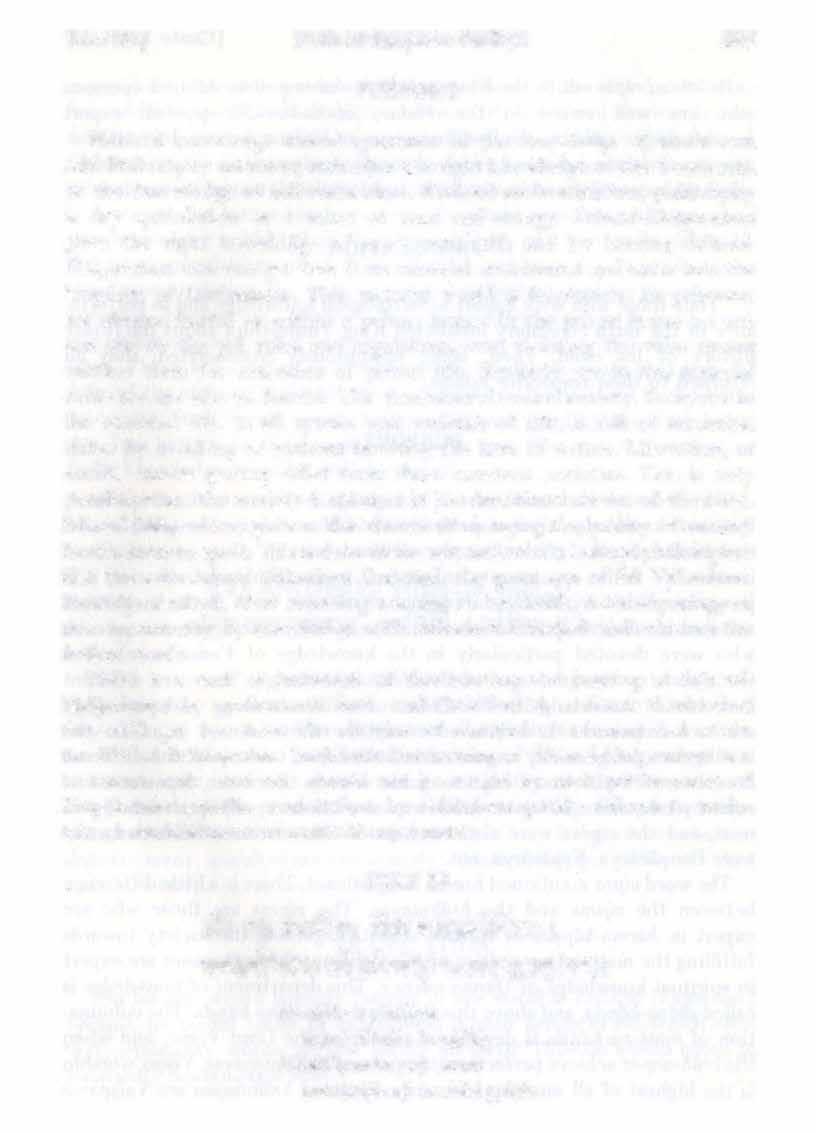
Text 29) Birth of Emperor Par�t 649
PURPORT
29 � � i3qa��mn:.ilt6wfit«a: , �aqR6q:�!tM:.ii"Jl:����e>_,ll iti rajna upiidiSya vipra fotaka-kovida� labdhapacitaya� sarve pratijagmu� svakan grhan
iti-thus;riijii.a-unto the King;upiidisya-having advised; viprii-persons who are well versed in the Vedas; jiitaka-kovidiift-persons expert in astrology and in the performance of birth ceremonies; labdhaapacitayaft:...those who had received sumptuously as remuneration;sarveall of them;pratijagmul:t-went back;svakiin-their own;grhiin-houses.
TRANSLATION
Thus those who were expert in astrological knowledge and in performance of the birth ceremony instructed King Yudhi�thira about the future history of his child. Then, being sumptuously remunerated, they all returned to .their respective homes.
PURPORT
The Vedas are the storehouse of knowledge, both material and spiritual. But such knowledge aims at perfection of self-realization: In other words, the Vedas are the guides for the civilized man in every respect. Since human life is the opportunity to get free from all material miseries, it is properly guided by the knowledge of the Vedas, both in the matters of material needs and spiritual salvation. The specific intelligent class of men who were devoted particularly in the knowledge of Vedas were called the vipras, or the graduates of the Vedic knowledge. There are different branches of knowledge in the Vedas, of which astrology and pathology are two important branches necessary for the common man. So the intelligentmen,generally known as thebriihma'(las, took up all the different branches of Vedic knowledge to guide society. Even the department of military education (Dhanur-veda) was also taken up by such intelligent men, and the vipras were also teachers of this section of knowledge, as were Dro!J.licarya, Kfpacarya, etc.
The wordvipra mentioned herein is significant. There is a little difference between the vipras and the briihma'(lUS. The vipras are those who are expert in karma-kii'(lpa, or fruitive activities, guiding the society towards fulfilling the material necessities of life, whereas the briihmaras are expert in spiritual knowledge of transcendence. This department of knowledge is called jniina-kiirpa, and above this there is the upa5ana-kiirpa. The culmination of upasana-kiirtpa is devotional service of the Lord Vi�!J.U, and when the briihmartas achieve perfection, they are called Vai�!lavas. Vi�!J.U worship is the highest of all modes of worship. Elevated briihmaras are Vai�!lavas

650 Srimad-Bhagavatam [Canto 1, Ch. 12
engaged in the transcendental loving service of the Lord, and thus Srimad-Bhiigavatam, which is the science of devotional service, is very dear to the Vai�!J.avas. And as explained in the beginning of the SrimadBhiigavatam, it is the mature fruit of Vedic knowledge and is superior subject matter, above the three kiirzflas, namely karma, jiiiina and upa5ana.
Amongst the karma-kiirz{ia experts, the jiitaka expert vipras were good astrologers who could tell all the future history of a born child simply by the astral calculations of the time (lagna), and such expert jiitaka-vipras were present during the birth of Maharaja Parik�it, and his grandfather, Maharaja Yudhi�thira, awarded the vipras sufficiently with gold, land, villages, grains and other valuable necessaries of life, which also include cows. There is a need" of such vipras in the social structure, and it is the duty of the state to maintain them comfortably, as designed in the Vedic procedure. Such expert vipras, being sufficiently paid by the state, could give free service to the people in general, and thus this department of Vedic knowledge could be available for all.
TEXT 30
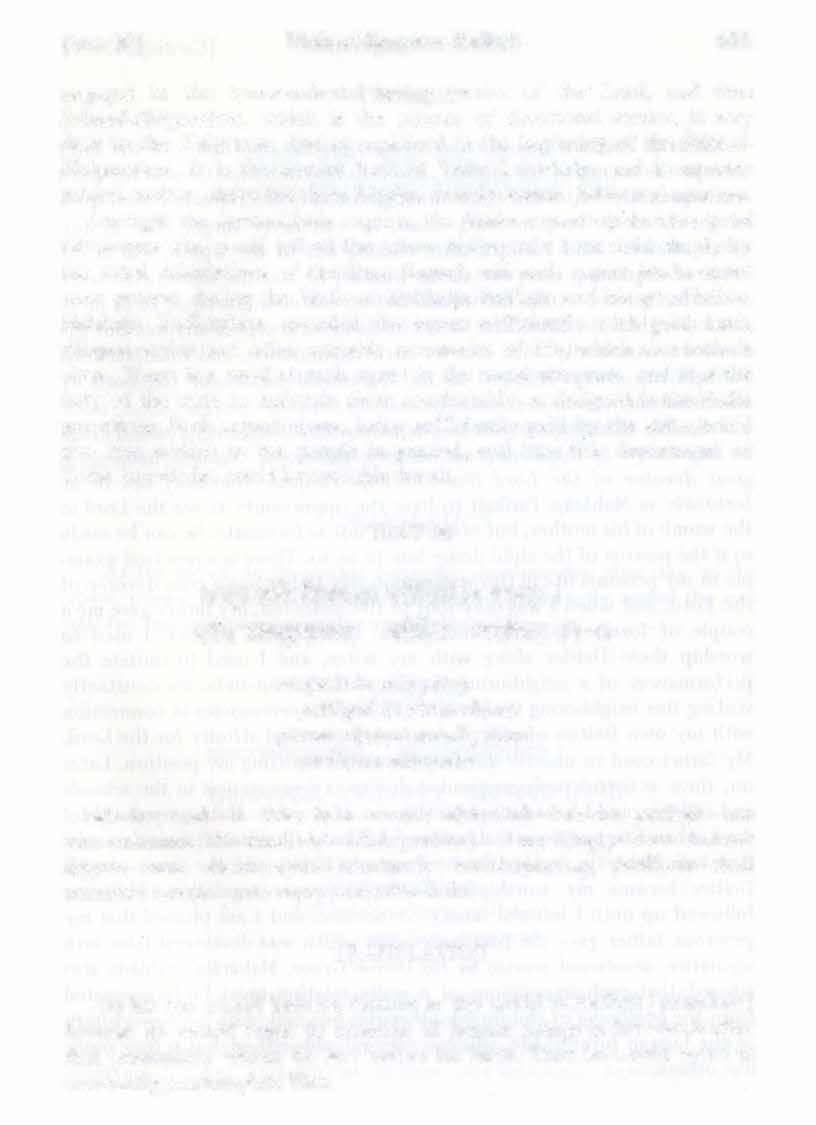
sa efia loke vikhyiita� pan"k�id iti yat prabhu� purvan dr�tam anudhyiiyan parlk§eta nare§viha
sa�-he; e�a�-in this; loke-world; vikhyiita�- famous ; pan"k�it- one who examines; iti-thus; yat-what; prabhu� - 0 my King; piirvan-before; dntam-seen; anudhyiiyan- constantly contemplating; parik�eta-shall examine; nare�u-:unto every man; iha-here.
TRANSLATION
So his son would become famous in the world as Par�it [examiner] because he would come to examine all human beings in his search after that personality whom he saw before his birth. Thus he would come to constantly contemplate Him.
Text 30] Birth of Emperor Par�it 651
{{��FI�:��:I �� tt¥4�1�1. � ;w�f'q(II� oII
Maharaja Parik�it, fortunate as he was, got the impression of the Lord even in the womb of his mother, and thus his contemplation on the Lord was constantly with him. Once the impression of the transcendental form of the Lord is fixed in one's mind, he can never forget Him in any circumstance. Child Pan1qit, after coming out of the womb, was in the habit of examining everyone to see whether he was the same personality whomhefirst saw within the womb.But no one could he equal to or more attractive than the Lord, and therefore he never accepted anyone.But the Lord was constantly with him by such examination, and thus Maharaja Parik�it was always engaged in the devotional service of the Lord by remembrance.
Srila ]iva Gosviimi remarks in this connection that every child, if given an impression of the Lord from his very childhood, certainly becomes a great devotee of the Lord like Mahiiriija Pan7t�it. One may nat he as fortunate as Maharaja Pan1qit to have the opportunity to see the Lord in the womb ofhis mother, hut even if he is not sofortunate, he can he made so if the parents of the child desire him to he so. There is a practical example in my personal life in this connection.My father was a pure devotee of the Lord, and when I was only four or five years old, my father gave me a couple of forms of Radha and Kr��a. In a playful manner, I used to worship these Deities along with my sister, and I used to imitate the performances of a neighboring temple of Radha-Govinda. By constantly visiting this neighboring temple and copying the ceremonies in connection with my own Deities of play, I developed a natural affinity for the Lord. My father used to observe all the ceremonies befitting my position. Later on, these activities were suspended due to my association in the schools and colleges, and I became completely out of practice. But in my youthful days, when I met my spiritual master Sri Srimad Bhaktisiddhanta Sarasvati Gosvami Maharaja, again I revived my old habit, and the same playful Deities became my worshipful Deities in proper regulation..This was followed up until I left the family connection, and I am pleased that my generous father gave the first impression which was developed later into regulative devotional service by His Divine Grace. Maharaja Prahlada also advised that such impressions of a godly relation must be impregnated from the beginning of childhood, otherwise one may miss the opportunity of the human form of life, which is very valuable although it is temporary like others.

652 Srimad-Bhagavatam [Canto 1, Ch. 12
PURPORT
TEXT 31


sa riija-putro vavrdhe iisu sukla ivOt;lupa/:t iipuryamiirwl:t pitrbhi/:1
k�thiibhir iva so 'nvaham
sa�-that; riija-putro�-the royal prince; vavrdhe-grew up; asu-very soon; sukle-waxing moon; iva-like; u�upa�-the moon; iipuryamiirw�luxuriantly; pitrbh�-by the parental guar dians; kii§thiibh�-plenary development; iva-like; sa�-he; anvaham-day after day.
TRANSLATION
As the moon, in its waxing fortnight, develops day after day, so the royal prince (Pan�t] very soon developed luxuriantly under the care and full facilities of his guardian grandfathers.
TEXT 32
�iiMlS� =tnRti\(f�,l��l I
� �it: ������
yak�yamii[lo 'svamedhena
j;iiitidrohajihiisayii
riijii labdha-dhano dadhyau
niinyatra kara-da[l�ayo/:1
yak§yamii[la�-desiring to perform; asvamedhena-by the horse sacrifice ceremony; ;niitidroha-fighting with kinsmen; jihiisayii- for getting free; riijii-King Yudhil}thira; labdha-dhana�-for getting some wealth; dadhyau-thought about it; na anyatra-not otherwise; kara-dart�ayo/:1taxes


es.

Text 32) Birth of Emperor Parik{lit
653
n
n
a
d fi
TRANSLATION
Just at this time, King Yudhi�thira was considering performing a horse sacrifice to get freed from sinsincurred from fighting with kinsmen. But he became anxious to get some wealth, for there were no surplus funds outside of fines and tax collection.
PURPORT
As the briihma[LaS, the vipras had a right to be subsidized by the state, and similarly the state executive head had the right to collect taxes and fines from the citizens. After the Battle of Kuruk�etra the state treasury was exhausted, and therefore there was no surplus fund except the fund from tax collection and fines. Such funds were sufficient only for the state budget, and having no excess fund, the King was anxious to get more wealth in some other way in order to perform the horse sacrifice.
Maharaja Yudhi�thira wanted to perform this sacrifice under the instruction of Bhi�madeva.

TEXT 33


G«Jii�G+ti{'S\"lf RRtU���R�1: I
\T-i �� \'{fW: II��II
tad abhipretam alakua
bhriitaro 'cyuta-coditafl
dhanarh prahi[lam ajahur
udicyiirh di.Si bhiirisafl
tat-his; abhipretam-wishes of the mind; iilak�ya-observing; bhriitara� -his brothers; acyu ta-the infallible (Lord Sri Kr�Qa); codi tii�-being advised by; dhanam-riches; prahi[Lam-to collect; iijahu�- brought about; udicyiim-northern; diSi-direction; bhiiriSa�-sufficient.
TRANSLATION
Understanding the hearty wishes of the King, his brothers, as advised by the infallible Lord Kr��a, collected sufficient riches from the North [left by King Marotta] .
654
[Canto l, Ch. 12
Srimad-Bhagavatam
Mahiiriija Marotta: one of the great emperors of the world. He reigned over the world long before the reign of Maharaja Yudhi�thira. He was the son of Maharaja Avik�it and was a great devotee of the son of the sun-god, known as Yamaraja. His brother Samvarta was a rival priest of the great Brhaspati, the learned priest of the demigods. He conducted one sacrifice called Sailkara-yajiia by which the Lord was so satisfied that He was pleased to hand over to him the charge of a mountain peak of gold. This peak of gold is somewhere in the Himalayan mountains, and modern adventurers may try to find it there. He was so powerful an emperor that at the day's end of sacrifice, the demigods from the other planets like lndra, Candra, Brhaspati, etc., used to visit his palace. And because he had the gold peak at his disposal, he had sufficient gold in his possession. The canopy of the sacrificial altar was completely made of gold. In his daily performances of the sacrificial ceremonies, some of the inhabitants of the Vayuloka (airy planets) were invited to expedite the cooking work of the ceremony. And the assembly of the- demigods in the ceremony was led by Visvadeva.
By his constant pious work he was able to drive out all kinds of diseases from the jurisdiction of his kingdom. All the inhabitants of higher planets like Devaloka, Pitrloka, etc., were all pleased with him for his great sacrificial ceremonies. Every day he used to give in charity to the learned briihmaras such things as beddings, seats, conveyances and sufficient quantities of gold. Because of munificent charities and performances of innumerable sacrifices, the King of heaven, lndradeva, was fully satisfied with him and always wished for his welfare. Due to his pious activities, he remained a young man throughout his life and reigned over the world for one thousand years, surrounded by his satisfied subjects, ministers, legitimate wife, sons and brothers. Even Lord Sri Kr�p.a praised his spirit of pious activities. He handed over his only daughter to Mahar�i Angira, and by his good blessings, he was elevated to the kingdom of heaven. First of all, he wanted to offer the priesthood of his sacrifices to learned Brhaspati, but the demigod refused to accept the post because of the King's being a human being or man of this earth. He was very sorry for this, but on the advice of Narada Muni he appointed Samvarta to the post, and he was successful in his mission.
The success of a particular type of sacrifice completely depends on the priest in charge. In this age, all kinds of sacrifice are forbidden because there is no learned priest amongst the so-called briihmaras who go by the false notion of becoming sons of briihmaras without brahminical qualifi-

Text 33] Birth of Emperor Parik{lit 655
PURPORT
cations. In this age of Kali, therefore, only one kind of sacrifice is recommended, sankirtana-yajfia, as inaugurated by Lord Sri Caitanya Mahaprabhu.
TEXT 34 ��·�:1 4UR1��41ijt q:(1+ttt�:aR( ll�'«lll
tena sambhrta-sambhiiro dharma-putro yudh4thirafl viijimedhais tribhir bhito yajiiaifl samayajadd harim
tena-with that wealth; sambhrta-collected; sambhiira[l-ingredients; dharma-putro[l-the pious king; yudh4thiro[l- Yudhi�thira; viijimedhaifr,by horse sacrifices; tribhifr,-three times; bhitafl-being greatly afraid after the Battle of Kuruk�etra; yajnai[l-sacrifices; samayajat-perfectly worshiped; harim-the Personality of Godhead.
TRANSLATION

By those riches, the King could procure the ingredients for three horse sacrifices. Thus the pious King Yudhi�hira, who was very fearful after the Battle of Kuruksetra, pleased Lord Hari the Personality of Godhead.
PURPORT
Maharaja Yudhi�thira was the ideal and celebrated pious King of the world, and still he was greatly afraid after the execution of the Battle of Kuruk�etra because of the mass killing in the fight, all of which was done only to install him on the throne. He therefore took all the responsibility for sins committed in the warfare, and to get rid of all these sins, he wanted to perform three sacrifices in which horses are offered at the altar. Such a sacrifice is very costly. Even Maharaja Yudhi�thira had to collect the necessary heaps of gold left by Maharaja Marutta and the briihmarzas who were given gold in charity by King Marutta. The learned briihmarzas could not take away all the loads of gold given by Maharaja Marutta, and therefore they left behind the major portion of the gift. And Maharaja
656 Srimad-Bhagavatam [Canto l, Ch. 12
Marutta also did not recollect such heaps of gold given away in charity. Besides that, all the golden plates and utensils which were used in the sacrifice were also thrown in the dustbins, and all such heaps of gold re· mained unclaimed property for a long time, till Maharaja Yudhi�thira collected them for his own purposes. Lord Sri Kr�!la advised the brothers of Maharaja Yudhi�thira to collect the unclaimed property because it belonged to the King. The more astonishing thing is that no subject of the state also collected such unclaimed gold for industrial enterprise, or anything like that. This means that the state citizens were completely satisfied with all necessities of life and therefore not inclined to accept unnecessary productive enterprises for sense gratification. Maharaja Yudhi�thira also requisitioned the heaps of gold for performing sacrifices and for pleasing the Supreme Hari Personality of Godhead. Otherwise he had no desire to collect them for the state treasury.
One should take lessons from the acts of Maharaja Yudhi�thira. He was afraid of sins committed on the battlefield, and therefore he wanted to satisfy the supreme authority. This indicates that unintentional sins are also committed in our daily occupational discharge of duties, and to counteract even such unintentional crimes, one must perform sacrifices as they are recommended in the revealed scriptures. The Lord says in the Bhagavadgitti (yajiitirthtit karmarto 'nyatra loko 'yam karma-bandhanafr.) that one must perform sacrifices recommended in the scriptures in order to get rid of commitments of all unauthorized work, or even unintentional crimes which we are apt to commit. By doing so, one shall be freed from all kinds of sins. And those who do not do so, but work for self-interest or sense gratification, have to undergo all tribulations accrued from committed sins. Therefore, the main purpose of performing sacrifices is to satisfy the Supreme Personality Hari. The process of performing sacrifices may be different in terms of different times, places, and persons, but the aim of such sacrifices is one and the same at all times and in all circumstances, viz., satisfaction of the Supreme Lord Hari. That is the way of pious life, and that is the way of peace and prosperity in the world at large. Maharaja Yudhi�thira did all these as the ideal pious King in the world.
If Maharaja Yudhi�thira is a sinner in his daily discharge of duties, in royal administration of state affairs, wherein killing of man and animals is a recognized art, then we can just imagine the amount of sins committed consciously or unconsciously by the untrained population of the Kali-yuga who have no way to perform sacrifice to please the Supreme Lord. The

Text 34] Birth of Emperor Par�it 657
Bhiigavatam says, therefore, that the prime duty of the human being is to satisfy the Supreme Lord by the performance of one's occupational duty. (Bhiig. 1.2.13)
Let any man of any place of community, caste or creed be engaged in any sort of occupational duty, but he must agree to perform sacrifices as it is recommended in the scriptures for the particular place, time and person. In the Vedic literatures it is recommended that in Kali-yuga people engage in glorifying the Lord by chanting the holy name of Kf�p.a (Kirtaniid eva kr�rr.asya mukta-sanga� param vrajet) without offense. By doing so one can be freed from all sins and thus can attain the highest perfection of life by returning home, back to Godhead. We have already discussed this more than once in this great literature in different places, especially in the introductory portion by sketching the life of Lord Sri Caitanya Mahaprabhu, and still we are repeating the same with a view to bring about peace and prosperity in society.
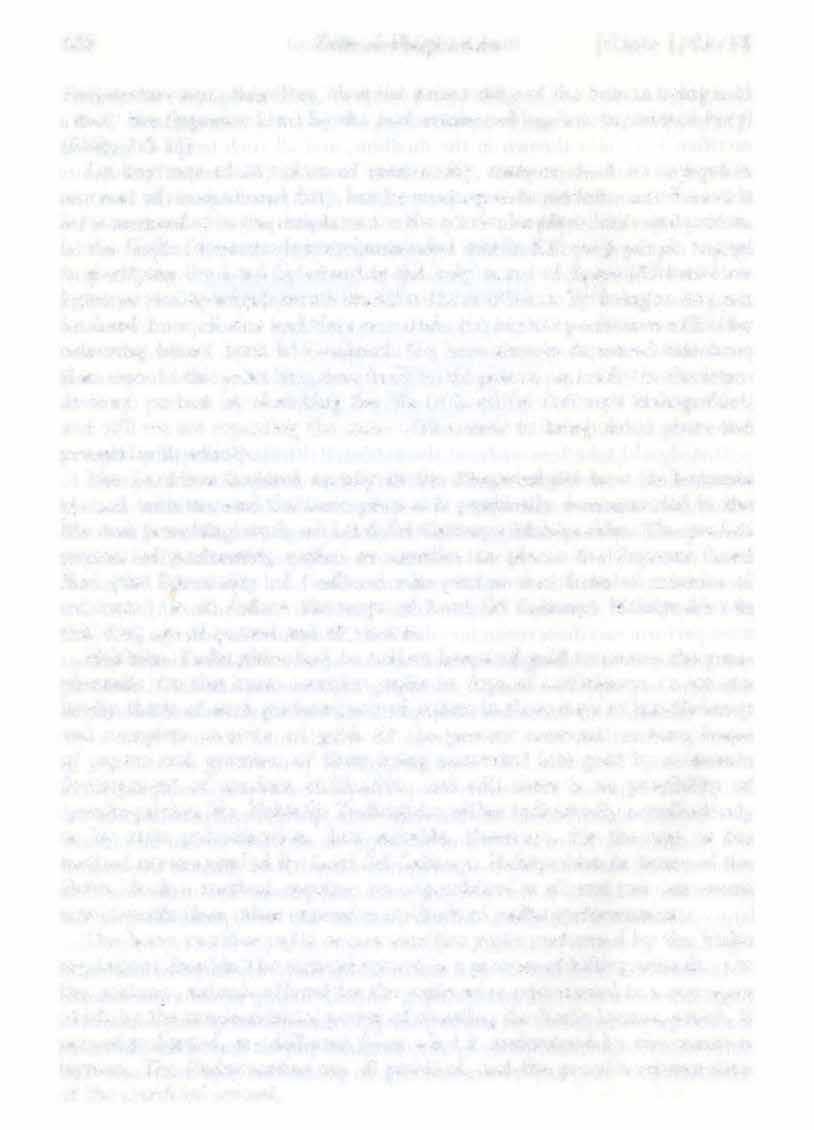
The Lord has declared openly in the Bhagavad-gitii how He becomes pleased with us, and the same process is practically demonstrated in the life and preaching work of Lord Sri Caitanya Mahaprabhu. The perfect process of performing yajii.as or sacrifice to please the Supreme Lord Hari (the P�rsonality of Godhead who gets us free from all miseries of existence) is to follow the ways of Lord Sri Caitanya Mahaprabhu in this dark age of quarrel and dissension.
Maharaja Yudhi�thira had to collect heaps of gold to secure the paraphernalia for the horse sacrifice yajii.a in days of sufficiency, so we can hardly think of such performance of yajii.as in these days of insufficiency and complete scarcity of gold. At the present moment we have heaps of papers and promises of their being converted into gold by economic development of modern civilization, and still there is no possibility of spending riches like Maharaja Yudhi�thira, either individually or collectively or by state patronization. Just suitable, therefore, for the age, is the method recommended by Lord Sri Caitanya Mahaprabhu in terms of the siistra. Such a method requires no expenditure at all and yet can award more benefit than other expensive methods of yajii.a performances.
The horse sacrifice yajii.a or cow sa�rifice yajii.a performed by the Vedic regulations shouldn't be misunderstood as a process of killing animals. On the contrary, animals offered for the yajii.a were rejuvenated to a new span of life by the transcendental power of chanting the Vedic hymns, which, if properly chanted, are different from what is understood by the common layman. The Veda-mantras are all practical, and the proof is rejuvenation of the sacrificed animal.
658 Srimad-Bhagavatam [Canto 1, Ch . 12
There is no possibilityofsuchmethodicalchantingofthe Vedichymns by the so-called briihmaras or priests of the present age. The untrained descendants of the twice-born families are no more liketheir forefathers, andthustheyarecounted amongst the siidras oronce-born men.Theonceborn man is unfit to chant the Vedic hymns, and therefore there is no practicalutilityofchantingtheoriginal hymns.
And to save them all, Lord Sri Caitanya Mahaprabhu propounded the sankirtana movementor yajiia forallpracticalpurposes, andthepeopleof the present age are strongly recommended to follow this sure and recognized path.
TEXT 35
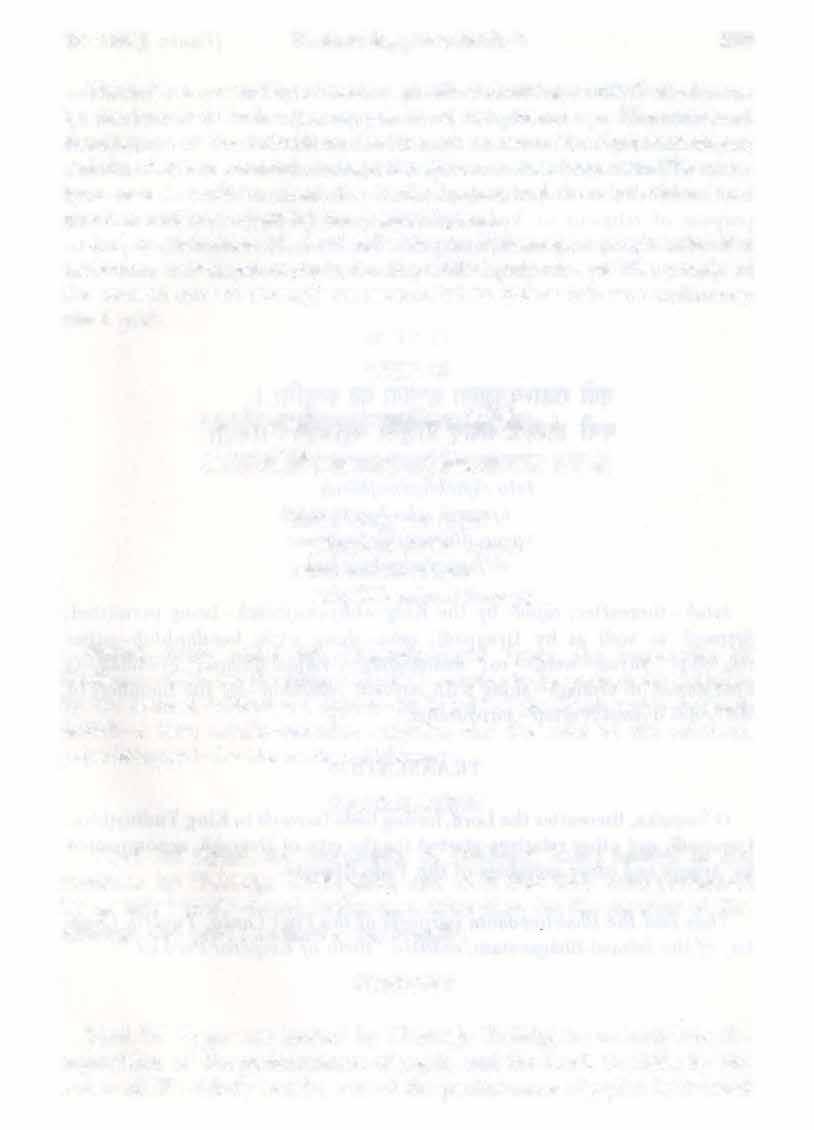
iihiito bhagaviin riijiiii yiijayitvii dvijair nrpam uviisa katicin miisiin suhrdiirh priya-kiimyayii
iihuta�-being called by; bhagaviin-Lord Kr��a, the Personality of Godhead;riijiiii-bytheKing;yiijayitvii-causingtobeperformed;dvija�by the learned brohmacras; n .rpam-on behalf of the King;uvtisa-resided; katicit-a few; nuisiin-months;suhpliim-for the sake of the relatives; priya-kiimyaya-for thematterofpleasure.
TRANSLATION
Lord Sri 1\.r�l}.a, the Personality of Godhead, being invited to the sacrifices by Maharaja Yu�hira, saw to it that they were performed by qualified [twice-bornJ brahmapas. After that, for the pleasure of the relatives, the Lord remained a few months.
PURPORT
Lord Sri Kr�!la was invited by Maharaja Yudhi�thira to look into the supervision of theperformances of yajiia, and the Lord, to abideby the orders of His elderly cousin, caused theperformanceof yajiias by learned
Text 35] Birthof Emperor Par�it 659
·
�����fli�Tfl��q'( I �¥fil�fl4l«twt�
fil�iifili4�1 ����II
twice-born briihmaras. Simply taking birth in the family of a briihmara does not make one qualified to perform yajiias. He must be twice born by proper training and initiation from the bona fide iiciirya. The once-born scions of briihmara families are equal with the once-born siidras, and such bralima-bandhu or unqualified once-born scions must be rejected for any purpose of religious or Vedic function. Lord Sri Kr�!la was entrusted to look after this arrangement, and perfect as He is, He caused the yajiias to be performed by the bona fide twice-born briihmaras for successful execution.
TEXT 36

tato riijiiiibhyanujiiiita[l kmwyii saha bandhubhi[l yayau dviiravatim brahman siirjuno yadubhir vrta[l
tata[l, -thereafter; riijiiii- by the King; abhyanujiiiita[l - being permitted; knTJayii-as well as by Draupadi; saha-along with; bandhubhi[l-other relatives; yayau-went to; dviiravatim-Dvaraka-dhama; brahman-0 briihmaras; sa arjuna[l-along with Arjuna; yadubhi[l-by the members of the yadu dynasty; vrtafl-surrounded.
TRANSLATION
0 Saunaka, thereafter the Lord, having bade farewell to King Yudhi�thira, Draupadi, and other relatives, started for the city of Dvaraka, accompanied by Arjuna and other members of the Yadu dynasty.
Thus end the Bhaktivedanta purports of the First Canto, Twelfth Chapter, of the Srimad-Bhagavatam, entitled "Birth of Emperor Pant.�it. ''

660 Srimad-Bhagavatam [Canto 1, Ch. 12
Srlmad-Bhagavatam
First Canto
<�rt Two-Chapters 8-12!

with the original Sanskrit text, its Roman transliteration, word-for-word synonyms, translation and elaborate purports by

His Divine Grace
A.C. Bhaktivectanta swami Prabhupacta Founder-Acarya of the International Society for Krishna Consciousness
292 pages
13 color illustrations
EXPLANATION OF THE COVER
1. The original spiritual planet, which resembles the whorl of a huge lotus flower, is called Goloka Vrndavana. It is the abode of Lord Kf�l)a, the original Personality of Godhead.
2. This original planet Goloka throws off a spiritual ray of effulgence called brahmajyoti which is the ultimate goal of the impersonalists.
3. Within this unlimited brahmajyoti there are unlimited numbers of spiritual planets, as there are innumerable material planets within the sun rays of the material universes. These spiritual planets are dominated by plenary expansions of Lord Kf�l)a, and the inhabitants there are ever liberated living beings. They are all four-handed. The Lord is known there as Narl!yl!l)a, and the planets are known as Vaikup!has.
4.'Sometimes a spiritual cloud overtakes a corner of the spiritual sky of brahmajyoti, and the covered portion is called the mah{!t-tattva. The Lord then, by His portion as Mahl!-Vi�pu, lies down in the water within the mahattattva. The water is called the Causal Ocean (kiiraQa-jala).
5. As He sleeps within the Causal Ocean, innumerable universes are generated with His breathing. These floating universes are scattered all over the Causal Ocean. They stay during a breath of Maha·Vi�pu.
6. In each and every universal globe the same Maha-Vi�pu enters again as Garbhodakasl!yi Vi�I)U and lies there on the Garbha Ocean on the serpentine Se�a incarnation. From His navel-abdomen sprouts a lotus stem, and on the lotus, Brahma. the lord of the universe. is born. Brahml! creates all living beings of different shapes in terms of desire within the universe. He also creates the sun. moon and other demi· gods.
(continued on back flap)
7. The sun is situated almost in the center of each and every universe, and it distributes profuse light and heat all over the universe. There are mi·llions and billions of suns in all the millions and billions of universes within the mahattattva. The suns and moons are required within the universes because they are dark by nature. The Vedas instruct us to go out of the dark universes and reach the glowing effulgence, the brahmajyoti.
8. The brahmajyoti is due to the illuminating Vaiku!l!ha planets, which need no sun or moon or power of electricity.
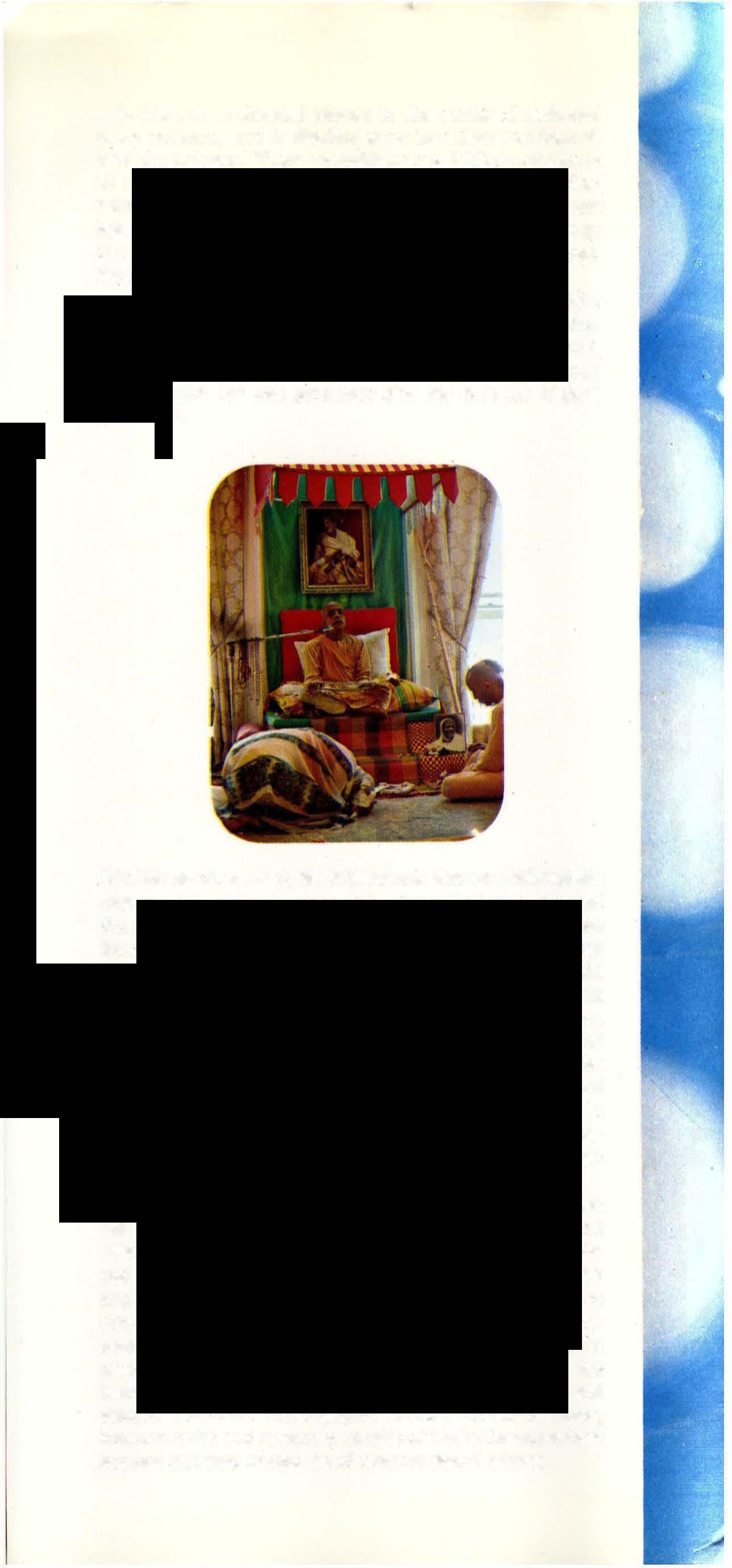

Srlmad-Bhagavatam helps us reach the supreme planet, Goloka Vrndavana. The door is open for everyone. Human life is meant for this particular aim, for it is the highest perfection.
His Divine Grace A. C. Bhaktivedanta Swami Prabhupada first met his spiritual master, Srila Bhaktisiddhanta Sarasvati Gosvaml Maharaja, inCalcutta in 1922. Srtla Bhaktisiddhanta liked this educated young man and injected in him the idea of preaching the message of Srlmad-Bhagavatam all over the world. At Allahabad in 1933 Srila Prabhupada became his formally initiated disciple, and in 1937, just days before his spiritual master's departure from this mortal world, he was specificallyordered to spread Kr�r)a consciousness in the English language. Thus in 1944 Srila Prabhupada started Back to Godhead magazine, which is now circulated in six different languages throughout the world, and he also published, in English, the first three volumes of his Srlmad· Bhagavatam.
In 1965, at the advanced age of 70, His Divine Grace. sailed to the United States to fulfill his master's sacred mission, bringing with him only seven dollars, some books and a pair of hand cymbals. Shortly afterwards he began classes on Bhagavad-glta in a small storefront in New York City. Now, only six years later, Srila Prabhupada's International Society for Krishna Consciousness, with more than seventy centers in major cities throughout the world, has become an important institution of spiritual knowledge and culture, and Srila Prabhupada's authoritative translations, commentari·es and summary studies of Vedic literature have become standard textbooks of transcendental science.




 Plate 1 Just to protect the progeny of the Kuru dynasty, Srf Kw.ta covered the embryo of Uttara by His personal energy. (p. 388)
Plate 1 Just to protect the progeny of the Kuru dynasty, Srf Kw.ta covered the embryo of Uttara by His personal energy. (p. 388)











 Plate 8 K��l).a's deep loving attitude attracted the damsels of Vrajadhama. (p. 495)
Plate 8 K��l).a's deep loving attitude attracted the damsels of Vrajadhama. (p. 495)

 Plate 10 K{�I).a departed from the city of Hastinapura. (p. 549)
Plate 10 K{�I).a departed from the city of Hastinapura. (p. 549)

 Plate II The citizens of Dvaraka, having heard the vibration of K��Qa's conchshell, ran towards Him fast. (p. 557)
Plate II The citizens of Dvaraka, having heard the vibration of K��Qa's conchshell, ran towards Him fast. (p. 557)


































































































































































































































 Maharaja Parik�it, grandson of iaharaja
Maharaja Parik�it, grandson of iaharaja























































































































































































































